Brexit Impacts on Investments in UK Retail Sector
VerifiedAdded on 2022/10/19
|80
|21021
|299
AI Summary
This report analyzes the impact of Brexit on foreign retail investments in UK due to which these companies are shifting their headquarters to other nation such as Netherlands. It highlights the challenges faced by the retail organizations and recommends setting up a subsidiary or entity within EU for selling products within the EU. The report also offers suitable recommendations based on the data analysis findings that can facilitate the UK based retail companies in attaining strategic growth in presence of Brexit regulations.
Contribute Materials
Your contribution can guide someone’s learning journey. Share your
documents today.
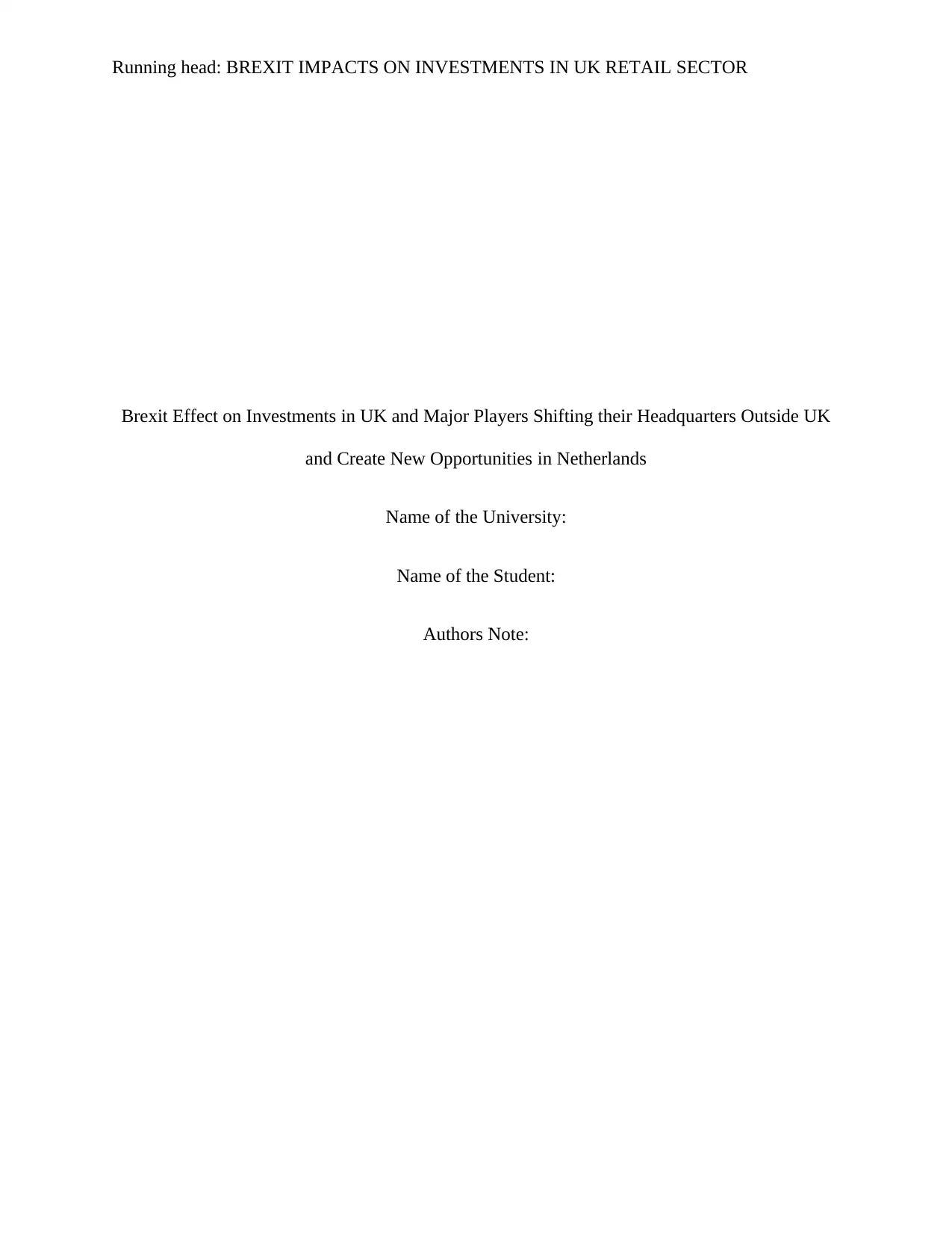
Running head: BREXIT IMPACTS ON INVESTMENTS IN UK RETAIL SECTOR
Brexit Effect on Investments in UK and Major Players Shifting their Headquarters Outside UK
and Create New Opportunities in Netherlands
Name of the University:
Name of the Student:
Authors Note:
Brexit Effect on Investments in UK and Major Players Shifting their Headquarters Outside UK
and Create New Opportunities in Netherlands
Name of the University:
Name of the Student:
Authors Note:
Secure Best Marks with AI Grader
Need help grading? Try our AI Grader for instant feedback on your assignments.
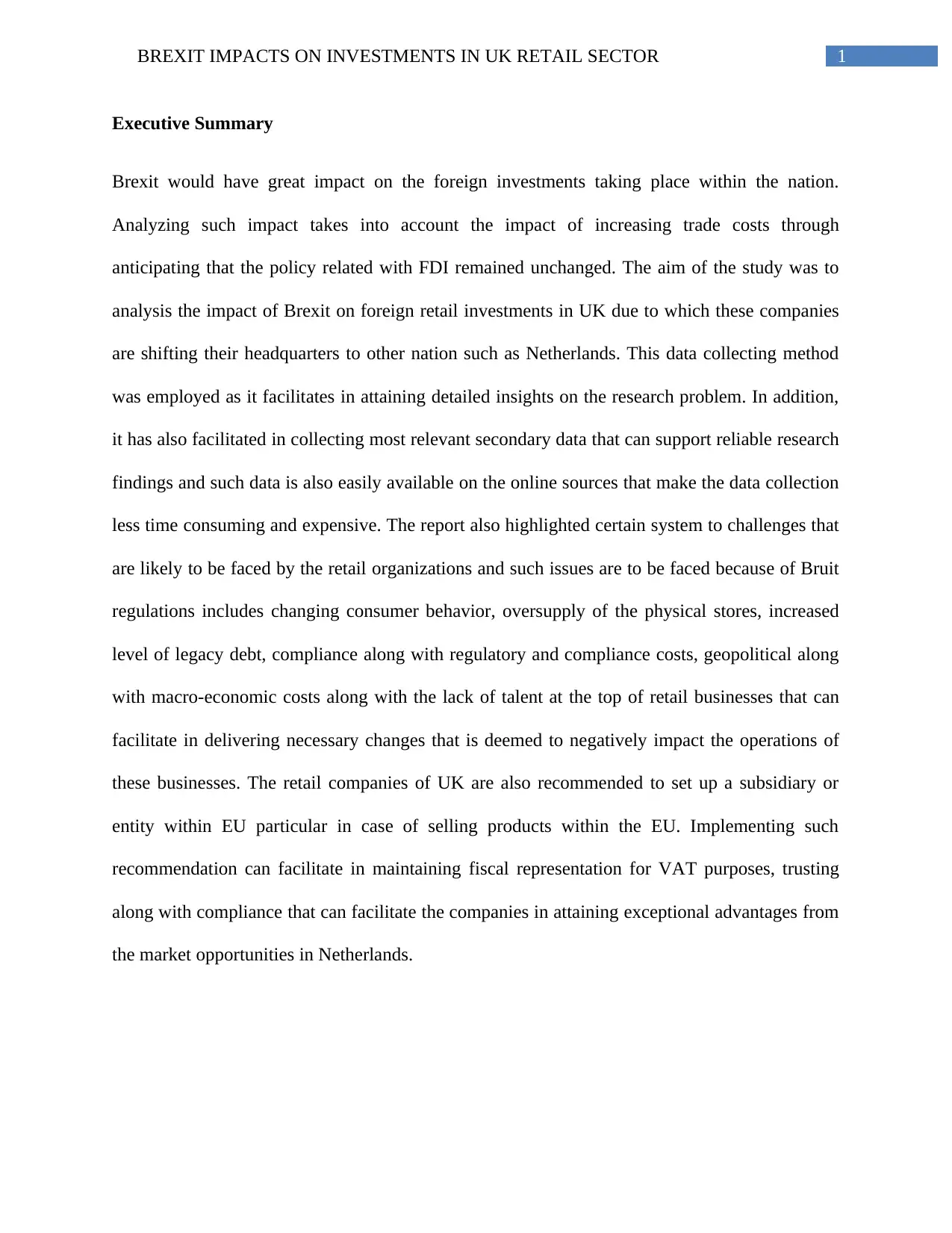
1BREXIT IMPACTS ON INVESTMENTS IN UK RETAIL SECTOR
Executive Summary
Brexit would have great impact on the foreign investments taking place within the nation.
Analyzing such impact takes into account the impact of increasing trade costs through
anticipating that the policy related with FDI remained unchanged. The aim of the study was to
analysis the impact of Brexit on foreign retail investments in UK due to which these companies
are shifting their headquarters to other nation such as Netherlands. This data collecting method
was employed as it facilitates in attaining detailed insights on the research problem. In addition,
it has also facilitated in collecting most relevant secondary data that can support reliable research
findings and such data is also easily available on the online sources that make the data collection
less time consuming and expensive. The report also highlighted certain system to challenges that
are likely to be faced by the retail organizations and such issues are to be faced because of Bruit
regulations includes changing consumer behavior, oversupply of the physical stores, increased
level of legacy debt, compliance along with regulatory and compliance costs, geopolitical along
with macro-economic costs along with the lack of talent at the top of retail businesses that can
facilitate in delivering necessary changes that is deemed to negatively impact the operations of
these businesses. The retail companies of UK are also recommended to set up a subsidiary or
entity within EU particular in case of selling products within the EU. Implementing such
recommendation can facilitate in maintaining fiscal representation for VAT purposes, trusting
along with compliance that can facilitate the companies in attaining exceptional advantages from
the market opportunities in Netherlands.
Executive Summary
Brexit would have great impact on the foreign investments taking place within the nation.
Analyzing such impact takes into account the impact of increasing trade costs through
anticipating that the policy related with FDI remained unchanged. The aim of the study was to
analysis the impact of Brexit on foreign retail investments in UK due to which these companies
are shifting their headquarters to other nation such as Netherlands. This data collecting method
was employed as it facilitates in attaining detailed insights on the research problem. In addition,
it has also facilitated in collecting most relevant secondary data that can support reliable research
findings and such data is also easily available on the online sources that make the data collection
less time consuming and expensive. The report also highlighted certain system to challenges that
are likely to be faced by the retail organizations and such issues are to be faced because of Bruit
regulations includes changing consumer behavior, oversupply of the physical stores, increased
level of legacy debt, compliance along with regulatory and compliance costs, geopolitical along
with macro-economic costs along with the lack of talent at the top of retail businesses that can
facilitate in delivering necessary changes that is deemed to negatively impact the operations of
these businesses. The retail companies of UK are also recommended to set up a subsidiary or
entity within EU particular in case of selling products within the EU. Implementing such
recommendation can facilitate in maintaining fiscal representation for VAT purposes, trusting
along with compliance that can facilitate the companies in attaining exceptional advantages from
the market opportunities in Netherlands.
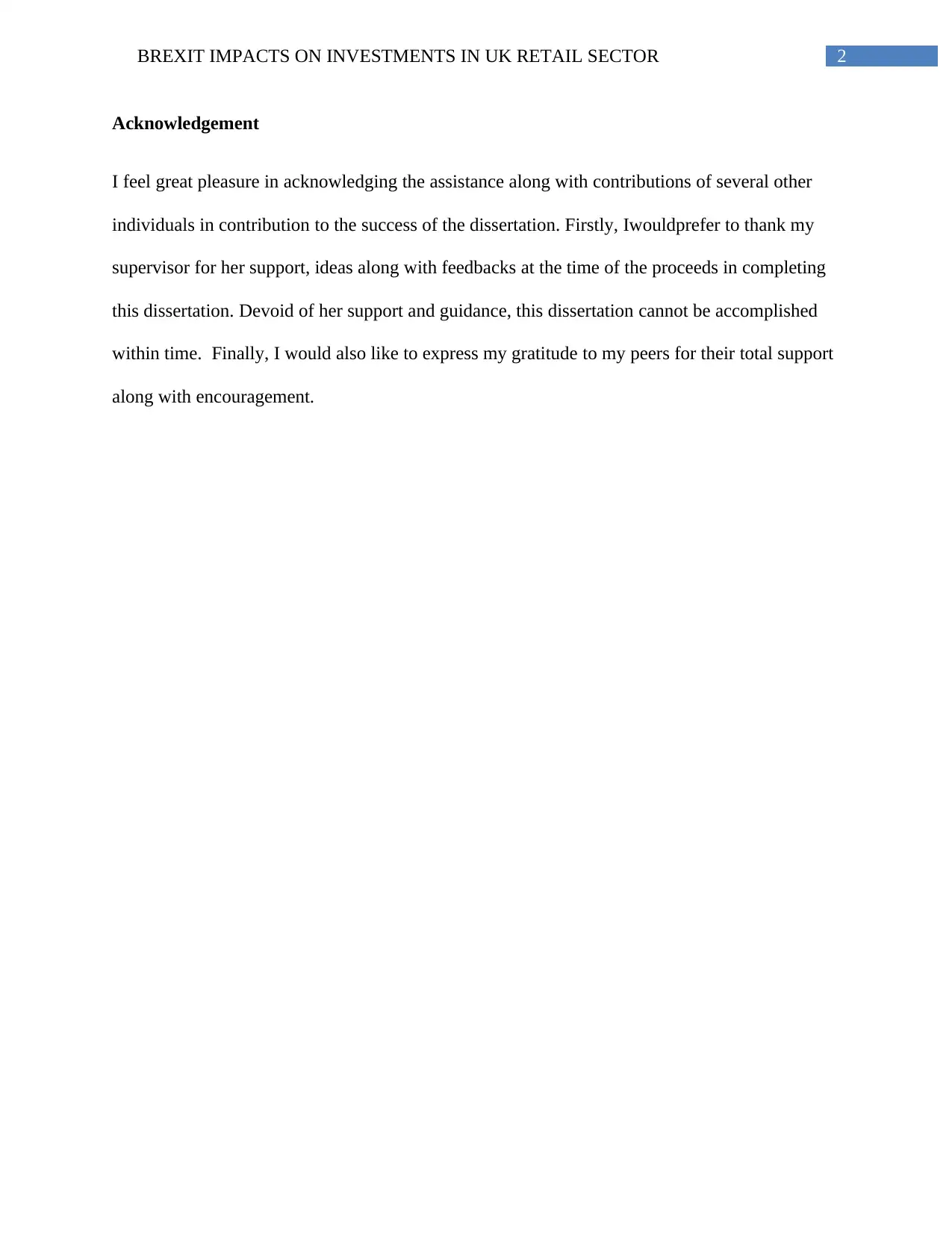
2BREXIT IMPACTS ON INVESTMENTS IN UK RETAIL SECTOR
Acknowledgement
I feel great pleasure in acknowledging the assistance along with contributions of several other
individuals in contribution to the success of the dissertation. Firstly, Iwouldprefer to thank my
supervisor for her support, ideas along with feedbacks at the time of the proceeds in completing
this dissertation. Devoid of her support and guidance, this dissertation cannot be accomplished
within time. Finally, I would also like to express my gratitude to my peers for their total support
along with encouragement.
Acknowledgement
I feel great pleasure in acknowledging the assistance along with contributions of several other
individuals in contribution to the success of the dissertation. Firstly, Iwouldprefer to thank my
supervisor for her support, ideas along with feedbacks at the time of the proceeds in completing
this dissertation. Devoid of her support and guidance, this dissertation cannot be accomplished
within time. Finally, I would also like to express my gratitude to my peers for their total support
along with encouragement.
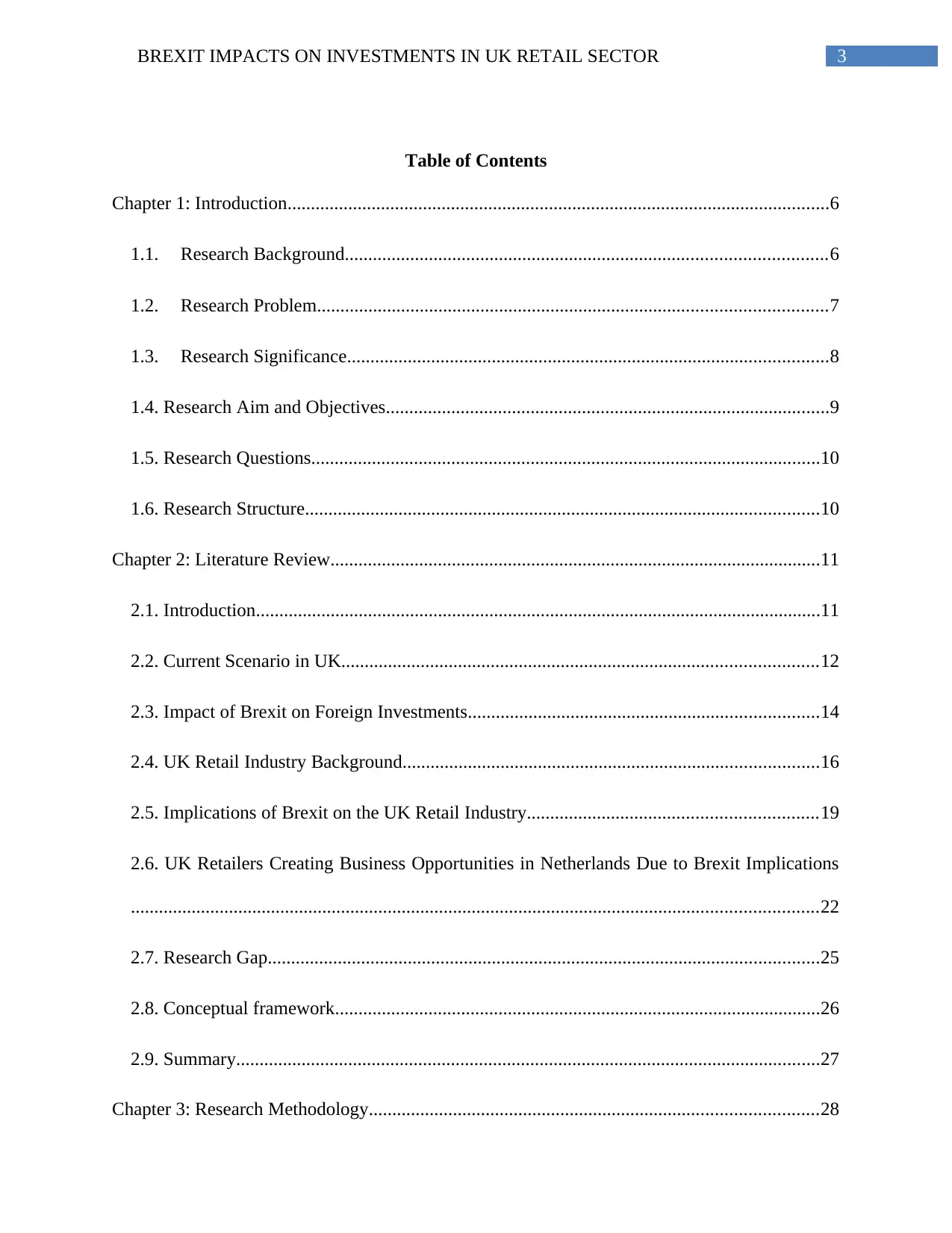
3BREXIT IMPACTS ON INVESTMENTS IN UK RETAIL SECTOR
Table of Contents
Chapter 1: Introduction....................................................................................................................6
1.1. Research Background.......................................................................................................6
1.2. Research Problem.............................................................................................................7
1.3. Research Significance.......................................................................................................8
1.4. Research Aim and Objectives...............................................................................................9
1.5. Research Questions.............................................................................................................10
1.6. Research Structure..............................................................................................................10
Chapter 2: Literature Review.........................................................................................................11
2.1. Introduction.........................................................................................................................11
2.2. Current Scenario in UK......................................................................................................12
2.3. Impact of Brexit on Foreign Investments...........................................................................14
2.4. UK Retail Industry Background.........................................................................................16
2.5. Implications of Brexit on the UK Retail Industry..............................................................19
2.6. UK Retailers Creating Business Opportunities in Netherlands Due to Brexit Implications
...................................................................................................................................................22
2.7. Research Gap......................................................................................................................25
2.8. Conceptual framework........................................................................................................26
2.9. Summary.............................................................................................................................27
Chapter 3: Research Methodology................................................................................................28
Table of Contents
Chapter 1: Introduction....................................................................................................................6
1.1. Research Background.......................................................................................................6
1.2. Research Problem.............................................................................................................7
1.3. Research Significance.......................................................................................................8
1.4. Research Aim and Objectives...............................................................................................9
1.5. Research Questions.............................................................................................................10
1.6. Research Structure..............................................................................................................10
Chapter 2: Literature Review.........................................................................................................11
2.1. Introduction.........................................................................................................................11
2.2. Current Scenario in UK......................................................................................................12
2.3. Impact of Brexit on Foreign Investments...........................................................................14
2.4. UK Retail Industry Background.........................................................................................16
2.5. Implications of Brexit on the UK Retail Industry..............................................................19
2.6. UK Retailers Creating Business Opportunities in Netherlands Due to Brexit Implications
...................................................................................................................................................22
2.7. Research Gap......................................................................................................................25
2.8. Conceptual framework........................................................................................................26
2.9. Summary.............................................................................................................................27
Chapter 3: Research Methodology................................................................................................28
Secure Best Marks with AI Grader
Need help grading? Try our AI Grader for instant feedback on your assignments.
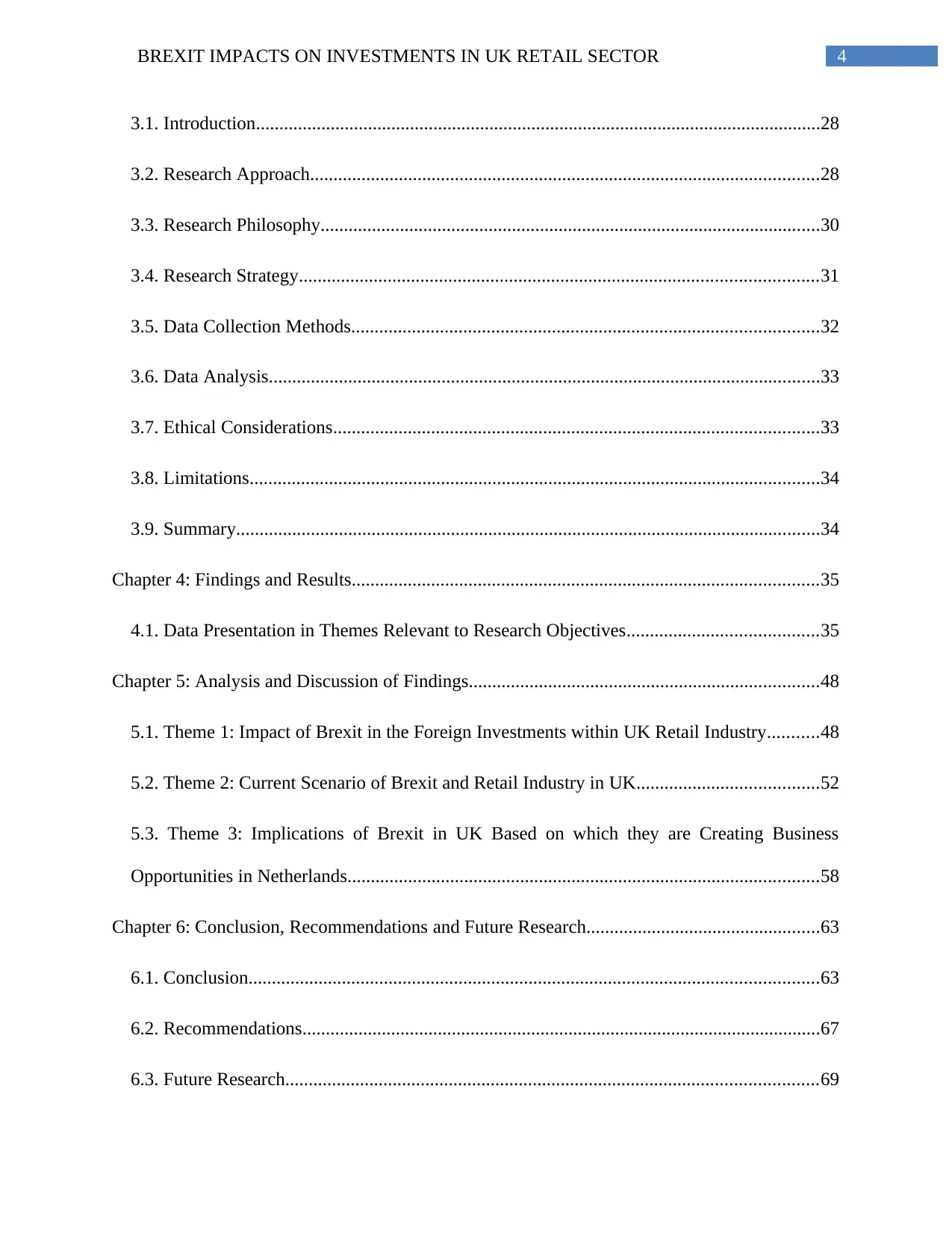
4BREXIT IMPACTS ON INVESTMENTS IN UK RETAIL SECTOR
3.1. Introduction.........................................................................................................................28
3.2. Research Approach.............................................................................................................28
3.3. Research Philosophy...........................................................................................................30
3.4. Research Strategy...............................................................................................................31
3.5. Data Collection Methods....................................................................................................32
3.6. Data Analysis......................................................................................................................33
3.7. Ethical Considerations........................................................................................................33
3.8. Limitations..........................................................................................................................34
3.9. Summary.............................................................................................................................34
Chapter 4: Findings and Results....................................................................................................35
4.1. Data Presentation in Themes Relevant to Research Objectives.........................................35
Chapter 5: Analysis and Discussion of Findings...........................................................................48
5.1. Theme 1: Impact of Brexit in the Foreign Investments within UK Retail Industry...........48
5.2. Theme 2: Current Scenario of Brexit and Retail Industry in UK.......................................52
5.3. Theme 3: Implications of Brexit in UK Based on which they are Creating Business
Opportunities in Netherlands.....................................................................................................58
Chapter 6: Conclusion, Recommendations and Future Research..................................................63
6.1. Conclusion..........................................................................................................................63
6.2. Recommendations...............................................................................................................67
6.3. Future Research..................................................................................................................69
3.1. Introduction.........................................................................................................................28
3.2. Research Approach.............................................................................................................28
3.3. Research Philosophy...........................................................................................................30
3.4. Research Strategy...............................................................................................................31
3.5. Data Collection Methods....................................................................................................32
3.6. Data Analysis......................................................................................................................33
3.7. Ethical Considerations........................................................................................................33
3.8. Limitations..........................................................................................................................34
3.9. Summary.............................................................................................................................34
Chapter 4: Findings and Results....................................................................................................35
4.1. Data Presentation in Themes Relevant to Research Objectives.........................................35
Chapter 5: Analysis and Discussion of Findings...........................................................................48
5.1. Theme 1: Impact of Brexit in the Foreign Investments within UK Retail Industry...........48
5.2. Theme 2: Current Scenario of Brexit and Retail Industry in UK.......................................52
5.3. Theme 3: Implications of Brexit in UK Based on which they are Creating Business
Opportunities in Netherlands.....................................................................................................58
Chapter 6: Conclusion, Recommendations and Future Research..................................................63
6.1. Conclusion..........................................................................................................................63
6.2. Recommendations...............................................................................................................67
6.3. Future Research..................................................................................................................69

5BREXIT IMPACTS ON INVESTMENTS IN UK RETAIL SECTOR
References......................................................................................................................................71
References......................................................................................................................................71
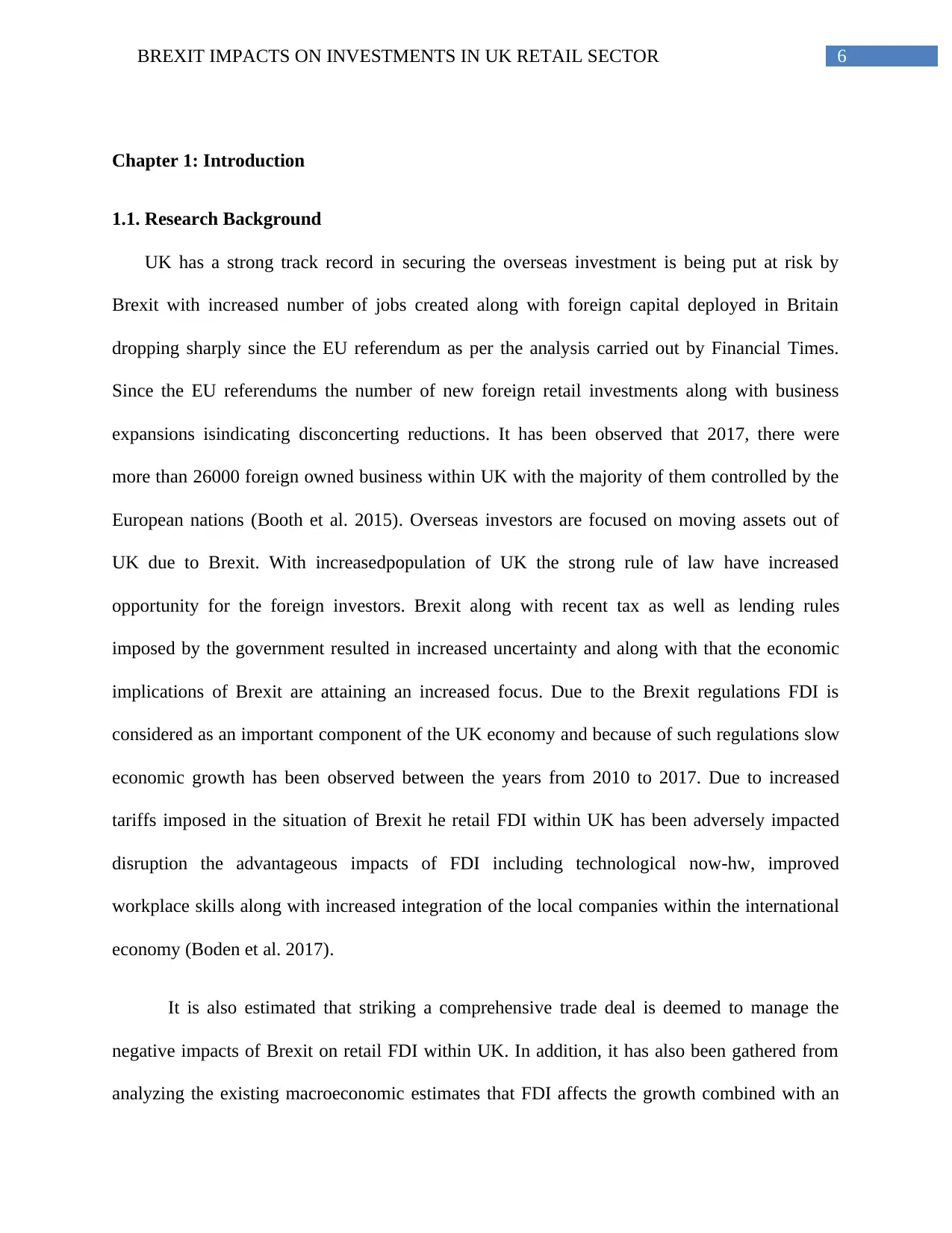
6BREXIT IMPACTS ON INVESTMENTS IN UK RETAIL SECTOR
Chapter 1: Introduction
1.1. Research Background
UK has a strong track record in securing the overseas investment is being put at risk by
Brexit with increased number of jobs created along with foreign capital deployed in Britain
dropping sharply since the EU referendum as per the analysis carried out by Financial Times.
Since the EU referendums the number of new foreign retail investments along with business
expansions isindicating disconcerting reductions. It has been observed that 2017, there were
more than 26000 foreign owned business within UK with the majority of them controlled by the
European nations (Booth et al. 2015). Overseas investors are focused on moving assets out of
UK due to Brexit. With increasedpopulation of UK the strong rule of law have increased
opportunity for the foreign investors. Brexit along with recent tax as well as lending rules
imposed by the government resulted in increased uncertainty and along with that the economic
implications of Brexit are attaining an increased focus. Due to the Brexit regulations FDI is
considered as an important component of the UK economy and because of such regulations slow
economic growth has been observed between the years from 2010 to 2017. Due to increased
tariffs imposed in the situation of Brexit he retail FDI within UK has been adversely impacted
disruption the advantageous impacts of FDI including technological now-hw, improved
workplace skills along with increased integration of the local companies within the international
economy (Boden et al. 2017).
It is also estimated that striking a comprehensive trade deal is deemed to manage the
negative impacts of Brexit on retail FDI within UK. In addition, it has also been gathered from
analyzing the existing macroeconomic estimates that FDI affects the growth combined with an
Chapter 1: Introduction
1.1. Research Background
UK has a strong track record in securing the overseas investment is being put at risk by
Brexit with increased number of jobs created along with foreign capital deployed in Britain
dropping sharply since the EU referendum as per the analysis carried out by Financial Times.
Since the EU referendums the number of new foreign retail investments along with business
expansions isindicating disconcerting reductions. It has been observed that 2017, there were
more than 26000 foreign owned business within UK with the majority of them controlled by the
European nations (Booth et al. 2015). Overseas investors are focused on moving assets out of
UK due to Brexit. With increasedpopulation of UK the strong rule of law have increased
opportunity for the foreign investors. Brexit along with recent tax as well as lending rules
imposed by the government resulted in increased uncertainty and along with that the economic
implications of Brexit are attaining an increased focus. Due to the Brexit regulations FDI is
considered as an important component of the UK economy and because of such regulations slow
economic growth has been observed between the years from 2010 to 2017. Due to increased
tariffs imposed in the situation of Brexit he retail FDI within UK has been adversely impacted
disruption the advantageous impacts of FDI including technological now-hw, improved
workplace skills along with increased integration of the local companies within the international
economy (Boden et al. 2017).
It is also estimated that striking a comprehensive trade deal is deemed to manage the
negative impacts of Brexit on retail FDI within UK. In addition, it has also been gathered from
analyzing the existing macroeconomic estimates that FDI affects the growth combined with an
Paraphrase This Document
Need a fresh take? Get an instant paraphrase of this document with our AI Paraphraser
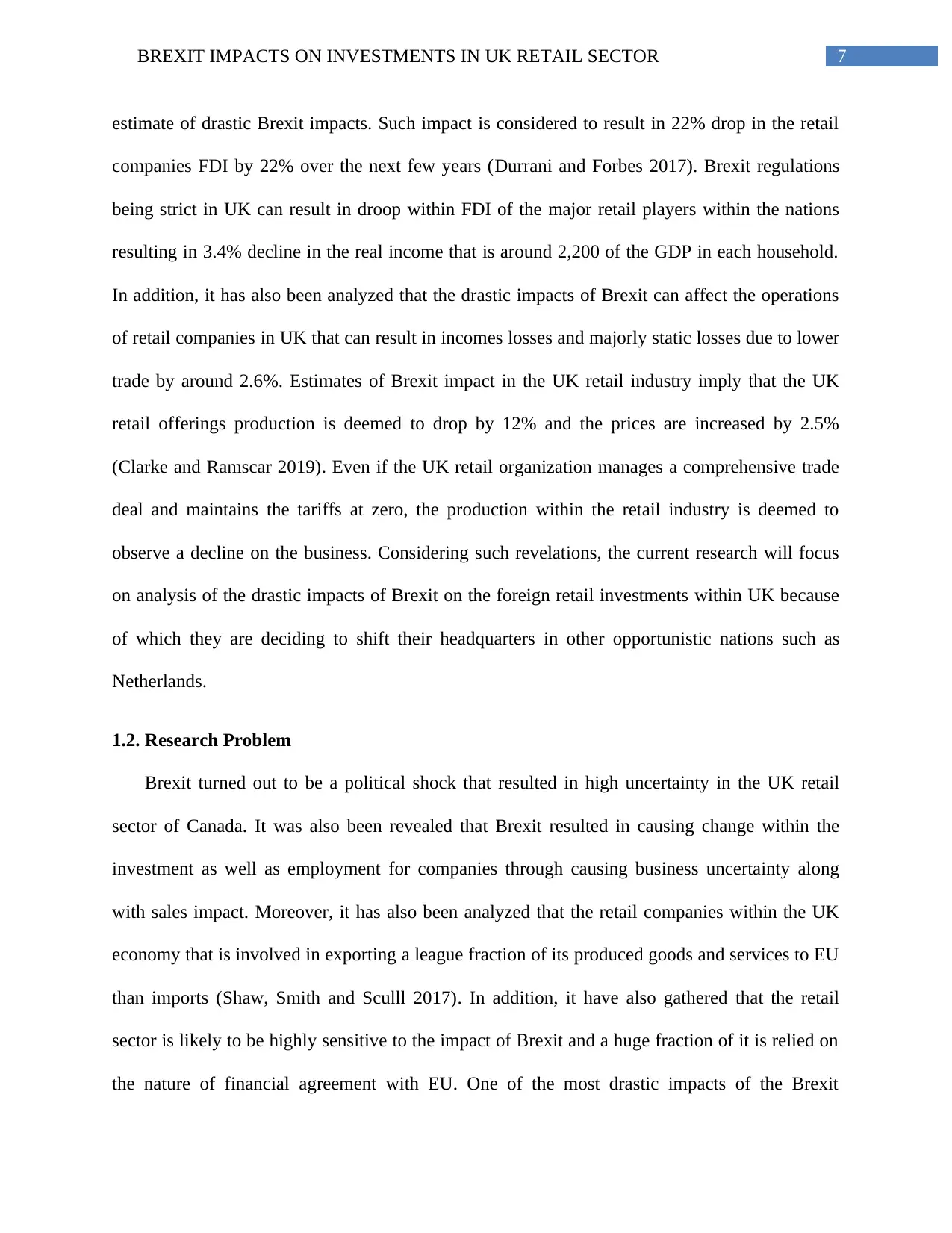
7BREXIT IMPACTS ON INVESTMENTS IN UK RETAIL SECTOR
estimate of drastic Brexit impacts. Such impact is considered to result in 22% drop in the retail
companies FDI by 22% over the next few years (Durrani and Forbes 2017). Brexit regulations
being strict in UK can result in droop within FDI of the major retail players within the nations
resulting in 3.4% decline in the real income that is around 2,200 of the GDP in each household.
In addition, it has also been analyzed that the drastic impacts of Brexit can affect the operations
of retail companies in UK that can result in incomes losses and majorly static losses due to lower
trade by around 2.6%. Estimates of Brexit impact in the UK retail industry imply that the UK
retail offerings production is deemed to drop by 12% and the prices are increased by 2.5%
(Clarke and Ramscar 2019). Even if the UK retail organization manages a comprehensive trade
deal and maintains the tariffs at zero, the production within the retail industry is deemed to
observe a decline on the business. Considering such revelations, the current research will focus
on analysis of the drastic impacts of Brexit on the foreign retail investments within UK because
of which they are deciding to shift their headquarters in other opportunistic nations such as
Netherlands.
1.2. Research Problem
Brexit turned out to be a political shock that resulted in high uncertainty in the UK retail
sector of Canada. It was also been revealed that Brexit resulted in causing change within the
investment as well as employment for companies through causing business uncertainty along
with sales impact. Moreover, it has also been analyzed that the retail companies within the UK
economy that is involved in exporting a league fraction of its produced goods and services to EU
than imports (Shaw, Smith and Sculll 2017). In addition, it have also gathered that the retail
sector is likely to be highly sensitive to the impact of Brexit and a huge fraction of it is relied on
the nature of financial agreement with EU. One of the most drastic impacts of the Brexit
estimate of drastic Brexit impacts. Such impact is considered to result in 22% drop in the retail
companies FDI by 22% over the next few years (Durrani and Forbes 2017). Brexit regulations
being strict in UK can result in droop within FDI of the major retail players within the nations
resulting in 3.4% decline in the real income that is around 2,200 of the GDP in each household.
In addition, it has also been analyzed that the drastic impacts of Brexit can affect the operations
of retail companies in UK that can result in incomes losses and majorly static losses due to lower
trade by around 2.6%. Estimates of Brexit impact in the UK retail industry imply that the UK
retail offerings production is deemed to drop by 12% and the prices are increased by 2.5%
(Clarke and Ramscar 2019). Even if the UK retail organization manages a comprehensive trade
deal and maintains the tariffs at zero, the production within the retail industry is deemed to
observe a decline on the business. Considering such revelations, the current research will focus
on analysis of the drastic impacts of Brexit on the foreign retail investments within UK because
of which they are deciding to shift their headquarters in other opportunistic nations such as
Netherlands.
1.2. Research Problem
Brexit turned out to be a political shock that resulted in high uncertainty in the UK retail
sector of Canada. It was also been revealed that Brexit resulted in causing change within the
investment as well as employment for companies through causing business uncertainty along
with sales impact. Moreover, it has also been analyzed that the retail companies within the UK
economy that is involved in exporting a league fraction of its produced goods and services to EU
than imports (Shaw, Smith and Sculll 2017). In addition, it have also gathered that the retail
sector is likely to be highly sensitive to the impact of Brexit and a huge fraction of it is relied on
the nature of financial agreement with EU. One of the most drastic impacts of the Brexit
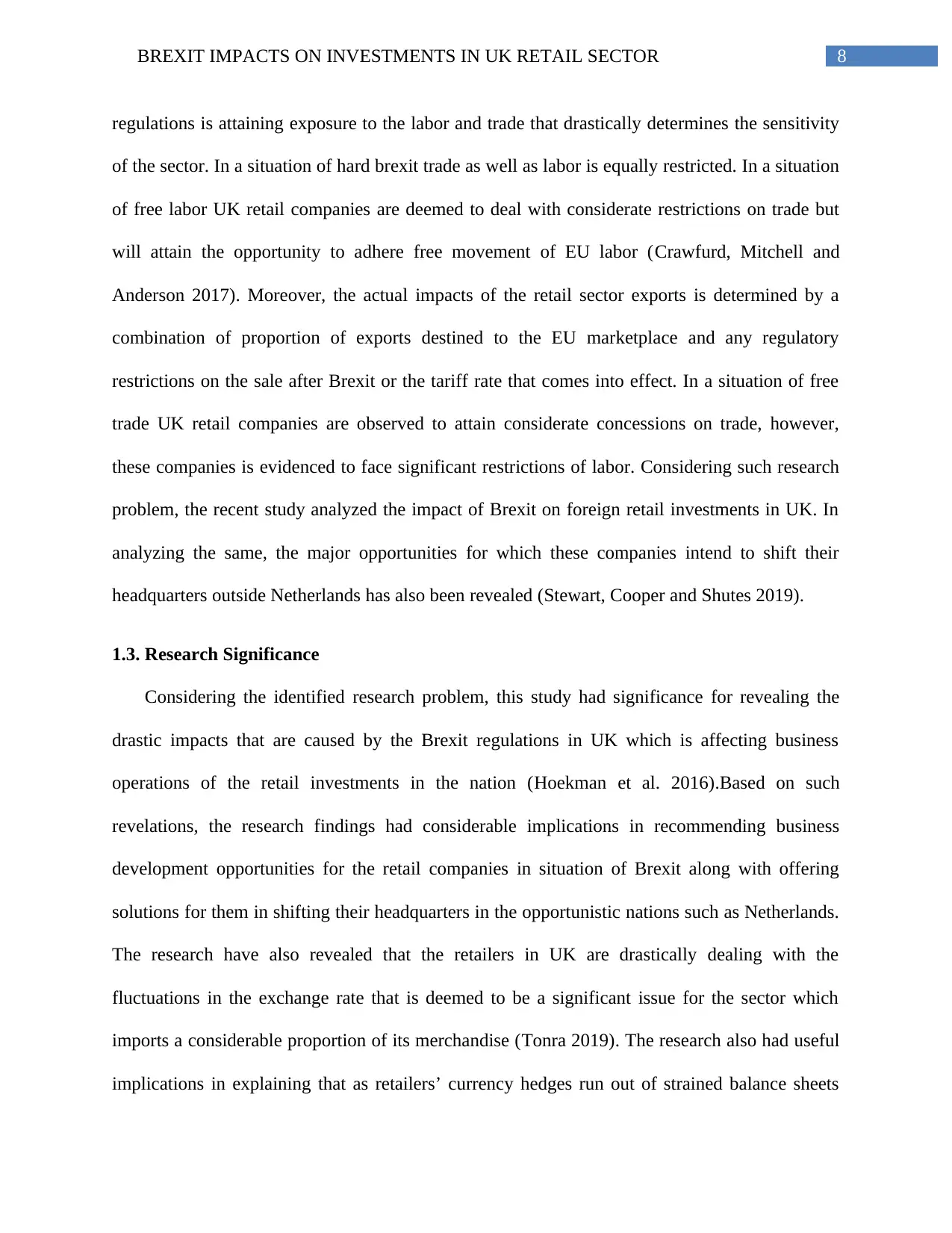
8BREXIT IMPACTS ON INVESTMENTS IN UK RETAIL SECTOR
regulations is attaining exposure to the labor and trade that drastically determines the sensitivity
of the sector. In a situation of hard brexit trade as well as labor is equally restricted. In a situation
of free labor UK retail companies are deemed to deal with considerate restrictions on trade but
will attain the opportunity to adhere free movement of EU labor (Crawfurd, Mitchell and
Anderson 2017). Moreover, the actual impacts of the retail sector exports is determined by a
combination of proportion of exports destined to the EU marketplace and any regulatory
restrictions on the sale after Brexit or the tariff rate that comes into effect. In a situation of free
trade UK retail companies are observed to attain considerate concessions on trade, however,
these companies is evidenced to face significant restrictions of labor. Considering such research
problem, the recent study analyzed the impact of Brexit on foreign retail investments in UK. In
analyzing the same, the major opportunities for which these companies intend to shift their
headquarters outside Netherlands has also been revealed (Stewart, Cooper and Shutes 2019).
1.3. Research Significance
Considering the identified research problem, this study had significance for revealing the
drastic impacts that are caused by the Brexit regulations in UK which is affecting business
operations of the retail investments in the nation (Hoekman et al. 2016).Based on such
revelations, the research findings had considerable implications in recommending business
development opportunities for the retail companies in situation of Brexit along with offering
solutions for them in shifting their headquarters in the opportunistic nations such as Netherlands.
The research have also revealed that the retailers in UK are drastically dealing with the
fluctuations in the exchange rate that is deemed to be a significant issue for the sector which
imports a considerable proportion of its merchandise (Tonra 2019). The research also had useful
implications in explaining that as retailers’ currency hedges run out of strained balance sheets
regulations is attaining exposure to the labor and trade that drastically determines the sensitivity
of the sector. In a situation of hard brexit trade as well as labor is equally restricted. In a situation
of free labor UK retail companies are deemed to deal with considerate restrictions on trade but
will attain the opportunity to adhere free movement of EU labor (Crawfurd, Mitchell and
Anderson 2017). Moreover, the actual impacts of the retail sector exports is determined by a
combination of proportion of exports destined to the EU marketplace and any regulatory
restrictions on the sale after Brexit or the tariff rate that comes into effect. In a situation of free
trade UK retail companies are observed to attain considerate concessions on trade, however,
these companies is evidenced to face significant restrictions of labor. Considering such research
problem, the recent study analyzed the impact of Brexit on foreign retail investments in UK. In
analyzing the same, the major opportunities for which these companies intend to shift their
headquarters outside Netherlands has also been revealed (Stewart, Cooper and Shutes 2019).
1.3. Research Significance
Considering the identified research problem, this study had significance for revealing the
drastic impacts that are caused by the Brexit regulations in UK which is affecting business
operations of the retail investments in the nation (Hoekman et al. 2016).Based on such
revelations, the research findings had considerable implications in recommending business
development opportunities for the retail companies in situation of Brexit along with offering
solutions for them in shifting their headquarters in the opportunistic nations such as Netherlands.
The research have also revealed that the retailers in UK are drastically dealing with the
fluctuations in the exchange rate that is deemed to be a significant issue for the sector which
imports a considerable proportion of its merchandise (Tonra 2019). The research also had useful
implications in explaining that as retailers’ currency hedges run out of strained balance sheets
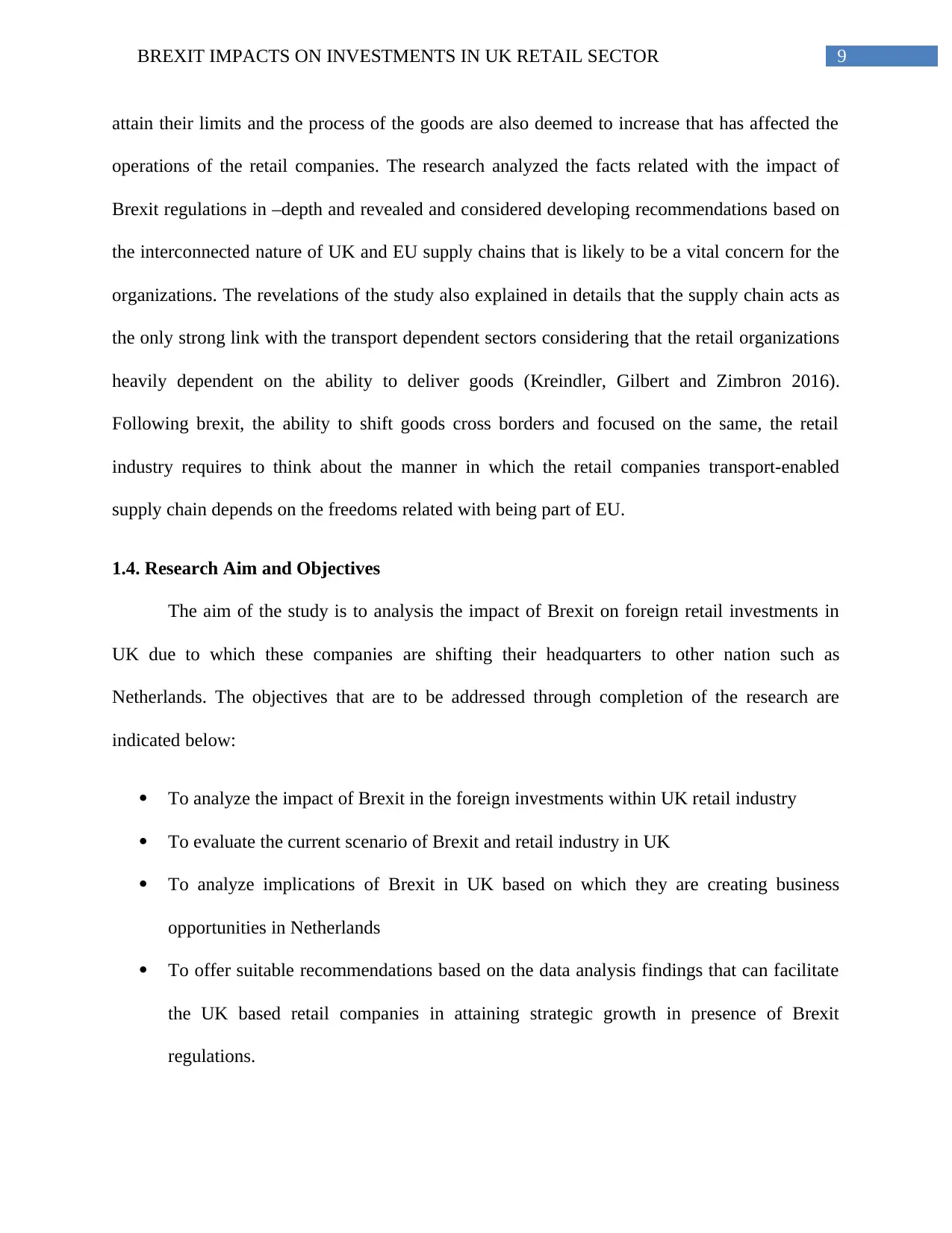
9BREXIT IMPACTS ON INVESTMENTS IN UK RETAIL SECTOR
attain their limits and the process of the goods are also deemed to increase that has affected the
operations of the retail companies. The research analyzed the facts related with the impact of
Brexit regulations in –depth and revealed and considered developing recommendations based on
the interconnected nature of UK and EU supply chains that is likely to be a vital concern for the
organizations. The revelations of the study also explained in details that the supply chain acts as
the only strong link with the transport dependent sectors considering that the retail organizations
heavily dependent on the ability to deliver goods (Kreindler, Gilbert and Zimbron 2016).
Following brexit, the ability to shift goods cross borders and focused on the same, the retail
industry requires to think about the manner in which the retail companies transport-enabled
supply chain depends on the freedoms related with being part of EU.
1.4. Research Aim and Objectives
The aim of the study is to analysis the impact of Brexit on foreign retail investments in
UK due to which these companies are shifting their headquarters to other nation such as
Netherlands. The objectives that are to be addressed through completion of the research are
indicated below:
To analyze the impact of Brexit in the foreign investments within UK retail industry
To evaluate the current scenario of Brexit and retail industry in UK
To analyze implications of Brexit in UK based on which they are creating business
opportunities in Netherlands
To offer suitable recommendations based on the data analysis findings that can facilitate
the UK based retail companies in attaining strategic growth in presence of Brexit
regulations.
attain their limits and the process of the goods are also deemed to increase that has affected the
operations of the retail companies. The research analyzed the facts related with the impact of
Brexit regulations in –depth and revealed and considered developing recommendations based on
the interconnected nature of UK and EU supply chains that is likely to be a vital concern for the
organizations. The revelations of the study also explained in details that the supply chain acts as
the only strong link with the transport dependent sectors considering that the retail organizations
heavily dependent on the ability to deliver goods (Kreindler, Gilbert and Zimbron 2016).
Following brexit, the ability to shift goods cross borders and focused on the same, the retail
industry requires to think about the manner in which the retail companies transport-enabled
supply chain depends on the freedoms related with being part of EU.
1.4. Research Aim and Objectives
The aim of the study is to analysis the impact of Brexit on foreign retail investments in
UK due to which these companies are shifting their headquarters to other nation such as
Netherlands. The objectives that are to be addressed through completion of the research are
indicated below:
To analyze the impact of Brexit in the foreign investments within UK retail industry
To evaluate the current scenario of Brexit and retail industry in UK
To analyze implications of Brexit in UK based on which they are creating business
opportunities in Netherlands
To offer suitable recommendations based on the data analysis findings that can facilitate
the UK based retail companies in attaining strategic growth in presence of Brexit
regulations.
Secure Best Marks with AI Grader
Need help grading? Try our AI Grader for instant feedback on your assignments.
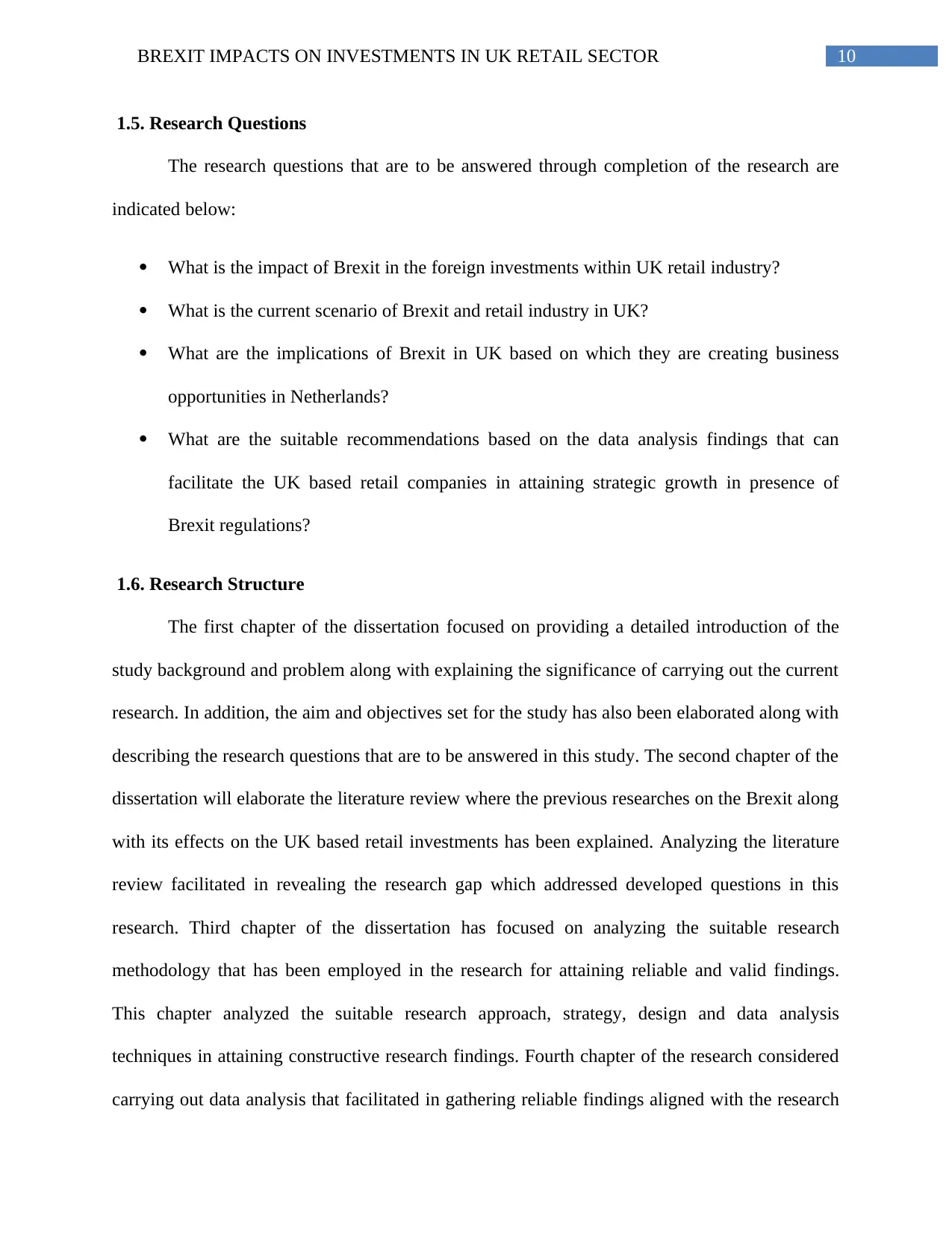
10BREXIT IMPACTS ON INVESTMENTS IN UK RETAIL SECTOR
1.5. Research Questions
The research questions that are to be answered through completion of the research are
indicated below:
What is the impact of Brexit in the foreign investments within UK retail industry?
What is the current scenario of Brexit and retail industry in UK?
What are the implications of Brexit in UK based on which they are creating business
opportunities in Netherlands?
What are the suitable recommendations based on the data analysis findings that can
facilitate the UK based retail companies in attaining strategic growth in presence of
Brexit regulations?
1.6. Research Structure
The first chapter of the dissertation focused on providing a detailed introduction of the
study background and problem along with explaining the significance of carrying out the current
research. In addition, the aim and objectives set for the study has also been elaborated along with
describing the research questions that are to be answered in this study. The second chapter of the
dissertation will elaborate the literature review where the previous researches on the Brexit along
with its effects on the UK based retail investments has been explained. Analyzing the literature
review facilitated in revealing the research gap which addressed developed questions in this
research. Third chapter of the dissertation has focused on analyzing the suitable research
methodology that has been employed in the research for attaining reliable and valid findings.
This chapter analyzed the suitable research approach, strategy, design and data analysis
techniques in attaining constructive research findings. Fourth chapter of the research considered
carrying out data analysis that facilitated in gathering reliable findings aligned with the research
1.5. Research Questions
The research questions that are to be answered through completion of the research are
indicated below:
What is the impact of Brexit in the foreign investments within UK retail industry?
What is the current scenario of Brexit and retail industry in UK?
What are the implications of Brexit in UK based on which they are creating business
opportunities in Netherlands?
What are the suitable recommendations based on the data analysis findings that can
facilitate the UK based retail companies in attaining strategic growth in presence of
Brexit regulations?
1.6. Research Structure
The first chapter of the dissertation focused on providing a detailed introduction of the
study background and problem along with explaining the significance of carrying out the current
research. In addition, the aim and objectives set for the study has also been elaborated along with
describing the research questions that are to be answered in this study. The second chapter of the
dissertation will elaborate the literature review where the previous researches on the Brexit along
with its effects on the UK based retail investments has been explained. Analyzing the literature
review facilitated in revealing the research gap which addressed developed questions in this
research. Third chapter of the dissertation has focused on analyzing the suitable research
methodology that has been employed in the research for attaining reliable and valid findings.
This chapter analyzed the suitable research approach, strategy, design and data analysis
techniques in attaining constructive research findings. Fourth chapter of the research considered
carrying out data analysis that facilitated in gathering reliable findings aligned with the research
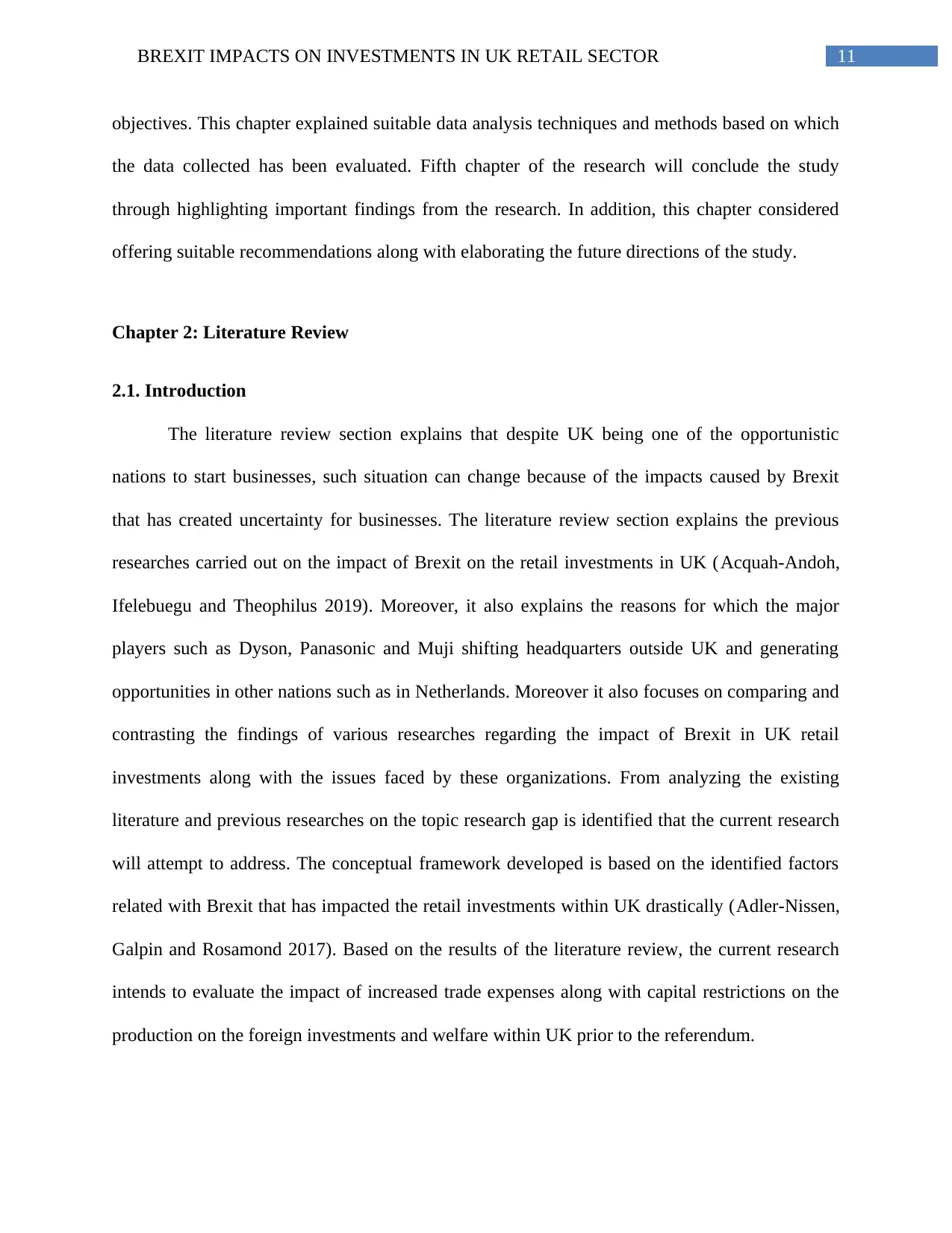
11BREXIT IMPACTS ON INVESTMENTS IN UK RETAIL SECTOR
objectives. This chapter explained suitable data analysis techniques and methods based on which
the data collected has been evaluated. Fifth chapter of the research will conclude the study
through highlighting important findings from the research. In addition, this chapter considered
offering suitable recommendations along with elaborating the future directions of the study.
Chapter 2: Literature Review
2.1. Introduction
The literature review section explains that despite UK being one of the opportunistic
nations to start businesses, such situation can change because of the impacts caused by Brexit
that has created uncertainty for businesses. The literature review section explains the previous
researches carried out on the impact of Brexit on the retail investments in UK (Acquah-Andoh,
Ifelebuegu and Theophilus 2019). Moreover, it also explains the reasons for which the major
players such as Dyson, Panasonic and Muji shifting headquarters outside UK and generating
opportunities in other nations such as in Netherlands. Moreover it also focuses on comparing and
contrasting the findings of various researches regarding the impact of Brexit in UK retail
investments along with the issues faced by these organizations. From analyzing the existing
literature and previous researches on the topic research gap is identified that the current research
will attempt to address. The conceptual framework developed is based on the identified factors
related with Brexit that has impacted the retail investments within UK drastically (Adler-Nissen,
Galpin and Rosamond 2017). Based on the results of the literature review, the current research
intends to evaluate the impact of increased trade expenses along with capital restrictions on the
production on the foreign investments and welfare within UK prior to the referendum.
objectives. This chapter explained suitable data analysis techniques and methods based on which
the data collected has been evaluated. Fifth chapter of the research will conclude the study
through highlighting important findings from the research. In addition, this chapter considered
offering suitable recommendations along with elaborating the future directions of the study.
Chapter 2: Literature Review
2.1. Introduction
The literature review section explains that despite UK being one of the opportunistic
nations to start businesses, such situation can change because of the impacts caused by Brexit
that has created uncertainty for businesses. The literature review section explains the previous
researches carried out on the impact of Brexit on the retail investments in UK (Acquah-Andoh,
Ifelebuegu and Theophilus 2019). Moreover, it also explains the reasons for which the major
players such as Dyson, Panasonic and Muji shifting headquarters outside UK and generating
opportunities in other nations such as in Netherlands. Moreover it also focuses on comparing and
contrasting the findings of various researches regarding the impact of Brexit in UK retail
investments along with the issues faced by these organizations. From analyzing the existing
literature and previous researches on the topic research gap is identified that the current research
will attempt to address. The conceptual framework developed is based on the identified factors
related with Brexit that has impacted the retail investments within UK drastically (Adler-Nissen,
Galpin and Rosamond 2017). Based on the results of the literature review, the current research
intends to evaluate the impact of increased trade expenses along with capital restrictions on the
production on the foreign investments and welfare within UK prior to the referendum.
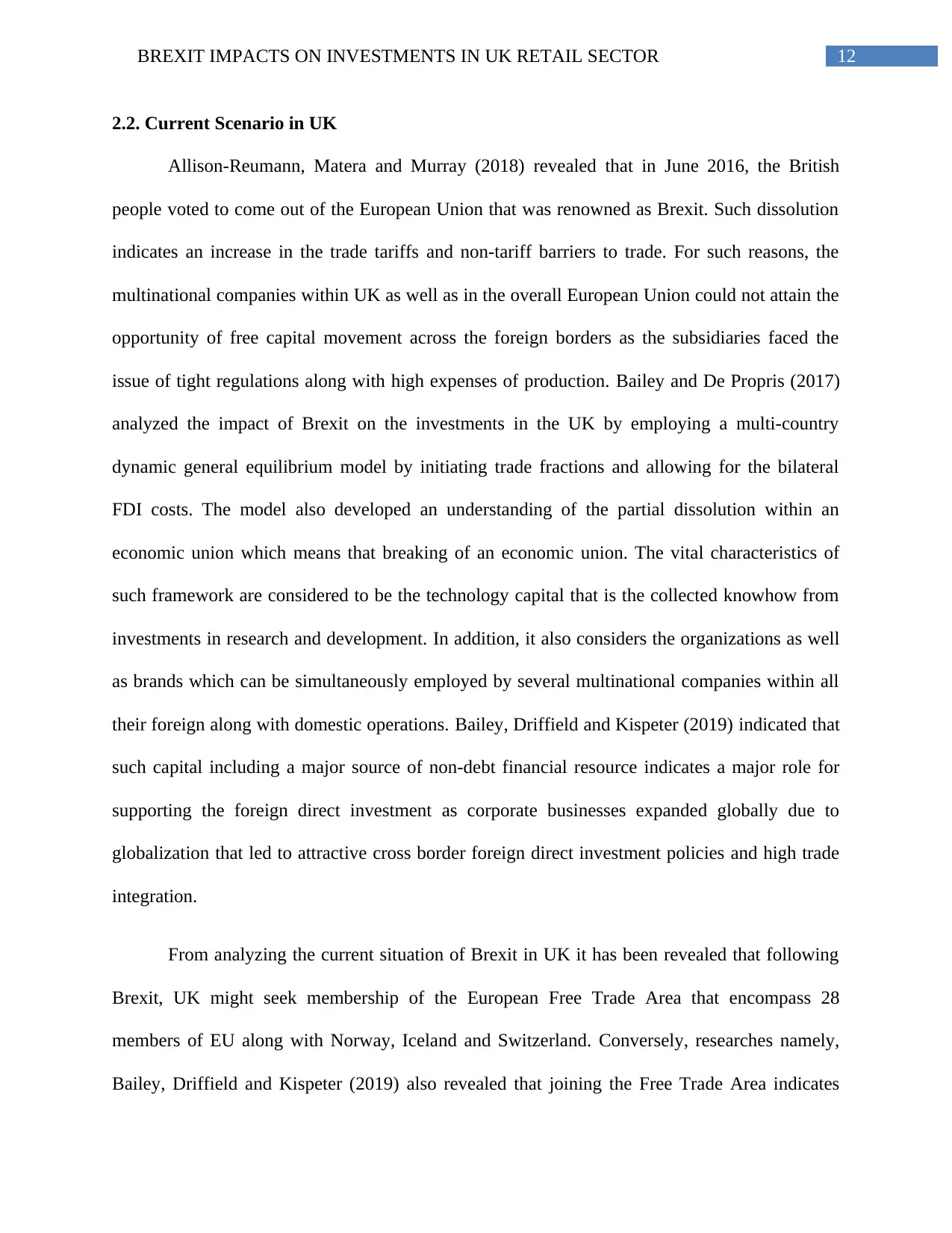
12BREXIT IMPACTS ON INVESTMENTS IN UK RETAIL SECTOR
2.2. Current Scenario in UK
Allison-Reumann, Matera and Murray (2018) revealed that in June 2016, the British
people voted to come out of the European Union that was renowned as Brexit. Such dissolution
indicates an increase in the trade tariffs and non-tariff barriers to trade. For such reasons, the
multinational companies within UK as well as in the overall European Union could not attain the
opportunity of free capital movement across the foreign borders as the subsidiaries faced the
issue of tight regulations along with high expenses of production. Bailey and De Propris (2017)
analyzed the impact of Brexit on the investments in the UK by employing a multi-country
dynamic general equilibrium model by initiating trade fractions and allowing for the bilateral
FDI costs. The model also developed an understanding of the partial dissolution within an
economic union which means that breaking of an economic union. The vital characteristics of
such framework are considered to be the technology capital that is the collected knowhow from
investments in research and development. In addition, it also considers the organizations as well
as brands which can be simultaneously employed by several multinational companies within all
their foreign along with domestic operations. Bailey, Driffield and Kispeter (2019) indicated that
such capital including a major source of non-debt financial resource indicates a major role for
supporting the foreign direct investment as corporate businesses expanded globally due to
globalization that led to attractive cross border foreign direct investment policies and high trade
integration.
From analyzing the current situation of Brexit in UK it has been revealed that following
Brexit, UK might seek membership of the European Free Trade Area that encompass 28
members of EU along with Norway, Iceland and Switzerland. Conversely, researches namely,
Bailey, Driffield and Kispeter (2019) also revealed that joining the Free Trade Area indicates
2.2. Current Scenario in UK
Allison-Reumann, Matera and Murray (2018) revealed that in June 2016, the British
people voted to come out of the European Union that was renowned as Brexit. Such dissolution
indicates an increase in the trade tariffs and non-tariff barriers to trade. For such reasons, the
multinational companies within UK as well as in the overall European Union could not attain the
opportunity of free capital movement across the foreign borders as the subsidiaries faced the
issue of tight regulations along with high expenses of production. Bailey and De Propris (2017)
analyzed the impact of Brexit on the investments in the UK by employing a multi-country
dynamic general equilibrium model by initiating trade fractions and allowing for the bilateral
FDI costs. The model also developed an understanding of the partial dissolution within an
economic union which means that breaking of an economic union. The vital characteristics of
such framework are considered to be the technology capital that is the collected knowhow from
investments in research and development. In addition, it also considers the organizations as well
as brands which can be simultaneously employed by several multinational companies within all
their foreign along with domestic operations. Bailey, Driffield and Kispeter (2019) indicated that
such capital including a major source of non-debt financial resource indicates a major role for
supporting the foreign direct investment as corporate businesses expanded globally due to
globalization that led to attractive cross border foreign direct investment policies and high trade
integration.
From analyzing the current situation of Brexit in UK it has been revealed that following
Brexit, UK might seek membership of the European Free Trade Area that encompass 28
members of EU along with Norway, Iceland and Switzerland. Conversely, researches namely,
Bailey, Driffield and Kispeter (2019) also revealed that joining the Free Trade Area indicates
Paraphrase This Document
Need a fresh take? Get an instant paraphrase of this document with our AI Paraphraser
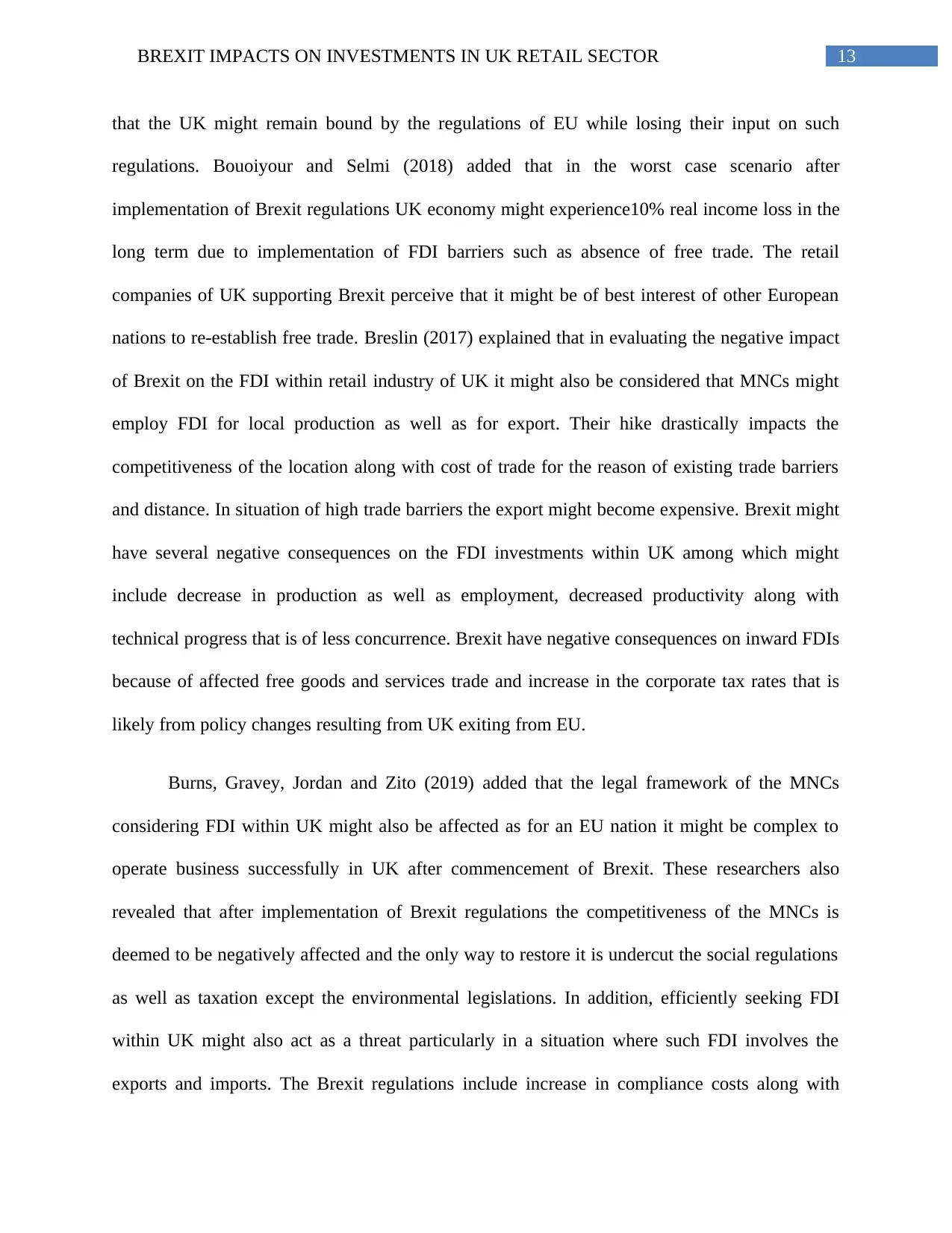
13BREXIT IMPACTS ON INVESTMENTS IN UK RETAIL SECTOR
that the UK might remain bound by the regulations of EU while losing their input on such
regulations. Bouoiyour and Selmi (2018) added that in the worst case scenario after
implementation of Brexit regulations UK economy might experience10% real income loss in the
long term due to implementation of FDI barriers such as absence of free trade. The retail
companies of UK supporting Brexit perceive that it might be of best interest of other European
nations to re-establish free trade. Breslin (2017) explained that in evaluating the negative impact
of Brexit on the FDI within retail industry of UK it might also be considered that MNCs might
employ FDI for local production as well as for export. Their hike drastically impacts the
competitiveness of the location along with cost of trade for the reason of existing trade barriers
and distance. In situation of high trade barriers the export might become expensive. Brexit might
have several negative consequences on the FDI investments within UK among which might
include decrease in production as well as employment, decreased productivity along with
technical progress that is of less concurrence. Brexit have negative consequences on inward FDIs
because of affected free goods and services trade and increase in the corporate tax rates that is
likely from policy changes resulting from UK exiting from EU.
Burns, Gravey, Jordan and Zito (2019) added that the legal framework of the MNCs
considering FDI within UK might also be affected as for an EU nation it might be complex to
operate business successfully in UK after commencement of Brexit. These researchers also
revealed that after implementation of Brexit regulations the competitiveness of the MNCs is
deemed to be negatively affected and the only way to restore it is undercut the social regulations
as well as taxation except the environmental legislations. In addition, efficiently seeking FDI
within UK might also act as a threat particularly in a situation where such FDI involves the
exports and imports. The Brexit regulations include increase in compliance costs along with
that the UK might remain bound by the regulations of EU while losing their input on such
regulations. Bouoiyour and Selmi (2018) added that in the worst case scenario after
implementation of Brexit regulations UK economy might experience10% real income loss in the
long term due to implementation of FDI barriers such as absence of free trade. The retail
companies of UK supporting Brexit perceive that it might be of best interest of other European
nations to re-establish free trade. Breslin (2017) explained that in evaluating the negative impact
of Brexit on the FDI within retail industry of UK it might also be considered that MNCs might
employ FDI for local production as well as for export. Their hike drastically impacts the
competitiveness of the location along with cost of trade for the reason of existing trade barriers
and distance. In situation of high trade barriers the export might become expensive. Brexit might
have several negative consequences on the FDI investments within UK among which might
include decrease in production as well as employment, decreased productivity along with
technical progress that is of less concurrence. Brexit have negative consequences on inward FDIs
because of affected free goods and services trade and increase in the corporate tax rates that is
likely from policy changes resulting from UK exiting from EU.
Burns, Gravey, Jordan and Zito (2019) added that the legal framework of the MNCs
considering FDI within UK might also be affected as for an EU nation it might be complex to
operate business successfully in UK after commencement of Brexit. These researchers also
revealed that after implementation of Brexit regulations the competitiveness of the MNCs is
deemed to be negatively affected and the only way to restore it is undercut the social regulations
as well as taxation except the environmental legislations. In addition, efficiently seeking FDI
within UK might also act as a threat particularly in a situation where such FDI involves the
exports and imports. The Brexit regulations include increase in compliance costs along with
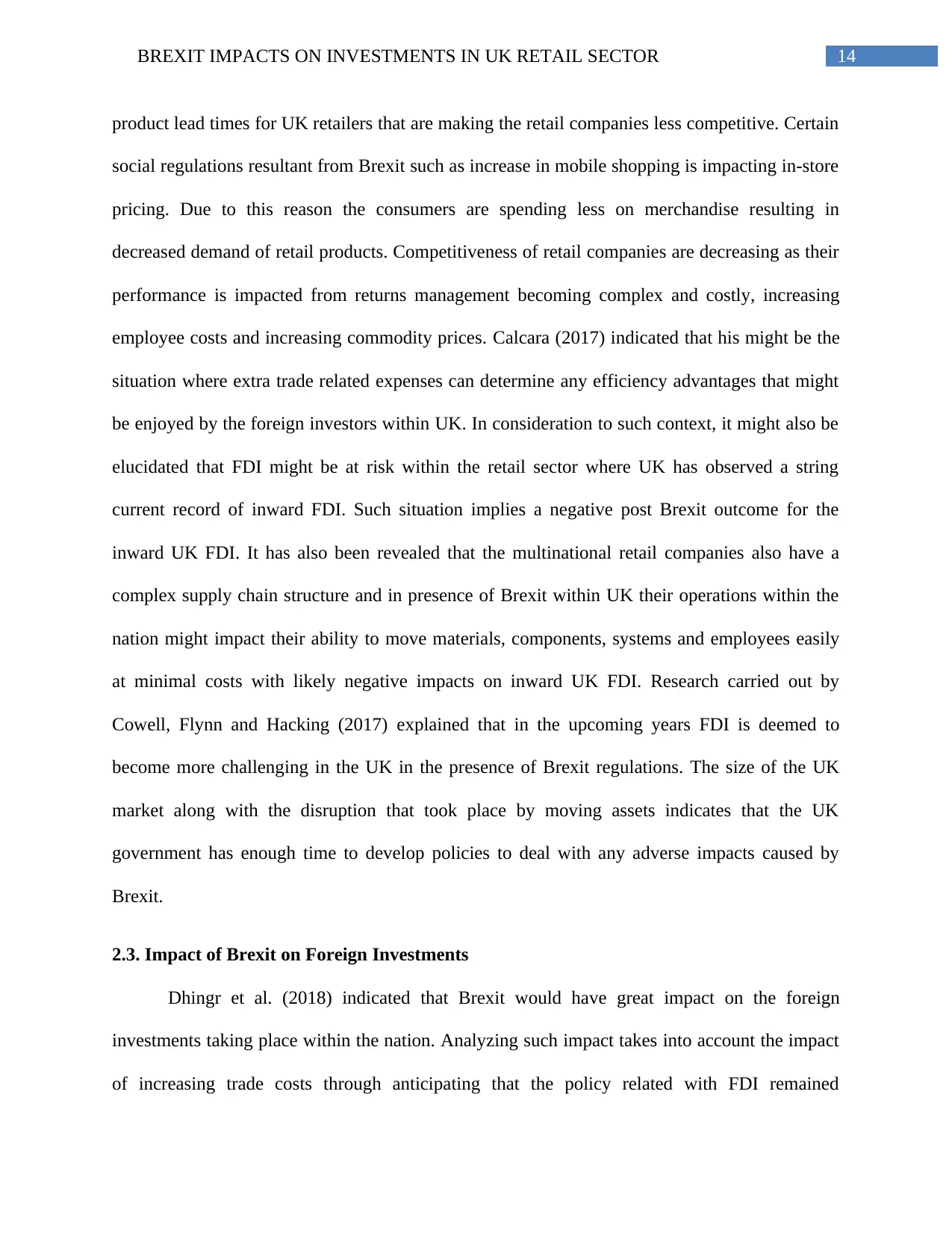
14BREXIT IMPACTS ON INVESTMENTS IN UK RETAIL SECTOR
product lead times for UK retailers that are making the retail companies less competitive. Certain
social regulations resultant from Brexit such as increase in mobile shopping is impacting in-store
pricing. Due to this reason the consumers are spending less on merchandise resulting in
decreased demand of retail products. Competitiveness of retail companies are decreasing as their
performance is impacted from returns management becoming complex and costly, increasing
employee costs and increasing commodity prices. Calcara (2017) indicated that his might be the
situation where extra trade related expenses can determine any efficiency advantages that might
be enjoyed by the foreign investors within UK. In consideration to such context, it might also be
elucidated that FDI might be at risk within the retail sector where UK has observed a string
current record of inward FDI. Such situation implies a negative post Brexit outcome for the
inward UK FDI. It has also been revealed that the multinational retail companies also have a
complex supply chain structure and in presence of Brexit within UK their operations within the
nation might impact their ability to move materials, components, systems and employees easily
at minimal costs with likely negative impacts on inward UK FDI. Research carried out by
Cowell, Flynn and Hacking (2017) explained that in the upcoming years FDI is deemed to
become more challenging in the UK in the presence of Brexit regulations. The size of the UK
market along with the disruption that took place by moving assets indicates that the UK
government has enough time to develop policies to deal with any adverse impacts caused by
Brexit.
2.3. Impact of Brexit on Foreign Investments
Dhingr et al. (2018) indicated that Brexit would have great impact on the foreign
investments taking place within the nation. Analyzing such impact takes into account the impact
of increasing trade costs through anticipating that the policy related with FDI remained
product lead times for UK retailers that are making the retail companies less competitive. Certain
social regulations resultant from Brexit such as increase in mobile shopping is impacting in-store
pricing. Due to this reason the consumers are spending less on merchandise resulting in
decreased demand of retail products. Competitiveness of retail companies are decreasing as their
performance is impacted from returns management becoming complex and costly, increasing
employee costs and increasing commodity prices. Calcara (2017) indicated that his might be the
situation where extra trade related expenses can determine any efficiency advantages that might
be enjoyed by the foreign investors within UK. In consideration to such context, it might also be
elucidated that FDI might be at risk within the retail sector where UK has observed a string
current record of inward FDI. Such situation implies a negative post Brexit outcome for the
inward UK FDI. It has also been revealed that the multinational retail companies also have a
complex supply chain structure and in presence of Brexit within UK their operations within the
nation might impact their ability to move materials, components, systems and employees easily
at minimal costs with likely negative impacts on inward UK FDI. Research carried out by
Cowell, Flynn and Hacking (2017) explained that in the upcoming years FDI is deemed to
become more challenging in the UK in the presence of Brexit regulations. The size of the UK
market along with the disruption that took place by moving assets indicates that the UK
government has enough time to develop policies to deal with any adverse impacts caused by
Brexit.
2.3. Impact of Brexit on Foreign Investments
Dhingr et al. (2018) indicated that Brexit would have great impact on the foreign
investments taking place within the nation. Analyzing such impact takes into account the impact
of increasing trade costs through anticipating that the policy related with FDI remained
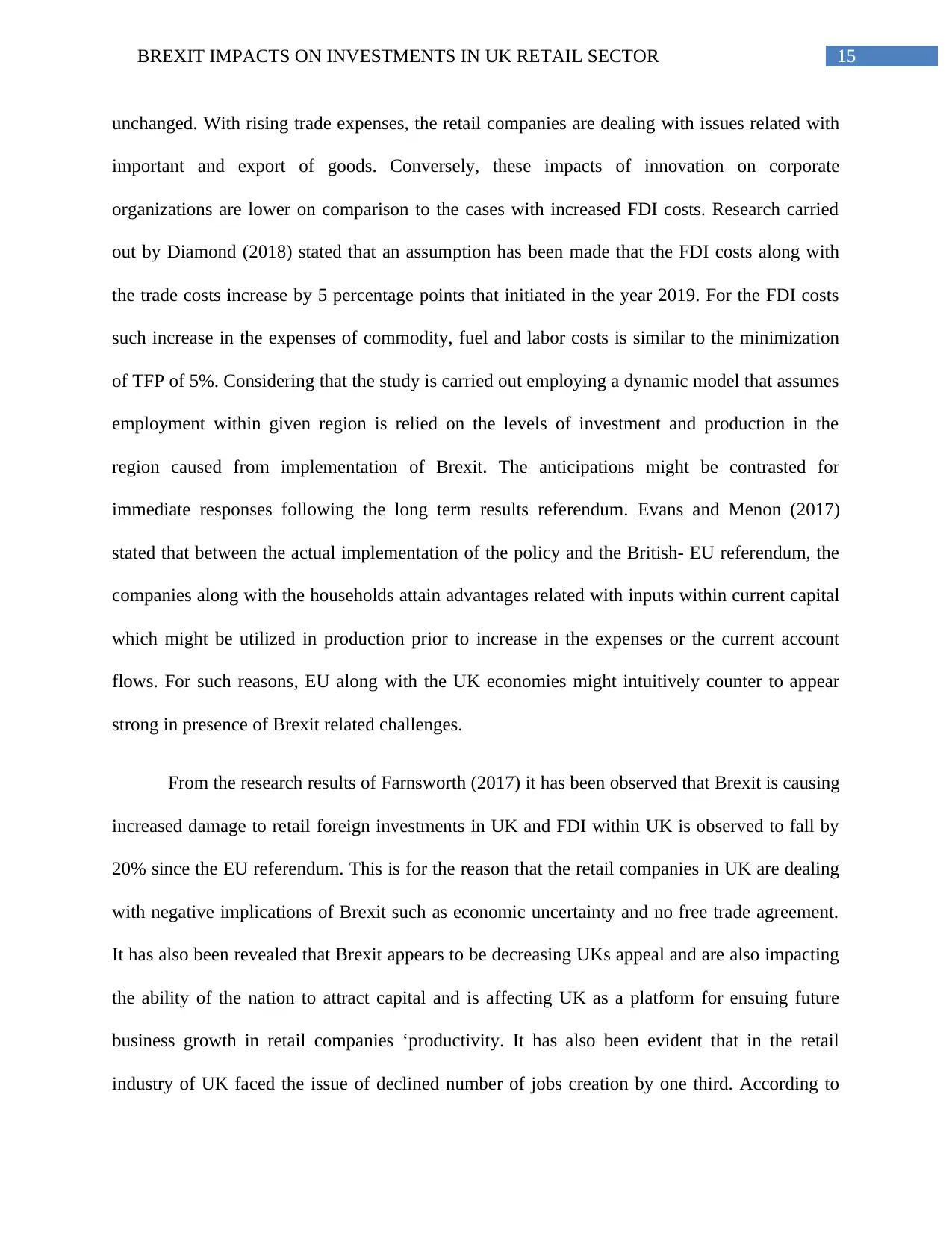
15BREXIT IMPACTS ON INVESTMENTS IN UK RETAIL SECTOR
unchanged. With rising trade expenses, the retail companies are dealing with issues related with
important and export of goods. Conversely, these impacts of innovation on corporate
organizations are lower on comparison to the cases with increased FDI costs. Research carried
out by Diamond (2018) stated that an assumption has been made that the FDI costs along with
the trade costs increase by 5 percentage points that initiated in the year 2019. For the FDI costs
such increase in the expenses of commodity, fuel and labor costs is similar to the minimization
of TFP of 5%. Considering that the study is carried out employing a dynamic model that assumes
employment within given region is relied on the levels of investment and production in the
region caused from implementation of Brexit. The anticipations might be contrasted for
immediate responses following the long term results referendum. Evans and Menon (2017)
stated that between the actual implementation of the policy and the British- EU referendum, the
companies along with the households attain advantages related with inputs within current capital
which might be utilized in production prior to increase in the expenses or the current account
flows. For such reasons, EU along with the UK economies might intuitively counter to appear
strong in presence of Brexit related challenges.
From the research results of Farnsworth (2017) it has been observed that Brexit is causing
increased damage to retail foreign investments in UK and FDI within UK is observed to fall by
20% since the EU referendum. This is for the reason that the retail companies in UK are dealing
with negative implications of Brexit such as economic uncertainty and no free trade agreement.
It has also been revealed that Brexit appears to be decreasing UKs appeal and are also impacting
the ability of the nation to attract capital and is affecting UK as a platform for ensuing future
business growth in retail companies ‘productivity. It has also been evident that in the retail
industry of UK faced the issue of declined number of jobs creation by one third. According to
unchanged. With rising trade expenses, the retail companies are dealing with issues related with
important and export of goods. Conversely, these impacts of innovation on corporate
organizations are lower on comparison to the cases with increased FDI costs. Research carried
out by Diamond (2018) stated that an assumption has been made that the FDI costs along with
the trade costs increase by 5 percentage points that initiated in the year 2019. For the FDI costs
such increase in the expenses of commodity, fuel and labor costs is similar to the minimization
of TFP of 5%. Considering that the study is carried out employing a dynamic model that assumes
employment within given region is relied on the levels of investment and production in the
region caused from implementation of Brexit. The anticipations might be contrasted for
immediate responses following the long term results referendum. Evans and Menon (2017)
stated that between the actual implementation of the policy and the British- EU referendum, the
companies along with the households attain advantages related with inputs within current capital
which might be utilized in production prior to increase in the expenses or the current account
flows. For such reasons, EU along with the UK economies might intuitively counter to appear
strong in presence of Brexit related challenges.
From the research results of Farnsworth (2017) it has been observed that Brexit is causing
increased damage to retail foreign investments in UK and FDI within UK is observed to fall by
20% since the EU referendum. This is for the reason that the retail companies in UK are dealing
with negative implications of Brexit such as economic uncertainty and no free trade agreement.
It has also been revealed that Brexit appears to be decreasing UKs appeal and are also impacting
the ability of the nation to attract capital and is affecting UK as a platform for ensuing future
business growth in retail companies ‘productivity. It has also been evident that in the retail
industry of UK faced the issue of declined number of jobs creation by one third. According to
Secure Best Marks with AI Grader
Need help grading? Try our AI Grader for instant feedback on your assignments.
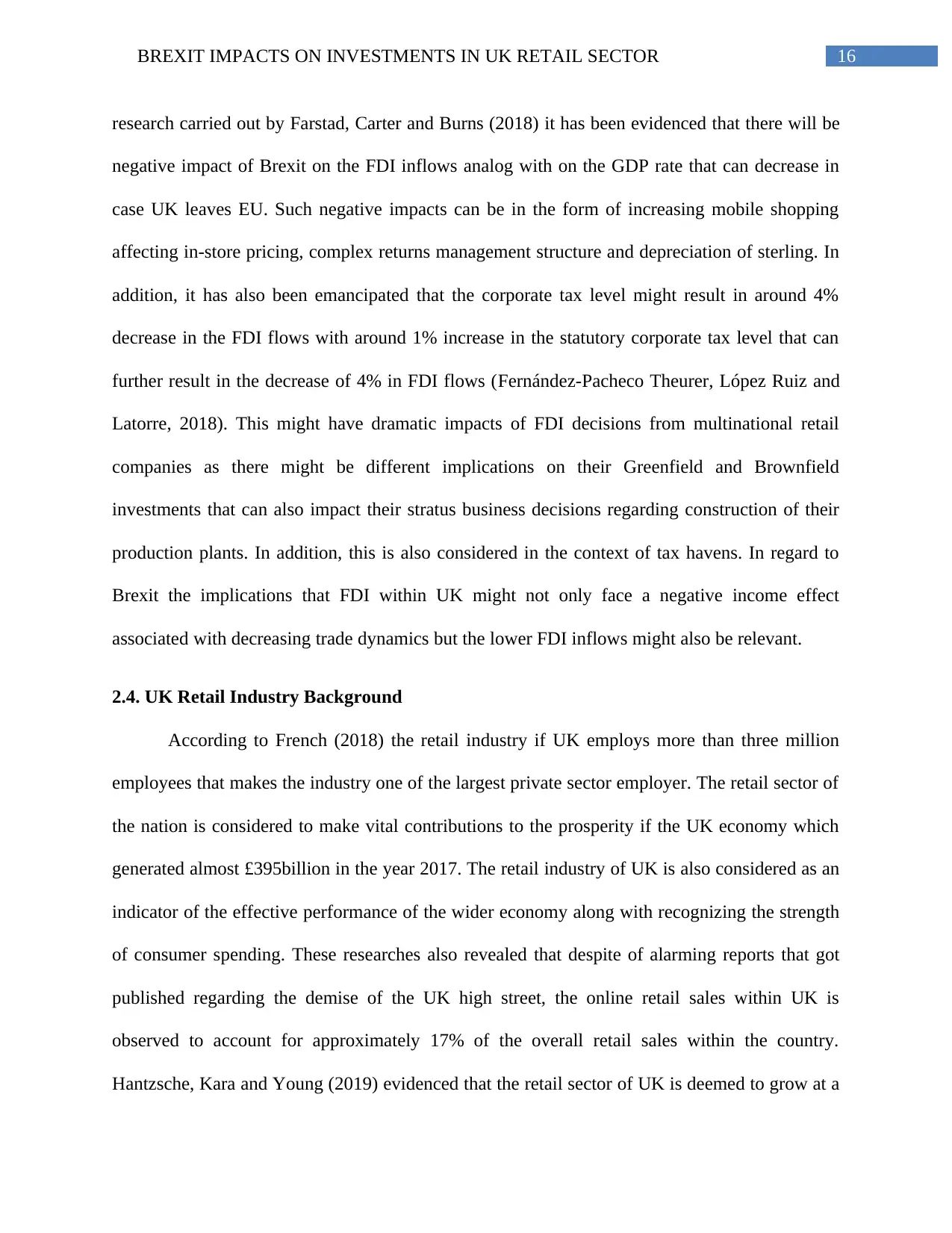
16BREXIT IMPACTS ON INVESTMENTS IN UK RETAIL SECTOR
research carried out by Farstad, Carter and Burns (2018) it has been evidenced that there will be
negative impact of Brexit on the FDI inflows analog with on the GDP rate that can decrease in
case UK leaves EU. Such negative impacts can be in the form of increasing mobile shopping
affecting in-store pricing, complex returns management structure and depreciation of sterling. In
addition, it has also been emancipated that the corporate tax level might result in around 4%
decrease in the FDI flows with around 1% increase in the statutory corporate tax level that can
further result in the decrease of 4% in FDI flows (Fernández-Pacheco Theurer, López Ruiz and
Latorre, 2018). This might have dramatic impacts of FDI decisions from multinational retail
companies as there might be different implications on their Greenfield and Brownfield
investments that can also impact their stratus business decisions regarding construction of their
production plants. In addition, this is also considered in the context of tax havens. In regard to
Brexit the implications that FDI within UK might not only face a negative income effect
associated with decreasing trade dynamics but the lower FDI inflows might also be relevant.
2.4. UK Retail Industry Background
According to French (2018) the retail industry if UK employs more than three million
employees that makes the industry one of the largest private sector employer. The retail sector of
the nation is considered to make vital contributions to the prosperity if the UK economy which
generated almost £395billion in the year 2017. The retail industry of UK is also considered as an
indicator of the effective performance of the wider economy along with recognizing the strength
of consumer spending. These researches also revealed that despite of alarming reports that got
published regarding the demise of the UK high street, the online retail sales within UK is
observed to account for approximately 17% of the overall retail sales within the country.
Hantzsche, Kara and Young (2019) evidenced that the retail sector of UK is deemed to grow at a
research carried out by Farstad, Carter and Burns (2018) it has been evidenced that there will be
negative impact of Brexit on the FDI inflows analog with on the GDP rate that can decrease in
case UK leaves EU. Such negative impacts can be in the form of increasing mobile shopping
affecting in-store pricing, complex returns management structure and depreciation of sterling. In
addition, it has also been emancipated that the corporate tax level might result in around 4%
decrease in the FDI flows with around 1% increase in the statutory corporate tax level that can
further result in the decrease of 4% in FDI flows (Fernández-Pacheco Theurer, López Ruiz and
Latorre, 2018). This might have dramatic impacts of FDI decisions from multinational retail
companies as there might be different implications on their Greenfield and Brownfield
investments that can also impact their stratus business decisions regarding construction of their
production plants. In addition, this is also considered in the context of tax havens. In regard to
Brexit the implications that FDI within UK might not only face a negative income effect
associated with decreasing trade dynamics but the lower FDI inflows might also be relevant.
2.4. UK Retail Industry Background
According to French (2018) the retail industry if UK employs more than three million
employees that makes the industry one of the largest private sector employer. The retail sector of
the nation is considered to make vital contributions to the prosperity if the UK economy which
generated almost £395billion in the year 2017. The retail industry of UK is also considered as an
indicator of the effective performance of the wider economy along with recognizing the strength
of consumer spending. These researches also revealed that despite of alarming reports that got
published regarding the demise of the UK high street, the online retail sales within UK is
observed to account for approximately 17% of the overall retail sales within the country.
Hantzsche, Kara and Young (2019) evidenced that the retail sector of UK is deemed to grow at a
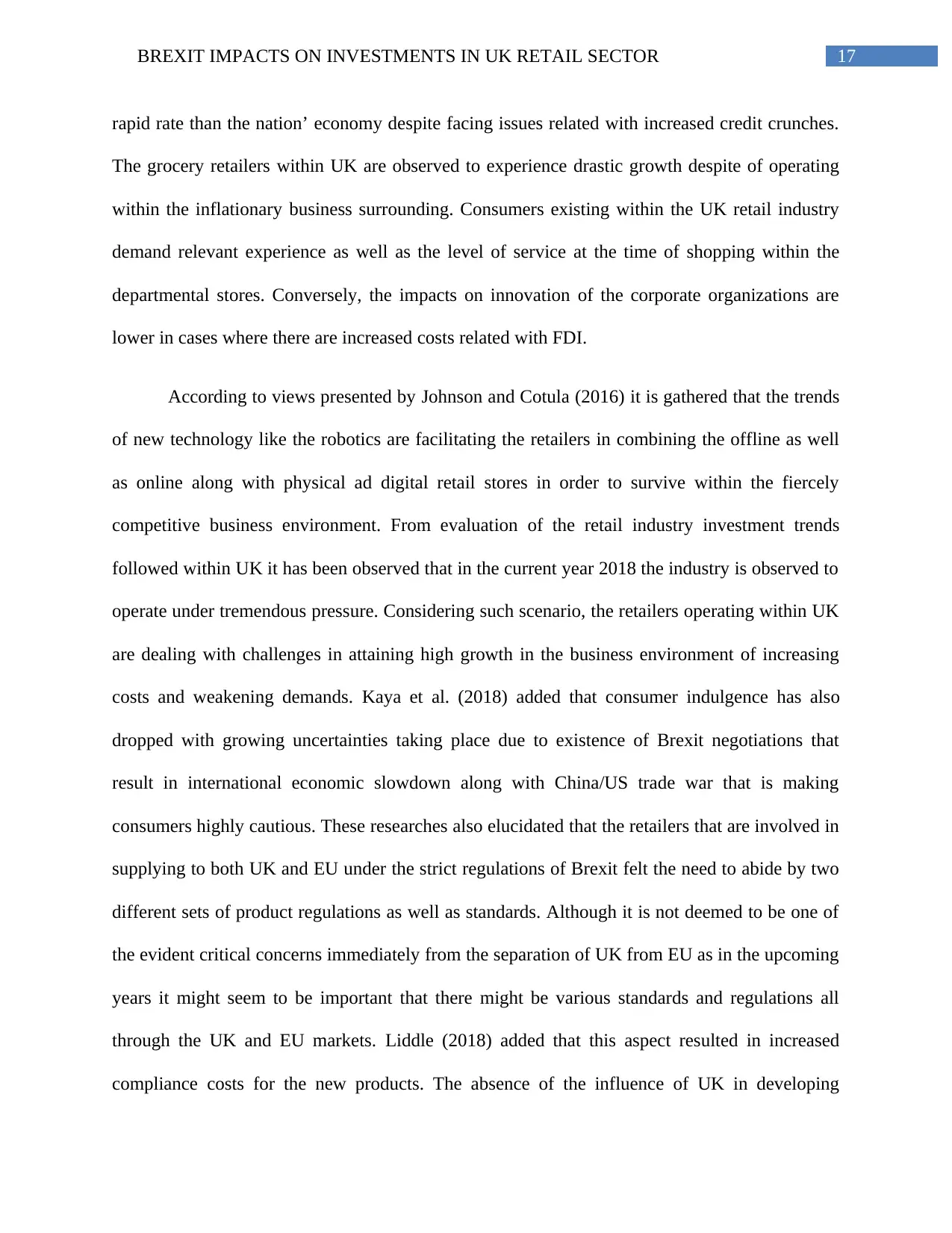
17BREXIT IMPACTS ON INVESTMENTS IN UK RETAIL SECTOR
rapid rate than the nation’ economy despite facing issues related with increased credit crunches.
The grocery retailers within UK are observed to experience drastic growth despite of operating
within the inflationary business surrounding. Consumers existing within the UK retail industry
demand relevant experience as well as the level of service at the time of shopping within the
departmental stores. Conversely, the impacts on innovation of the corporate organizations are
lower in cases where there are increased costs related with FDI.
According to views presented by Johnson and Cotula (2016) it is gathered that the trends
of new technology like the robotics are facilitating the retailers in combining the offline as well
as online along with physical ad digital retail stores in order to survive within the fiercely
competitive business environment. From evaluation of the retail industry investment trends
followed within UK it has been observed that in the current year 2018 the industry is observed to
operate under tremendous pressure. Considering such scenario, the retailers operating within UK
are dealing with challenges in attaining high growth in the business environment of increasing
costs and weakening demands. Kaya et al. (2018) added that consumer indulgence has also
dropped with growing uncertainties taking place due to existence of Brexit negotiations that
result in international economic slowdown along with China/US trade war that is making
consumers highly cautious. These researches also elucidated that the retailers that are involved in
supplying to both UK and EU under the strict regulations of Brexit felt the need to abide by two
different sets of product regulations as well as standards. Although it is not deemed to be one of
the evident critical concerns immediately from the separation of UK from EU as in the upcoming
years it might seem to be important that there might be various standards and regulations all
through the UK and EU markets. Liddle (2018) added that this aspect resulted in increased
compliance costs for the new products. The absence of the influence of UK in developing
rapid rate than the nation’ economy despite facing issues related with increased credit crunches.
The grocery retailers within UK are observed to experience drastic growth despite of operating
within the inflationary business surrounding. Consumers existing within the UK retail industry
demand relevant experience as well as the level of service at the time of shopping within the
departmental stores. Conversely, the impacts on innovation of the corporate organizations are
lower in cases where there are increased costs related with FDI.
According to views presented by Johnson and Cotula (2016) it is gathered that the trends
of new technology like the robotics are facilitating the retailers in combining the offline as well
as online along with physical ad digital retail stores in order to survive within the fiercely
competitive business environment. From evaluation of the retail industry investment trends
followed within UK it has been observed that in the current year 2018 the industry is observed to
operate under tremendous pressure. Considering such scenario, the retailers operating within UK
are dealing with challenges in attaining high growth in the business environment of increasing
costs and weakening demands. Kaya et al. (2018) added that consumer indulgence has also
dropped with growing uncertainties taking place due to existence of Brexit negotiations that
result in international economic slowdown along with China/US trade war that is making
consumers highly cautious. These researches also elucidated that the retailers that are involved in
supplying to both UK and EU under the strict regulations of Brexit felt the need to abide by two
different sets of product regulations as well as standards. Although it is not deemed to be one of
the evident critical concerns immediately from the separation of UK from EU as in the upcoming
years it might seem to be important that there might be various standards and regulations all
through the UK and EU markets. Liddle (2018) added that this aspect resulted in increased
compliance costs for the new products. The absence of the influence of UK in developing
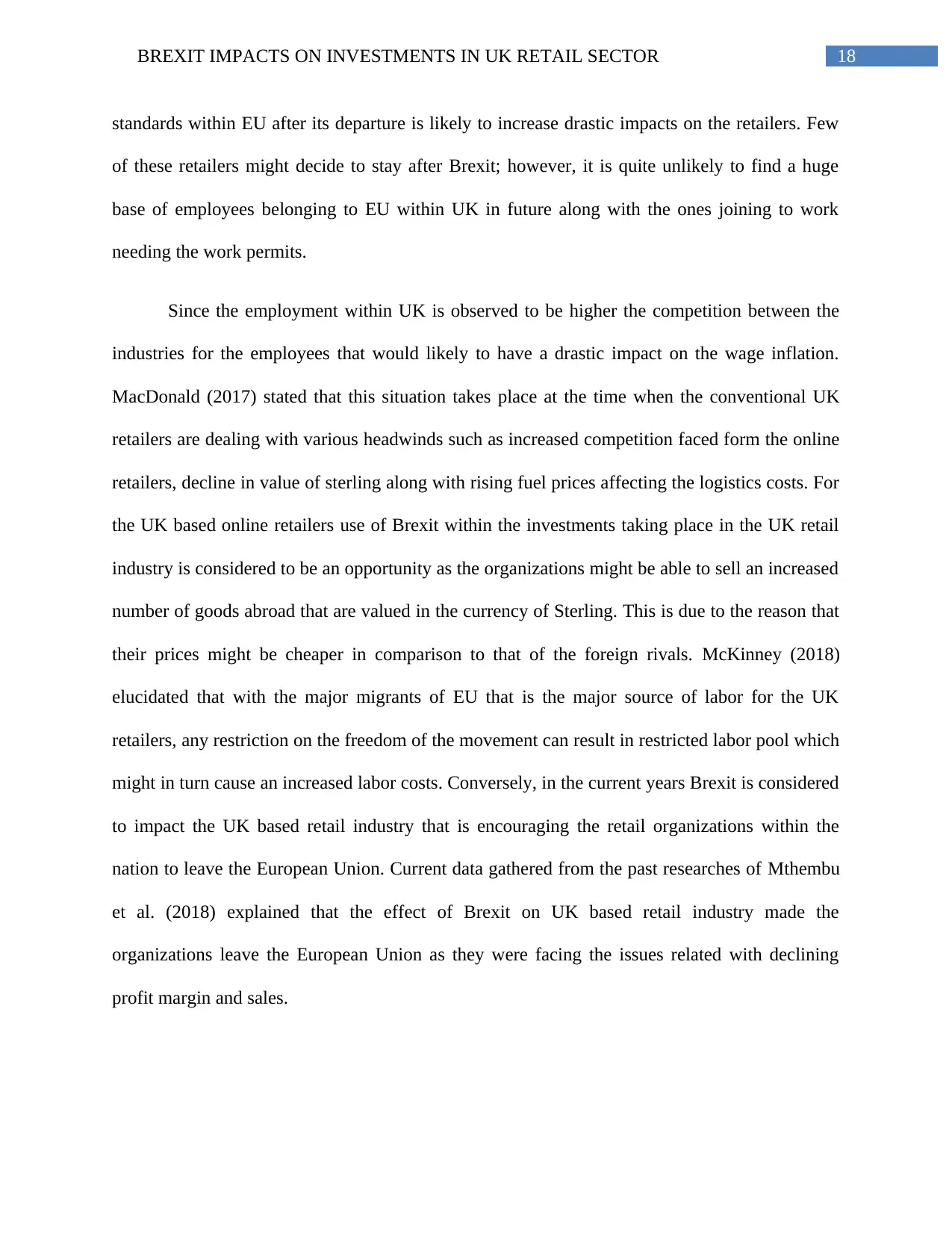
18BREXIT IMPACTS ON INVESTMENTS IN UK RETAIL SECTOR
standards within EU after its departure is likely to increase drastic impacts on the retailers. Few
of these retailers might decide to stay after Brexit; however, it is quite unlikely to find a huge
base of employees belonging to EU within UK in future along with the ones joining to work
needing the work permits.
Since the employment within UK is observed to be higher the competition between the
industries for the employees that would likely to have a drastic impact on the wage inflation.
MacDonald (2017) stated that this situation takes place at the time when the conventional UK
retailers are dealing with various headwinds such as increased competition faced form the online
retailers, decline in value of sterling along with rising fuel prices affecting the logistics costs. For
the UK based online retailers use of Brexit within the investments taking place in the UK retail
industry is considered to be an opportunity as the organizations might be able to sell an increased
number of goods abroad that are valued in the currency of Sterling. This is due to the reason that
their prices might be cheaper in comparison to that of the foreign rivals. McKinney (2018)
elucidated that with the major migrants of EU that is the major source of labor for the UK
retailers, any restriction on the freedom of the movement can result in restricted labor pool which
might in turn cause an increased labor costs. Conversely, in the current years Brexit is considered
to impact the UK based retail industry that is encouraging the retail organizations within the
nation to leave the European Union. Current data gathered from the past researches of Mthembu
et al. (2018) explained that the effect of Brexit on UK based retail industry made the
organizations leave the European Union as they were facing the issues related with declining
profit margin and sales.
standards within EU after its departure is likely to increase drastic impacts on the retailers. Few
of these retailers might decide to stay after Brexit; however, it is quite unlikely to find a huge
base of employees belonging to EU within UK in future along with the ones joining to work
needing the work permits.
Since the employment within UK is observed to be higher the competition between the
industries for the employees that would likely to have a drastic impact on the wage inflation.
MacDonald (2017) stated that this situation takes place at the time when the conventional UK
retailers are dealing with various headwinds such as increased competition faced form the online
retailers, decline in value of sterling along with rising fuel prices affecting the logistics costs. For
the UK based online retailers use of Brexit within the investments taking place in the UK retail
industry is considered to be an opportunity as the organizations might be able to sell an increased
number of goods abroad that are valued in the currency of Sterling. This is due to the reason that
their prices might be cheaper in comparison to that of the foreign rivals. McKinney (2018)
elucidated that with the major migrants of EU that is the major source of labor for the UK
retailers, any restriction on the freedom of the movement can result in restricted labor pool which
might in turn cause an increased labor costs. Conversely, in the current years Brexit is considered
to impact the UK based retail industry that is encouraging the retail organizations within the
nation to leave the European Union. Current data gathered from the past researches of Mthembu
et al. (2018) explained that the effect of Brexit on UK based retail industry made the
organizations leave the European Union as they were facing the issues related with declining
profit margin and sales.
Paraphrase This Document
Need a fresh take? Get an instant paraphrase of this document with our AI Paraphraser
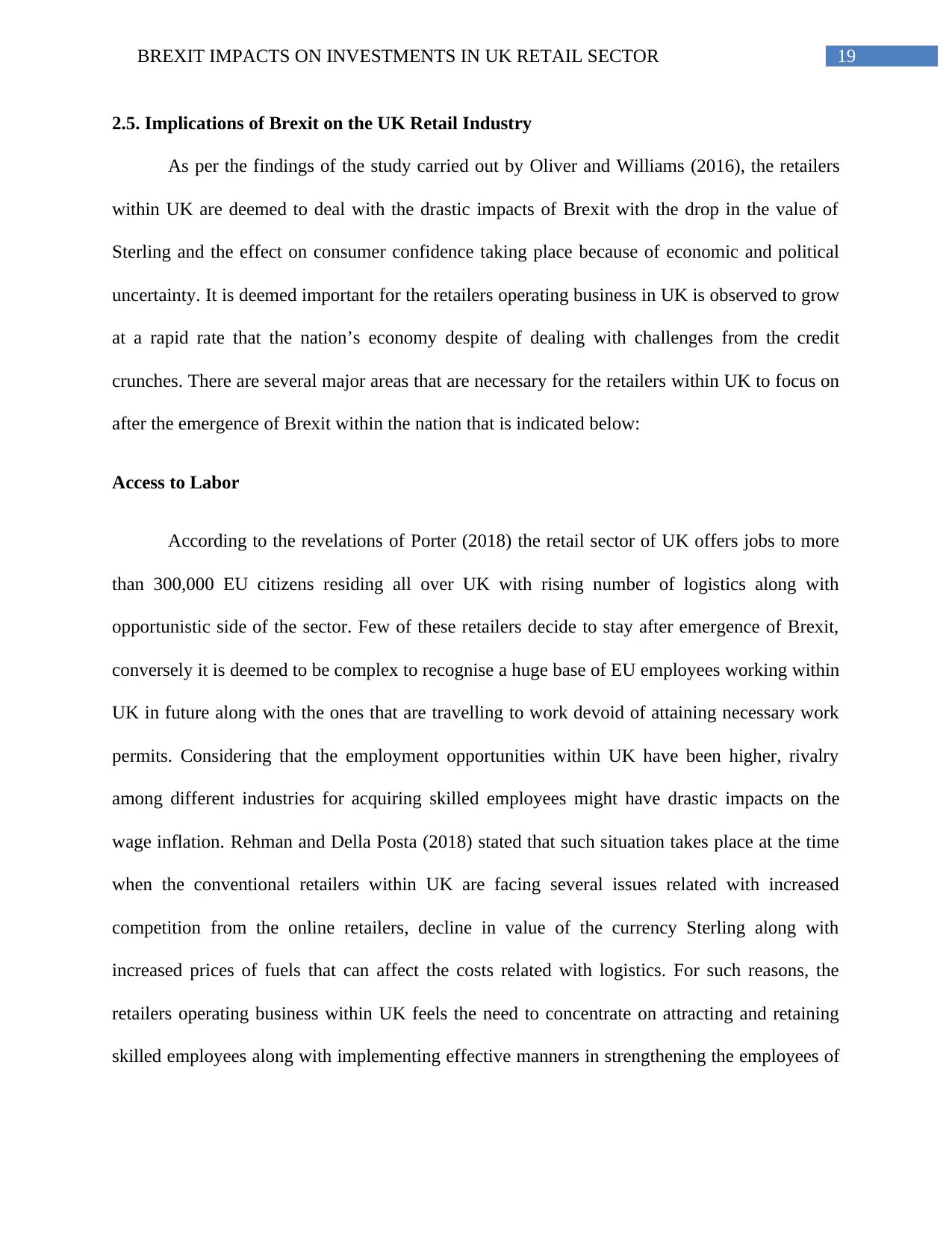
19BREXIT IMPACTS ON INVESTMENTS IN UK RETAIL SECTOR
2.5. Implications of Brexit on the UK Retail Industry
As per the findings of the study carried out by Oliver and Williams (2016), the retailers
within UK are deemed to deal with the drastic impacts of Brexit with the drop in the value of
Sterling and the effect on consumer confidence taking place because of economic and political
uncertainty. It is deemed important for the retailers operating business in UK is observed to grow
at a rapid rate that the nation’s economy despite of dealing with challenges from the credit
crunches. There are several major areas that are necessary for the retailers within UK to focus on
after the emergence of Brexit within the nation that is indicated below:
Access to Labor
According to the revelations of Porter (2018) the retail sector of UK offers jobs to more
than 300,000 EU citizens residing all over UK with rising number of logistics along with
opportunistic side of the sector. Few of these retailers decide to stay after emergence of Brexit,
conversely it is deemed to be complex to recognise a huge base of EU employees working within
UK in future along with the ones that are travelling to work devoid of attaining necessary work
permits. Considering that the employment opportunities within UK have been higher, rivalry
among different industries for acquiring skilled employees might have drastic impacts on the
wage inflation. Rehman and Della Posta (2018) stated that such situation takes place at the time
when the conventional retailers within UK are facing several issues related with increased
competition from the online retailers, decline in value of the currency Sterling along with
increased prices of fuels that can affect the costs related with logistics. For such reasons, the
retailers operating business within UK feels the need to concentrate on attracting and retaining
skilled employees along with implementing effective manners in strengthening the employees of
2.5. Implications of Brexit on the UK Retail Industry
As per the findings of the study carried out by Oliver and Williams (2016), the retailers
within UK are deemed to deal with the drastic impacts of Brexit with the drop in the value of
Sterling and the effect on consumer confidence taking place because of economic and political
uncertainty. It is deemed important for the retailers operating business in UK is observed to grow
at a rapid rate that the nation’s economy despite of dealing with challenges from the credit
crunches. There are several major areas that are necessary for the retailers within UK to focus on
after the emergence of Brexit within the nation that is indicated below:
Access to Labor
According to the revelations of Porter (2018) the retail sector of UK offers jobs to more
than 300,000 EU citizens residing all over UK with rising number of logistics along with
opportunistic side of the sector. Few of these retailers decide to stay after emergence of Brexit,
conversely it is deemed to be complex to recognise a huge base of EU employees working within
UK in future along with the ones that are travelling to work devoid of attaining necessary work
permits. Considering that the employment opportunities within UK have been higher, rivalry
among different industries for acquiring skilled employees might have drastic impacts on the
wage inflation. Rehman and Della Posta (2018) stated that such situation takes place at the time
when the conventional retailers within UK are facing several issues related with increased
competition from the online retailers, decline in value of the currency Sterling along with
increased prices of fuels that can affect the costs related with logistics. For such reasons, the
retailers operating business within UK feels the need to concentrate on attracting and retaining
skilled employees along with implementing effective manners in strengthening the employees of
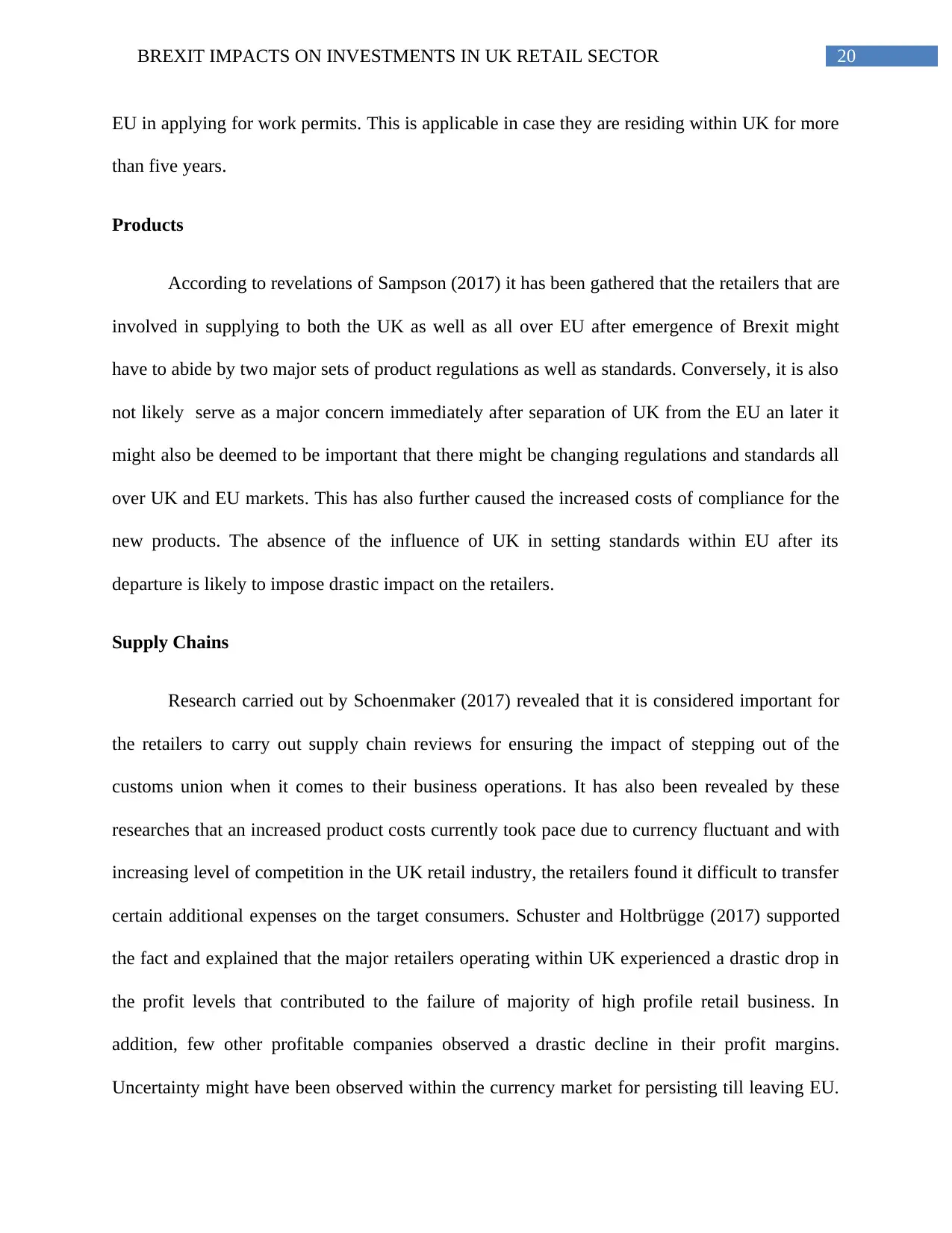
20BREXIT IMPACTS ON INVESTMENTS IN UK RETAIL SECTOR
EU in applying for work permits. This is applicable in case they are residing within UK for more
than five years.
Products
According to revelations of Sampson (2017) it has been gathered that the retailers that are
involved in supplying to both the UK as well as all over EU after emergence of Brexit might
have to abide by two major sets of product regulations as well as standards. Conversely, it is also
not likely serve as a major concern immediately after separation of UK from the EU an later it
might also be deemed to be important that there might be changing regulations and standards all
over UK and EU markets. This has also further caused the increased costs of compliance for the
new products. The absence of the influence of UK in setting standards within EU after its
departure is likely to impose drastic impact on the retailers.
Supply Chains
Research carried out by Schoenmaker (2017) revealed that it is considered important for
the retailers to carry out supply chain reviews for ensuring the impact of stepping out of the
customs union when it comes to their business operations. It has also been revealed by these
researches that an increased product costs currently took pace due to currency fluctuant and with
increasing level of competition in the UK retail industry, the retailers found it difficult to transfer
certain additional expenses on the target consumers. Schuster and Holtbrügge (2017) supported
the fact and explained that the major retailers operating within UK experienced a drastic drop in
the profit levels that contributed to the failure of majority of high profile retail business. In
addition, few other profitable companies observed a drastic decline in their profit margins.
Uncertainty might have been observed within the currency market for persisting till leaving EU.
EU in applying for work permits. This is applicable in case they are residing within UK for more
than five years.
Products
According to revelations of Sampson (2017) it has been gathered that the retailers that are
involved in supplying to both the UK as well as all over EU after emergence of Brexit might
have to abide by two major sets of product regulations as well as standards. Conversely, it is also
not likely serve as a major concern immediately after separation of UK from the EU an later it
might also be deemed to be important that there might be changing regulations and standards all
over UK and EU markets. This has also further caused the increased costs of compliance for the
new products. The absence of the influence of UK in setting standards within EU after its
departure is likely to impose drastic impact on the retailers.
Supply Chains
Research carried out by Schoenmaker (2017) revealed that it is considered important for
the retailers to carry out supply chain reviews for ensuring the impact of stepping out of the
customs union when it comes to their business operations. It has also been revealed by these
researches that an increased product costs currently took pace due to currency fluctuant and with
increasing level of competition in the UK retail industry, the retailers found it difficult to transfer
certain additional expenses on the target consumers. Schuster and Holtbrügge (2017) supported
the fact and explained that the major retailers operating within UK experienced a drastic drop in
the profit levels that contributed to the failure of majority of high profile retail business. In
addition, few other profitable companies observed a drastic decline in their profit margins.
Uncertainty might have been observed within the currency market for persisting till leaving EU.
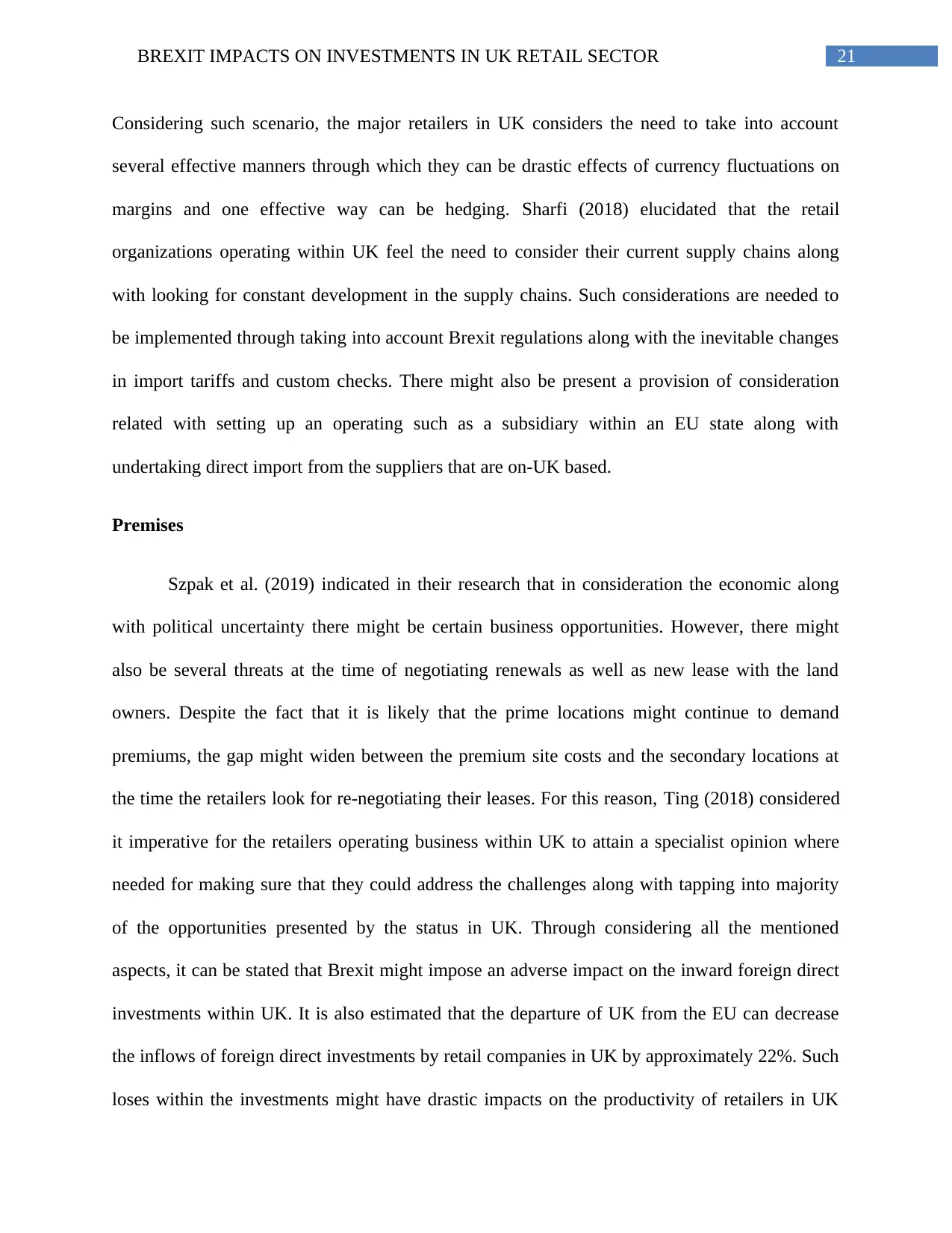
21BREXIT IMPACTS ON INVESTMENTS IN UK RETAIL SECTOR
Considering such scenario, the major retailers in UK considers the need to take into account
several effective manners through which they can be drastic effects of currency fluctuations on
margins and one effective way can be hedging. Sharfi (2018) elucidated that the retail
organizations operating within UK feel the need to consider their current supply chains along
with looking for constant development in the supply chains. Such considerations are needed to
be implemented through taking into account Brexit regulations along with the inevitable changes
in import tariffs and custom checks. There might also be present a provision of consideration
related with setting up an operating such as a subsidiary within an EU state along with
undertaking direct import from the suppliers that are on-UK based.
Premises
Szpak et al. (2019) indicated in their research that in consideration the economic along
with political uncertainty there might be certain business opportunities. However, there might
also be several threats at the time of negotiating renewals as well as new lease with the land
owners. Despite the fact that it is likely that the prime locations might continue to demand
premiums, the gap might widen between the premium site costs and the secondary locations at
the time the retailers look for re-negotiating their leases. For this reason, Ting (2018) considered
it imperative for the retailers operating business within UK to attain a specialist opinion where
needed for making sure that they could address the challenges along with tapping into majority
of the opportunities presented by the status in UK. Through considering all the mentioned
aspects, it can be stated that Brexit might impose an adverse impact on the inward foreign direct
investments within UK. It is also estimated that the departure of UK from the EU can decrease
the inflows of foreign direct investments by retail companies in UK by approximately 22%. Such
loses within the investments might have drastic impacts on the productivity of retailers in UK
Considering such scenario, the major retailers in UK considers the need to take into account
several effective manners through which they can be drastic effects of currency fluctuations on
margins and one effective way can be hedging. Sharfi (2018) elucidated that the retail
organizations operating within UK feel the need to consider their current supply chains along
with looking for constant development in the supply chains. Such considerations are needed to
be implemented through taking into account Brexit regulations along with the inevitable changes
in import tariffs and custom checks. There might also be present a provision of consideration
related with setting up an operating such as a subsidiary within an EU state along with
undertaking direct import from the suppliers that are on-UK based.
Premises
Szpak et al. (2019) indicated in their research that in consideration the economic along
with political uncertainty there might be certain business opportunities. However, there might
also be several threats at the time of negotiating renewals as well as new lease with the land
owners. Despite the fact that it is likely that the prime locations might continue to demand
premiums, the gap might widen between the premium site costs and the secondary locations at
the time the retailers look for re-negotiating their leases. For this reason, Ting (2018) considered
it imperative for the retailers operating business within UK to attain a specialist opinion where
needed for making sure that they could address the challenges along with tapping into majority
of the opportunities presented by the status in UK. Through considering all the mentioned
aspects, it can be stated that Brexit might impose an adverse impact on the inward foreign direct
investments within UK. It is also estimated that the departure of UK from the EU can decrease
the inflows of foreign direct investments by retail companies in UK by approximately 22%. Such
loses within the investments might have drastic impacts on the productivity of retailers in UK
Secure Best Marks with AI Grader
Need help grading? Try our AI Grader for instant feedback on your assignments.
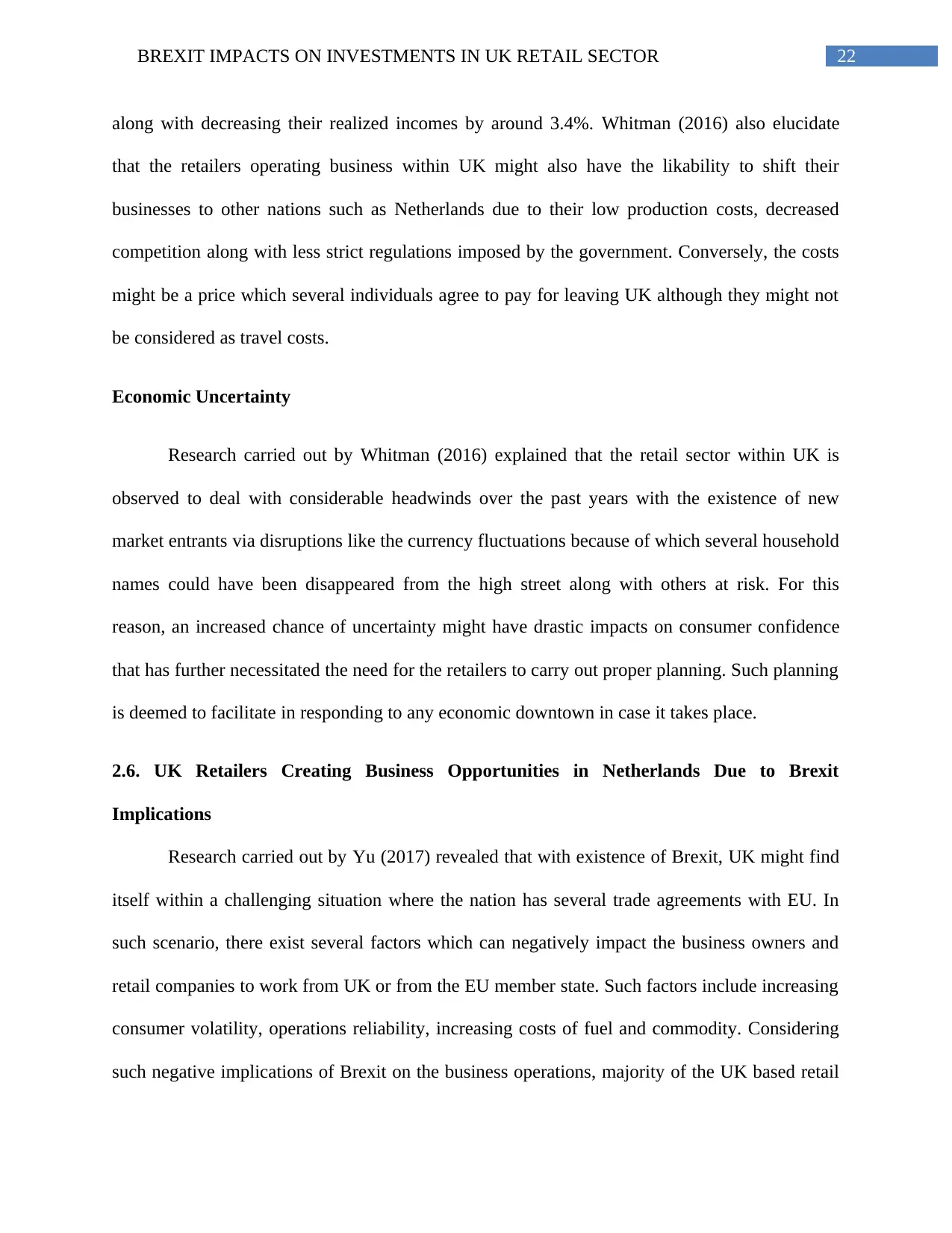
22BREXIT IMPACTS ON INVESTMENTS IN UK RETAIL SECTOR
along with decreasing their realized incomes by around 3.4%. Whitman (2016) also elucidate
that the retailers operating business within UK might also have the likability to shift their
businesses to other nations such as Netherlands due to their low production costs, decreased
competition along with less strict regulations imposed by the government. Conversely, the costs
might be a price which several individuals agree to pay for leaving UK although they might not
be considered as travel costs.
Economic Uncertainty
Research carried out by Whitman (2016) explained that the retail sector within UK is
observed to deal with considerable headwinds over the past years with the existence of new
market entrants via disruptions like the currency fluctuations because of which several household
names could have been disappeared from the high street along with others at risk. For this
reason, an increased chance of uncertainty might have drastic impacts on consumer confidence
that has further necessitated the need for the retailers to carry out proper planning. Such planning
is deemed to facilitate in responding to any economic downtown in case it takes place.
2.6. UK Retailers Creating Business Opportunities in Netherlands Due to Brexit
Implications
Research carried out by Yu (2017) revealed that with existence of Brexit, UK might find
itself within a challenging situation where the nation has several trade agreements with EU. In
such scenario, there exist several factors which can negatively impact the business owners and
retail companies to work from UK or from the EU member state. Such factors include increasing
consumer volatility, operations reliability, increasing costs of fuel and commodity. Considering
such negative implications of Brexit on the business operations, majority of the UK based retail
along with decreasing their realized incomes by around 3.4%. Whitman (2016) also elucidate
that the retailers operating business within UK might also have the likability to shift their
businesses to other nations such as Netherlands due to their low production costs, decreased
competition along with less strict regulations imposed by the government. Conversely, the costs
might be a price which several individuals agree to pay for leaving UK although they might not
be considered as travel costs.
Economic Uncertainty
Research carried out by Whitman (2016) explained that the retail sector within UK is
observed to deal with considerable headwinds over the past years with the existence of new
market entrants via disruptions like the currency fluctuations because of which several household
names could have been disappeared from the high street along with others at risk. For this
reason, an increased chance of uncertainty might have drastic impacts on consumer confidence
that has further necessitated the need for the retailers to carry out proper planning. Such planning
is deemed to facilitate in responding to any economic downtown in case it takes place.
2.6. UK Retailers Creating Business Opportunities in Netherlands Due to Brexit
Implications
Research carried out by Yu (2017) revealed that with existence of Brexit, UK might find
itself within a challenging situation where the nation has several trade agreements with EU. In
such scenario, there exist several factors which can negatively impact the business owners and
retail companies to work from UK or from the EU member state. Such factors include increasing
consumer volatility, operations reliability, increasing costs of fuel and commodity. Considering
such negative implications of Brexit on the business operations, majority of the UK based retail
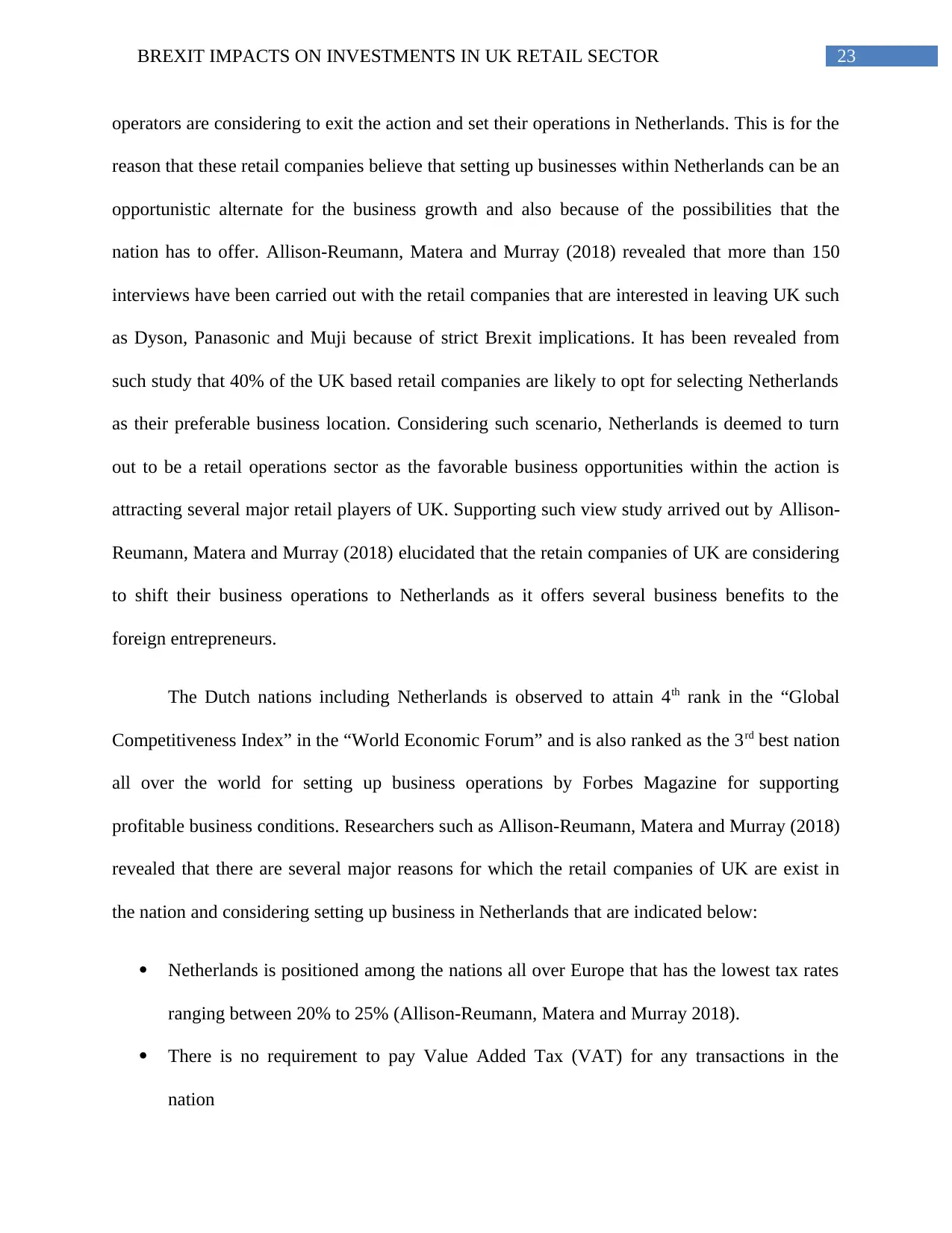
23BREXIT IMPACTS ON INVESTMENTS IN UK RETAIL SECTOR
operators are considering to exit the action and set their operations in Netherlands. This is for the
reason that these retail companies believe that setting up businesses within Netherlands can be an
opportunistic alternate for the business growth and also because of the possibilities that the
nation has to offer. Allison-Reumann, Matera and Murray (2018) revealed that more than 150
interviews have been carried out with the retail companies that are interested in leaving UK such
as Dyson, Panasonic and Muji because of strict Brexit implications. It has been revealed from
such study that 40% of the UK based retail companies are likely to opt for selecting Netherlands
as their preferable business location. Considering such scenario, Netherlands is deemed to turn
out to be a retail operations sector as the favorable business opportunities within the action is
attracting several major retail players of UK. Supporting such view study arrived out by Allison-
Reumann, Matera and Murray (2018) elucidated that the retain companies of UK are considering
to shift their business operations to Netherlands as it offers several business benefits to the
foreign entrepreneurs.
The Dutch nations including Netherlands is observed to attain 4th rank in the “Global
Competitiveness Index” in the “World Economic Forum” and is also ranked as the 3rd best nation
all over the world for setting up business operations by Forbes Magazine for supporting
profitable business conditions. Researchers such as Allison-Reumann, Matera and Murray (2018)
revealed that there are several major reasons for which the retail companies of UK are exist in
the nation and considering setting up business in Netherlands that are indicated below:
Netherlands is positioned among the nations all over Europe that has the lowest tax rates
ranging between 20% to 25% (Allison-Reumann, Matera and Murray 2018).
There is no requirement to pay Value Added Tax (VAT) for any transactions in the
nation
operators are considering to exit the action and set their operations in Netherlands. This is for the
reason that these retail companies believe that setting up businesses within Netherlands can be an
opportunistic alternate for the business growth and also because of the possibilities that the
nation has to offer. Allison-Reumann, Matera and Murray (2018) revealed that more than 150
interviews have been carried out with the retail companies that are interested in leaving UK such
as Dyson, Panasonic and Muji because of strict Brexit implications. It has been revealed from
such study that 40% of the UK based retail companies are likely to opt for selecting Netherlands
as their preferable business location. Considering such scenario, Netherlands is deemed to turn
out to be a retail operations sector as the favorable business opportunities within the action is
attracting several major retail players of UK. Supporting such view study arrived out by Allison-
Reumann, Matera and Murray (2018) elucidated that the retain companies of UK are considering
to shift their business operations to Netherlands as it offers several business benefits to the
foreign entrepreneurs.
The Dutch nations including Netherlands is observed to attain 4th rank in the “Global
Competitiveness Index” in the “World Economic Forum” and is also ranked as the 3rd best nation
all over the world for setting up business operations by Forbes Magazine for supporting
profitable business conditions. Researchers such as Allison-Reumann, Matera and Murray (2018)
revealed that there are several major reasons for which the retail companies of UK are exist in
the nation and considering setting up business in Netherlands that are indicated below:
Netherlands is positioned among the nations all over Europe that has the lowest tax rates
ranging between 20% to 25% (Allison-Reumann, Matera and Murray 2018).
There is no requirement to pay Value Added Tax (VAT) for any transactions in the
nation
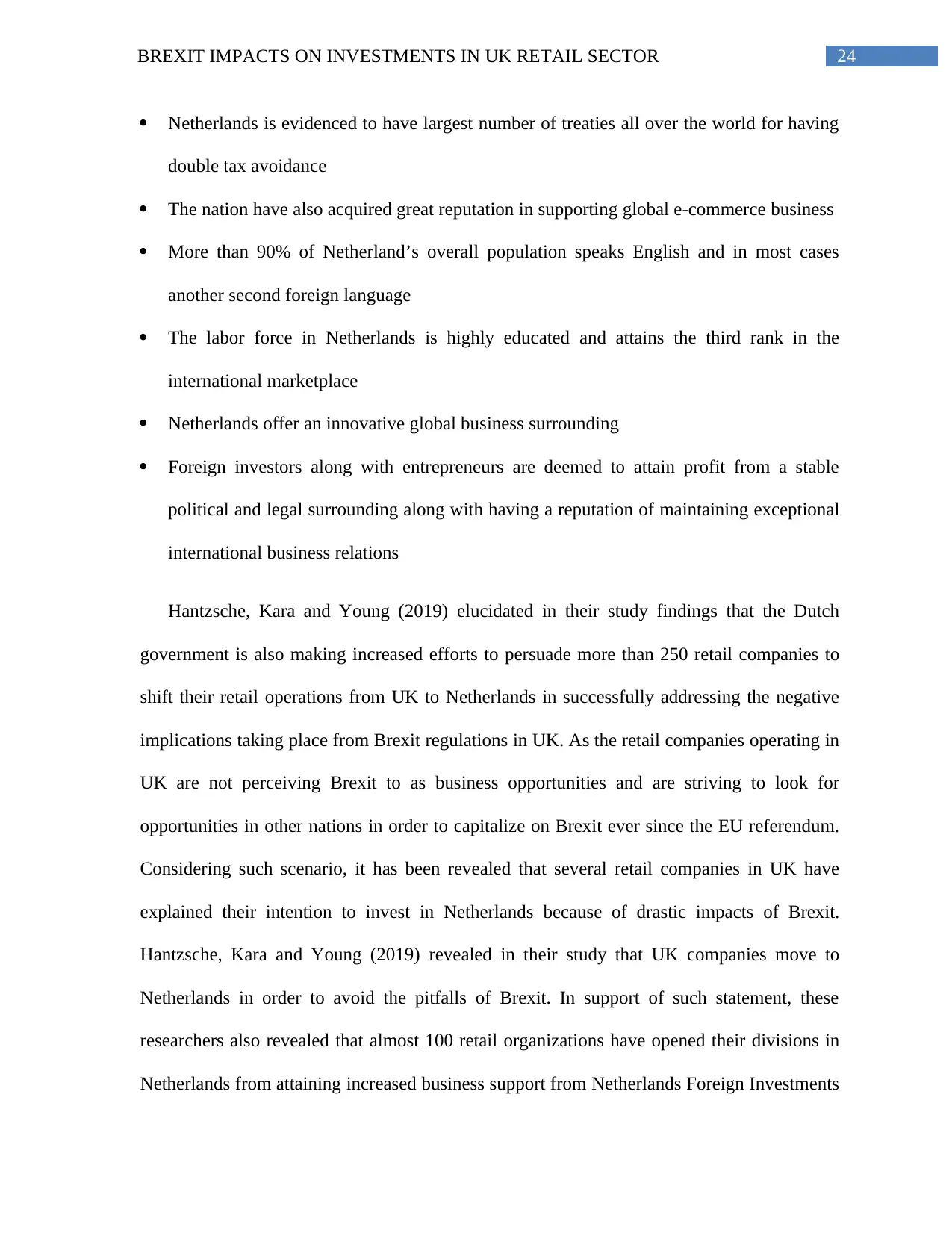
24BREXIT IMPACTS ON INVESTMENTS IN UK RETAIL SECTOR
Netherlands is evidenced to have largest number of treaties all over the world for having
double tax avoidance
The nation have also acquired great reputation in supporting global e-commerce business
More than 90% of Netherland’s overall population speaks English and in most cases
another second foreign language
The labor force in Netherlands is highly educated and attains the third rank in the
international marketplace
Netherlands offer an innovative global business surrounding
Foreign investors along with entrepreneurs are deemed to attain profit from a stable
political and legal surrounding along with having a reputation of maintaining exceptional
international business relations
Hantzsche, Kara and Young (2019) elucidated in their study findings that the Dutch
government is also making increased efforts to persuade more than 250 retail companies to
shift their retail operations from UK to Netherlands in successfully addressing the negative
implications taking place from Brexit regulations in UK. As the retail companies operating in
UK are not perceiving Brexit to as business opportunities and are striving to look for
opportunities in other nations in order to capitalize on Brexit ever since the EU referendum.
Considering such scenario, it has been revealed that several retail companies in UK have
explained their intention to invest in Netherlands because of drastic impacts of Brexit.
Hantzsche, Kara and Young (2019) revealed in their study that UK companies move to
Netherlands in order to avoid the pitfalls of Brexit. In support of such statement, these
researchers also revealed that almost 100 retail organizations have opened their divisions in
Netherlands from attaining increased business support from Netherlands Foreign Investments
Netherlands is evidenced to have largest number of treaties all over the world for having
double tax avoidance
The nation have also acquired great reputation in supporting global e-commerce business
More than 90% of Netherland’s overall population speaks English and in most cases
another second foreign language
The labor force in Netherlands is highly educated and attains the third rank in the
international marketplace
Netherlands offer an innovative global business surrounding
Foreign investors along with entrepreneurs are deemed to attain profit from a stable
political and legal surrounding along with having a reputation of maintaining exceptional
international business relations
Hantzsche, Kara and Young (2019) elucidated in their study findings that the Dutch
government is also making increased efforts to persuade more than 250 retail companies to
shift their retail operations from UK to Netherlands in successfully addressing the negative
implications taking place from Brexit regulations in UK. As the retail companies operating in
UK are not perceiving Brexit to as business opportunities and are striving to look for
opportunities in other nations in order to capitalize on Brexit ever since the EU referendum.
Considering such scenario, it has been revealed that several retail companies in UK have
explained their intention to invest in Netherlands because of drastic impacts of Brexit.
Hantzsche, Kara and Young (2019) revealed in their study that UK companies move to
Netherlands in order to avoid the pitfalls of Brexit. In support of such statement, these
researchers also revealed that almost 100 retail organizations have opened their divisions in
Netherlands from attaining increased business support from Netherlands Foreign Investments
Paraphrase This Document
Need a fresh take? Get an instant paraphrase of this document with our AI Paraphraser
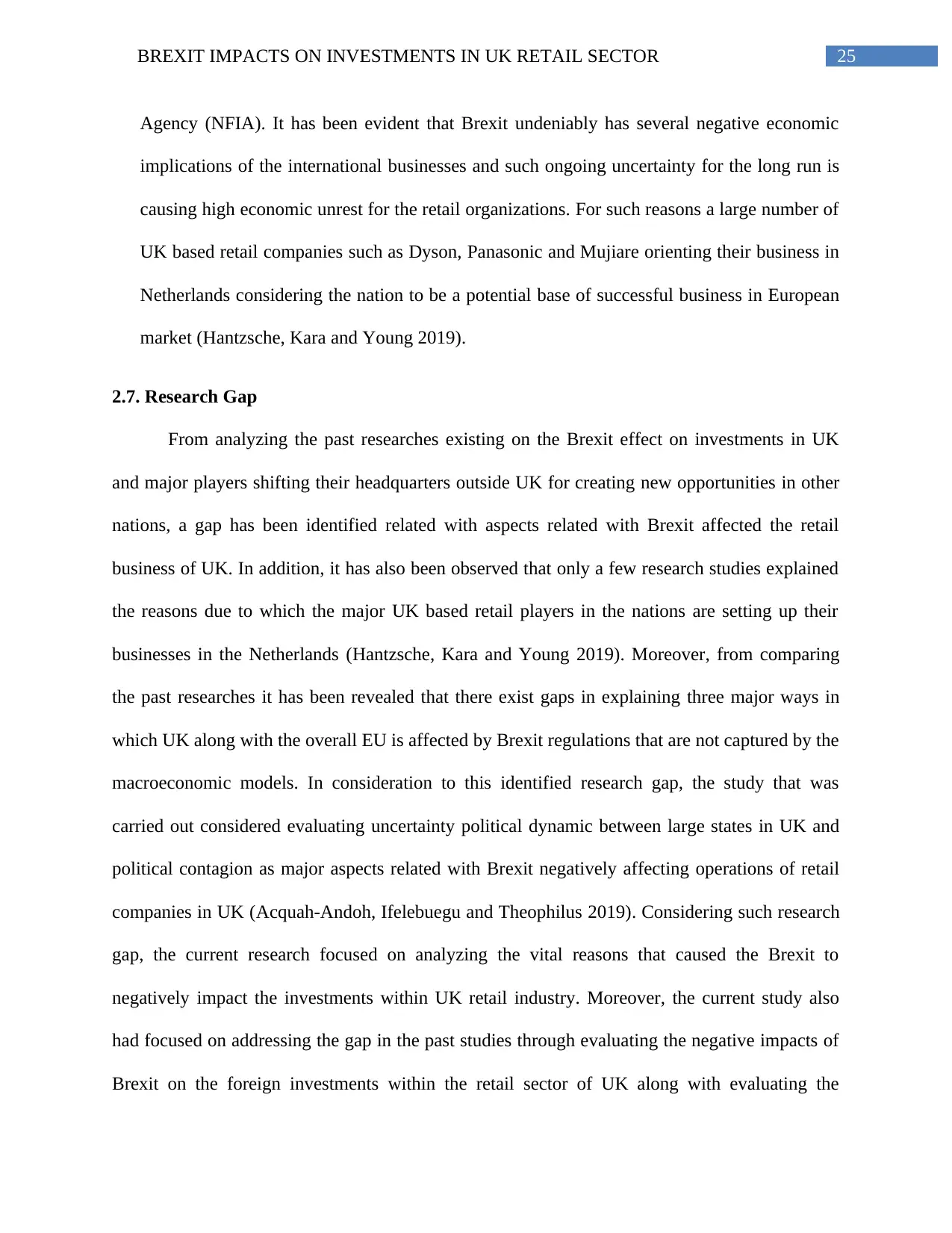
25BREXIT IMPACTS ON INVESTMENTS IN UK RETAIL SECTOR
Agency (NFIA). It has been evident that Brexit undeniably has several negative economic
implications of the international businesses and such ongoing uncertainty for the long run is
causing high economic unrest for the retail organizations. For such reasons a large number of
UK based retail companies such as Dyson, Panasonic and Mujiare orienting their business in
Netherlands considering the nation to be a potential base of successful business in European
market (Hantzsche, Kara and Young 2019).
2.7. Research Gap
From analyzing the past researches existing on the Brexit effect on investments in UK
and major players shifting their headquarters outside UK for creating new opportunities in other
nations, a gap has been identified related with aspects related with Brexit affected the retail
business of UK. In addition, it has also been observed that only a few research studies explained
the reasons due to which the major UK based retail players in the nations are setting up their
businesses in the Netherlands (Hantzsche, Kara and Young 2019). Moreover, from comparing
the past researches it has been revealed that there exist gaps in explaining three major ways in
which UK along with the overall EU is affected by Brexit regulations that are not captured by the
macroeconomic models. In consideration to this identified research gap, the study that was
carried out considered evaluating uncertainty political dynamic between large states in UK and
political contagion as major aspects related with Brexit negatively affecting operations of retail
companies in UK (Acquah-Andoh, Ifelebuegu and Theophilus 2019). Considering such research
gap, the current research focused on analyzing the vital reasons that caused the Brexit to
negatively impact the investments within UK retail industry. Moreover, the current study also
had focused on addressing the gap in the past studies through evaluating the negative impacts of
Brexit on the foreign investments within the retail sector of UK along with evaluating the
Agency (NFIA). It has been evident that Brexit undeniably has several negative economic
implications of the international businesses and such ongoing uncertainty for the long run is
causing high economic unrest for the retail organizations. For such reasons a large number of
UK based retail companies such as Dyson, Panasonic and Mujiare orienting their business in
Netherlands considering the nation to be a potential base of successful business in European
market (Hantzsche, Kara and Young 2019).
2.7. Research Gap
From analyzing the past researches existing on the Brexit effect on investments in UK
and major players shifting their headquarters outside UK for creating new opportunities in other
nations, a gap has been identified related with aspects related with Brexit affected the retail
business of UK. In addition, it has also been observed that only a few research studies explained
the reasons due to which the major UK based retail players in the nations are setting up their
businesses in the Netherlands (Hantzsche, Kara and Young 2019). Moreover, from comparing
the past researches it has been revealed that there exist gaps in explaining three major ways in
which UK along with the overall EU is affected by Brexit regulations that are not captured by the
macroeconomic models. In consideration to this identified research gap, the study that was
carried out considered evaluating uncertainty political dynamic between large states in UK and
political contagion as major aspects related with Brexit negatively affecting operations of retail
companies in UK (Acquah-Andoh, Ifelebuegu and Theophilus 2019). Considering such research
gap, the current research focused on analyzing the vital reasons that caused the Brexit to
negatively impact the investments within UK retail industry. Moreover, the current study also
had focused on addressing the gap in the past studies through evaluating the negative impacts of
Brexit on the foreign investments within the retail sector of UK along with evaluating the
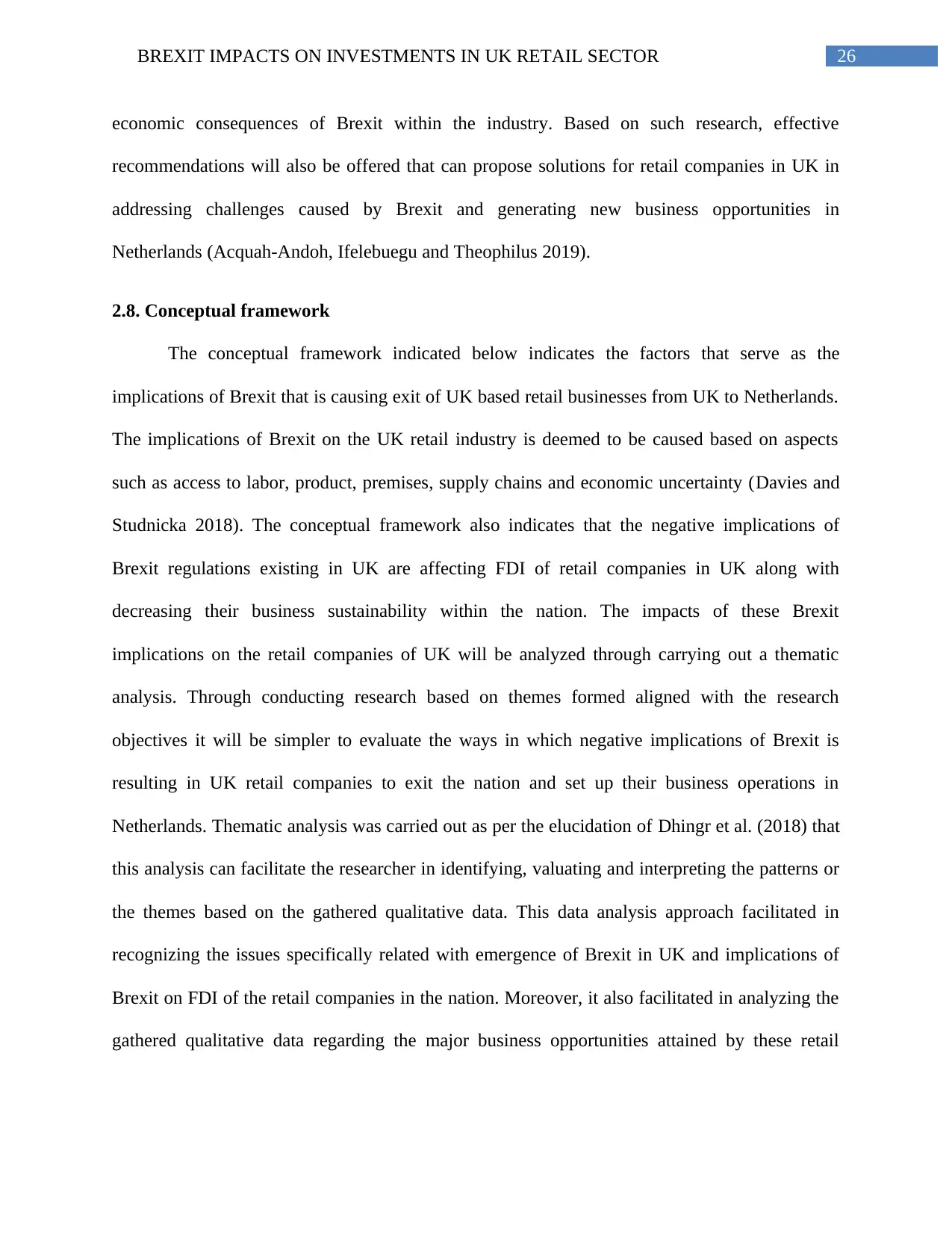
26BREXIT IMPACTS ON INVESTMENTS IN UK RETAIL SECTOR
economic consequences of Brexit within the industry. Based on such research, effective
recommendations will also be offered that can propose solutions for retail companies in UK in
addressing challenges caused by Brexit and generating new business opportunities in
Netherlands (Acquah-Andoh, Ifelebuegu and Theophilus 2019).
2.8. Conceptual framework
The conceptual framework indicated below indicates the factors that serve as the
implications of Brexit that is causing exit of UK based retail businesses from UK to Netherlands.
The implications of Brexit on the UK retail industry is deemed to be caused based on aspects
such as access to labor, product, premises, supply chains and economic uncertainty (Davies and
Studnicka 2018). The conceptual framework also indicates that the negative implications of
Brexit regulations existing in UK are affecting FDI of retail companies in UK along with
decreasing their business sustainability within the nation. The impacts of these Brexit
implications on the retail companies of UK will be analyzed through carrying out a thematic
analysis. Through conducting research based on themes formed aligned with the research
objectives it will be simpler to evaluate the ways in which negative implications of Brexit is
resulting in UK retail companies to exit the nation and set up their business operations in
Netherlands. Thematic analysis was carried out as per the elucidation of Dhingr et al. (2018) that
this analysis can facilitate the researcher in identifying, valuating and interpreting the patterns or
the themes based on the gathered qualitative data. This data analysis approach facilitated in
recognizing the issues specifically related with emergence of Brexit in UK and implications of
Brexit on FDI of the retail companies in the nation. Moreover, it also facilitated in analyzing the
gathered qualitative data regarding the major business opportunities attained by these retail
economic consequences of Brexit within the industry. Based on such research, effective
recommendations will also be offered that can propose solutions for retail companies in UK in
addressing challenges caused by Brexit and generating new business opportunities in
Netherlands (Acquah-Andoh, Ifelebuegu and Theophilus 2019).
2.8. Conceptual framework
The conceptual framework indicated below indicates the factors that serve as the
implications of Brexit that is causing exit of UK based retail businesses from UK to Netherlands.
The implications of Brexit on the UK retail industry is deemed to be caused based on aspects
such as access to labor, product, premises, supply chains and economic uncertainty (Davies and
Studnicka 2018). The conceptual framework also indicates that the negative implications of
Brexit regulations existing in UK are affecting FDI of retail companies in UK along with
decreasing their business sustainability within the nation. The impacts of these Brexit
implications on the retail companies of UK will be analyzed through carrying out a thematic
analysis. Through conducting research based on themes formed aligned with the research
objectives it will be simpler to evaluate the ways in which negative implications of Brexit is
resulting in UK retail companies to exit the nation and set up their business operations in
Netherlands. Thematic analysis was carried out as per the elucidation of Dhingr et al. (2018) that
this analysis can facilitate the researcher in identifying, valuating and interpreting the patterns or
the themes based on the gathered qualitative data. This data analysis approach facilitated in
recognizing the issues specifically related with emergence of Brexit in UK and implications of
Brexit on FDI of the retail companies in the nation. Moreover, it also facilitated in analyzing the
gathered qualitative data regarding the major business opportunities attained by these retail
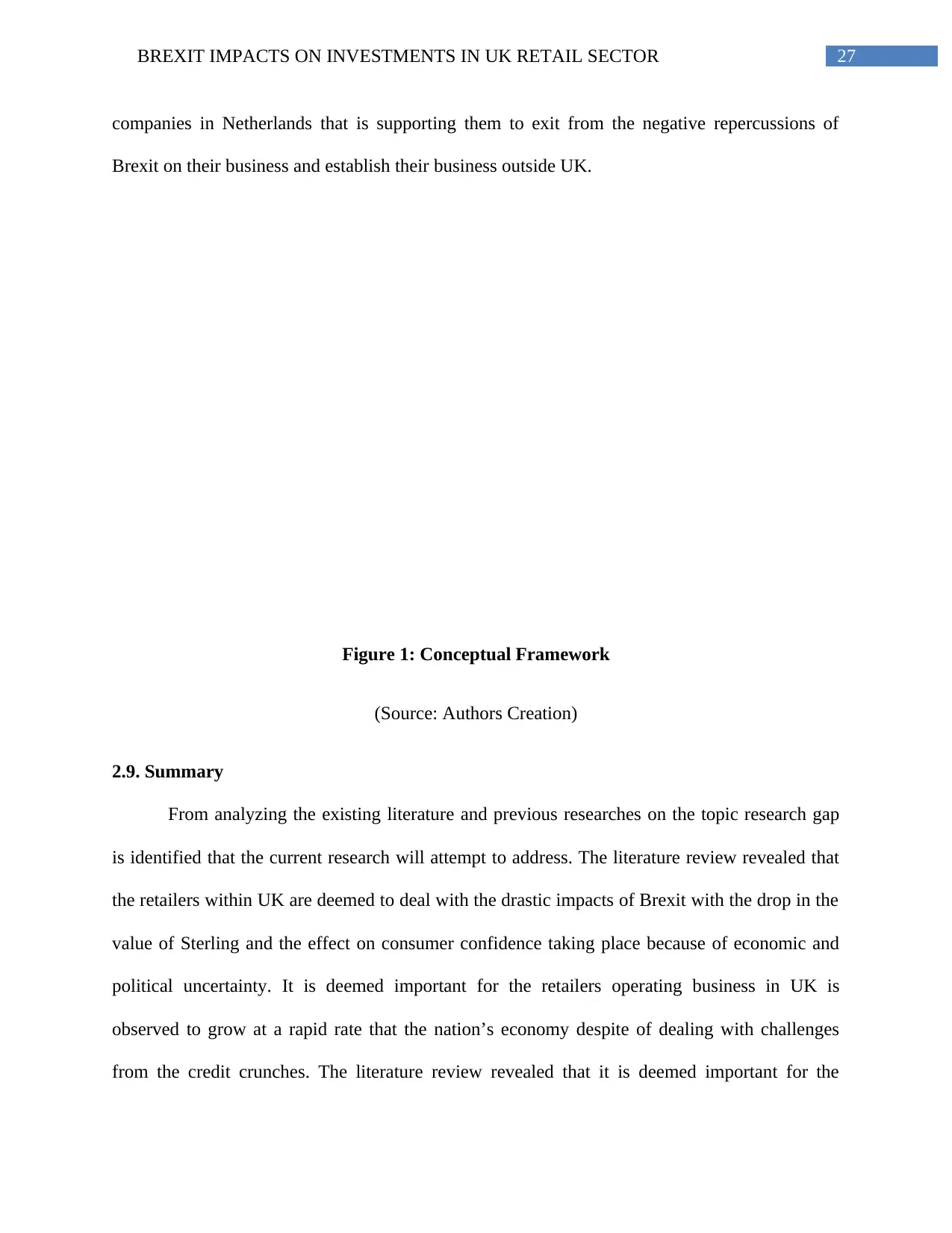
27BREXIT IMPACTS ON INVESTMENTS IN UK RETAIL SECTOR
companies in Netherlands that is supporting them to exit from the negative repercussions of
Brexit on their business and establish their business outside UK.
Figure 1: Conceptual Framework
(Source: Authors Creation)
2.9. Summary
From analyzing the existing literature and previous researches on the topic research gap
is identified that the current research will attempt to address. The literature review revealed that
the retailers within UK are deemed to deal with the drastic impacts of Brexit with the drop in the
value of Sterling and the effect on consumer confidence taking place because of economic and
political uncertainty. It is deemed important for the retailers operating business in UK is
observed to grow at a rapid rate that the nation’s economy despite of dealing with challenges
from the credit crunches. The literature review revealed that it is deemed important for the
ProductPremises
companies in Netherlands that is supporting them to exit from the negative repercussions of
Brexit on their business and establish their business outside UK.
Figure 1: Conceptual Framework
(Source: Authors Creation)
2.9. Summary
From analyzing the existing literature and previous researches on the topic research gap
is identified that the current research will attempt to address. The literature review revealed that
the retailers within UK are deemed to deal with the drastic impacts of Brexit with the drop in the
value of Sterling and the effect on consumer confidence taking place because of economic and
political uncertainty. It is deemed important for the retailers operating business in UK is
observed to grow at a rapid rate that the nation’s economy despite of dealing with challenges
from the credit crunches. The literature review revealed that it is deemed important for the
ProductPremises
Secure Best Marks with AI Grader
Need help grading? Try our AI Grader for instant feedback on your assignments.
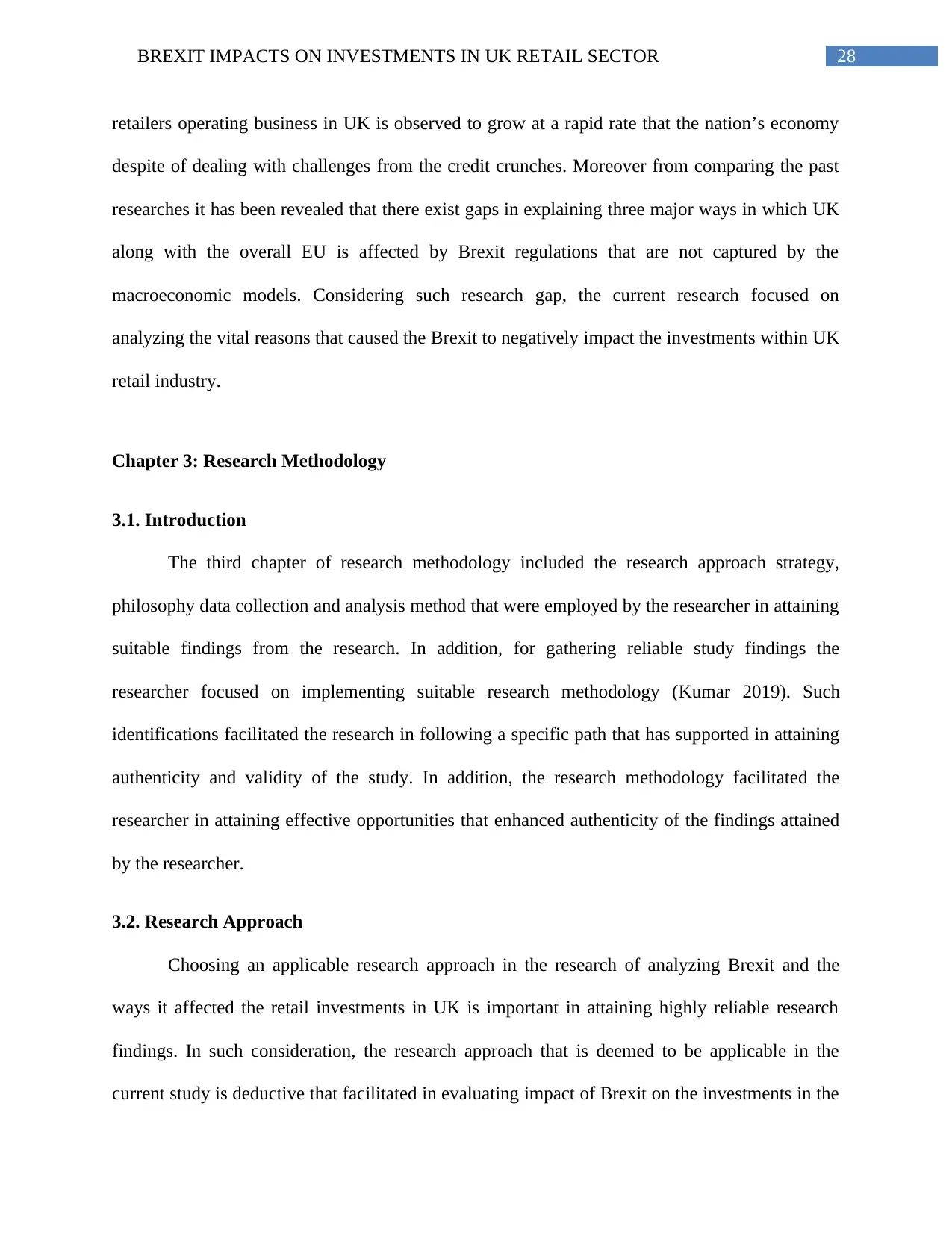
28BREXIT IMPACTS ON INVESTMENTS IN UK RETAIL SECTOR
retailers operating business in UK is observed to grow at a rapid rate that the nation’s economy
despite of dealing with challenges from the credit crunches. Moreover from comparing the past
researches it has been revealed that there exist gaps in explaining three major ways in which UK
along with the overall EU is affected by Brexit regulations that are not captured by the
macroeconomic models. Considering such research gap, the current research focused on
analyzing the vital reasons that caused the Brexit to negatively impact the investments within UK
retail industry.
Chapter 3: Research Methodology
3.1. Introduction
The third chapter of research methodology included the research approach strategy,
philosophy data collection and analysis method that were employed by the researcher in attaining
suitable findings from the research. In addition, for gathering reliable study findings the
researcher focused on implementing suitable research methodology (Kumar 2019). Such
identifications facilitated the research in following a specific path that has supported in attaining
authenticity and validity of the study. In addition, the research methodology facilitated the
researcher in attaining effective opportunities that enhanced authenticity of the findings attained
by the researcher.
3.2. Research Approach
Choosing an applicable research approach in the research of analyzing Brexit and the
ways it affected the retail investments in UK is important in attaining highly reliable research
findings. In such consideration, the research approach that is deemed to be applicable in the
current study is deductive that facilitated in evaluating impact of Brexit on the investments in the
retailers operating business in UK is observed to grow at a rapid rate that the nation’s economy
despite of dealing with challenges from the credit crunches. Moreover from comparing the past
researches it has been revealed that there exist gaps in explaining three major ways in which UK
along with the overall EU is affected by Brexit regulations that are not captured by the
macroeconomic models. Considering such research gap, the current research focused on
analyzing the vital reasons that caused the Brexit to negatively impact the investments within UK
retail industry.
Chapter 3: Research Methodology
3.1. Introduction
The third chapter of research methodology included the research approach strategy,
philosophy data collection and analysis method that were employed by the researcher in attaining
suitable findings from the research. In addition, for gathering reliable study findings the
researcher focused on implementing suitable research methodology (Kumar 2019). Such
identifications facilitated the research in following a specific path that has supported in attaining
authenticity and validity of the study. In addition, the research methodology facilitated the
researcher in attaining effective opportunities that enhanced authenticity of the findings attained
by the researcher.
3.2. Research Approach
Choosing an applicable research approach in the research of analyzing Brexit and the
ways it affected the retail investments in UK is important in attaining highly reliable research
findings. In such consideration, the research approach that is deemed to be applicable in the
current study is deductive that facilitated in evaluating impact of Brexit on the investments in the
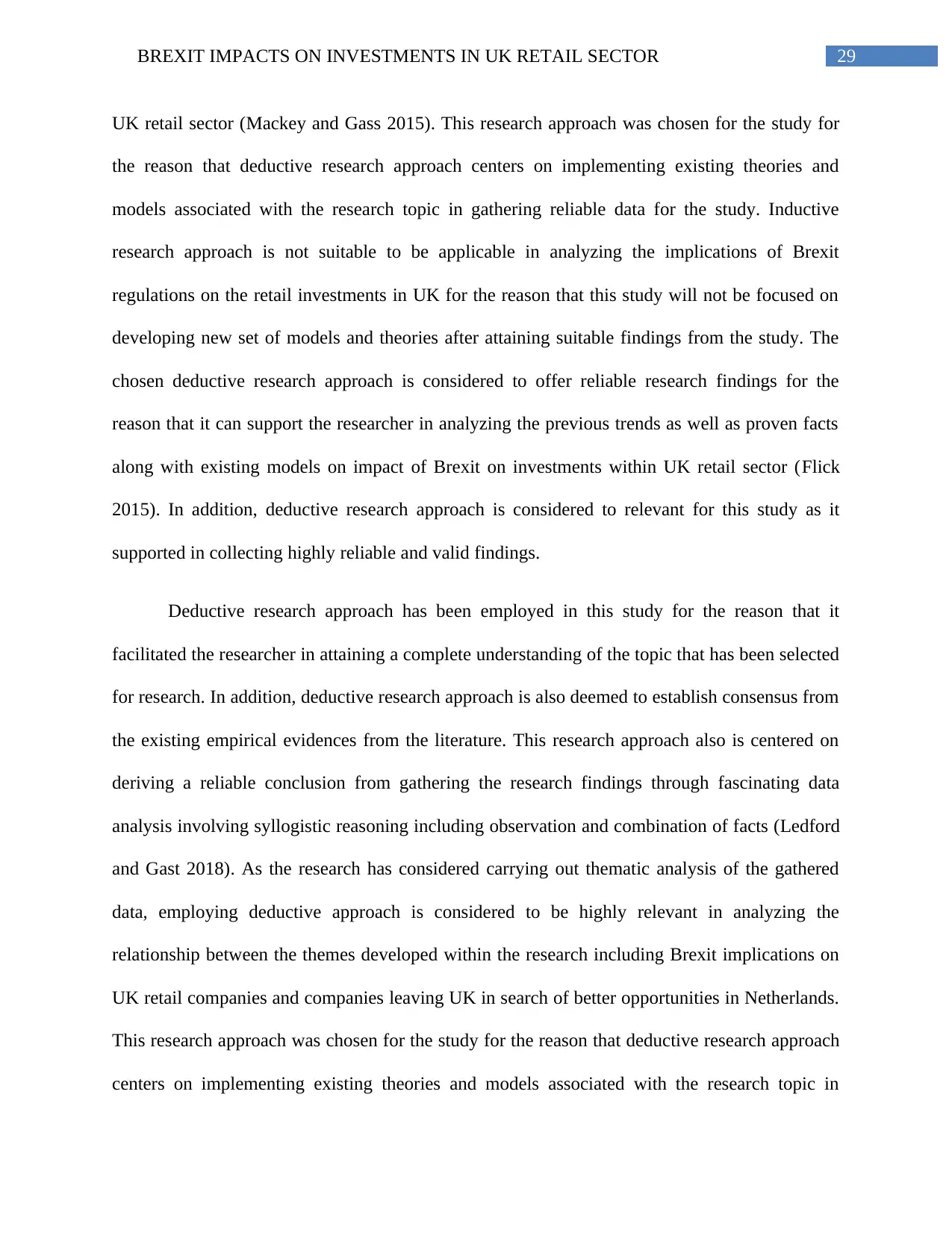
29BREXIT IMPACTS ON INVESTMENTS IN UK RETAIL SECTOR
UK retail sector (Mackey and Gass 2015). This research approach was chosen for the study for
the reason that deductive research approach centers on implementing existing theories and
models associated with the research topic in gathering reliable data for the study. Inductive
research approach is not suitable to be applicable in analyzing the implications of Brexit
regulations on the retail investments in UK for the reason that this study will not be focused on
developing new set of models and theories after attaining suitable findings from the study. The
chosen deductive research approach is considered to offer reliable research findings for the
reason that it can support the researcher in analyzing the previous trends as well as proven facts
along with existing models on impact of Brexit on investments within UK retail sector (Flick
2015). In addition, deductive research approach is considered to relevant for this study as it
supported in collecting highly reliable and valid findings.
Deductive research approach has been employed in this study for the reason that it
facilitated the researcher in attaining a complete understanding of the topic that has been selected
for research. In addition, deductive research approach is also deemed to establish consensus from
the existing empirical evidences from the literature. This research approach also is centered on
deriving a reliable conclusion from gathering the research findings through fascinating data
analysis involving syllogistic reasoning including observation and combination of facts (Ledford
and Gast 2018). As the research has considered carrying out thematic analysis of the gathered
data, employing deductive approach is considered to be highly relevant in analyzing the
relationship between the themes developed within the research including Brexit implications on
UK retail companies and companies leaving UK in search of better opportunities in Netherlands.
This research approach was chosen for the study for the reason that deductive research approach
centers on implementing existing theories and models associated with the research topic in
UK retail sector (Mackey and Gass 2015). This research approach was chosen for the study for
the reason that deductive research approach centers on implementing existing theories and
models associated with the research topic in gathering reliable data for the study. Inductive
research approach is not suitable to be applicable in analyzing the implications of Brexit
regulations on the retail investments in UK for the reason that this study will not be focused on
developing new set of models and theories after attaining suitable findings from the study. The
chosen deductive research approach is considered to offer reliable research findings for the
reason that it can support the researcher in analyzing the previous trends as well as proven facts
along with existing models on impact of Brexit on investments within UK retail sector (Flick
2015). In addition, deductive research approach is considered to relevant for this study as it
supported in collecting highly reliable and valid findings.
Deductive research approach has been employed in this study for the reason that it
facilitated the researcher in attaining a complete understanding of the topic that has been selected
for research. In addition, deductive research approach is also deemed to establish consensus from
the existing empirical evidences from the literature. This research approach also is centered on
deriving a reliable conclusion from gathering the research findings through fascinating data
analysis involving syllogistic reasoning including observation and combination of facts (Ledford
and Gast 2018). As the research has considered carrying out thematic analysis of the gathered
data, employing deductive approach is considered to be highly relevant in analyzing the
relationship between the themes developed within the research including Brexit implications on
UK retail companies and companies leaving UK in search of better opportunities in Netherlands.
This research approach was chosen for the study for the reason that deductive research approach
centers on implementing existing theories and models associated with the research topic in
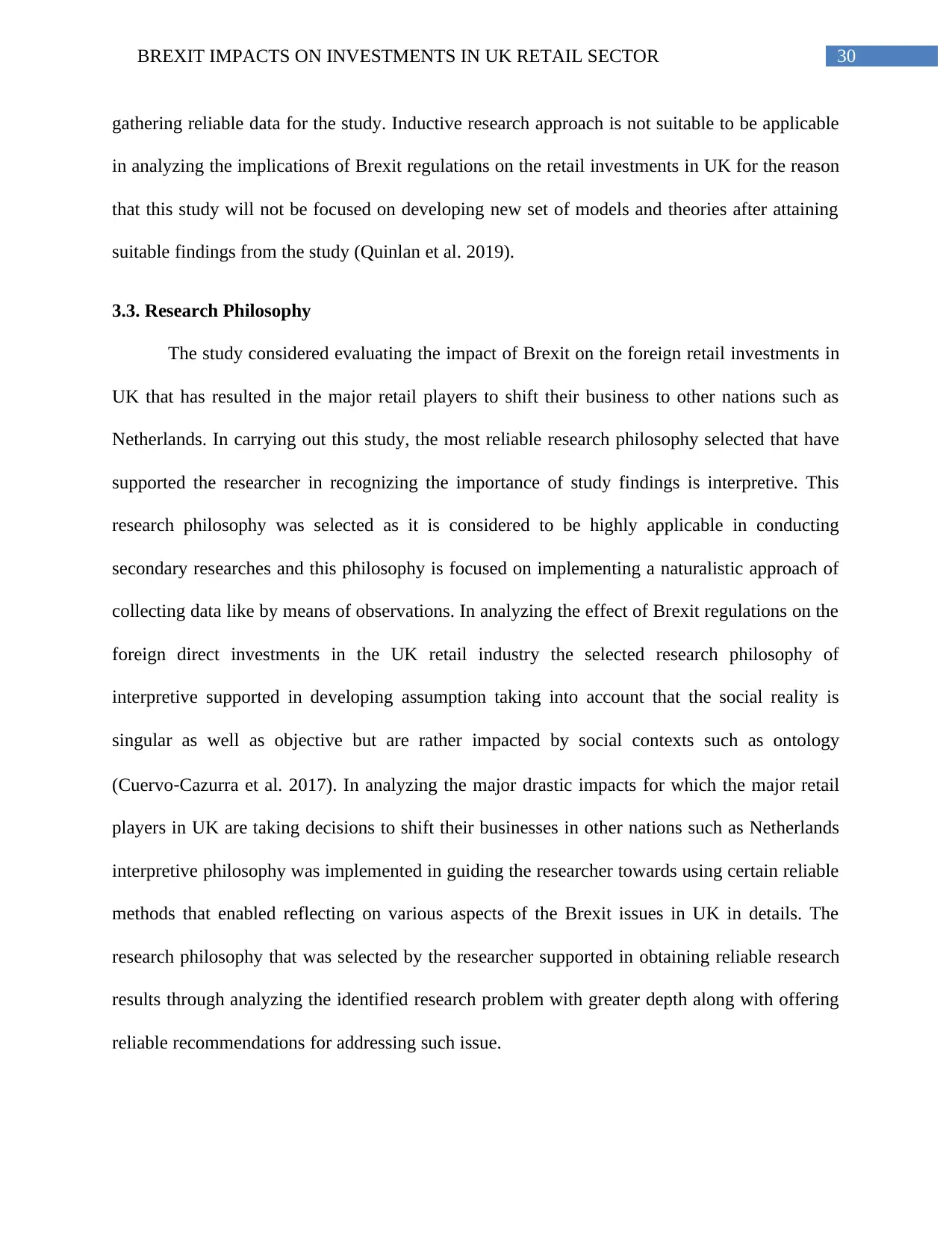
30BREXIT IMPACTS ON INVESTMENTS IN UK RETAIL SECTOR
gathering reliable data for the study. Inductive research approach is not suitable to be applicable
in analyzing the implications of Brexit regulations on the retail investments in UK for the reason
that this study will not be focused on developing new set of models and theories after attaining
suitable findings from the study (Quinlan et al. 2019).
3.3. Research Philosophy
The study considered evaluating the impact of Brexit on the foreign retail investments in
UK that has resulted in the major retail players to shift their business to other nations such as
Netherlands. In carrying out this study, the most reliable research philosophy selected that have
supported the researcher in recognizing the importance of study findings is interpretive. This
research philosophy was selected as it is considered to be highly applicable in conducting
secondary researches and this philosophy is focused on implementing a naturalistic approach of
collecting data like by means of observations. In analyzing the effect of Brexit regulations on the
foreign direct investments in the UK retail industry the selected research philosophy of
interpretive supported in developing assumption taking into account that the social reality is
singular as well as objective but are rather impacted by social contexts such as ontology
(Cuervo‐Cazurra et al. 2017). In analyzing the major drastic impacts for which the major retail
players in UK are taking decisions to shift their businesses in other nations such as Netherlands
interpretive philosophy was implemented in guiding the researcher towards using certain reliable
methods that enabled reflecting on various aspects of the Brexit issues in UK in details. The
research philosophy that was selected by the researcher supported in obtaining reliable research
results through analyzing the identified research problem with greater depth along with offering
reliable recommendations for addressing such issue.
gathering reliable data for the study. Inductive research approach is not suitable to be applicable
in analyzing the implications of Brexit regulations on the retail investments in UK for the reason
that this study will not be focused on developing new set of models and theories after attaining
suitable findings from the study (Quinlan et al. 2019).
3.3. Research Philosophy
The study considered evaluating the impact of Brexit on the foreign retail investments in
UK that has resulted in the major retail players to shift their business to other nations such as
Netherlands. In carrying out this study, the most reliable research philosophy selected that have
supported the researcher in recognizing the importance of study findings is interpretive. This
research philosophy was selected as it is considered to be highly applicable in conducting
secondary researches and this philosophy is focused on implementing a naturalistic approach of
collecting data like by means of observations. In analyzing the effect of Brexit regulations on the
foreign direct investments in the UK retail industry the selected research philosophy of
interpretive supported in developing assumption taking into account that the social reality is
singular as well as objective but are rather impacted by social contexts such as ontology
(Cuervo‐Cazurra et al. 2017). In analyzing the major drastic impacts for which the major retail
players in UK are taking decisions to shift their businesses in other nations such as Netherlands
interpretive philosophy was implemented in guiding the researcher towards using certain reliable
methods that enabled reflecting on various aspects of the Brexit issues in UK in details. The
research philosophy that was selected by the researcher supported in obtaining reliable research
results through analyzing the identified research problem with greater depth along with offering
reliable recommendations for addressing such issue.
Paraphrase This Document
Need a fresh take? Get an instant paraphrase of this document with our AI Paraphraser
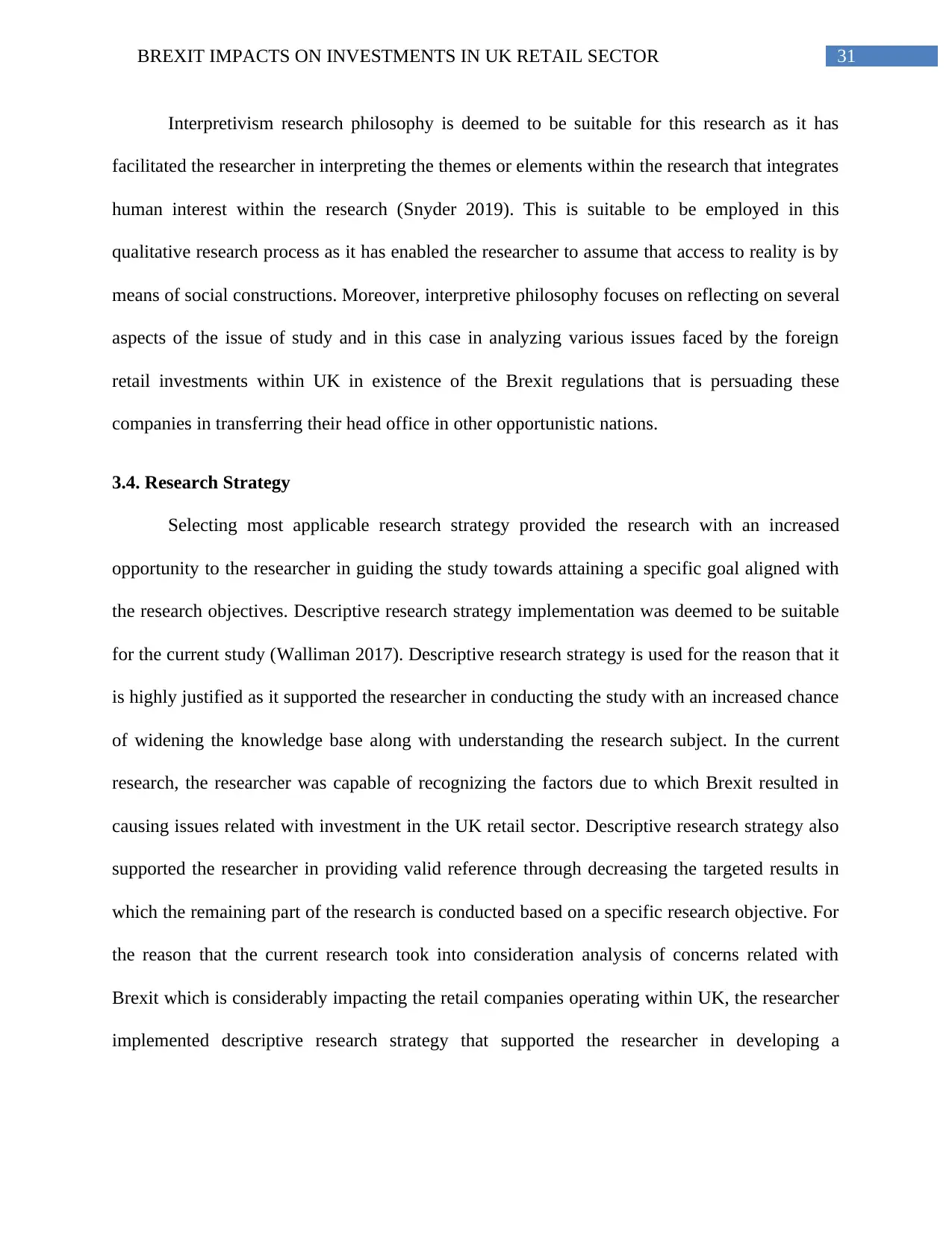
31BREXIT IMPACTS ON INVESTMENTS IN UK RETAIL SECTOR
Interpretivism research philosophy is deemed to be suitable for this research as it has
facilitated the researcher in interpreting the themes or elements within the research that integrates
human interest within the research (Snyder 2019). This is suitable to be employed in this
qualitative research process as it has enabled the researcher to assume that access to reality is by
means of social constructions. Moreover, interpretive philosophy focuses on reflecting on several
aspects of the issue of study and in this case in analyzing various issues faced by the foreign
retail investments within UK in existence of the Brexit regulations that is persuading these
companies in transferring their head office in other opportunistic nations.
3.4. Research Strategy
Selecting most applicable research strategy provided the research with an increased
opportunity to the researcher in guiding the study towards attaining a specific goal aligned with
the research objectives. Descriptive research strategy implementation was deemed to be suitable
for the current study (Walliman 2017). Descriptive research strategy is used for the reason that it
is highly justified as it supported the researcher in conducting the study with an increased chance
of widening the knowledge base along with understanding the research subject. In the current
research, the researcher was capable of recognizing the factors due to which Brexit resulted in
causing issues related with investment in the UK retail sector. Descriptive research strategy also
supported the researcher in providing valid reference through decreasing the targeted results in
which the remaining part of the research is conducted based on a specific research objective. For
the reason that the current research took into consideration analysis of concerns related with
Brexit which is considerably impacting the retail companies operating within UK, the researcher
implemented descriptive research strategy that supported the researcher in developing a
Interpretivism research philosophy is deemed to be suitable for this research as it has
facilitated the researcher in interpreting the themes or elements within the research that integrates
human interest within the research (Snyder 2019). This is suitable to be employed in this
qualitative research process as it has enabled the researcher to assume that access to reality is by
means of social constructions. Moreover, interpretive philosophy focuses on reflecting on several
aspects of the issue of study and in this case in analyzing various issues faced by the foreign
retail investments within UK in existence of the Brexit regulations that is persuading these
companies in transferring their head office in other opportunistic nations.
3.4. Research Strategy
Selecting most applicable research strategy provided the research with an increased
opportunity to the researcher in guiding the study towards attaining a specific goal aligned with
the research objectives. Descriptive research strategy implementation was deemed to be suitable
for the current study (Walliman 2017). Descriptive research strategy is used for the reason that it
is highly justified as it supported the researcher in conducting the study with an increased chance
of widening the knowledge base along with understanding the research subject. In the current
research, the researcher was capable of recognizing the factors due to which Brexit resulted in
causing issues related with investment in the UK retail sector. Descriptive research strategy also
supported the researcher in providing valid reference through decreasing the targeted results in
which the remaining part of the research is conducted based on a specific research objective. For
the reason that the current research took into consideration analysis of concerns related with
Brexit which is considerably impacting the retail companies operating within UK, the researcher
implemented descriptive research strategy that supported the researcher in developing a
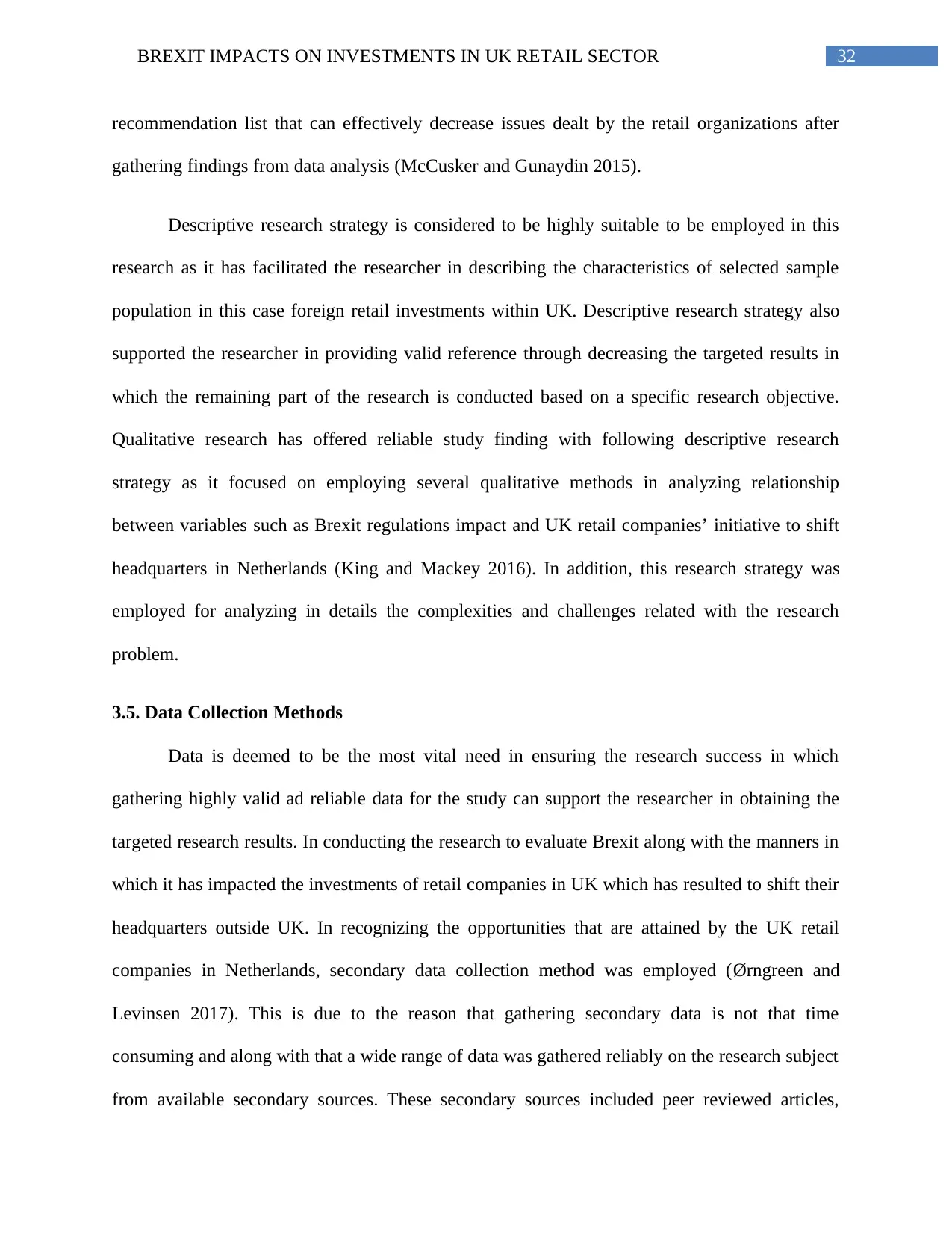
32BREXIT IMPACTS ON INVESTMENTS IN UK RETAIL SECTOR
recommendation list that can effectively decrease issues dealt by the retail organizations after
gathering findings from data analysis (McCusker and Gunaydin 2015).
Descriptive research strategy is considered to be highly suitable to be employed in this
research as it has facilitated the researcher in describing the characteristics of selected sample
population in this case foreign retail investments within UK. Descriptive research strategy also
supported the researcher in providing valid reference through decreasing the targeted results in
which the remaining part of the research is conducted based on a specific research objective.
Qualitative research has offered reliable study finding with following descriptive research
strategy as it focused on employing several qualitative methods in analyzing relationship
between variables such as Brexit regulations impact and UK retail companies’ initiative to shift
headquarters in Netherlands (King and Mackey 2016). In addition, this research strategy was
employed for analyzing in details the complexities and challenges related with the research
problem.
3.5. Data Collection Methods
Data is deemed to be the most vital need in ensuring the research success in which
gathering highly valid ad reliable data for the study can support the researcher in obtaining the
targeted research results. In conducting the research to evaluate Brexit along with the manners in
which it has impacted the investments of retail companies in UK which has resulted to shift their
headquarters outside UK. In recognizing the opportunities that are attained by the UK retail
companies in Netherlands, secondary data collection method was employed (Ørngreen and
Levinsen 2017). This is due to the reason that gathering secondary data is not that time
consuming and along with that a wide range of data was gathered reliably on the research subject
from available secondary sources. These secondary sources included peer reviewed articles,
recommendation list that can effectively decrease issues dealt by the retail organizations after
gathering findings from data analysis (McCusker and Gunaydin 2015).
Descriptive research strategy is considered to be highly suitable to be employed in this
research as it has facilitated the researcher in describing the characteristics of selected sample
population in this case foreign retail investments within UK. Descriptive research strategy also
supported the researcher in providing valid reference through decreasing the targeted results in
which the remaining part of the research is conducted based on a specific research objective.
Qualitative research has offered reliable study finding with following descriptive research
strategy as it focused on employing several qualitative methods in analyzing relationship
between variables such as Brexit regulations impact and UK retail companies’ initiative to shift
headquarters in Netherlands (King and Mackey 2016). In addition, this research strategy was
employed for analyzing in details the complexities and challenges related with the research
problem.
3.5. Data Collection Methods
Data is deemed to be the most vital need in ensuring the research success in which
gathering highly valid ad reliable data for the study can support the researcher in obtaining the
targeted research results. In conducting the research to evaluate Brexit along with the manners in
which it has impacted the investments of retail companies in UK which has resulted to shift their
headquarters outside UK. In recognizing the opportunities that are attained by the UK retail
companies in Netherlands, secondary data collection method was employed (Ørngreen and
Levinsen 2017). This is due to the reason that gathering secondary data is not that time
consuming and along with that a wide range of data was gathered reliably on the research subject
from available secondary sources. These secondary sources included peer reviewed articles,
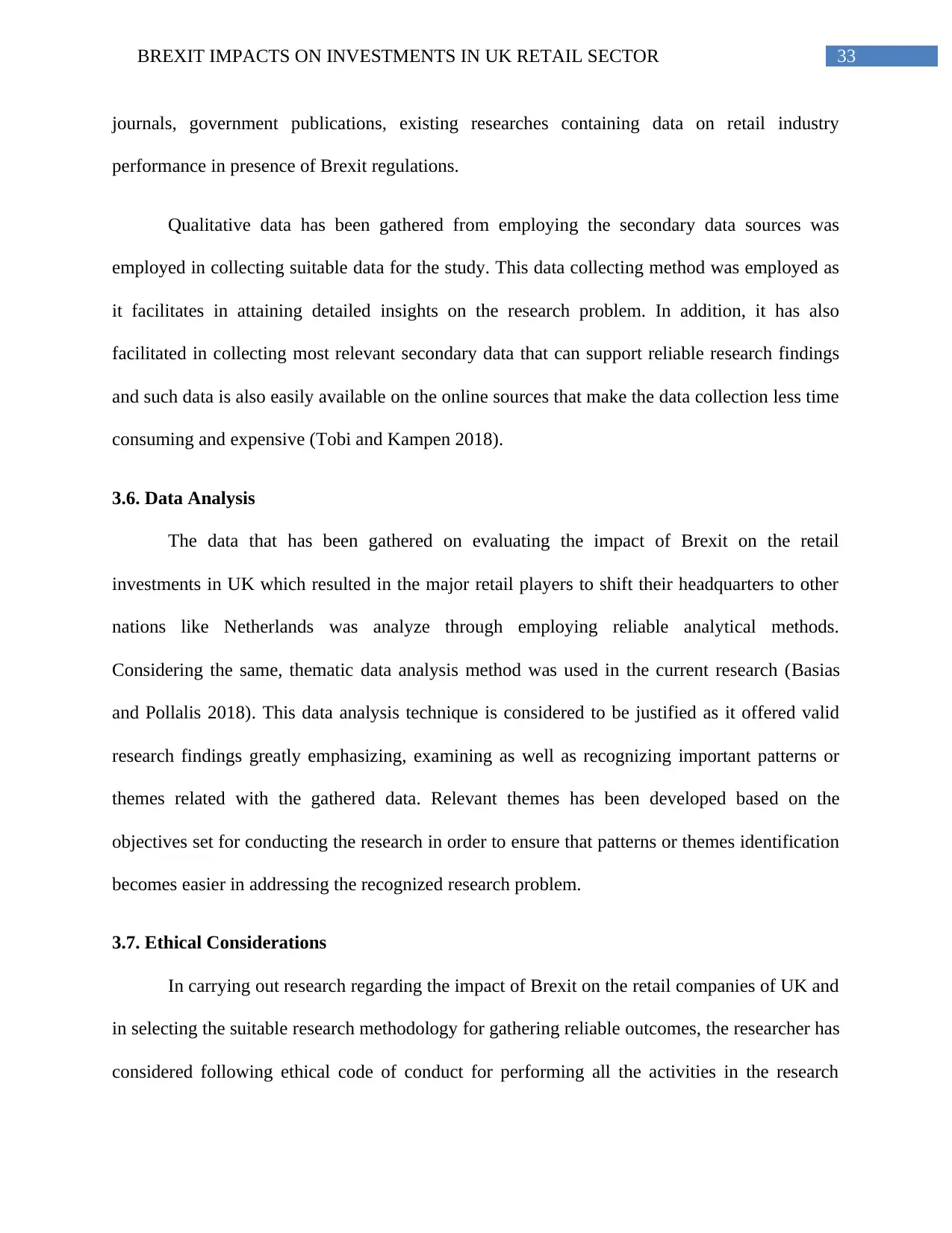
33BREXIT IMPACTS ON INVESTMENTS IN UK RETAIL SECTOR
journals, government publications, existing researches containing data on retail industry
performance in presence of Brexit regulations.
Qualitative data has been gathered from employing the secondary data sources was
employed in collecting suitable data for the study. This data collecting method was employed as
it facilitates in attaining detailed insights on the research problem. In addition, it has also
facilitated in collecting most relevant secondary data that can support reliable research findings
and such data is also easily available on the online sources that make the data collection less time
consuming and expensive (Tobi and Kampen 2018).
3.6. Data Analysis
The data that has been gathered on evaluating the impact of Brexit on the retail
investments in UK which resulted in the major retail players to shift their headquarters to other
nations like Netherlands was analyze through employing reliable analytical methods.
Considering the same, thematic data analysis method was used in the current research (Basias
and Pollalis 2018). This data analysis technique is considered to be justified as it offered valid
research findings greatly emphasizing, examining as well as recognizing important patterns or
themes related with the gathered data. Relevant themes has been developed based on the
objectives set for conducting the research in order to ensure that patterns or themes identification
becomes easier in addressing the recognized research problem.
3.7. Ethical Considerations
In carrying out research regarding the impact of Brexit on the retail companies of UK and
in selecting the suitable research methodology for gathering reliable outcomes, the researcher has
considered following ethical code of conduct for performing all the activities in the research
journals, government publications, existing researches containing data on retail industry
performance in presence of Brexit regulations.
Qualitative data has been gathered from employing the secondary data sources was
employed in collecting suitable data for the study. This data collecting method was employed as
it facilitates in attaining detailed insights on the research problem. In addition, it has also
facilitated in collecting most relevant secondary data that can support reliable research findings
and such data is also easily available on the online sources that make the data collection less time
consuming and expensive (Tobi and Kampen 2018).
3.6. Data Analysis
The data that has been gathered on evaluating the impact of Brexit on the retail
investments in UK which resulted in the major retail players to shift their headquarters to other
nations like Netherlands was analyze through employing reliable analytical methods.
Considering the same, thematic data analysis method was used in the current research (Basias
and Pollalis 2018). This data analysis technique is considered to be justified as it offered valid
research findings greatly emphasizing, examining as well as recognizing important patterns or
themes related with the gathered data. Relevant themes has been developed based on the
objectives set for conducting the research in order to ensure that patterns or themes identification
becomes easier in addressing the recognized research problem.
3.7. Ethical Considerations
In carrying out research regarding the impact of Brexit on the retail companies of UK and
in selecting the suitable research methodology for gathering reliable outcomes, the researcher has
considered following ethical code of conduct for performing all the activities in the research
Secure Best Marks with AI Grader
Need help grading? Try our AI Grader for instant feedback on your assignments.
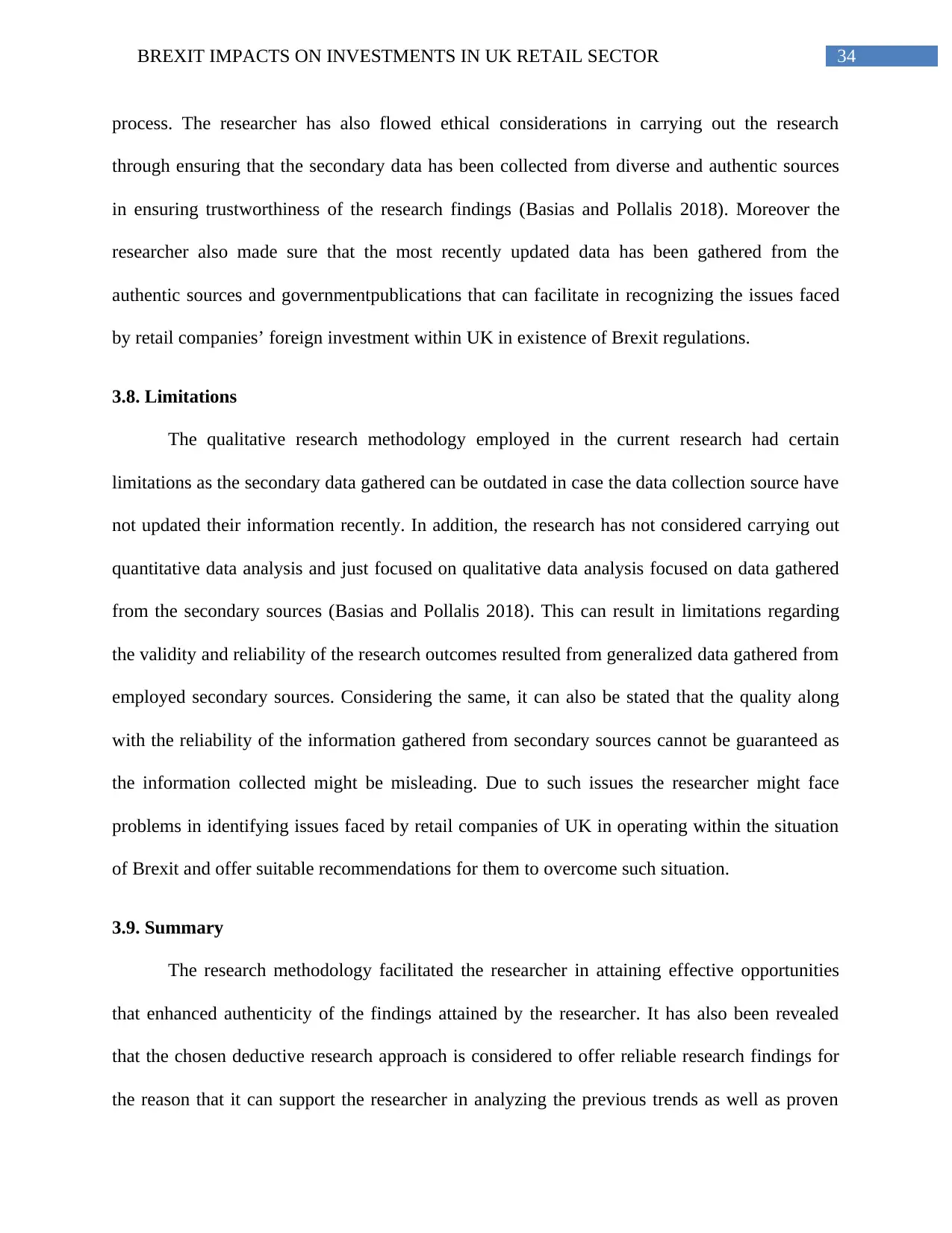
34BREXIT IMPACTS ON INVESTMENTS IN UK RETAIL SECTOR
process. The researcher has also flowed ethical considerations in carrying out the research
through ensuring that the secondary data has been collected from diverse and authentic sources
in ensuring trustworthiness of the research findings (Basias and Pollalis 2018). Moreover the
researcher also made sure that the most recently updated data has been gathered from the
authentic sources and governmentpublications that can facilitate in recognizing the issues faced
by retail companies’ foreign investment within UK in existence of Brexit regulations.
3.8. Limitations
The qualitative research methodology employed in the current research had certain
limitations as the secondary data gathered can be outdated in case the data collection source have
not updated their information recently. In addition, the research has not considered carrying out
quantitative data analysis and just focused on qualitative data analysis focused on data gathered
from the secondary sources (Basias and Pollalis 2018). This can result in limitations regarding
the validity and reliability of the research outcomes resulted from generalized data gathered from
employed secondary sources. Considering the same, it can also be stated that the quality along
with the reliability of the information gathered from secondary sources cannot be guaranteed as
the information collected might be misleading. Due to such issues the researcher might face
problems in identifying issues faced by retail companies of UK in operating within the situation
of Brexit and offer suitable recommendations for them to overcome such situation.
3.9. Summary
The research methodology facilitated the researcher in attaining effective opportunities
that enhanced authenticity of the findings attained by the researcher. It has also been revealed
that the chosen deductive research approach is considered to offer reliable research findings for
the reason that it can support the researcher in analyzing the previous trends as well as proven
process. The researcher has also flowed ethical considerations in carrying out the research
through ensuring that the secondary data has been collected from diverse and authentic sources
in ensuring trustworthiness of the research findings (Basias and Pollalis 2018). Moreover the
researcher also made sure that the most recently updated data has been gathered from the
authentic sources and governmentpublications that can facilitate in recognizing the issues faced
by retail companies’ foreign investment within UK in existence of Brexit regulations.
3.8. Limitations
The qualitative research methodology employed in the current research had certain
limitations as the secondary data gathered can be outdated in case the data collection source have
not updated their information recently. In addition, the research has not considered carrying out
quantitative data analysis and just focused on qualitative data analysis focused on data gathered
from the secondary sources (Basias and Pollalis 2018). This can result in limitations regarding
the validity and reliability of the research outcomes resulted from generalized data gathered from
employed secondary sources. Considering the same, it can also be stated that the quality along
with the reliability of the information gathered from secondary sources cannot be guaranteed as
the information collected might be misleading. Due to such issues the researcher might face
problems in identifying issues faced by retail companies of UK in operating within the situation
of Brexit and offer suitable recommendations for them to overcome such situation.
3.9. Summary
The research methodology facilitated the researcher in attaining effective opportunities
that enhanced authenticity of the findings attained by the researcher. It has also been revealed
that the chosen deductive research approach is considered to offer reliable research findings for
the reason that it can support the researcher in analyzing the previous trends as well as proven
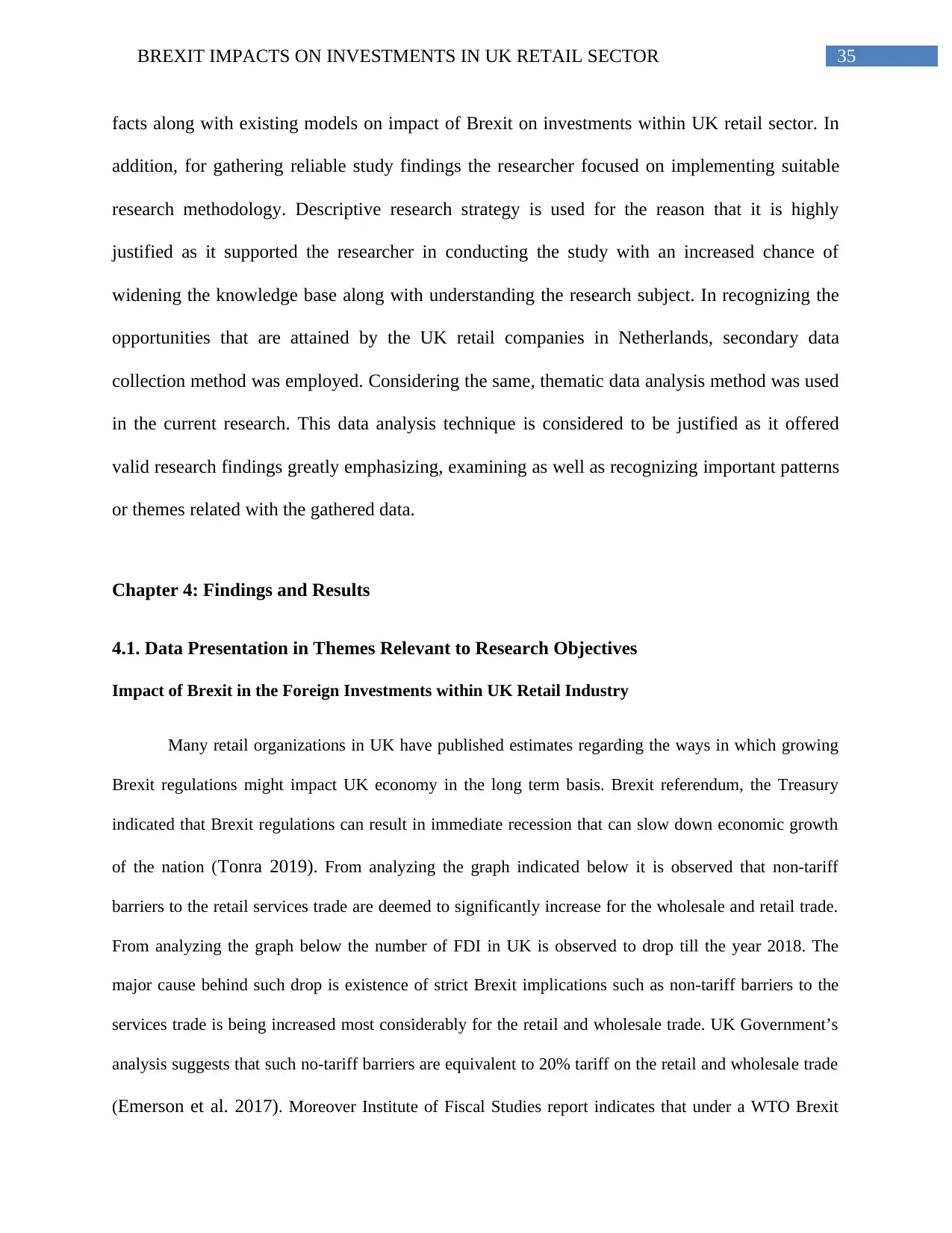
35BREXIT IMPACTS ON INVESTMENTS IN UK RETAIL SECTOR
facts along with existing models on impact of Brexit on investments within UK retail sector. In
addition, for gathering reliable study findings the researcher focused on implementing suitable
research methodology. Descriptive research strategy is used for the reason that it is highly
justified as it supported the researcher in conducting the study with an increased chance of
widening the knowledge base along with understanding the research subject. In recognizing the
opportunities that are attained by the UK retail companies in Netherlands, secondary data
collection method was employed. Considering the same, thematic data analysis method was used
in the current research. This data analysis technique is considered to be justified as it offered
valid research findings greatly emphasizing, examining as well as recognizing important patterns
or themes related with the gathered data.
Chapter 4: Findings and Results
4.1. Data Presentation in Themes Relevant to Research Objectives
Impact of Brexit in the Foreign Investments within UK Retail Industry
Many retail organizations in UK have published estimates regarding the ways in which growing
Brexit regulations might impact UK economy in the long term basis. Brexit referendum, the Treasury
indicated that Brexit regulations can result in immediate recession that can slow down economic growth
of the nation (Tonra 2019). From analyzing the graph indicated below it is observed that non-tariff
barriers to the retail services trade are deemed to significantly increase for the wholesale and retail trade.
From analyzing the graph below the number of FDI in UK is observed to drop till the year 2018. The
major cause behind such drop is existence of strict Brexit implications such as non-tariff barriers to the
services trade is being increased most considerably for the retail and wholesale trade. UK Government’s
analysis suggests that such no-tariff barriers are equivalent to 20% tariff on the retail and wholesale trade
(Emerson et al. 2017). Moreover Institute of Fiscal Studies report indicates that under a WTO Brexit
facts along with existing models on impact of Brexit on investments within UK retail sector. In
addition, for gathering reliable study findings the researcher focused on implementing suitable
research methodology. Descriptive research strategy is used for the reason that it is highly
justified as it supported the researcher in conducting the study with an increased chance of
widening the knowledge base along with understanding the research subject. In recognizing the
opportunities that are attained by the UK retail companies in Netherlands, secondary data
collection method was employed. Considering the same, thematic data analysis method was used
in the current research. This data analysis technique is considered to be justified as it offered
valid research findings greatly emphasizing, examining as well as recognizing important patterns
or themes related with the gathered data.
Chapter 4: Findings and Results
4.1. Data Presentation in Themes Relevant to Research Objectives
Impact of Brexit in the Foreign Investments within UK Retail Industry
Many retail organizations in UK have published estimates regarding the ways in which growing
Brexit regulations might impact UK economy in the long term basis. Brexit referendum, the Treasury
indicated that Brexit regulations can result in immediate recession that can slow down economic growth
of the nation (Tonra 2019). From analyzing the graph indicated below it is observed that non-tariff
barriers to the retail services trade are deemed to significantly increase for the wholesale and retail trade.
From analyzing the graph below the number of FDI in UK is observed to drop till the year 2018. The
major cause behind such drop is existence of strict Brexit implications such as non-tariff barriers to the
services trade is being increased most considerably for the retail and wholesale trade. UK Government’s
analysis suggests that such no-tariff barriers are equivalent to 20% tariff on the retail and wholesale trade
(Emerson et al. 2017). Moreover Institute of Fiscal Studies report indicates that under a WTO Brexit
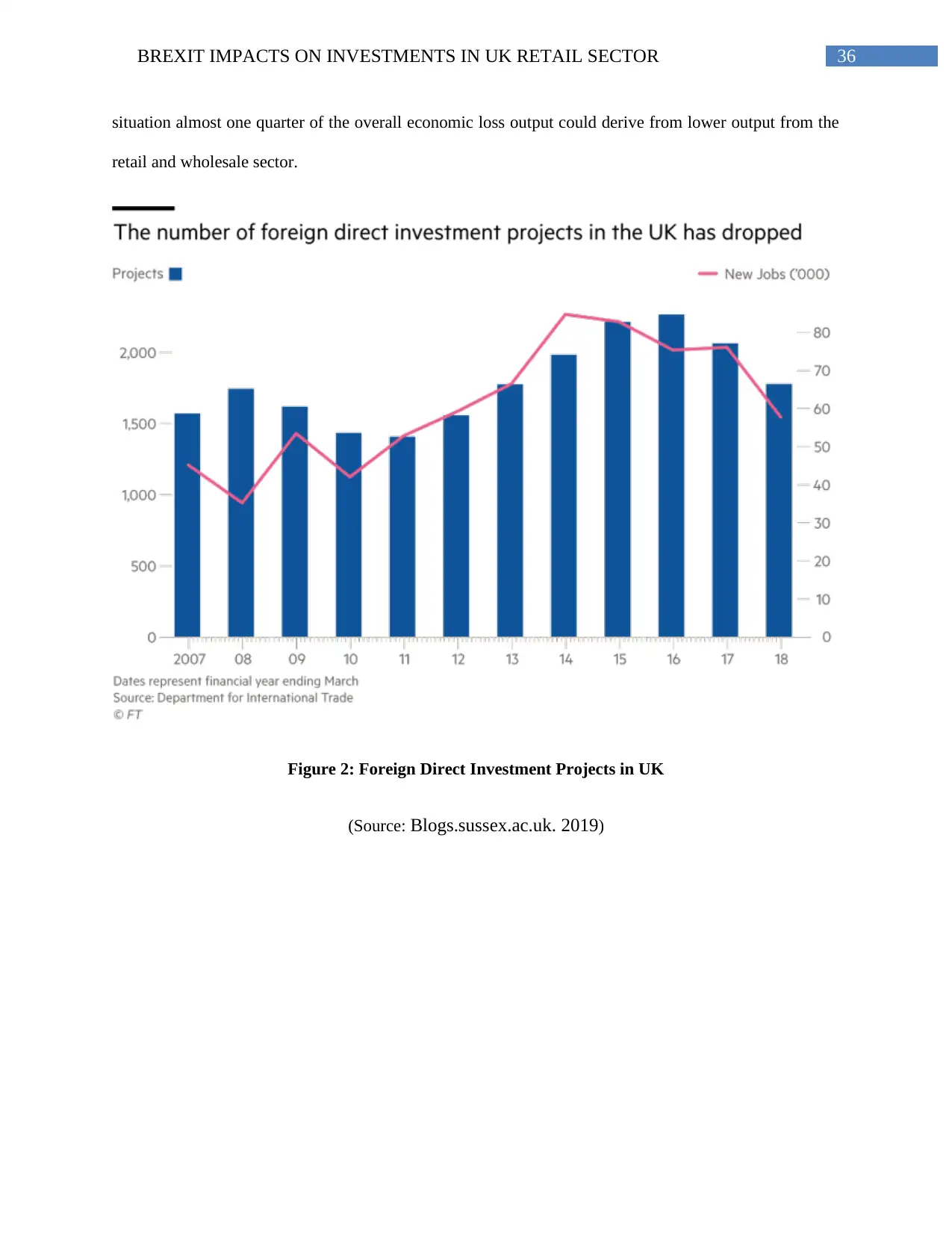
36BREXIT IMPACTS ON INVESTMENTS IN UK RETAIL SECTOR
situation almost one quarter of the overall economic loss output could derive from lower output from the
retail and wholesale sector.
Figure 2: Foreign Direct Investment Projects in UK
(Source: Blogs.sussex.ac.uk. 2019)
situation almost one quarter of the overall economic loss output could derive from lower output from the
retail and wholesale sector.
Figure 2: Foreign Direct Investment Projects in UK
(Source: Blogs.sussex.ac.uk. 2019)
Paraphrase This Document
Need a fresh take? Get an instant paraphrase of this document with our AI Paraphraser
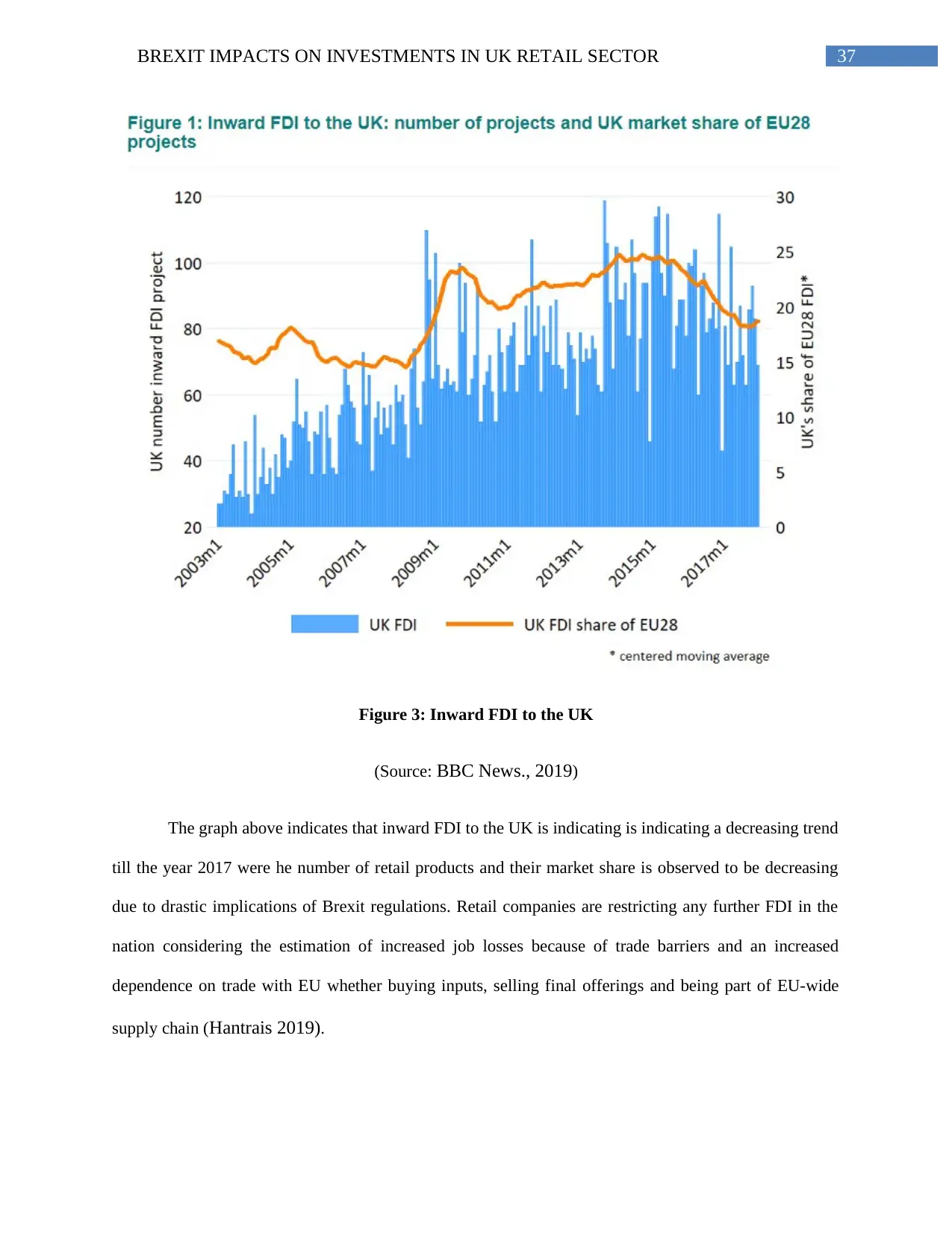
37BREXIT IMPACTS ON INVESTMENTS IN UK RETAIL SECTOR
Figure 3: Inward FDI to the UK
(Source: BBC News., 2019)
The graph above indicates that inward FDI to the UK is indicating is indicating a decreasing trend
till the year 2017 were he number of retail products and their market share is observed to be decreasing
due to drastic implications of Brexit regulations. Retail companies are restricting any further FDI in the
nation considering the estimation of increased job losses because of trade barriers and an increased
dependence on trade with EU whether buying inputs, selling final offerings and being part of EU-wide
supply chain (Hantrais 2019).
Figure 3: Inward FDI to the UK
(Source: BBC News., 2019)
The graph above indicates that inward FDI to the UK is indicating is indicating a decreasing trend
till the year 2017 were he number of retail products and their market share is observed to be decreasing
due to drastic implications of Brexit regulations. Retail companies are restricting any further FDI in the
nation considering the estimation of increased job losses because of trade barriers and an increased
dependence on trade with EU whether buying inputs, selling final offerings and being part of EU-wide
supply chain (Hantrais 2019).
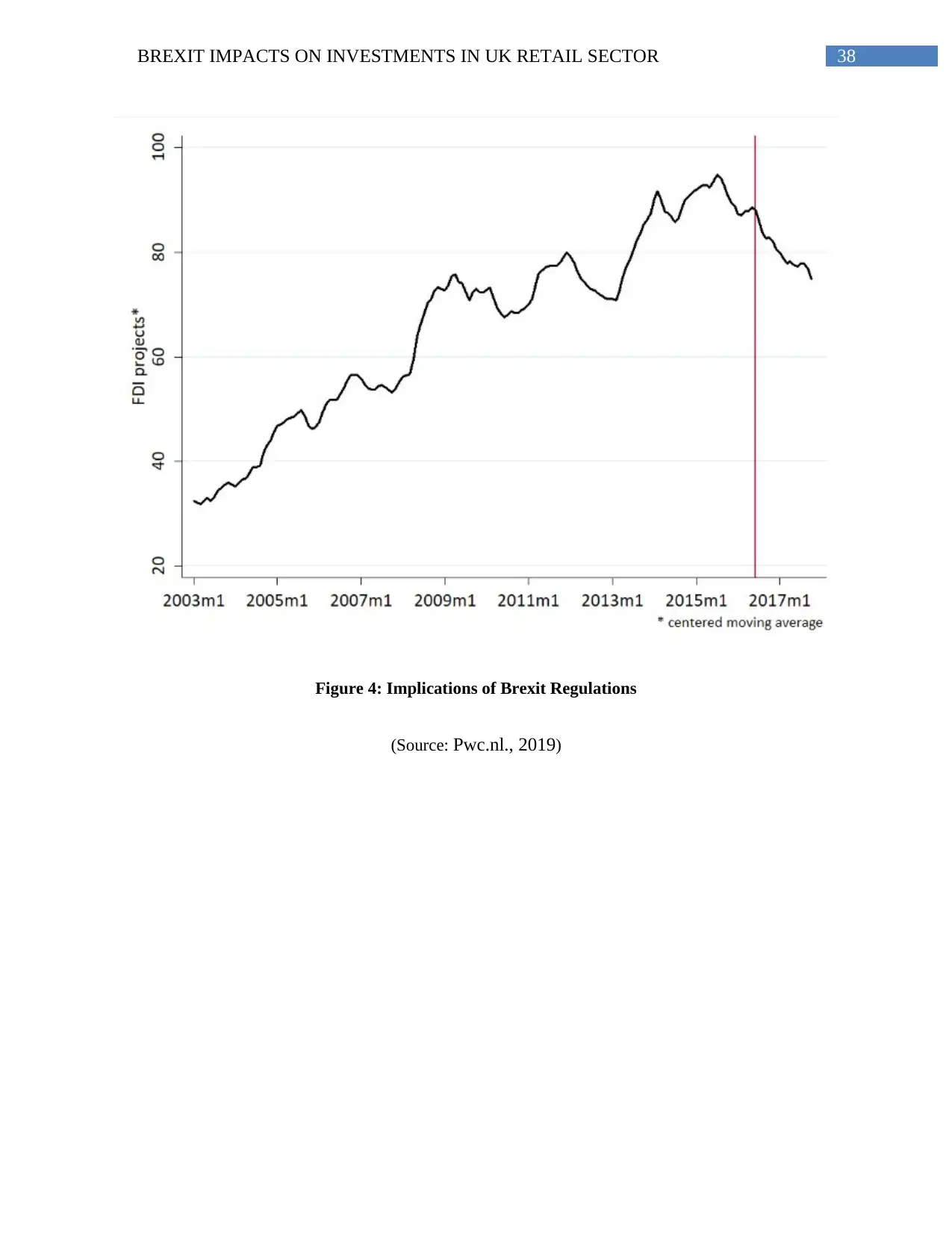
38BREXIT IMPACTS ON INVESTMENTS IN UK RETAIL SECTOR
Figure 4: Implications of Brexit Regulations
(Source: Pwc.nl., 2019)
Figure 4: Implications of Brexit Regulations
(Source: Pwc.nl., 2019)
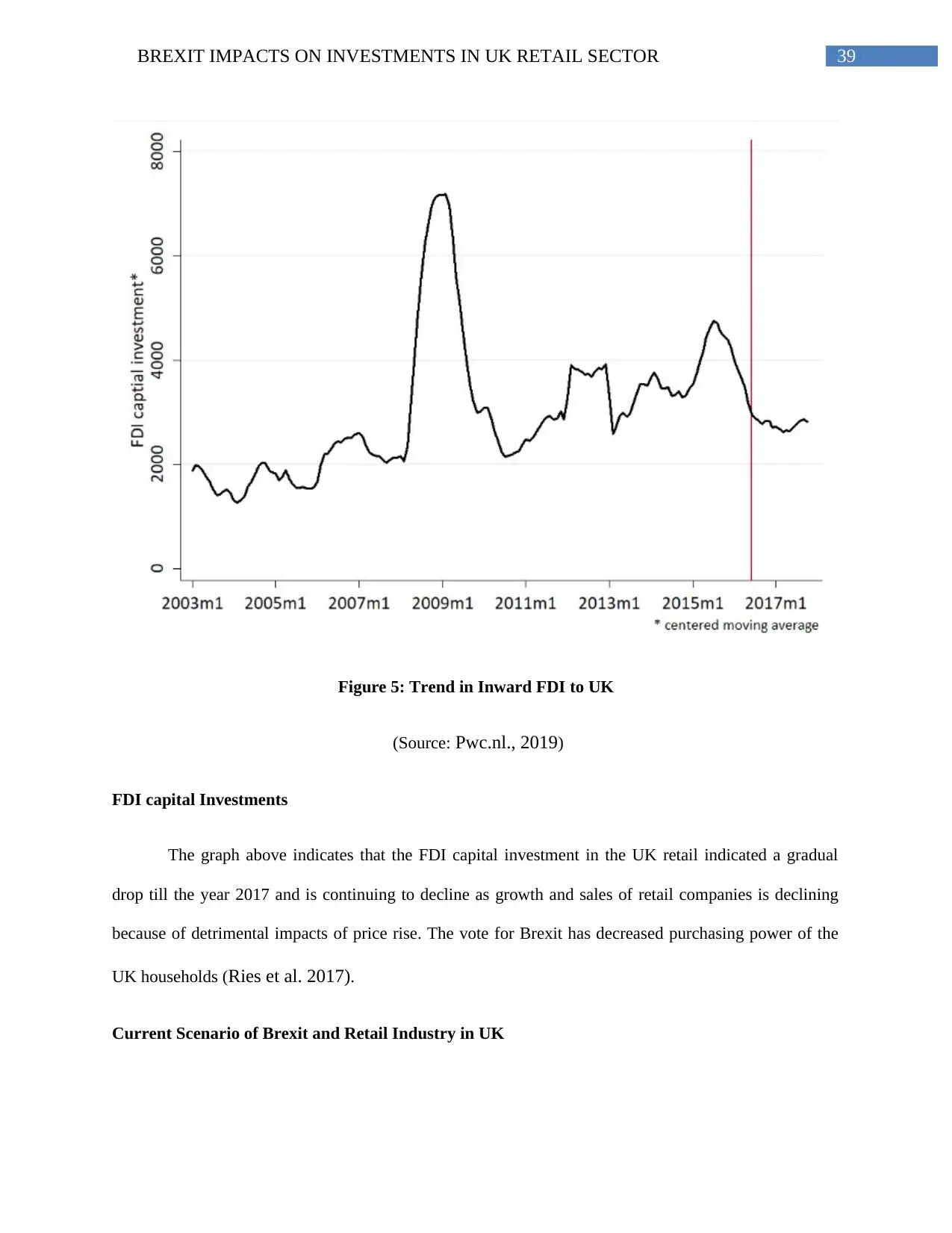
39BREXIT IMPACTS ON INVESTMENTS IN UK RETAIL SECTOR
Figure 5: Trend in Inward FDI to UK
(Source: Pwc.nl., 2019)
FDI capital Investments
The graph above indicates that the FDI capital investment in the UK retail indicated a gradual
drop till the year 2017 and is continuing to decline as growth and sales of retail companies is declining
because of detrimental impacts of price rise. The vote for Brexit has decreased purchasing power of the
UK households (Ries et al. 2017).
Current Scenario of Brexit and Retail Industry in UK
Figure 5: Trend in Inward FDI to UK
(Source: Pwc.nl., 2019)
FDI capital Investments
The graph above indicates that the FDI capital investment in the UK retail indicated a gradual
drop till the year 2017 and is continuing to decline as growth and sales of retail companies is declining
because of detrimental impacts of price rise. The vote for Brexit has decreased purchasing power of the
UK households (Ries et al. 2017).
Current Scenario of Brexit and Retail Industry in UK
Secure Best Marks with AI Grader
Need help grading? Try our AI Grader for instant feedback on your assignments.
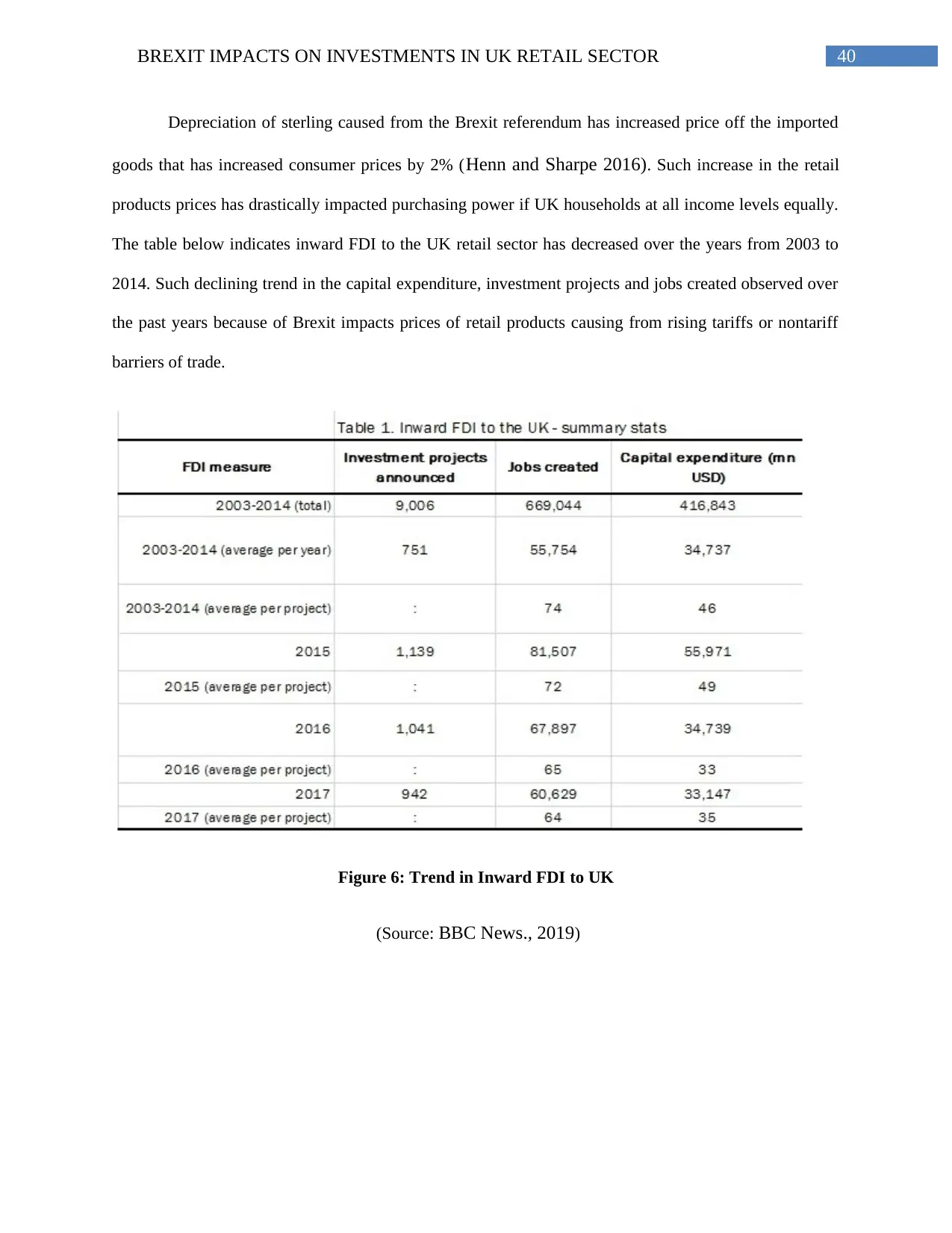
40BREXIT IMPACTS ON INVESTMENTS IN UK RETAIL SECTOR
Depreciation of sterling caused from the Brexit referendum has increased price off the imported
goods that has increased consumer prices by 2% (Henn and Sharpe 2016). Such increase in the retail
products prices has drastically impacted purchasing power if UK households at all income levels equally.
The table below indicates inward FDI to the UK retail sector has decreased over the years from 2003 to
2014. Such declining trend in the capital expenditure, investment projects and jobs created observed over
the past years because of Brexit impacts prices of retail products causing from rising tariffs or nontariff
barriers of trade.
Figure 6: Trend in Inward FDI to UK
(Source: BBC News., 2019)
Depreciation of sterling caused from the Brexit referendum has increased price off the imported
goods that has increased consumer prices by 2% (Henn and Sharpe 2016). Such increase in the retail
products prices has drastically impacted purchasing power if UK households at all income levels equally.
The table below indicates inward FDI to the UK retail sector has decreased over the years from 2003 to
2014. Such declining trend in the capital expenditure, investment projects and jobs created observed over
the past years because of Brexit impacts prices of retail products causing from rising tariffs or nontariff
barriers of trade.
Figure 6: Trend in Inward FDI to UK
(Source: BBC News., 2019)
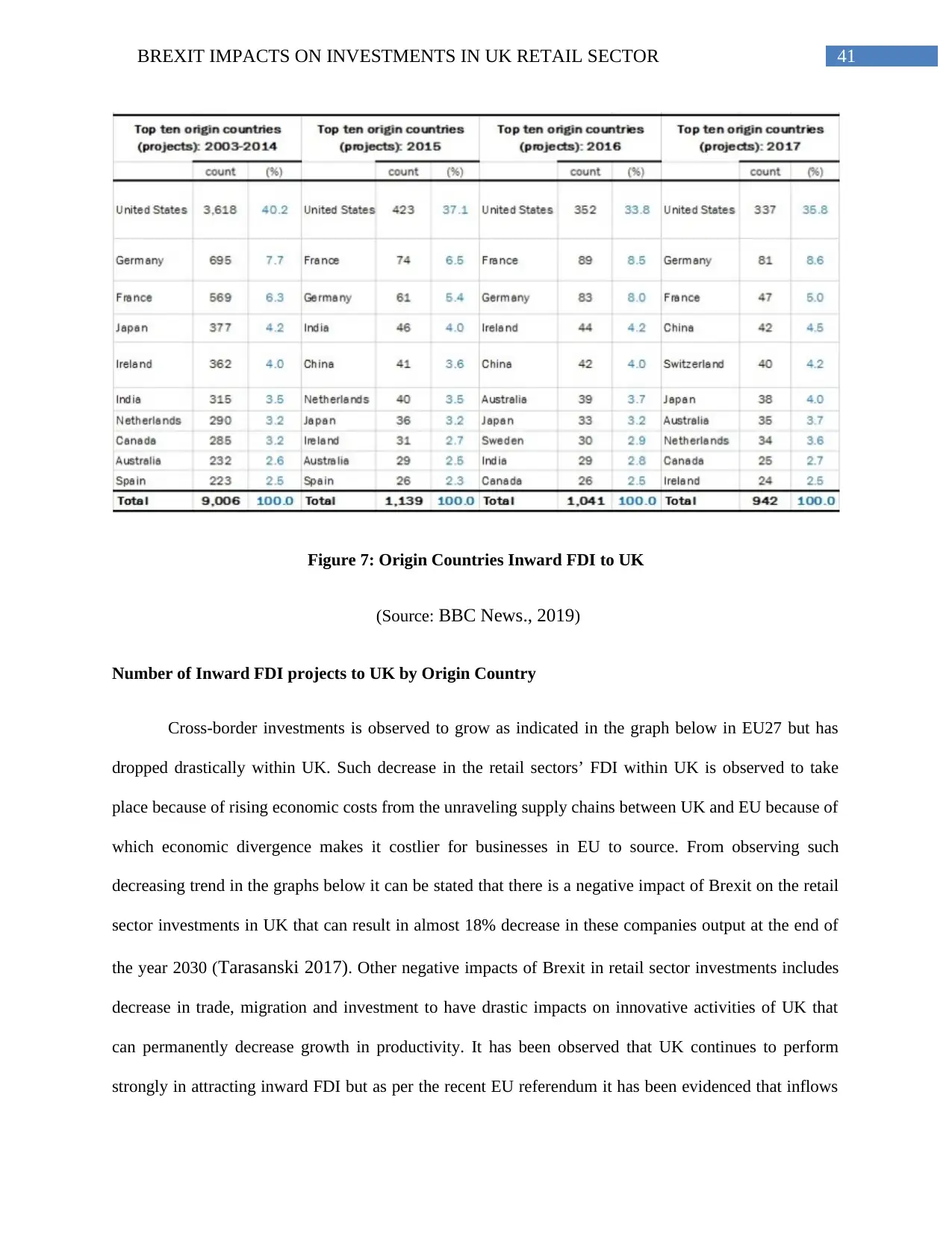
41BREXIT IMPACTS ON INVESTMENTS IN UK RETAIL SECTOR
Figure 7: Origin Countries Inward FDI to UK
(Source: BBC News., 2019)
Number of Inward FDI projects to UK by Origin Country
Cross-border investments is observed to grow as indicated in the graph below in EU27 but has
dropped drastically within UK. Such decrease in the retail sectors’ FDI within UK is observed to take
place because of rising economic costs from the unraveling supply chains between UK and EU because of
which economic divergence makes it costlier for businesses in EU to source. From observing such
decreasing trend in the graphs below it can be stated that there is a negative impact of Brexit on the retail
sector investments in UK that can result in almost 18% decrease in these companies output at the end of
the year 2030 (Tarasanski 2017). Other negative impacts of Brexit in retail sector investments includes
decrease in trade, migration and investment to have drastic impacts on innovative activities of UK that
can permanently decrease growth in productivity. It has been observed that UK continues to perform
strongly in attracting inward FDI but as per the recent EU referendum it has been evidenced that inflows
Figure 7: Origin Countries Inward FDI to UK
(Source: BBC News., 2019)
Number of Inward FDI projects to UK by Origin Country
Cross-border investments is observed to grow as indicated in the graph below in EU27 but has
dropped drastically within UK. Such decrease in the retail sectors’ FDI within UK is observed to take
place because of rising economic costs from the unraveling supply chains between UK and EU because of
which economic divergence makes it costlier for businesses in EU to source. From observing such
decreasing trend in the graphs below it can be stated that there is a negative impact of Brexit on the retail
sector investments in UK that can result in almost 18% decrease in these companies output at the end of
the year 2030 (Tarasanski 2017). Other negative impacts of Brexit in retail sector investments includes
decrease in trade, migration and investment to have drastic impacts on innovative activities of UK that
can permanently decrease growth in productivity. It has been observed that UK continues to perform
strongly in attracting inward FDI but as per the recent EU referendum it has been evidenced that inflows
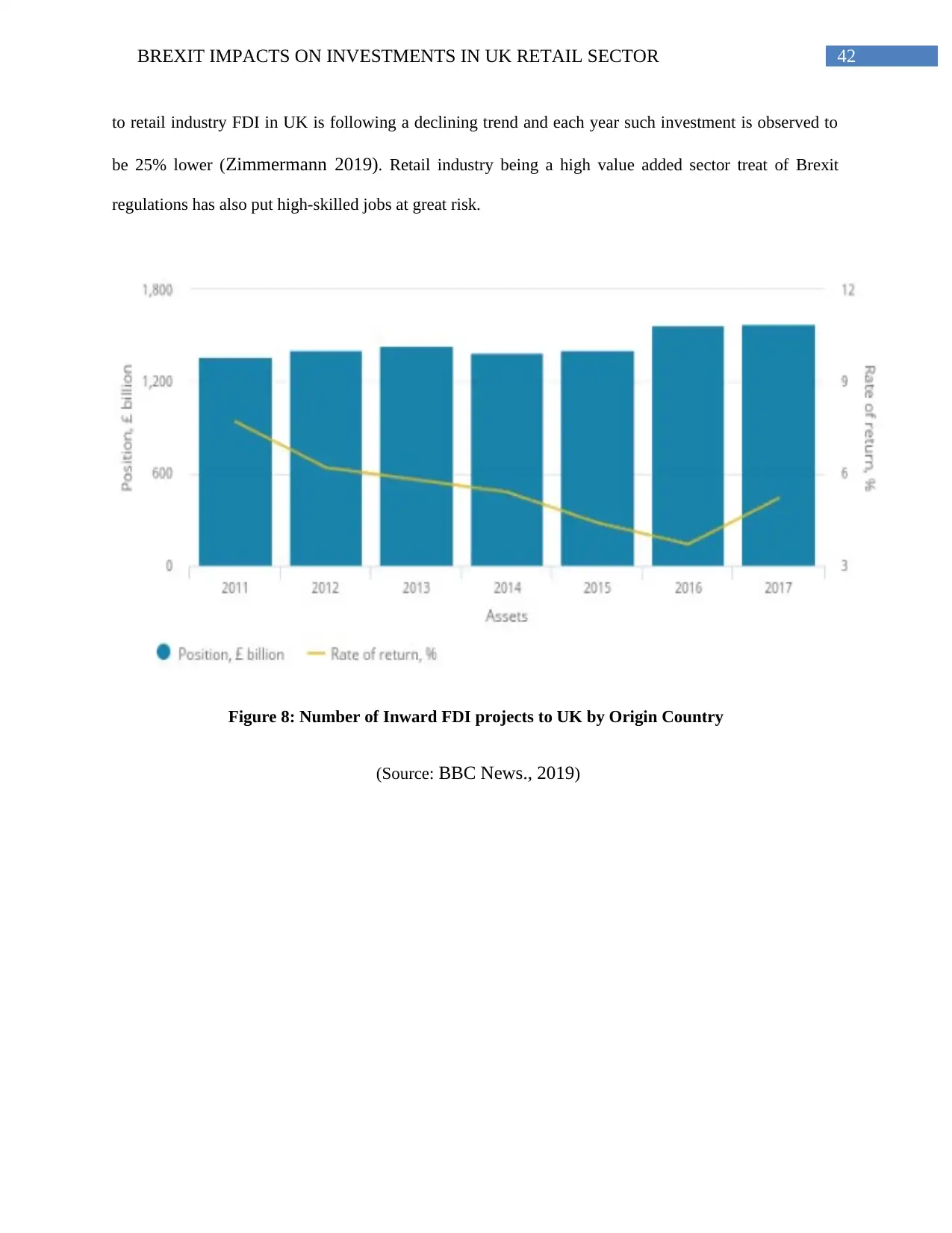
42BREXIT IMPACTS ON INVESTMENTS IN UK RETAIL SECTOR
to retail industry FDI in UK is following a declining trend and each year such investment is observed to
be 25% lower (Zimmermann 2019). Retail industry being a high value added sector treat of Brexit
regulations has also put high-skilled jobs at great risk.
Figure 8: Number of Inward FDI projects to UK by Origin Country
(Source: BBC News., 2019)
to retail industry FDI in UK is following a declining trend and each year such investment is observed to
be 25% lower (Zimmermann 2019). Retail industry being a high value added sector treat of Brexit
regulations has also put high-skilled jobs at great risk.
Figure 8: Number of Inward FDI projects to UK by Origin Country
(Source: BBC News., 2019)
Paraphrase This Document
Need a fresh take? Get an instant paraphrase of this document with our AI Paraphraser
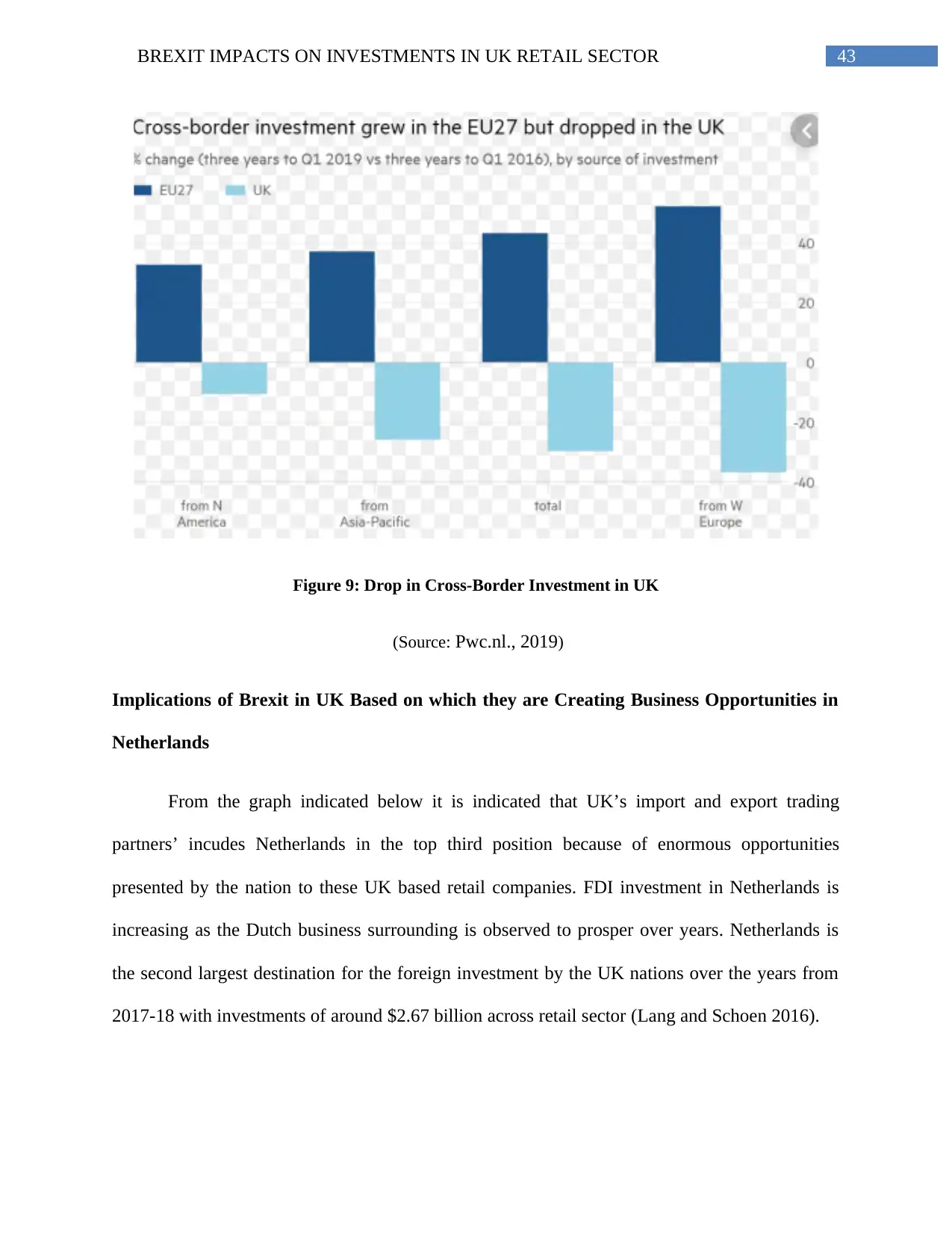
43BREXIT IMPACTS ON INVESTMENTS IN UK RETAIL SECTOR
Figure 9: Drop in Cross-Border Investment in UK
(Source: Pwc.nl., 2019)
Implications of Brexit in UK Based on which they are Creating Business Opportunities in
Netherlands
From the graph indicated below it is indicated that UK’s import and export trading
partners’ incudes Netherlands in the top third position because of enormous opportunities
presented by the nation to these UK based retail companies. FDI investment in Netherlands is
increasing as the Dutch business surrounding is observed to prosper over years. Netherlands is
the second largest destination for the foreign investment by the UK nations over the years from
2017-18 with investments of around $2.67 billion across retail sector (Lang and Schoen 2016).
Figure 9: Drop in Cross-Border Investment in UK
(Source: Pwc.nl., 2019)
Implications of Brexit in UK Based on which they are Creating Business Opportunities in
Netherlands
From the graph indicated below it is indicated that UK’s import and export trading
partners’ incudes Netherlands in the top third position because of enormous opportunities
presented by the nation to these UK based retail companies. FDI investment in Netherlands is
increasing as the Dutch business surrounding is observed to prosper over years. Netherlands is
the second largest destination for the foreign investment by the UK nations over the years from
2017-18 with investments of around $2.67 billion across retail sector (Lang and Schoen 2016).
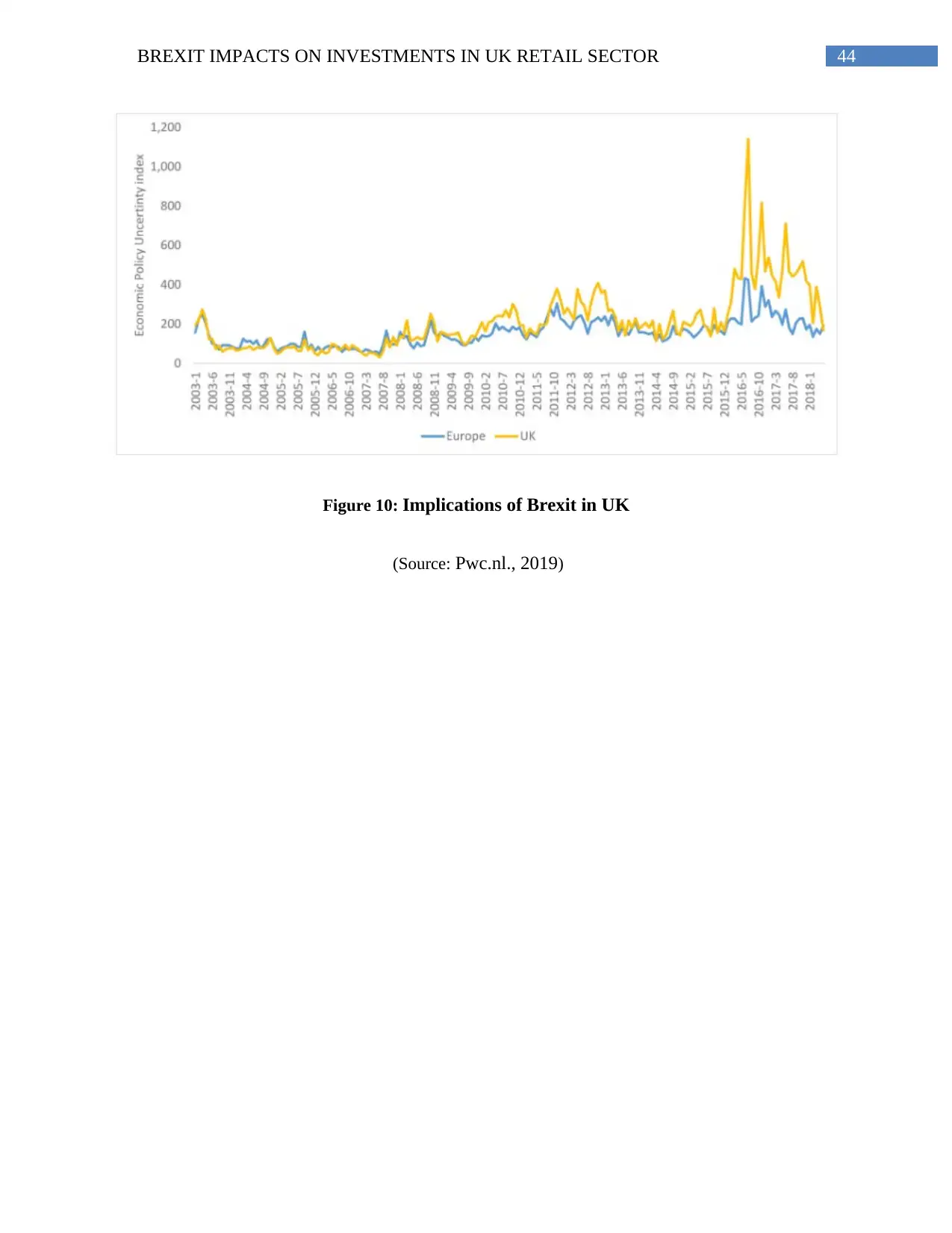
44BREXIT IMPACTS ON INVESTMENTS IN UK RETAIL SECTOR
Figure 10: Implications of Brexit in UK
(Source: Pwc.nl., 2019)
Figure 10: Implications of Brexit in UK
(Source: Pwc.nl., 2019)
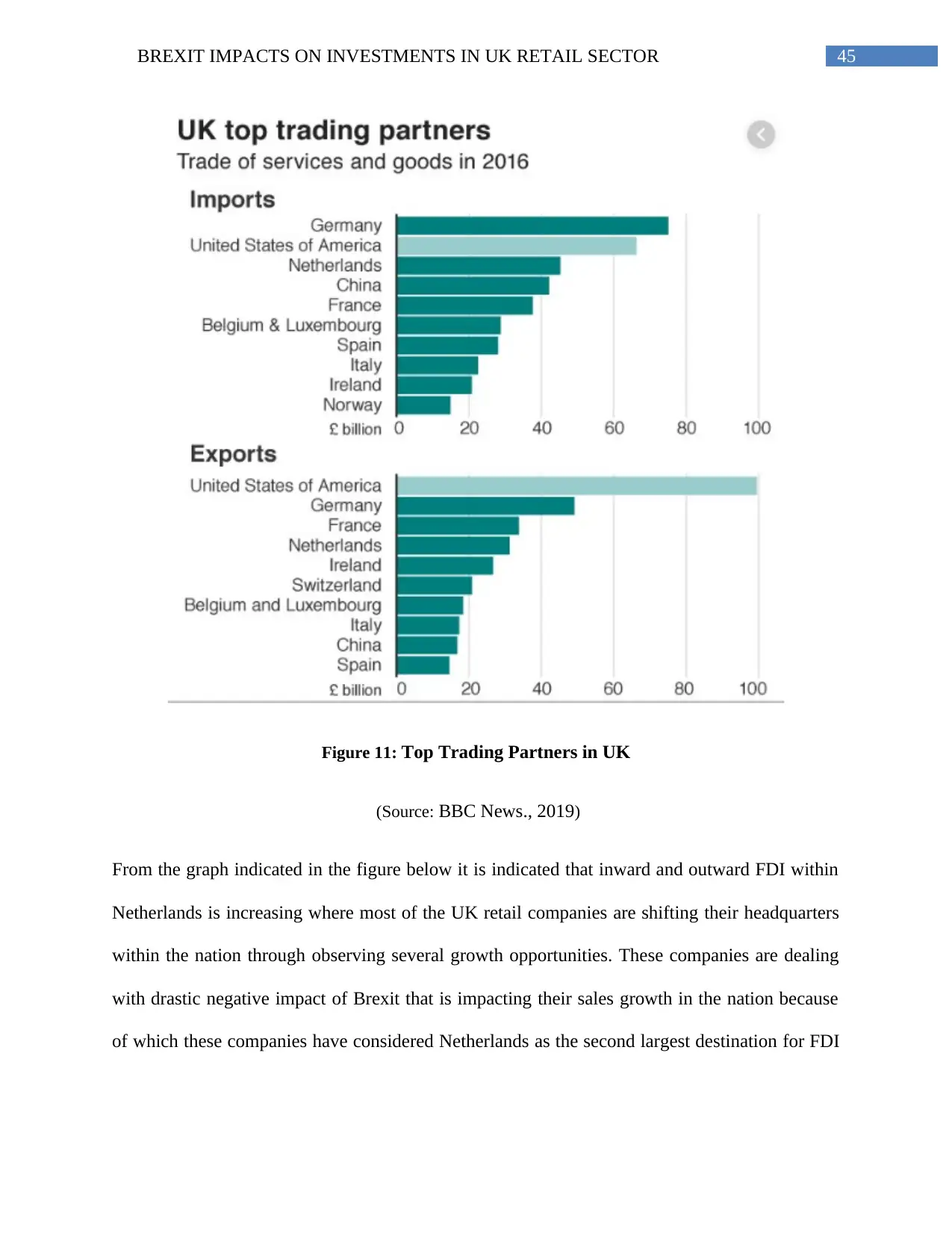
45BREXIT IMPACTS ON INVESTMENTS IN UK RETAIL SECTOR
Figure 11: Top Trading Partners in UK
(Source: BBC News., 2019)
From the graph indicated in the figure below it is indicated that inward and outward FDI within
Netherlands is increasing where most of the UK retail companies are shifting their headquarters
within the nation through observing several growth opportunities. These companies are dealing
with drastic negative impact of Brexit that is impacting their sales growth in the nation because
of which these companies have considered Netherlands as the second largest destination for FDI
Figure 11: Top Trading Partners in UK
(Source: BBC News., 2019)
From the graph indicated in the figure below it is indicated that inward and outward FDI within
Netherlands is increasing where most of the UK retail companies are shifting their headquarters
within the nation through observing several growth opportunities. These companies are dealing
with drastic negative impact of Brexit that is impacting their sales growth in the nation because
of which these companies have considered Netherlands as the second largest destination for FDI
Secure Best Marks with AI Grader
Need help grading? Try our AI Grader for instant feedback on your assignments.
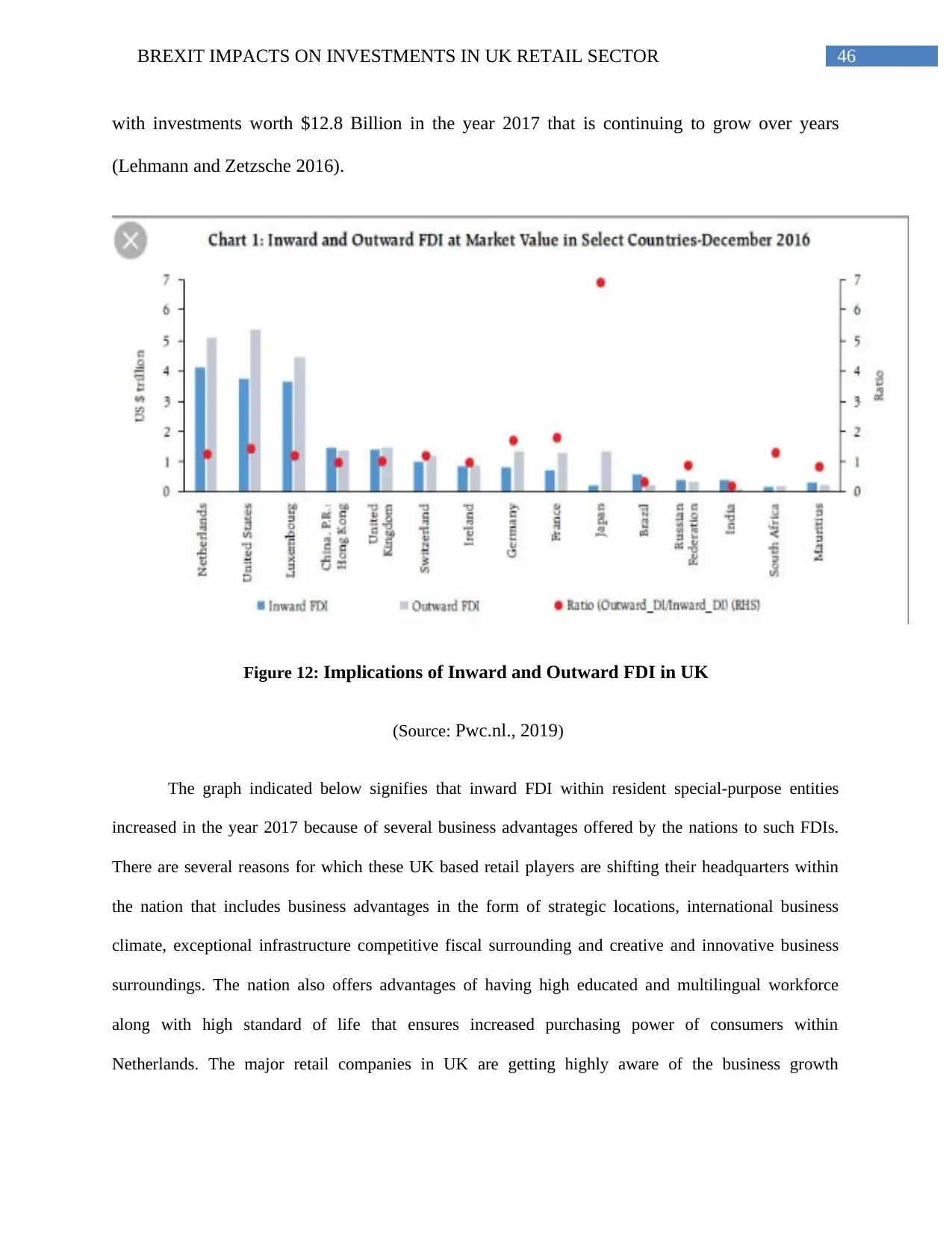
46BREXIT IMPACTS ON INVESTMENTS IN UK RETAIL SECTOR
with investments worth $12.8 Billion in the year 2017 that is continuing to grow over years
(Lehmann and Zetzsche 2016).
Figure 12: Implications of Inward and Outward FDI in UK
(Source: Pwc.nl., 2019)
The graph indicated below signifies that inward FDI within resident special-purpose entities
increased in the year 2017 because of several business advantages offered by the nations to such FDIs.
There are several reasons for which these UK based retail players are shifting their headquarters within
the nation that includes business advantages in the form of strategic locations, international business
climate, exceptional infrastructure competitive fiscal surrounding and creative and innovative business
surroundings. The nation also offers advantages of having high educated and multilingual workforce
along with high standard of life that ensures increased purchasing power of consumers within
Netherlands. The major retail companies in UK are getting highly aware of the business growth
with investments worth $12.8 Billion in the year 2017 that is continuing to grow over years
(Lehmann and Zetzsche 2016).
Figure 12: Implications of Inward and Outward FDI in UK
(Source: Pwc.nl., 2019)
The graph indicated below signifies that inward FDI within resident special-purpose entities
increased in the year 2017 because of several business advantages offered by the nations to such FDIs.
There are several reasons for which these UK based retail players are shifting their headquarters within
the nation that includes business advantages in the form of strategic locations, international business
climate, exceptional infrastructure competitive fiscal surrounding and creative and innovative business
surroundings. The nation also offers advantages of having high educated and multilingual workforce
along with high standard of life that ensures increased purchasing power of consumers within
Netherlands. The major retail companies in UK are getting highly aware of the business growth
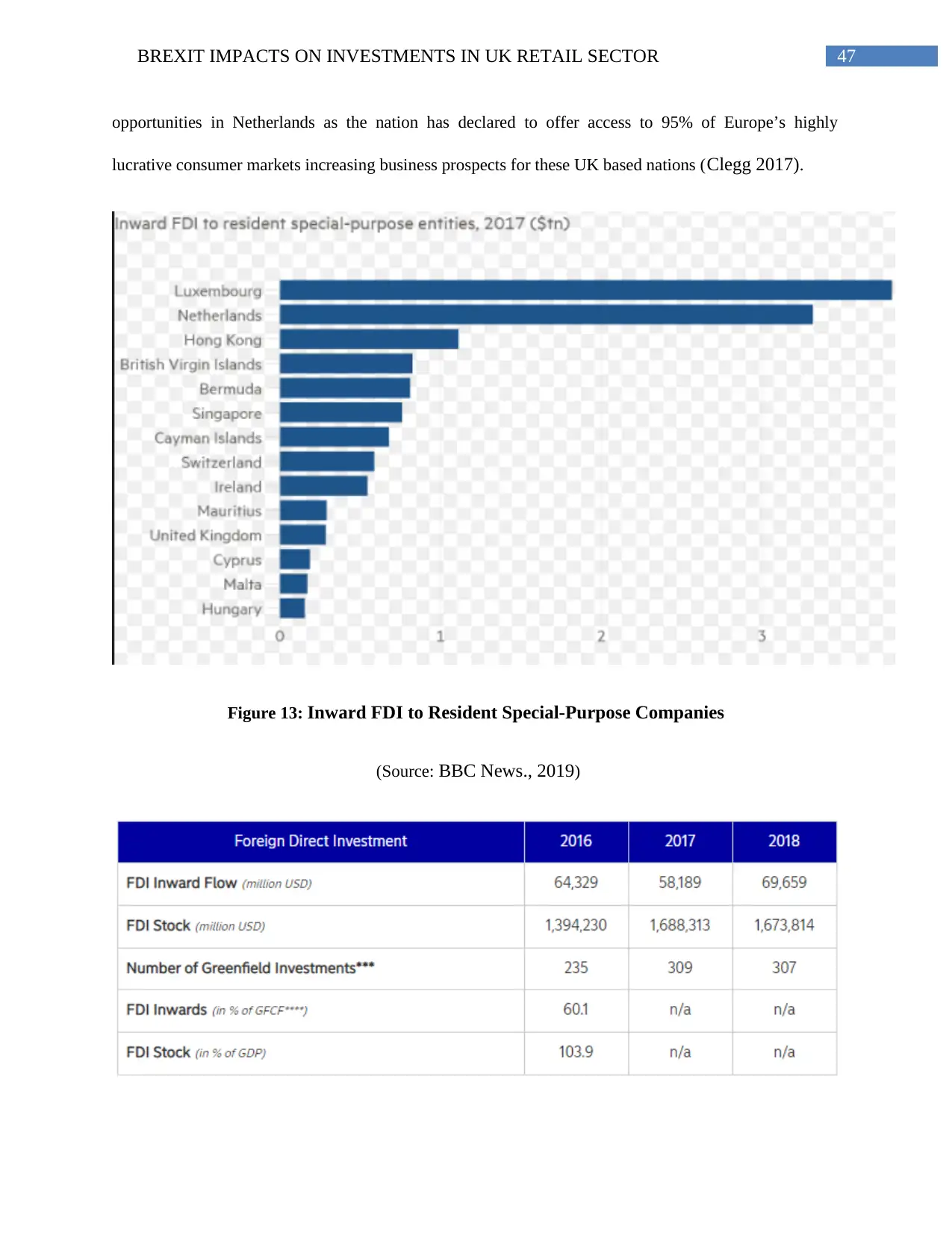
47BREXIT IMPACTS ON INVESTMENTS IN UK RETAIL SECTOR
opportunities in Netherlands as the nation has declared to offer access to 95% of Europe’s highly
lucrative consumer markets increasing business prospects for these UK based nations (Clegg 2017).
Figure 13: Inward FDI to Resident Special-Purpose Companies
(Source: BBC News., 2019)
opportunities in Netherlands as the nation has declared to offer access to 95% of Europe’s highly
lucrative consumer markets increasing business prospects for these UK based nations (Clegg 2017).
Figure 13: Inward FDI to Resident Special-Purpose Companies
(Source: BBC News., 2019)
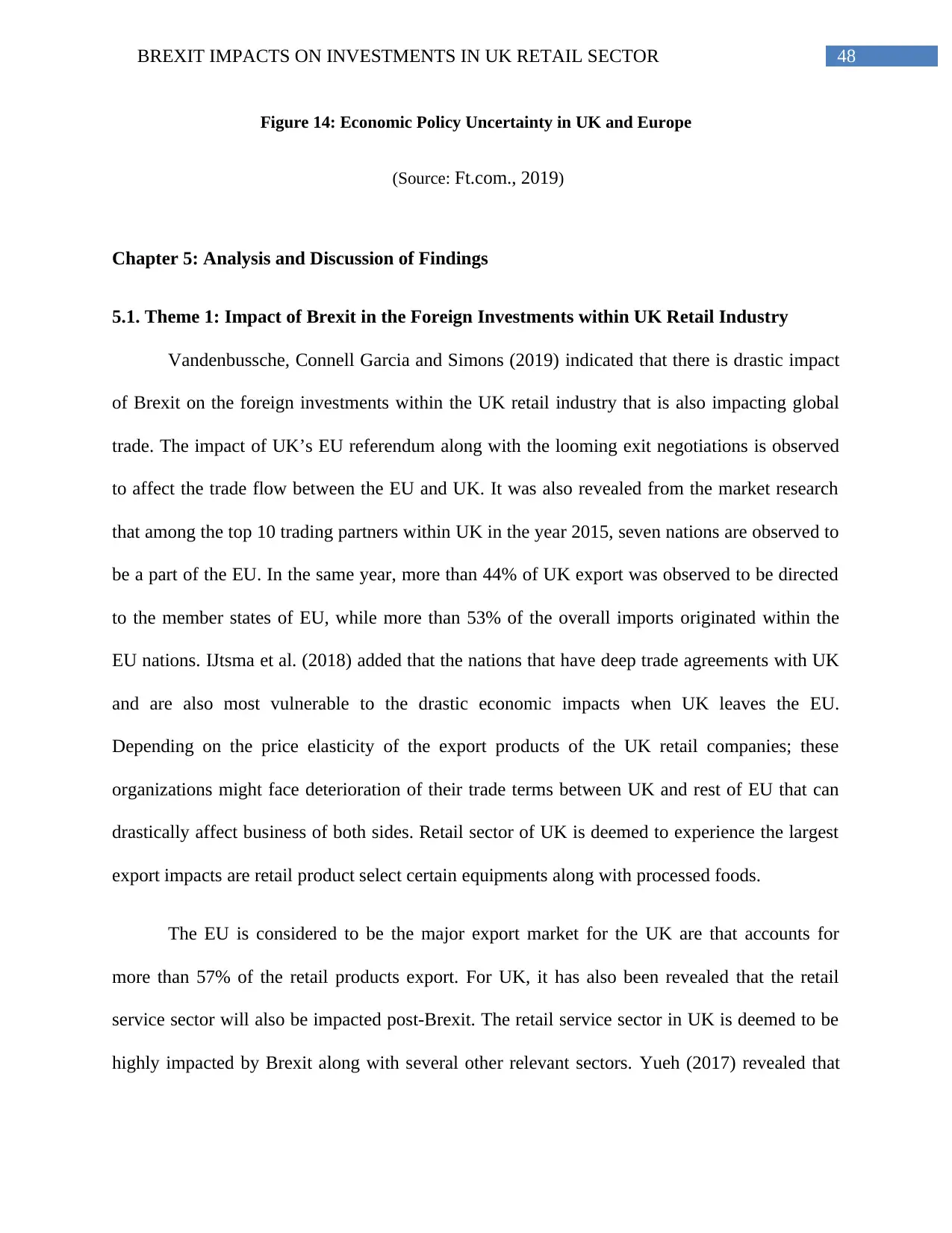
48BREXIT IMPACTS ON INVESTMENTS IN UK RETAIL SECTOR
Figure 14: Economic Policy Uncertainty in UK and Europe
(Source: Ft.com., 2019)
Chapter 5: Analysis and Discussion of Findings
5.1. Theme 1: Impact of Brexit in the Foreign Investments within UK Retail Industry
Vandenbussche, Connell Garcia and Simons (2019) indicated that there is drastic impact
of Brexit on the foreign investments within the UK retail industry that is also impacting global
trade. The impact of UK’s EU referendum along with the looming exit negotiations is observed
to affect the trade flow between the EU and UK. It was also revealed from the market research
that among the top 10 trading partners within UK in the year 2015, seven nations are observed to
be a part of the EU. In the same year, more than 44% of UK export was observed to be directed
to the member states of EU, while more than 53% of the overall imports originated within the
EU nations. IJtsma et al. (2018) added that the nations that have deep trade agreements with UK
and are also most vulnerable to the drastic economic impacts when UK leaves the EU.
Depending on the price elasticity of the export products of the UK retail companies; these
organizations might face deterioration of their trade terms between UK and rest of EU that can
drastically affect business of both sides. Retail sector of UK is deemed to experience the largest
export impacts are retail product select certain equipments along with processed foods.
The EU is considered to be the major export market for the UK are that accounts for
more than 57% of the retail products export. For UK, it has also been revealed that the retail
service sector will also be impacted post-Brexit. The retail service sector in UK is deemed to be
highly impacted by Brexit along with several other relevant sectors. Yueh (2017) revealed that
Figure 14: Economic Policy Uncertainty in UK and Europe
(Source: Ft.com., 2019)
Chapter 5: Analysis and Discussion of Findings
5.1. Theme 1: Impact of Brexit in the Foreign Investments within UK Retail Industry
Vandenbussche, Connell Garcia and Simons (2019) indicated that there is drastic impact
of Brexit on the foreign investments within the UK retail industry that is also impacting global
trade. The impact of UK’s EU referendum along with the looming exit negotiations is observed
to affect the trade flow between the EU and UK. It was also revealed from the market research
that among the top 10 trading partners within UK in the year 2015, seven nations are observed to
be a part of the EU. In the same year, more than 44% of UK export was observed to be directed
to the member states of EU, while more than 53% of the overall imports originated within the
EU nations. IJtsma et al. (2018) added that the nations that have deep trade agreements with UK
and are also most vulnerable to the drastic economic impacts when UK leaves the EU.
Depending on the price elasticity of the export products of the UK retail companies; these
organizations might face deterioration of their trade terms between UK and rest of EU that can
drastically affect business of both sides. Retail sector of UK is deemed to experience the largest
export impacts are retail product select certain equipments along with processed foods.
The EU is considered to be the major export market for the UK are that accounts for
more than 57% of the retail products export. For UK, it has also been revealed that the retail
service sector will also be impacted post-Brexit. The retail service sector in UK is deemed to be
highly impacted by Brexit along with several other relevant sectors. Yueh (2017) revealed that
Paraphrase This Document
Need a fresh take? Get an instant paraphrase of this document with our AI Paraphraser
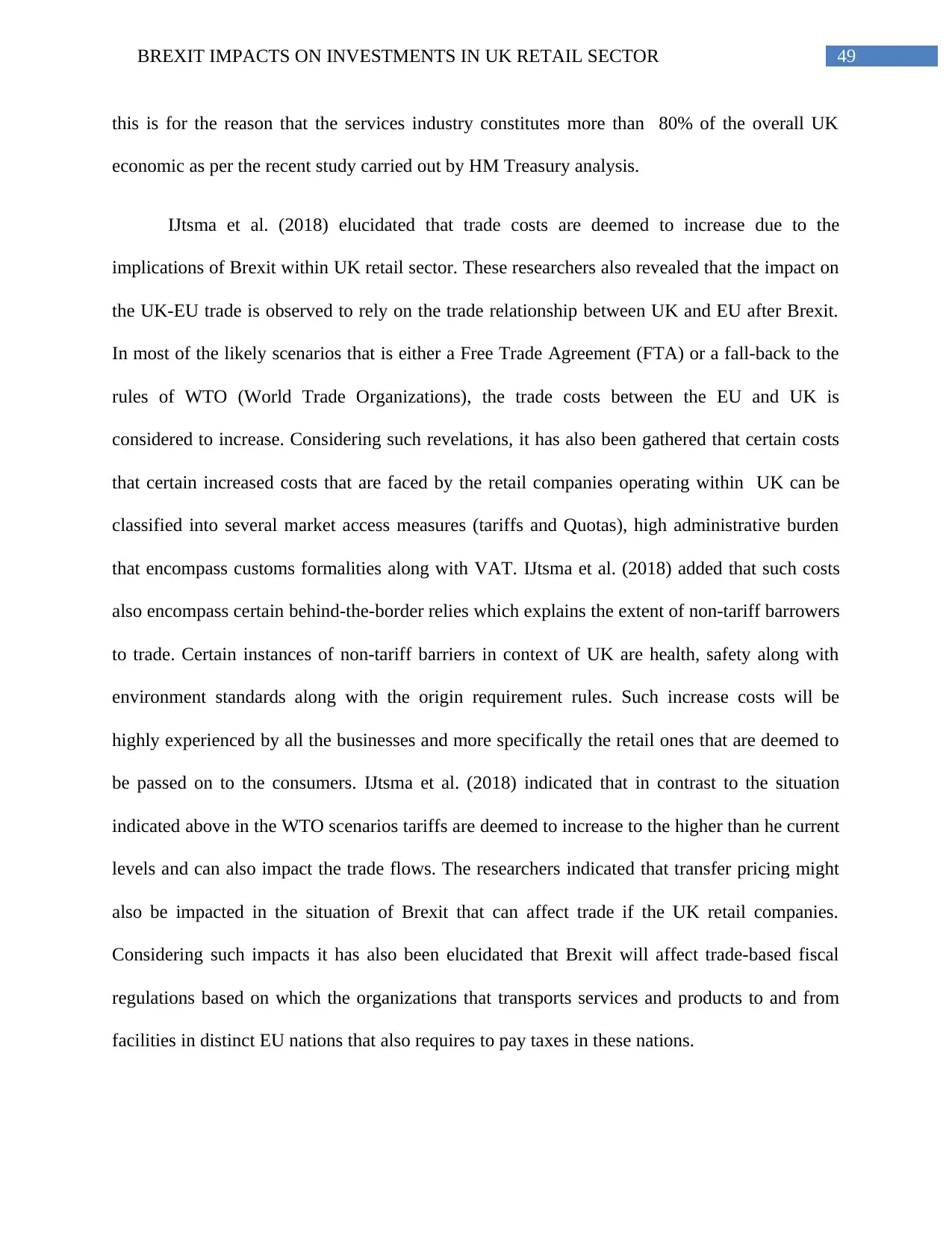
49BREXIT IMPACTS ON INVESTMENTS IN UK RETAIL SECTOR
this is for the reason that the services industry constitutes more than 80% of the overall UK
economic as per the recent study carried out by HM Treasury analysis.
IJtsma et al. (2018) elucidated that trade costs are deemed to increase due to the
implications of Brexit within UK retail sector. These researchers also revealed that the impact on
the UK-EU trade is observed to rely on the trade relationship between UK and EU after Brexit.
In most of the likely scenarios that is either a Free Trade Agreement (FTA) or a fall-back to the
rules of WTO (World Trade Organizations), the trade costs between the EU and UK is
considered to increase. Considering such revelations, it has also been gathered that certain costs
that certain increased costs that are faced by the retail companies operating within UK can be
classified into several market access measures (tariffs and Quotas), high administrative burden
that encompass customs formalities along with VAT. IJtsma et al. (2018) added that such costs
also encompass certain behind-the-border relies which explains the extent of non-tariff barrowers
to trade. Certain instances of non-tariff barriers in context of UK are health, safety along with
environment standards along with the origin requirement rules. Such increase costs will be
highly experienced by all the businesses and more specifically the retail ones that are deemed to
be passed on to the consumers. IJtsma et al. (2018) indicated that in contrast to the situation
indicated above in the WTO scenarios tariffs are deemed to increase to the higher than he current
levels and can also impact the trade flows. The researchers indicated that transfer pricing might
also be impacted in the situation of Brexit that can affect trade if the UK retail companies.
Considering such impacts it has also been elucidated that Brexit will affect trade-based fiscal
regulations based on which the organizations that transports services and products to and from
facilities in distinct EU nations that also requires to pay taxes in these nations.
this is for the reason that the services industry constitutes more than 80% of the overall UK
economic as per the recent study carried out by HM Treasury analysis.
IJtsma et al. (2018) elucidated that trade costs are deemed to increase due to the
implications of Brexit within UK retail sector. These researchers also revealed that the impact on
the UK-EU trade is observed to rely on the trade relationship between UK and EU after Brexit.
In most of the likely scenarios that is either a Free Trade Agreement (FTA) or a fall-back to the
rules of WTO (World Trade Organizations), the trade costs between the EU and UK is
considered to increase. Considering such revelations, it has also been gathered that certain costs
that certain increased costs that are faced by the retail companies operating within UK can be
classified into several market access measures (tariffs and Quotas), high administrative burden
that encompass customs formalities along with VAT. IJtsma et al. (2018) added that such costs
also encompass certain behind-the-border relies which explains the extent of non-tariff barrowers
to trade. Certain instances of non-tariff barriers in context of UK are health, safety along with
environment standards along with the origin requirement rules. Such increase costs will be
highly experienced by all the businesses and more specifically the retail ones that are deemed to
be passed on to the consumers. IJtsma et al. (2018) indicated that in contrast to the situation
indicated above in the WTO scenarios tariffs are deemed to increase to the higher than he current
levels and can also impact the trade flows. The researchers indicated that transfer pricing might
also be impacted in the situation of Brexit that can affect trade if the UK retail companies.
Considering such impacts it has also been elucidated that Brexit will affect trade-based fiscal
regulations based on which the organizations that transports services and products to and from
facilities in distinct EU nations that also requires to pay taxes in these nations.
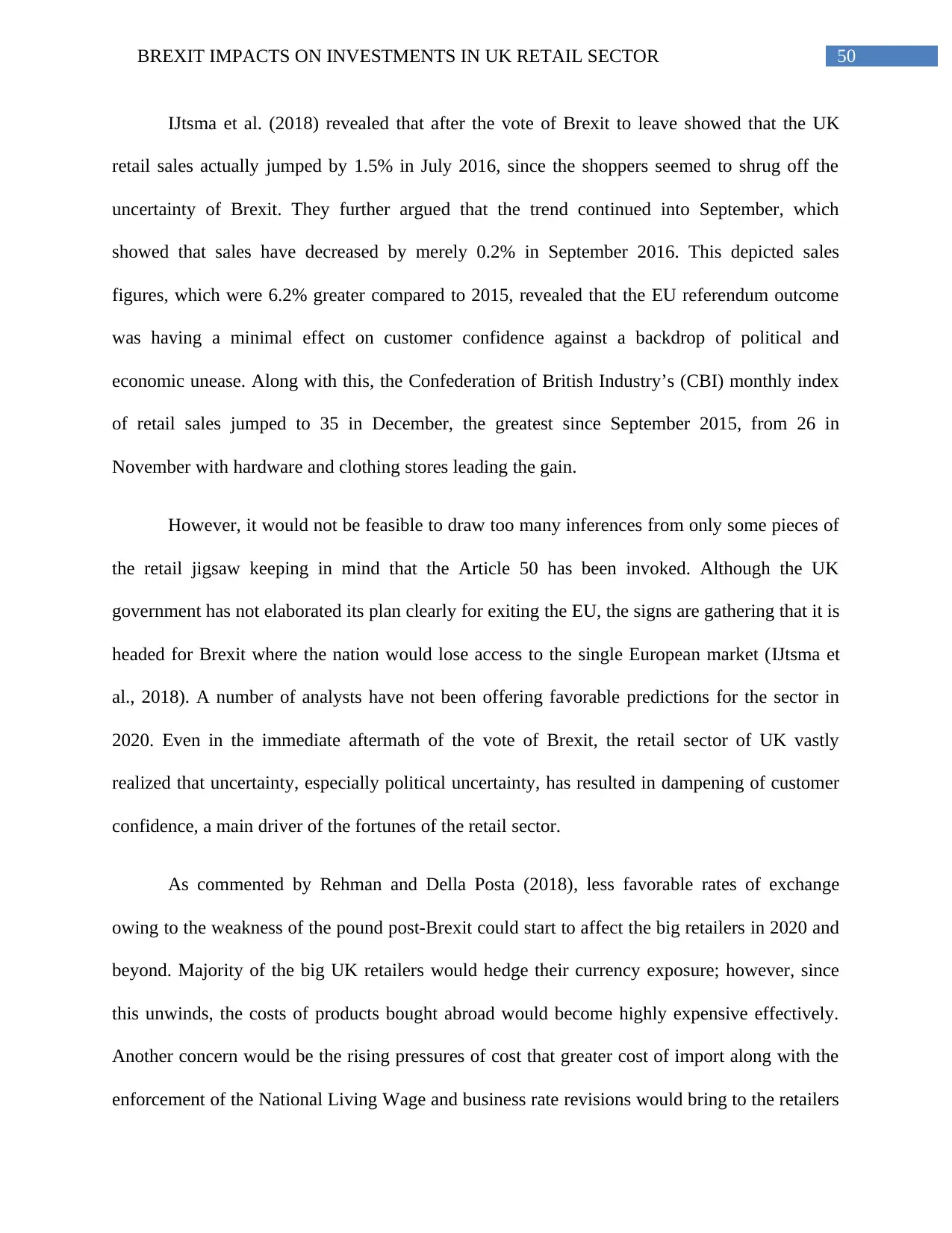
50BREXIT IMPACTS ON INVESTMENTS IN UK RETAIL SECTOR
IJtsma et al. (2018) revealed that after the vote of Brexit to leave showed that the UK
retail sales actually jumped by 1.5% in July 2016, since the shoppers seemed to shrug off the
uncertainty of Brexit. They further argued that the trend continued into September, which
showed that sales have decreased by merely 0.2% in September 2016. This depicted sales
figures, which were 6.2% greater compared to 2015, revealed that the EU referendum outcome
was having a minimal effect on customer confidence against a backdrop of political and
economic unease. Along with this, the Confederation of British Industry’s (CBI) monthly index
of retail sales jumped to 35 in December, the greatest since September 2015, from 26 in
November with hardware and clothing stores leading the gain.
However, it would not be feasible to draw too many inferences from only some pieces of
the retail jigsaw keeping in mind that the Article 50 has been invoked. Although the UK
government has not elaborated its plan clearly for exiting the EU, the signs are gathering that it is
headed for Brexit where the nation would lose access to the single European market (IJtsma et
al., 2018). A number of analysts have not been offering favorable predictions for the sector in
2020. Even in the immediate aftermath of the vote of Brexit, the retail sector of UK vastly
realized that uncertainty, especially political uncertainty, has resulted in dampening of customer
confidence, a main driver of the fortunes of the retail sector.
As commented by Rehman and Della Posta (2018), less favorable rates of exchange
owing to the weakness of the pound post-Brexit could start to affect the big retailers in 2020 and
beyond. Majority of the big UK retailers would hedge their currency exposure; however, since
this unwinds, the costs of products bought abroad would become highly expensive effectively.
Another concern would be the rising pressures of cost that greater cost of import along with the
enforcement of the National Living Wage and business rate revisions would bring to the retailers
IJtsma et al. (2018) revealed that after the vote of Brexit to leave showed that the UK
retail sales actually jumped by 1.5% in July 2016, since the shoppers seemed to shrug off the
uncertainty of Brexit. They further argued that the trend continued into September, which
showed that sales have decreased by merely 0.2% in September 2016. This depicted sales
figures, which were 6.2% greater compared to 2015, revealed that the EU referendum outcome
was having a minimal effect on customer confidence against a backdrop of political and
economic unease. Along with this, the Confederation of British Industry’s (CBI) monthly index
of retail sales jumped to 35 in December, the greatest since September 2015, from 26 in
November with hardware and clothing stores leading the gain.
However, it would not be feasible to draw too many inferences from only some pieces of
the retail jigsaw keeping in mind that the Article 50 has been invoked. Although the UK
government has not elaborated its plan clearly for exiting the EU, the signs are gathering that it is
headed for Brexit where the nation would lose access to the single European market (IJtsma et
al., 2018). A number of analysts have not been offering favorable predictions for the sector in
2020. Even in the immediate aftermath of the vote of Brexit, the retail sector of UK vastly
realized that uncertainty, especially political uncertainty, has resulted in dampening of customer
confidence, a main driver of the fortunes of the retail sector.
As commented by Rehman and Della Posta (2018), less favorable rates of exchange
owing to the weakness of the pound post-Brexit could start to affect the big retailers in 2020 and
beyond. Majority of the big UK retailers would hedge their currency exposure; however, since
this unwinds, the costs of products bought abroad would become highly expensive effectively.
Another concern would be the rising pressures of cost that greater cost of import along with the
enforcement of the National Living Wage and business rate revisions would bring to the retailers
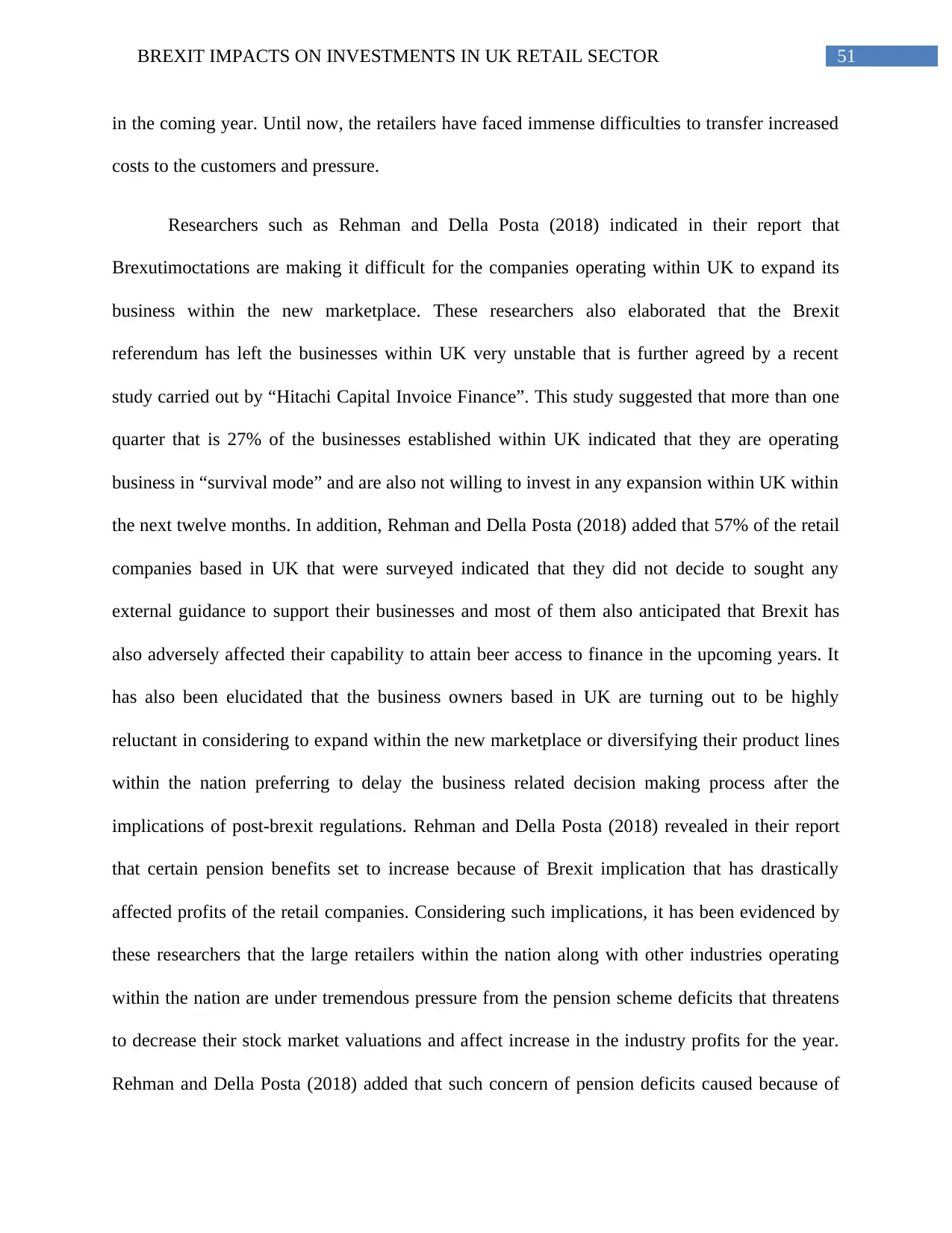
51BREXIT IMPACTS ON INVESTMENTS IN UK RETAIL SECTOR
in the coming year. Until now, the retailers have faced immense difficulties to transfer increased
costs to the customers and pressure.
Researchers such as Rehman and Della Posta (2018) indicated in their report that
Brexutimoctations are making it difficult for the companies operating within UK to expand its
business within the new marketplace. These researchers also elaborated that the Brexit
referendum has left the businesses within UK very unstable that is further agreed by a recent
study carried out by “Hitachi Capital Invoice Finance”. This study suggested that more than one
quarter that is 27% of the businesses established within UK indicated that they are operating
business in “survival mode” and are also not willing to invest in any expansion within UK within
the next twelve months. In addition, Rehman and Della Posta (2018) added that 57% of the retail
companies based in UK that were surveyed indicated that they did not decide to sought any
external guidance to support their businesses and most of them also anticipated that Brexit has
also adversely affected their capability to attain beer access to finance in the upcoming years. It
has also been elucidated that the business owners based in UK are turning out to be highly
reluctant in considering to expand within the new marketplace or diversifying their product lines
within the nation preferring to delay the business related decision making process after the
implications of post-brexit regulations. Rehman and Della Posta (2018) revealed in their report
that certain pension benefits set to increase because of Brexit implication that has drastically
affected profits of the retail companies. Considering such implications, it has been evidenced by
these researchers that the large retailers within the nation along with other industries operating
within the nation are under tremendous pressure from the pension scheme deficits that threatens
to decrease their stock market valuations and affect increase in the industry profits for the year.
Rehman and Della Posta (2018) added that such concern of pension deficits caused because of
in the coming year. Until now, the retailers have faced immense difficulties to transfer increased
costs to the customers and pressure.
Researchers such as Rehman and Della Posta (2018) indicated in their report that
Brexutimoctations are making it difficult for the companies operating within UK to expand its
business within the new marketplace. These researchers also elaborated that the Brexit
referendum has left the businesses within UK very unstable that is further agreed by a recent
study carried out by “Hitachi Capital Invoice Finance”. This study suggested that more than one
quarter that is 27% of the businesses established within UK indicated that they are operating
business in “survival mode” and are also not willing to invest in any expansion within UK within
the next twelve months. In addition, Rehman and Della Posta (2018) added that 57% of the retail
companies based in UK that were surveyed indicated that they did not decide to sought any
external guidance to support their businesses and most of them also anticipated that Brexit has
also adversely affected their capability to attain beer access to finance in the upcoming years. It
has also been elucidated that the business owners based in UK are turning out to be highly
reluctant in considering to expand within the new marketplace or diversifying their product lines
within the nation preferring to delay the business related decision making process after the
implications of post-brexit regulations. Rehman and Della Posta (2018) revealed in their report
that certain pension benefits set to increase because of Brexit implication that has drastically
affected profits of the retail companies. Considering such implications, it has been evidenced by
these researchers that the large retailers within the nation along with other industries operating
within the nation are under tremendous pressure from the pension scheme deficits that threatens
to decrease their stock market valuations and affect increase in the industry profits for the year.
Rehman and Della Posta (2018) added that such concern of pension deficits caused because of
Secure Best Marks with AI Grader
Need help grading? Try our AI Grader for instant feedback on your assignments.
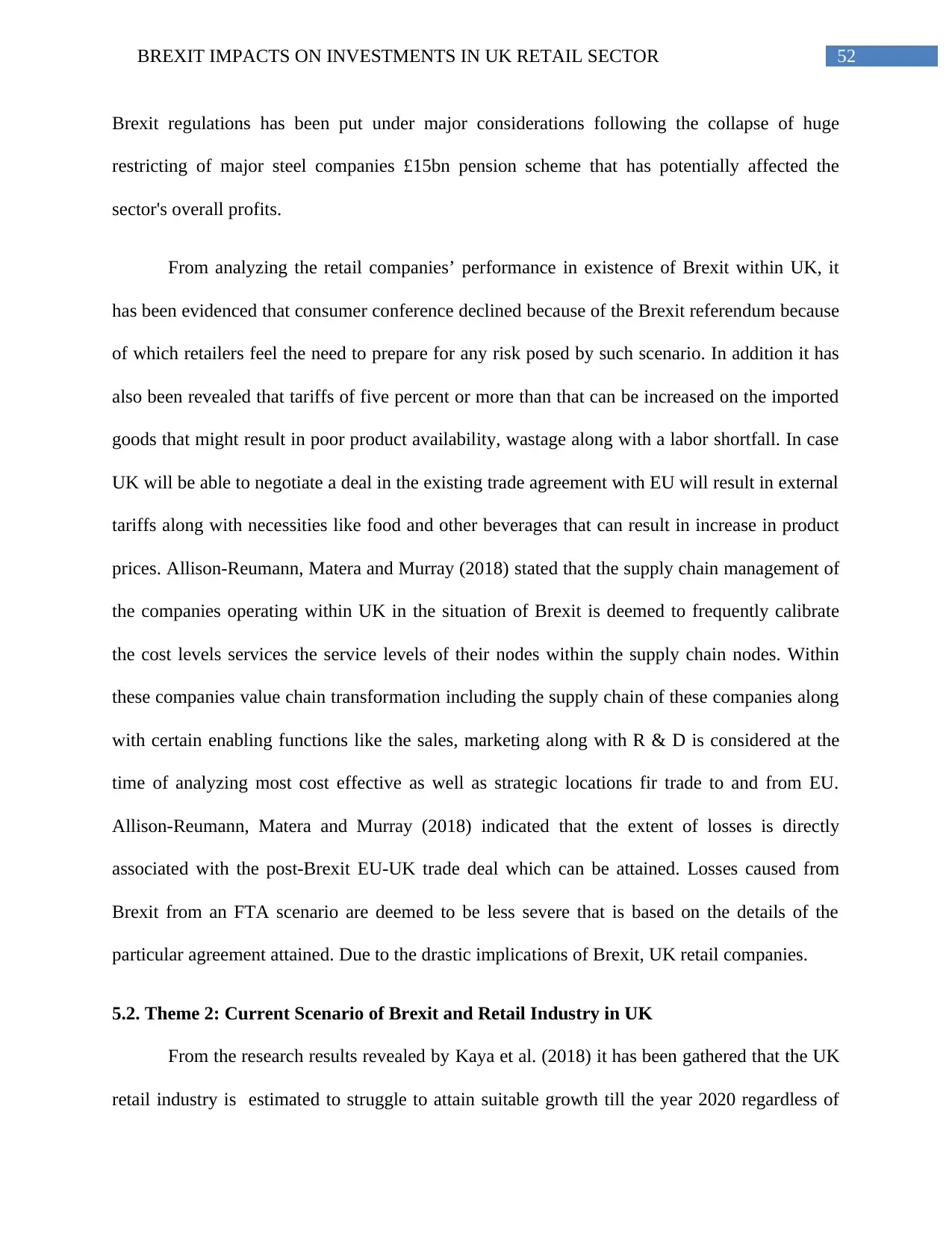
52BREXIT IMPACTS ON INVESTMENTS IN UK RETAIL SECTOR
Brexit regulations has been put under major considerations following the collapse of huge
restricting of major steel companies £15bn pension scheme that has potentially affected the
sector's overall profits.
From analyzing the retail companies’ performance in existence of Brexit within UK, it
has been evidenced that consumer conference declined because of the Brexit referendum because
of which retailers feel the need to prepare for any risk posed by such scenario. In addition it has
also been revealed that tariffs of five percent or more than that can be increased on the imported
goods that might result in poor product availability, wastage along with a labor shortfall. In case
UK will be able to negotiate a deal in the existing trade agreement with EU will result in external
tariffs along with necessities like food and other beverages that can result in increase in product
prices. Allison-Reumann, Matera and Murray (2018) stated that the supply chain management of
the companies operating within UK in the situation of Brexit is deemed to frequently calibrate
the cost levels services the service levels of their nodes within the supply chain nodes. Within
these companies value chain transformation including the supply chain of these companies along
with certain enabling functions like the sales, marketing along with R & D is considered at the
time of analyzing most cost effective as well as strategic locations fir trade to and from EU.
Allison-Reumann, Matera and Murray (2018) indicated that the extent of losses is directly
associated with the post-Brexit EU-UK trade deal which can be attained. Losses caused from
Brexit from an FTA scenario are deemed to be less severe that is based on the details of the
particular agreement attained. Due to the drastic implications of Brexit, UK retail companies.
5.2. Theme 2: Current Scenario of Brexit and Retail Industry in UK
From the research results revealed by Kaya et al. (2018) it has been gathered that the UK
retail industry is estimated to struggle to attain suitable growth till the year 2020 regardless of
Brexit regulations has been put under major considerations following the collapse of huge
restricting of major steel companies £15bn pension scheme that has potentially affected the
sector's overall profits.
From analyzing the retail companies’ performance in existence of Brexit within UK, it
has been evidenced that consumer conference declined because of the Brexit referendum because
of which retailers feel the need to prepare for any risk posed by such scenario. In addition it has
also been revealed that tariffs of five percent or more than that can be increased on the imported
goods that might result in poor product availability, wastage along with a labor shortfall. In case
UK will be able to negotiate a deal in the existing trade agreement with EU will result in external
tariffs along with necessities like food and other beverages that can result in increase in product
prices. Allison-Reumann, Matera and Murray (2018) stated that the supply chain management of
the companies operating within UK in the situation of Brexit is deemed to frequently calibrate
the cost levels services the service levels of their nodes within the supply chain nodes. Within
these companies value chain transformation including the supply chain of these companies along
with certain enabling functions like the sales, marketing along with R & D is considered at the
time of analyzing most cost effective as well as strategic locations fir trade to and from EU.
Allison-Reumann, Matera and Murray (2018) indicated that the extent of losses is directly
associated with the post-Brexit EU-UK trade deal which can be attained. Losses caused from
Brexit from an FTA scenario are deemed to be less severe that is based on the details of the
particular agreement attained. Due to the drastic implications of Brexit, UK retail companies.
5.2. Theme 2: Current Scenario of Brexit and Retail Industry in UK
From the research results revealed by Kaya et al. (2018) it has been gathered that the UK
retail industry is estimated to struggle to attain suitable growth till the year 2020 regardless of
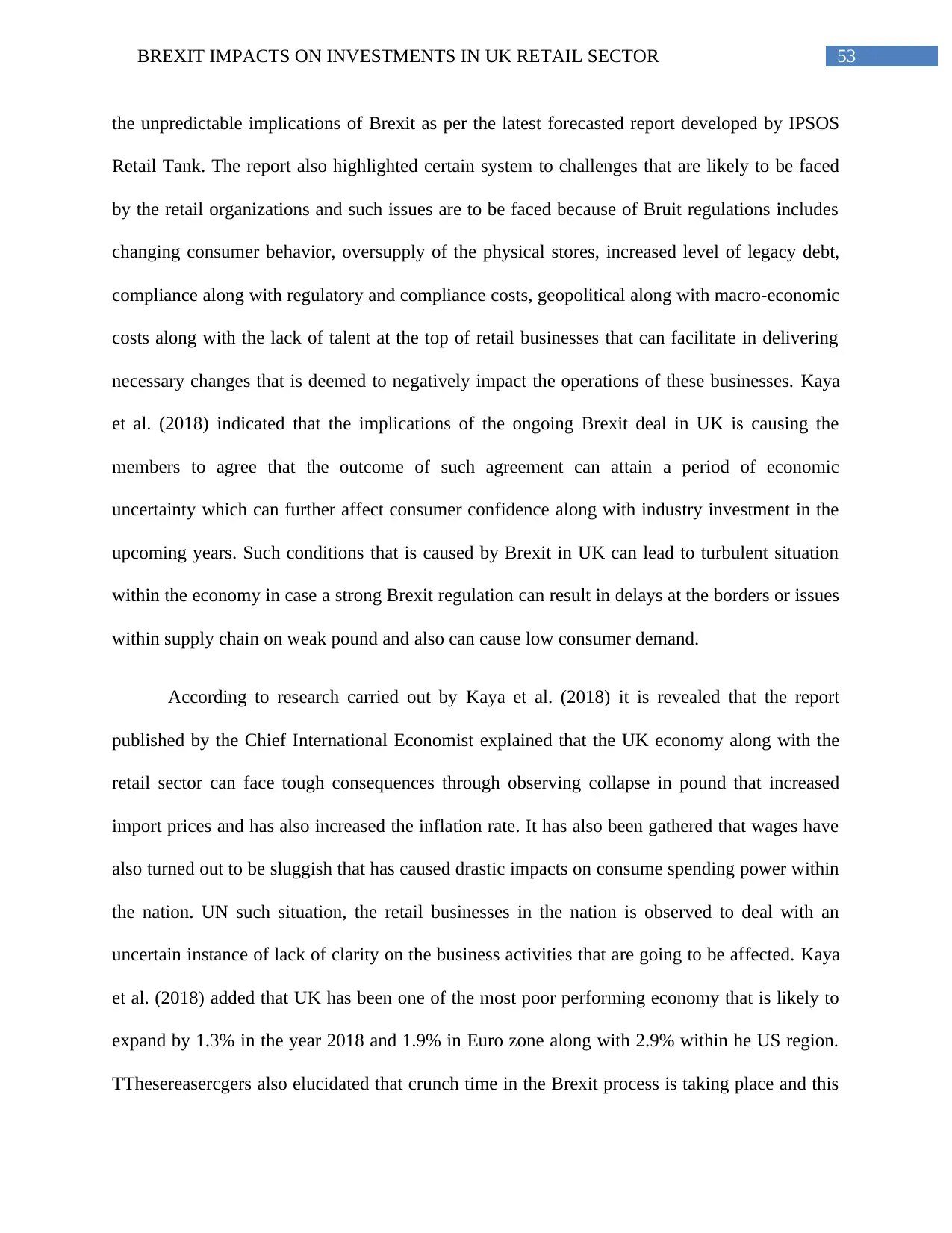
53BREXIT IMPACTS ON INVESTMENTS IN UK RETAIL SECTOR
the unpredictable implications of Brexit as per the latest forecasted report developed by IPSOS
Retail Tank. The report also highlighted certain system to challenges that are likely to be faced
by the retail organizations and such issues are to be faced because of Bruit regulations includes
changing consumer behavior, oversupply of the physical stores, increased level of legacy debt,
compliance along with regulatory and compliance costs, geopolitical along with macro-economic
costs along with the lack of talent at the top of retail businesses that can facilitate in delivering
necessary changes that is deemed to negatively impact the operations of these businesses. Kaya
et al. (2018) indicated that the implications of the ongoing Brexit deal in UK is causing the
members to agree that the outcome of such agreement can attain a period of economic
uncertainty which can further affect consumer confidence along with industry investment in the
upcoming years. Such conditions that is caused by Brexit in UK can lead to turbulent situation
within the economy in case a strong Brexit regulation can result in delays at the borders or issues
within supply chain on weak pound and also can cause low consumer demand.
According to research carried out by Kaya et al. (2018) it is revealed that the report
published by the Chief International Economist explained that the UK economy along with the
retail sector can face tough consequences through observing collapse in pound that increased
import prices and has also increased the inflation rate. It has also been gathered that wages have
also turned out to be sluggish that has caused drastic impacts on consume spending power within
the nation. UN such situation, the retail businesses in the nation is observed to deal with an
uncertain instance of lack of clarity on the business activities that are going to be affected. Kaya
et al. (2018) added that UK has been one of the most poor performing economy that is likely to
expand by 1.3% in the year 2018 and 1.9% in Euro zone along with 2.9% within he US region.
TThesereasercgers also elucidated that crunch time in the Brexit process is taking place and this
the unpredictable implications of Brexit as per the latest forecasted report developed by IPSOS
Retail Tank. The report also highlighted certain system to challenges that are likely to be faced
by the retail organizations and such issues are to be faced because of Bruit regulations includes
changing consumer behavior, oversupply of the physical stores, increased level of legacy debt,
compliance along with regulatory and compliance costs, geopolitical along with macro-economic
costs along with the lack of talent at the top of retail businesses that can facilitate in delivering
necessary changes that is deemed to negatively impact the operations of these businesses. Kaya
et al. (2018) indicated that the implications of the ongoing Brexit deal in UK is causing the
members to agree that the outcome of such agreement can attain a period of economic
uncertainty which can further affect consumer confidence along with industry investment in the
upcoming years. Such conditions that is caused by Brexit in UK can lead to turbulent situation
within the economy in case a strong Brexit regulation can result in delays at the borders or issues
within supply chain on weak pound and also can cause low consumer demand.
According to research carried out by Kaya et al. (2018) it is revealed that the report
published by the Chief International Economist explained that the UK economy along with the
retail sector can face tough consequences through observing collapse in pound that increased
import prices and has also increased the inflation rate. It has also been gathered that wages have
also turned out to be sluggish that has caused drastic impacts on consume spending power within
the nation. UN such situation, the retail businesses in the nation is observed to deal with an
uncertain instance of lack of clarity on the business activities that are going to be affected. Kaya
et al. (2018) added that UK has been one of the most poor performing economy that is likely to
expand by 1.3% in the year 2018 and 1.9% in Euro zone along with 2.9% within he US region.
TThesereasercgers also elucidated that crunch time in the Brexit process is taking place and this
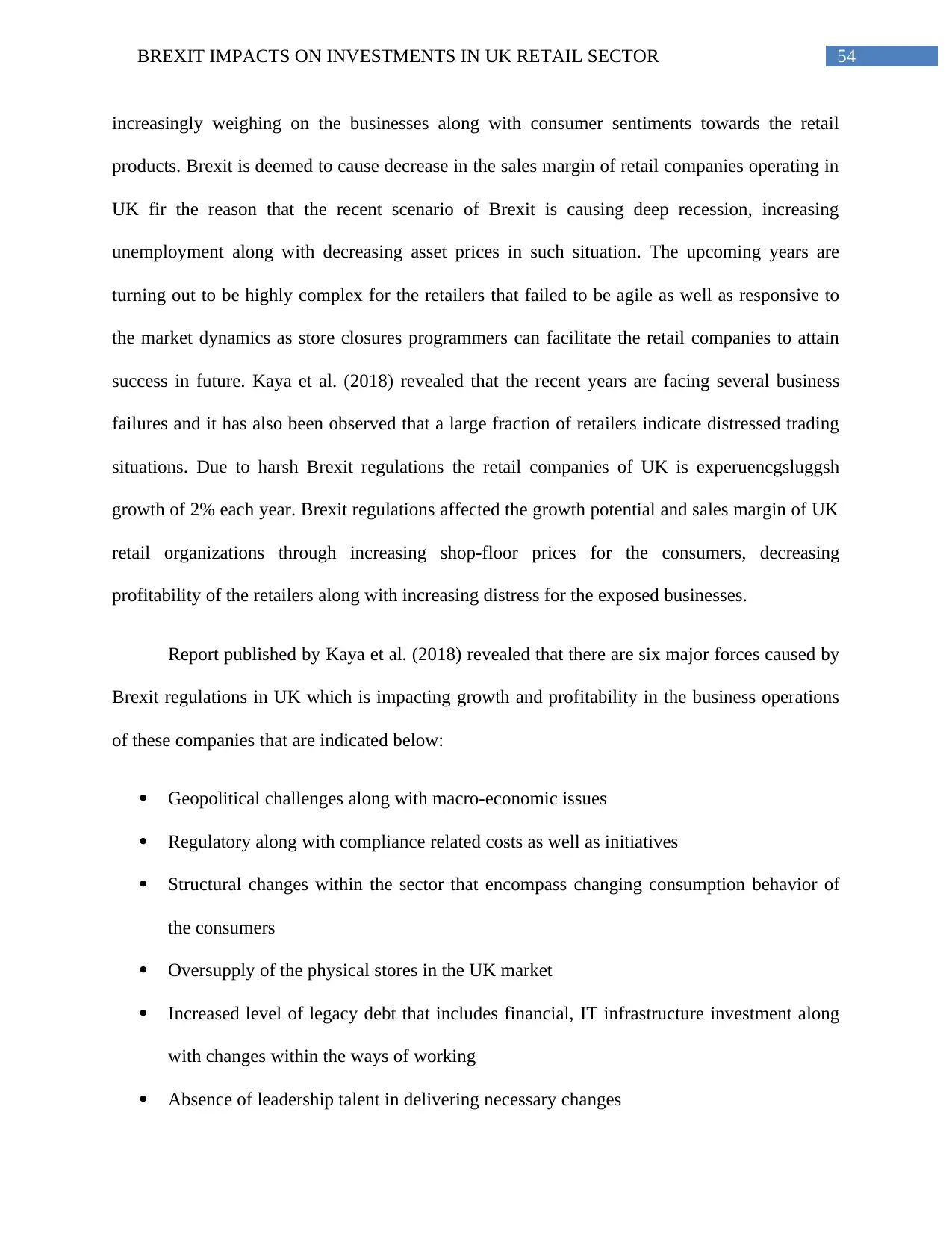
54BREXIT IMPACTS ON INVESTMENTS IN UK RETAIL SECTOR
increasingly weighing on the businesses along with consumer sentiments towards the retail
products. Brexit is deemed to cause decrease in the sales margin of retail companies operating in
UK fir the reason that the recent scenario of Brexit is causing deep recession, increasing
unemployment along with decreasing asset prices in such situation. The upcoming years are
turning out to be highly complex for the retailers that failed to be agile as well as responsive to
the market dynamics as store closures programmers can facilitate the retail companies to attain
success in future. Kaya et al. (2018) revealed that the recent years are facing several business
failures and it has also been observed that a large fraction of retailers indicate distressed trading
situations. Due to harsh Brexit regulations the retail companies of UK is experuencgsluggsh
growth of 2% each year. Brexit regulations affected the growth potential and sales margin of UK
retail organizations through increasing shop-floor prices for the consumers, decreasing
profitability of the retailers along with increasing distress for the exposed businesses.
Report published by Kaya et al. (2018) revealed that there are six major forces caused by
Brexit regulations in UK which is impacting growth and profitability in the business operations
of these companies that are indicated below:
Geopolitical challenges along with macro-economic issues
Regulatory along with compliance related costs as well as initiatives
Structural changes within the sector that encompass changing consumption behavior of
the consumers
Oversupply of the physical stores in the UK market
Increased level of legacy debt that includes financial, IT infrastructure investment along
with changes within the ways of working
Absence of leadership talent in delivering necessary changes
increasingly weighing on the businesses along with consumer sentiments towards the retail
products. Brexit is deemed to cause decrease in the sales margin of retail companies operating in
UK fir the reason that the recent scenario of Brexit is causing deep recession, increasing
unemployment along with decreasing asset prices in such situation. The upcoming years are
turning out to be highly complex for the retailers that failed to be agile as well as responsive to
the market dynamics as store closures programmers can facilitate the retail companies to attain
success in future. Kaya et al. (2018) revealed that the recent years are facing several business
failures and it has also been observed that a large fraction of retailers indicate distressed trading
situations. Due to harsh Brexit regulations the retail companies of UK is experuencgsluggsh
growth of 2% each year. Brexit regulations affected the growth potential and sales margin of UK
retail organizations through increasing shop-floor prices for the consumers, decreasing
profitability of the retailers along with increasing distress for the exposed businesses.
Report published by Kaya et al. (2018) revealed that there are six major forces caused by
Brexit regulations in UK which is impacting growth and profitability in the business operations
of these companies that are indicated below:
Geopolitical challenges along with macro-economic issues
Regulatory along with compliance related costs as well as initiatives
Structural changes within the sector that encompass changing consumption behavior of
the consumers
Oversupply of the physical stores in the UK market
Increased level of legacy debt that includes financial, IT infrastructure investment along
with changes within the ways of working
Absence of leadership talent in delivering necessary changes
Paraphrase This Document
Need a fresh take? Get an instant paraphrase of this document with our AI Paraphraser
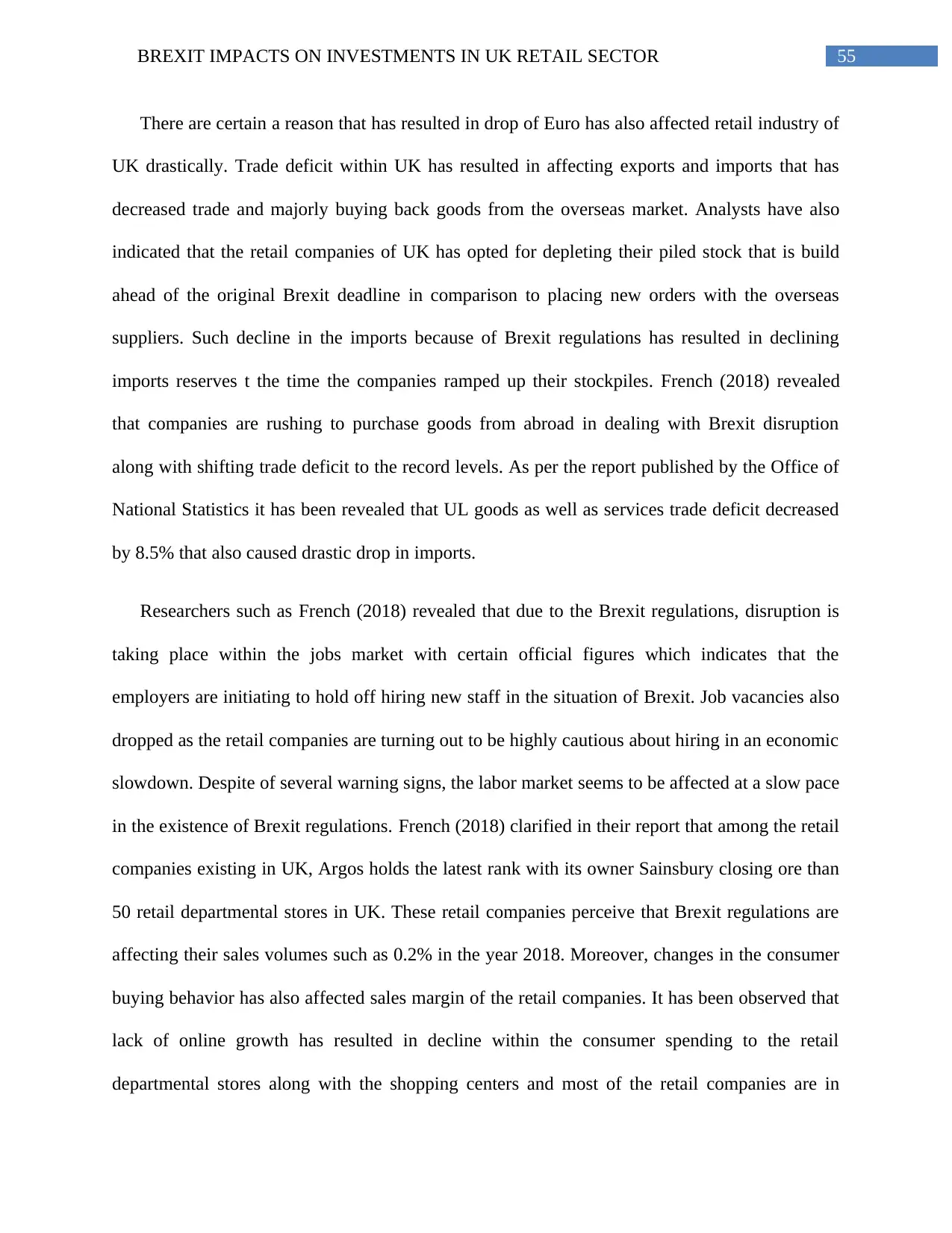
55BREXIT IMPACTS ON INVESTMENTS IN UK RETAIL SECTOR
There are certain a reason that has resulted in drop of Euro has also affected retail industry of
UK drastically. Trade deficit within UK has resulted in affecting exports and imports that has
decreased trade and majorly buying back goods from the overseas market. Analysts have also
indicated that the retail companies of UK has opted for depleting their piled stock that is build
ahead of the original Brexit deadline in comparison to placing new orders with the overseas
suppliers. Such decline in the imports because of Brexit regulations has resulted in declining
imports reserves t the time the companies ramped up their stockpiles. French (2018) revealed
that companies are rushing to purchase goods from abroad in dealing with Brexit disruption
along with shifting trade deficit to the record levels. As per the report published by the Office of
National Statistics it has been revealed that UL goods as well as services trade deficit decreased
by 8.5% that also caused drastic drop in imports.
Researchers such as French (2018) revealed that due to the Brexit regulations, disruption is
taking place within the jobs market with certain official figures which indicates that the
employers are initiating to hold off hiring new staff in the situation of Brexit. Job vacancies also
dropped as the retail companies are turning out to be highly cautious about hiring in an economic
slowdown. Despite of several warning signs, the labor market seems to be affected at a slow pace
in the existence of Brexit regulations. French (2018) clarified in their report that among the retail
companies existing in UK, Argos holds the latest rank with its owner Sainsbury closing ore than
50 retail departmental stores in UK. These retail companies perceive that Brexit regulations are
affecting their sales volumes such as 0.2% in the year 2018. Moreover, changes in the consumer
buying behavior has also affected sales margin of the retail companies. It has been observed that
lack of online growth has resulted in decline within the consumer spending to the retail
departmental stores along with the shopping centers and most of the retail companies are in
There are certain a reason that has resulted in drop of Euro has also affected retail industry of
UK drastically. Trade deficit within UK has resulted in affecting exports and imports that has
decreased trade and majorly buying back goods from the overseas market. Analysts have also
indicated that the retail companies of UK has opted for depleting their piled stock that is build
ahead of the original Brexit deadline in comparison to placing new orders with the overseas
suppliers. Such decline in the imports because of Brexit regulations has resulted in declining
imports reserves t the time the companies ramped up their stockpiles. French (2018) revealed
that companies are rushing to purchase goods from abroad in dealing with Brexit disruption
along with shifting trade deficit to the record levels. As per the report published by the Office of
National Statistics it has been revealed that UL goods as well as services trade deficit decreased
by 8.5% that also caused drastic drop in imports.
Researchers such as French (2018) revealed that due to the Brexit regulations, disruption is
taking place within the jobs market with certain official figures which indicates that the
employers are initiating to hold off hiring new staff in the situation of Brexit. Job vacancies also
dropped as the retail companies are turning out to be highly cautious about hiring in an economic
slowdown. Despite of several warning signs, the labor market seems to be affected at a slow pace
in the existence of Brexit regulations. French (2018) clarified in their report that among the retail
companies existing in UK, Argos holds the latest rank with its owner Sainsbury closing ore than
50 retail departmental stores in UK. These retail companies perceive that Brexit regulations are
affecting their sales volumes such as 0.2% in the year 2018. Moreover, changes in the consumer
buying behavior has also affected sales margin of the retail companies. It has been observed that
lack of online growth has resulted in decline within the consumer spending to the retail
departmental stores along with the shopping centers and most of the retail companies are in
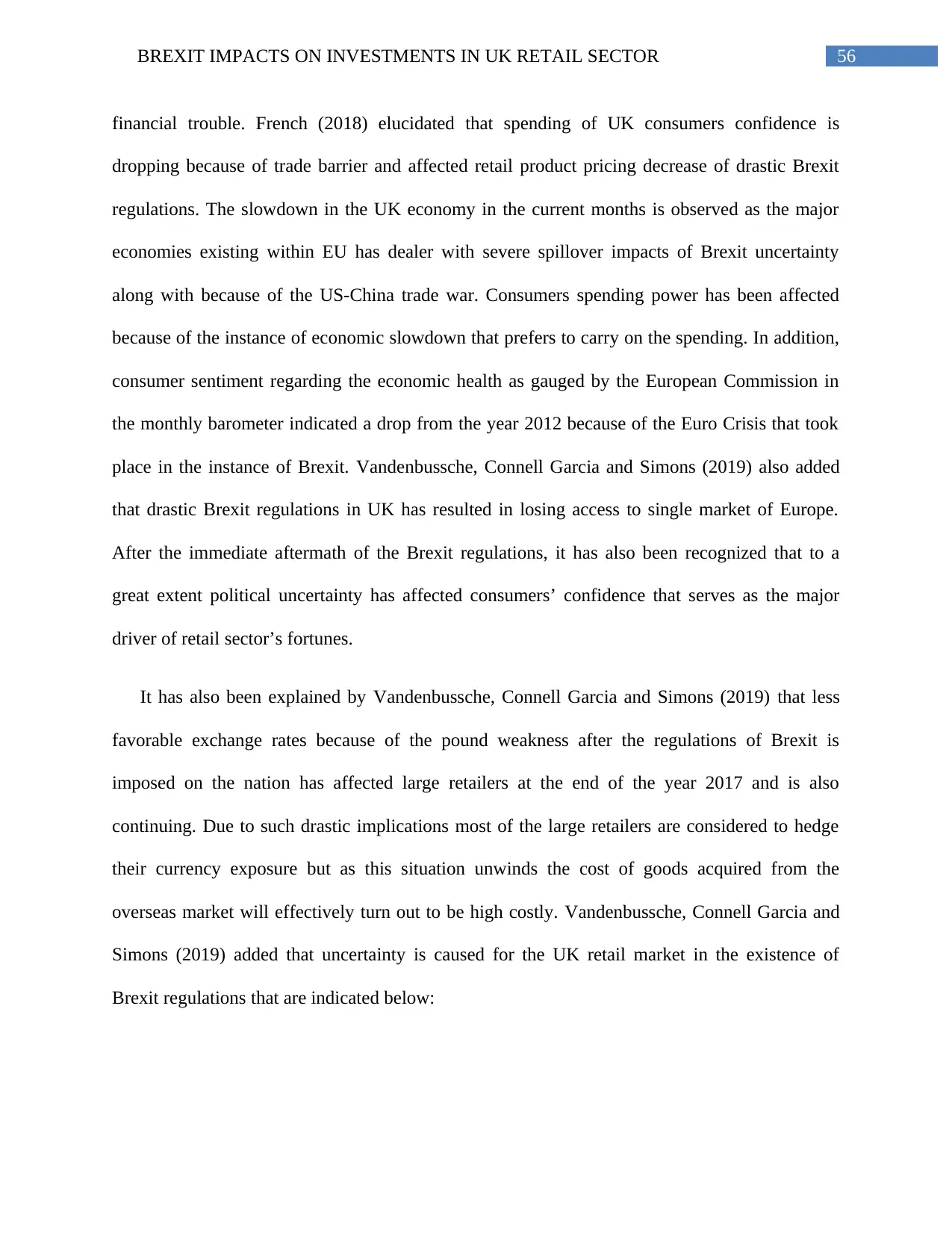
56BREXIT IMPACTS ON INVESTMENTS IN UK RETAIL SECTOR
financial trouble. French (2018) elucidated that spending of UK consumers confidence is
dropping because of trade barrier and affected retail product pricing decrease of drastic Brexit
regulations. The slowdown in the UK economy in the current months is observed as the major
economies existing within EU has dealer with severe spillover impacts of Brexit uncertainty
along with because of the US-China trade war. Consumers spending power has been affected
because of the instance of economic slowdown that prefers to carry on the spending. In addition,
consumer sentiment regarding the economic health as gauged by the European Commission in
the monthly barometer indicated a drop from the year 2012 because of the Euro Crisis that took
place in the instance of Brexit. Vandenbussche, Connell Garcia and Simons (2019) also added
that drastic Brexit regulations in UK has resulted in losing access to single market of Europe.
After the immediate aftermath of the Brexit regulations, it has also been recognized that to a
great extent political uncertainty has affected consumers’ confidence that serves as the major
driver of retail sector’s fortunes.
It has also been explained by Vandenbussche, Connell Garcia and Simons (2019) that less
favorable exchange rates because of the pound weakness after the regulations of Brexit is
imposed on the nation has affected large retailers at the end of the year 2017 and is also
continuing. Due to such drastic implications most of the large retailers are considered to hedge
their currency exposure but as this situation unwinds the cost of goods acquired from the
overseas market will effectively turn out to be high costly. Vandenbussche, Connell Garcia and
Simons (2019) added that uncertainty is caused for the UK retail market in the existence of
Brexit regulations that are indicated below:
financial trouble. French (2018) elucidated that spending of UK consumers confidence is
dropping because of trade barrier and affected retail product pricing decrease of drastic Brexit
regulations. The slowdown in the UK economy in the current months is observed as the major
economies existing within EU has dealer with severe spillover impacts of Brexit uncertainty
along with because of the US-China trade war. Consumers spending power has been affected
because of the instance of economic slowdown that prefers to carry on the spending. In addition,
consumer sentiment regarding the economic health as gauged by the European Commission in
the monthly barometer indicated a drop from the year 2012 because of the Euro Crisis that took
place in the instance of Brexit. Vandenbussche, Connell Garcia and Simons (2019) also added
that drastic Brexit regulations in UK has resulted in losing access to single market of Europe.
After the immediate aftermath of the Brexit regulations, it has also been recognized that to a
great extent political uncertainty has affected consumers’ confidence that serves as the major
driver of retail sector’s fortunes.
It has also been explained by Vandenbussche, Connell Garcia and Simons (2019) that less
favorable exchange rates because of the pound weakness after the regulations of Brexit is
imposed on the nation has affected large retailers at the end of the year 2017 and is also
continuing. Due to such drastic implications most of the large retailers are considered to hedge
their currency exposure but as this situation unwinds the cost of goods acquired from the
overseas market will effectively turn out to be high costly. Vandenbussche, Connell Garcia and
Simons (2019) added that uncertainty is caused for the UK retail market in the existence of
Brexit regulations that are indicated below:
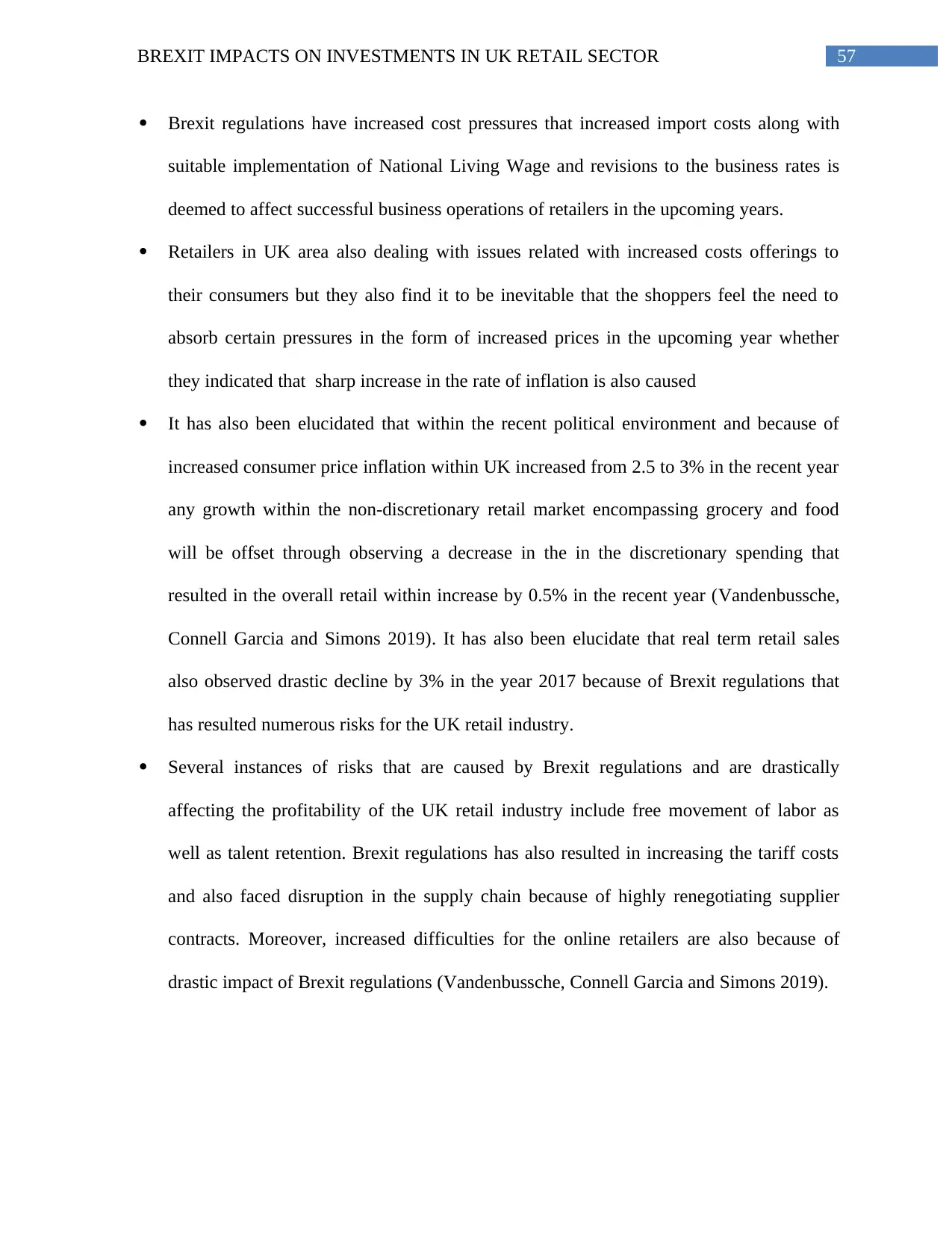
57BREXIT IMPACTS ON INVESTMENTS IN UK RETAIL SECTOR
Brexit regulations have increased cost pressures that increased import costs along with
suitable implementation of National Living Wage and revisions to the business rates is
deemed to affect successful business operations of retailers in the upcoming years.
Retailers in UK area also dealing with issues related with increased costs offerings to
their consumers but they also find it to be inevitable that the shoppers feel the need to
absorb certain pressures in the form of increased prices in the upcoming year whether
they indicated that sharp increase in the rate of inflation is also caused
It has also been elucidated that within the recent political environment and because of
increased consumer price inflation within UK increased from 2.5 to 3% in the recent year
any growth within the non-discretionary retail market encompassing grocery and food
will be offset through observing a decrease in the in the discretionary spending that
resulted in the overall retail within increase by 0.5% in the recent year (Vandenbussche,
Connell Garcia and Simons 2019). It has also been elucidate that real term retail sales
also observed drastic decline by 3% in the year 2017 because of Brexit regulations that
has resulted numerous risks for the UK retail industry.
Several instances of risks that are caused by Brexit regulations and are drastically
affecting the profitability of the UK retail industry include free movement of labor as
well as talent retention. Brexit regulations has also resulted in increasing the tariff costs
and also faced disruption in the supply chain because of highly renegotiating supplier
contracts. Moreover, increased difficulties for the online retailers are also because of
drastic impact of Brexit regulations (Vandenbussche, Connell Garcia and Simons 2019).
Brexit regulations have increased cost pressures that increased import costs along with
suitable implementation of National Living Wage and revisions to the business rates is
deemed to affect successful business operations of retailers in the upcoming years.
Retailers in UK area also dealing with issues related with increased costs offerings to
their consumers but they also find it to be inevitable that the shoppers feel the need to
absorb certain pressures in the form of increased prices in the upcoming year whether
they indicated that sharp increase in the rate of inflation is also caused
It has also been elucidated that within the recent political environment and because of
increased consumer price inflation within UK increased from 2.5 to 3% in the recent year
any growth within the non-discretionary retail market encompassing grocery and food
will be offset through observing a decrease in the in the discretionary spending that
resulted in the overall retail within increase by 0.5% in the recent year (Vandenbussche,
Connell Garcia and Simons 2019). It has also been elucidate that real term retail sales
also observed drastic decline by 3% in the year 2017 because of Brexit regulations that
has resulted numerous risks for the UK retail industry.
Several instances of risks that are caused by Brexit regulations and are drastically
affecting the profitability of the UK retail industry include free movement of labor as
well as talent retention. Brexit regulations has also resulted in increasing the tariff costs
and also faced disruption in the supply chain because of highly renegotiating supplier
contracts. Moreover, increased difficulties for the online retailers are also because of
drastic impact of Brexit regulations (Vandenbussche, Connell Garcia and Simons 2019).
Secure Best Marks with AI Grader
Need help grading? Try our AI Grader for instant feedback on your assignments.
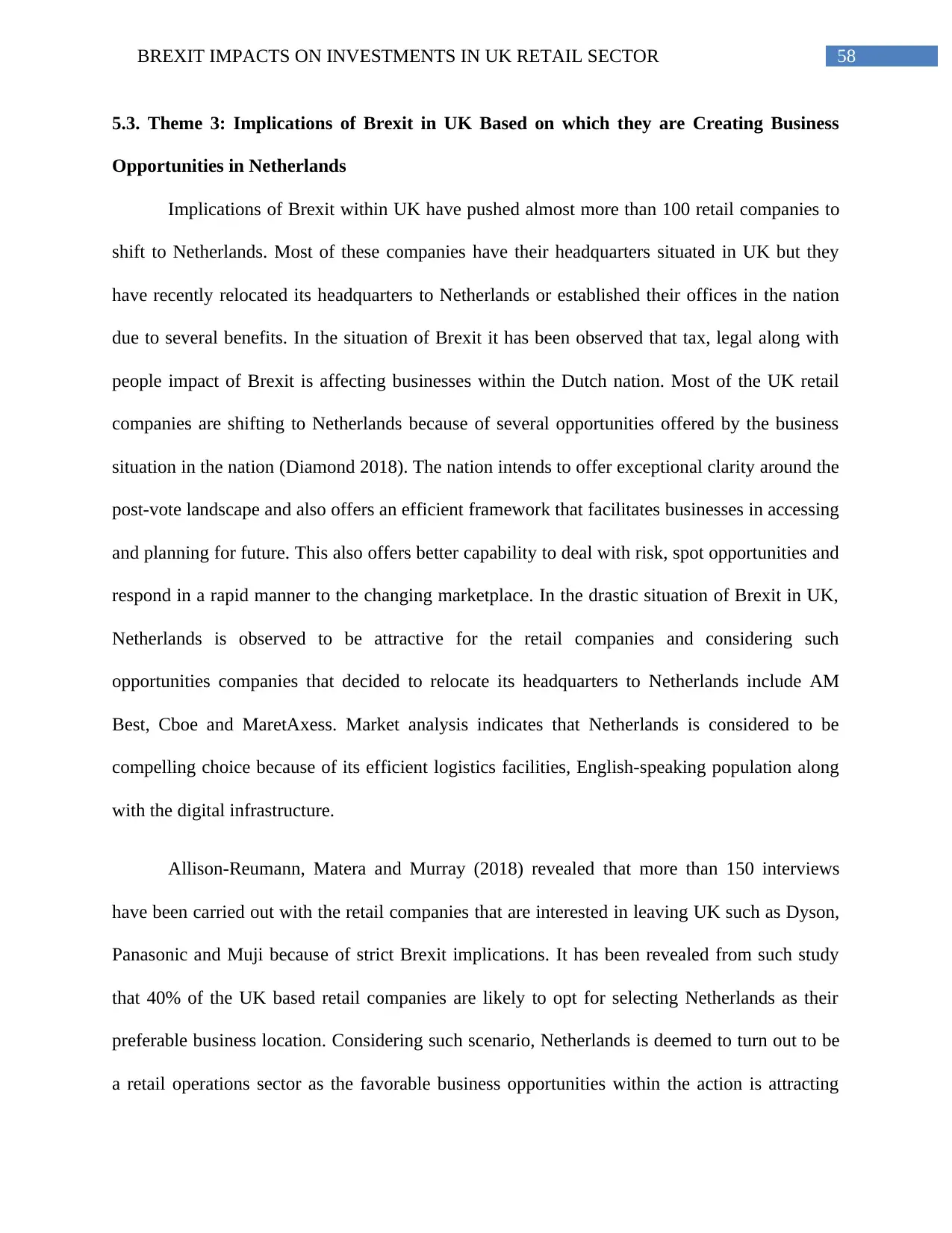
58BREXIT IMPACTS ON INVESTMENTS IN UK RETAIL SECTOR
5.3. Theme 3: Implications of Brexit in UK Based on which they are Creating Business
Opportunities in Netherlands
Implications of Brexit within UK have pushed almost more than 100 retail companies to
shift to Netherlands. Most of these companies have their headquarters situated in UK but they
have recently relocated its headquarters to Netherlands or established their offices in the nation
due to several benefits. In the situation of Brexit it has been observed that tax, legal along with
people impact of Brexit is affecting businesses within the Dutch nation. Most of the UK retail
companies are shifting to Netherlands because of several opportunities offered by the business
situation in the nation (Diamond 2018). The nation intends to offer exceptional clarity around the
post-vote landscape and also offers an efficient framework that facilitates businesses in accessing
and planning for future. This also offers better capability to deal with risk, spot opportunities and
respond in a rapid manner to the changing marketplace. In the drastic situation of Brexit in UK,
Netherlands is observed to be attractive for the retail companies and considering such
opportunities companies that decided to relocate its headquarters to Netherlands include AM
Best, Cboe and MaretAxess. Market analysis indicates that Netherlands is considered to be
compelling choice because of its efficient logistics facilities, English-speaking population along
with the digital infrastructure.
Allison-Reumann, Matera and Murray (2018) revealed that more than 150 interviews
have been carried out with the retail companies that are interested in leaving UK such as Dyson,
Panasonic and Muji because of strict Brexit implications. It has been revealed from such study
that 40% of the UK based retail companies are likely to opt for selecting Netherlands as their
preferable business location. Considering such scenario, Netherlands is deemed to turn out to be
a retail operations sector as the favorable business opportunities within the action is attracting
5.3. Theme 3: Implications of Brexit in UK Based on which they are Creating Business
Opportunities in Netherlands
Implications of Brexit within UK have pushed almost more than 100 retail companies to
shift to Netherlands. Most of these companies have their headquarters situated in UK but they
have recently relocated its headquarters to Netherlands or established their offices in the nation
due to several benefits. In the situation of Brexit it has been observed that tax, legal along with
people impact of Brexit is affecting businesses within the Dutch nation. Most of the UK retail
companies are shifting to Netherlands because of several opportunities offered by the business
situation in the nation (Diamond 2018). The nation intends to offer exceptional clarity around the
post-vote landscape and also offers an efficient framework that facilitates businesses in accessing
and planning for future. This also offers better capability to deal with risk, spot opportunities and
respond in a rapid manner to the changing marketplace. In the drastic situation of Brexit in UK,
Netherlands is observed to be attractive for the retail companies and considering such
opportunities companies that decided to relocate its headquarters to Netherlands include AM
Best, Cboe and MaretAxess. Market analysis indicates that Netherlands is considered to be
compelling choice because of its efficient logistics facilities, English-speaking population along
with the digital infrastructure.
Allison-Reumann, Matera and Murray (2018) revealed that more than 150 interviews
have been carried out with the retail companies that are interested in leaving UK such as Dyson,
Panasonic and Muji because of strict Brexit implications. It has been revealed from such study
that 40% of the UK based retail companies are likely to opt for selecting Netherlands as their
preferable business location. Considering such scenario, Netherlands is deemed to turn out to be
a retail operations sector as the favorable business opportunities within the action is attracting
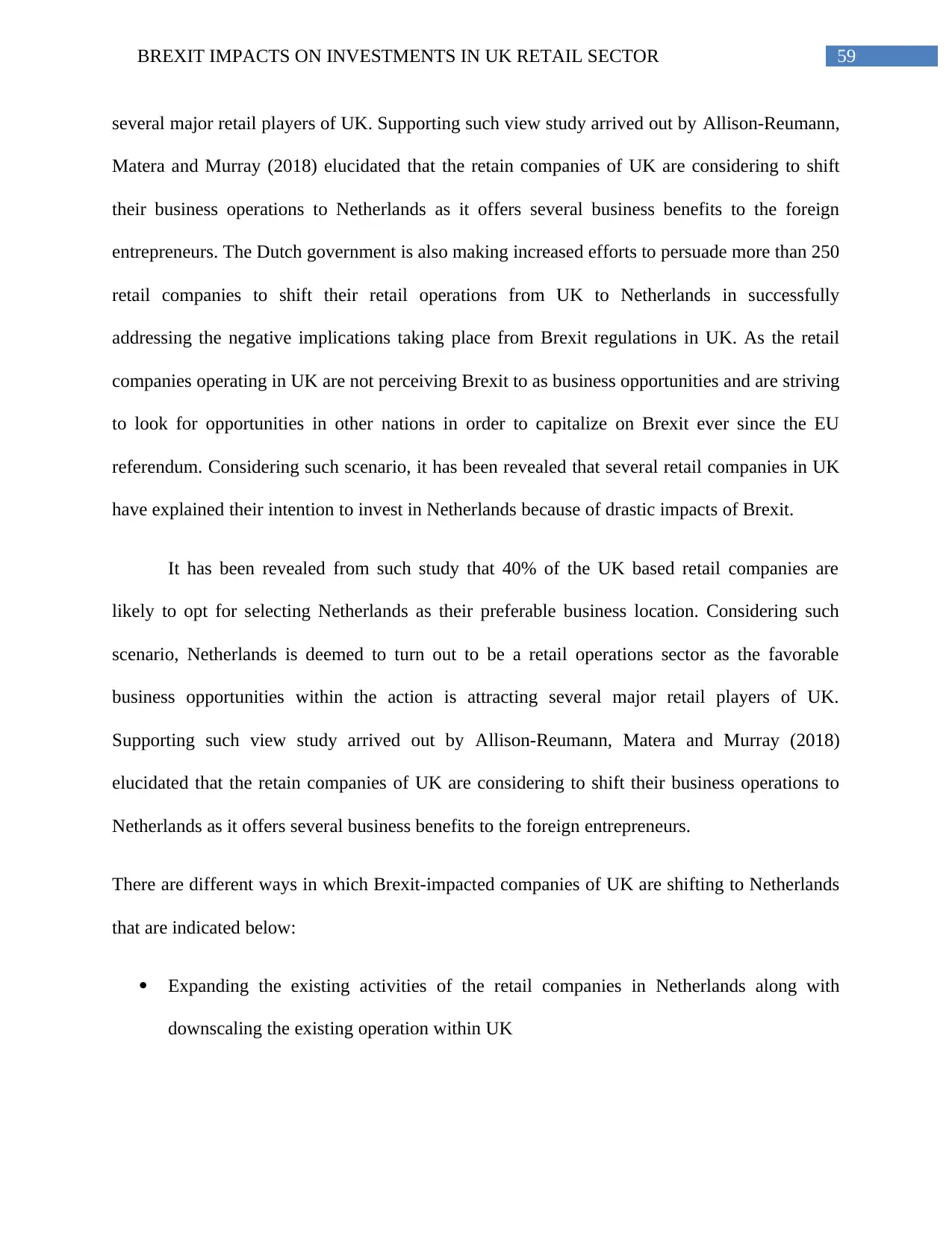
59BREXIT IMPACTS ON INVESTMENTS IN UK RETAIL SECTOR
several major retail players of UK. Supporting such view study arrived out by Allison-Reumann,
Matera and Murray (2018) elucidated that the retain companies of UK are considering to shift
their business operations to Netherlands as it offers several business benefits to the foreign
entrepreneurs. The Dutch government is also making increased efforts to persuade more than 250
retail companies to shift their retail operations from UK to Netherlands in successfully
addressing the negative implications taking place from Brexit regulations in UK. As the retail
companies operating in UK are not perceiving Brexit to as business opportunities and are striving
to look for opportunities in other nations in order to capitalize on Brexit ever since the EU
referendum. Considering such scenario, it has been revealed that several retail companies in UK
have explained their intention to invest in Netherlands because of drastic impacts of Brexit.
It has been revealed from such study that 40% of the UK based retail companies are
likely to opt for selecting Netherlands as their preferable business location. Considering such
scenario, Netherlands is deemed to turn out to be a retail operations sector as the favorable
business opportunities within the action is attracting several major retail players of UK.
Supporting such view study arrived out by Allison-Reumann, Matera and Murray (2018)
elucidated that the retain companies of UK are considering to shift their business operations to
Netherlands as it offers several business benefits to the foreign entrepreneurs.
There are different ways in which Brexit-impacted companies of UK are shifting to Netherlands
that are indicated below:
Expanding the existing activities of the retail companies in Netherlands along with
downscaling the existing operation within UK
several major retail players of UK. Supporting such view study arrived out by Allison-Reumann,
Matera and Murray (2018) elucidated that the retain companies of UK are considering to shift
their business operations to Netherlands as it offers several business benefits to the foreign
entrepreneurs. The Dutch government is also making increased efforts to persuade more than 250
retail companies to shift their retail operations from UK to Netherlands in successfully
addressing the negative implications taking place from Brexit regulations in UK. As the retail
companies operating in UK are not perceiving Brexit to as business opportunities and are striving
to look for opportunities in other nations in order to capitalize on Brexit ever since the EU
referendum. Considering such scenario, it has been revealed that several retail companies in UK
have explained their intention to invest in Netherlands because of drastic impacts of Brexit.
It has been revealed from such study that 40% of the UK based retail companies are
likely to opt for selecting Netherlands as their preferable business location. Considering such
scenario, Netherlands is deemed to turn out to be a retail operations sector as the favorable
business opportunities within the action is attracting several major retail players of UK.
Supporting such view study arrived out by Allison-Reumann, Matera and Murray (2018)
elucidated that the retain companies of UK are considering to shift their business operations to
Netherlands as it offers several business benefits to the foreign entrepreneurs.
There are different ways in which Brexit-impacted companies of UK are shifting to Netherlands
that are indicated below:
Expanding the existing activities of the retail companies in Netherlands along with
downscaling the existing operation within UK
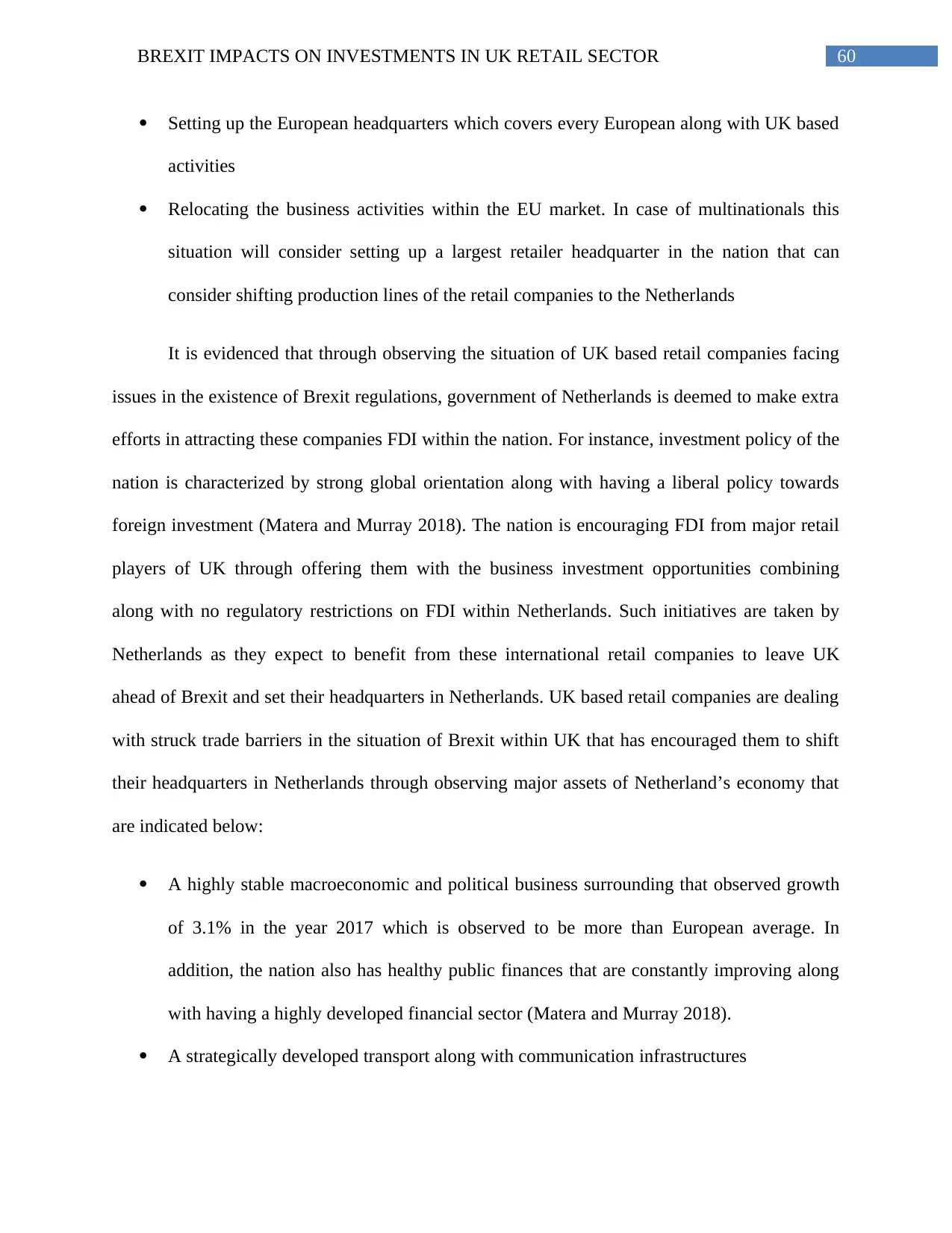
60BREXIT IMPACTS ON INVESTMENTS IN UK RETAIL SECTOR
Setting up the European headquarters which covers every European along with UK based
activities
Relocating the business activities within the EU market. In case of multinationals this
situation will consider setting up a largest retailer headquarter in the nation that can
consider shifting production lines of the retail companies to the Netherlands
It is evidenced that through observing the situation of UK based retail companies facing
issues in the existence of Brexit regulations, government of Netherlands is deemed to make extra
efforts in attracting these companies FDI within the nation. For instance, investment policy of the
nation is characterized by strong global orientation along with having a liberal policy towards
foreign investment (Matera and Murray 2018). The nation is encouraging FDI from major retail
players of UK through offering them with the business investment opportunities combining
along with no regulatory restrictions on FDI within Netherlands. Such initiatives are taken by
Netherlands as they expect to benefit from these international retail companies to leave UK
ahead of Brexit and set their headquarters in Netherlands. UK based retail companies are dealing
with struck trade barriers in the situation of Brexit within UK that has encouraged them to shift
their headquarters in Netherlands through observing major assets of Netherland’s economy that
are indicated below:
A highly stable macroeconomic and political business surrounding that observed growth
of 3.1% in the year 2017 which is observed to be more than European average. In
addition, the nation also has healthy public finances that are constantly improving along
with having a highly developed financial sector (Matera and Murray 2018).
A strategically developed transport along with communication infrastructures
Setting up the European headquarters which covers every European along with UK based
activities
Relocating the business activities within the EU market. In case of multinationals this
situation will consider setting up a largest retailer headquarter in the nation that can
consider shifting production lines of the retail companies to the Netherlands
It is evidenced that through observing the situation of UK based retail companies facing
issues in the existence of Brexit regulations, government of Netherlands is deemed to make extra
efforts in attracting these companies FDI within the nation. For instance, investment policy of the
nation is characterized by strong global orientation along with having a liberal policy towards
foreign investment (Matera and Murray 2018). The nation is encouraging FDI from major retail
players of UK through offering them with the business investment opportunities combining
along with no regulatory restrictions on FDI within Netherlands. Such initiatives are taken by
Netherlands as they expect to benefit from these international retail companies to leave UK
ahead of Brexit and set their headquarters in Netherlands. UK based retail companies are dealing
with struck trade barriers in the situation of Brexit within UK that has encouraged them to shift
their headquarters in Netherlands through observing major assets of Netherland’s economy that
are indicated below:
A highly stable macroeconomic and political business surrounding that observed growth
of 3.1% in the year 2017 which is observed to be more than European average. In
addition, the nation also has healthy public finances that are constantly improving along
with having a highly developed financial sector (Matera and Murray 2018).
A strategically developed transport along with communication infrastructures
Paraphrase This Document
Need a fresh take? Get an instant paraphrase of this document with our AI Paraphraser
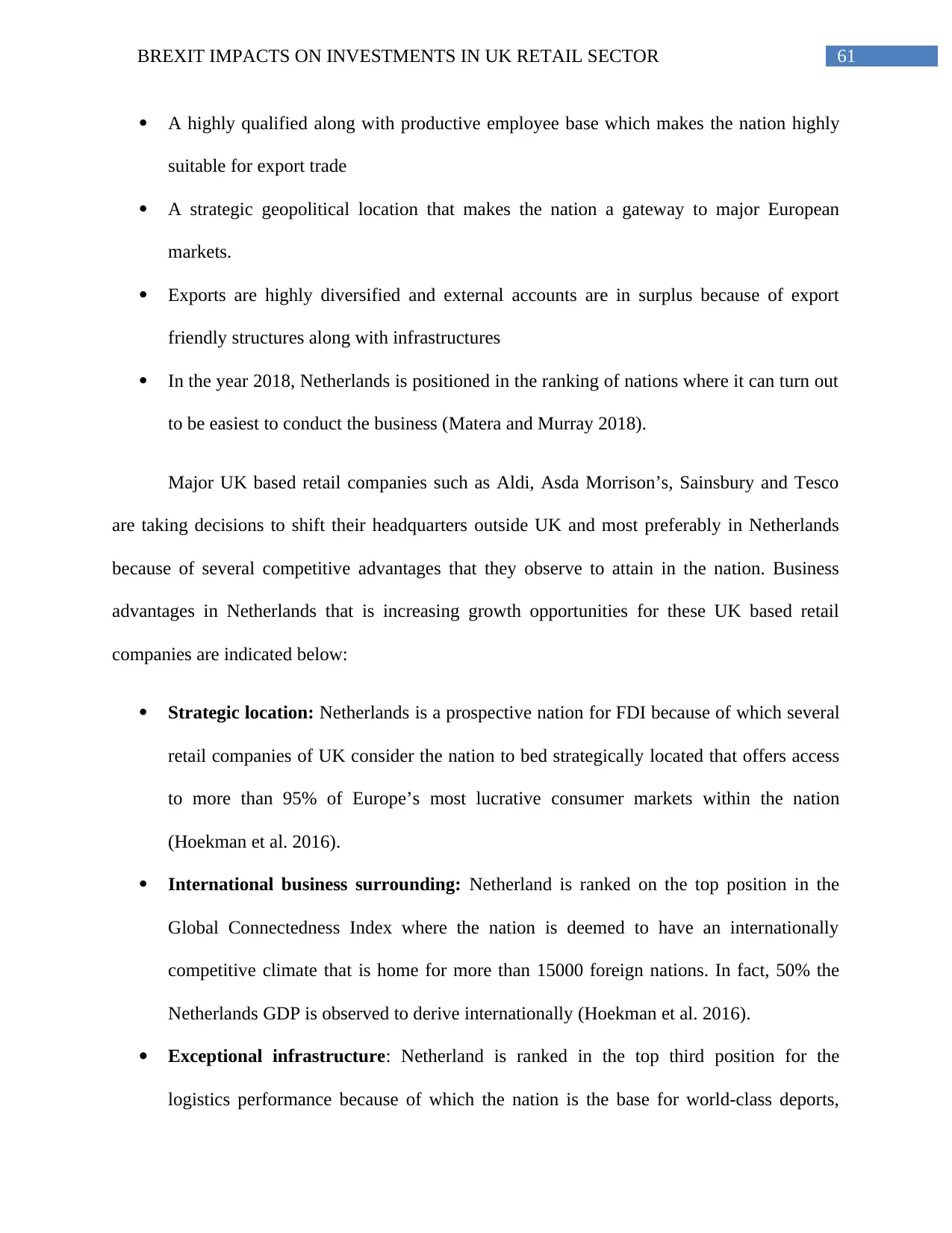
61BREXIT IMPACTS ON INVESTMENTS IN UK RETAIL SECTOR
A highly qualified along with productive employee base which makes the nation highly
suitable for export trade
A strategic geopolitical location that makes the nation a gateway to major European
markets.
Exports are highly diversified and external accounts are in surplus because of export
friendly structures along with infrastructures
In the year 2018, Netherlands is positioned in the ranking of nations where it can turn out
to be easiest to conduct the business (Matera and Murray 2018).
Major UK based retail companies such as Aldi, Asda Morrison’s, Sainsbury and Tesco
are taking decisions to shift their headquarters outside UK and most preferably in Netherlands
because of several competitive advantages that they observe to attain in the nation. Business
advantages in Netherlands that is increasing growth opportunities for these UK based retail
companies are indicated below:
Strategic location: Netherlands is a prospective nation for FDI because of which several
retail companies of UK consider the nation to bed strategically located that offers access
to more than 95% of Europe’s most lucrative consumer markets within the nation
(Hoekman et al. 2016).
International business surrounding: Netherland is ranked on the top position in the
Global Connectedness Index where the nation is deemed to have an internationally
competitive climate that is home for more than 15000 foreign nations. In fact, 50% the
Netherlands GDP is observed to derive internationally (Hoekman et al. 2016).
Exceptional infrastructure: Netherland is ranked in the top third position for the
logistics performance because of which the nation is the base for world-class deports,
A highly qualified along with productive employee base which makes the nation highly
suitable for export trade
A strategic geopolitical location that makes the nation a gateway to major European
markets.
Exports are highly diversified and external accounts are in surplus because of export
friendly structures along with infrastructures
In the year 2018, Netherlands is positioned in the ranking of nations where it can turn out
to be easiest to conduct the business (Matera and Murray 2018).
Major UK based retail companies such as Aldi, Asda Morrison’s, Sainsbury and Tesco
are taking decisions to shift their headquarters outside UK and most preferably in Netherlands
because of several competitive advantages that they observe to attain in the nation. Business
advantages in Netherlands that is increasing growth opportunities for these UK based retail
companies are indicated below:
Strategic location: Netherlands is a prospective nation for FDI because of which several
retail companies of UK consider the nation to bed strategically located that offers access
to more than 95% of Europe’s most lucrative consumer markets within the nation
(Hoekman et al. 2016).
International business surrounding: Netherland is ranked on the top position in the
Global Connectedness Index where the nation is deemed to have an internationally
competitive climate that is home for more than 15000 foreign nations. In fact, 50% the
Netherlands GDP is observed to derive internationally (Hoekman et al. 2016).
Exceptional infrastructure: Netherland is ranked in the top third position for the
logistics performance because of which the nation is the base for world-class deports,
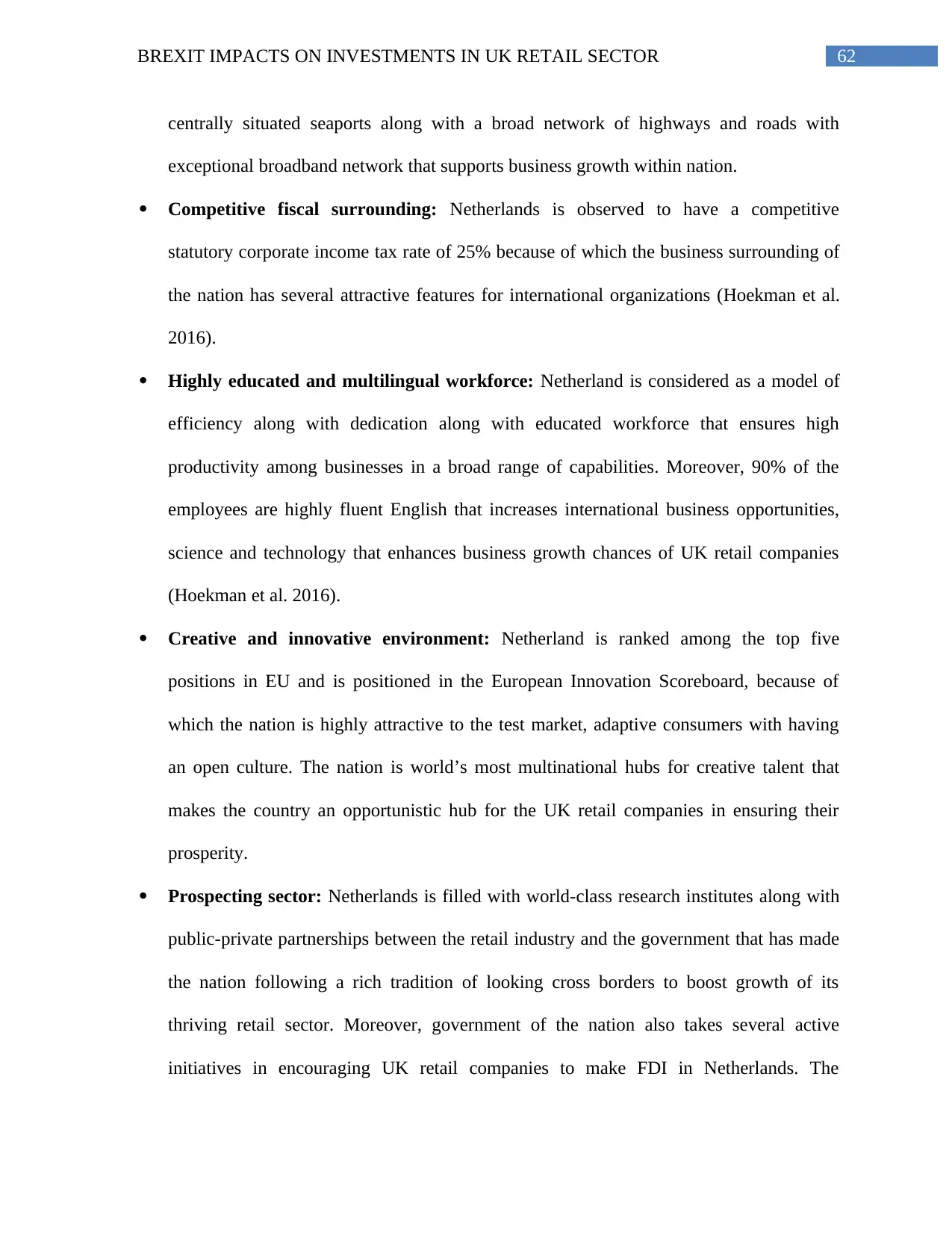
62BREXIT IMPACTS ON INVESTMENTS IN UK RETAIL SECTOR
centrally situated seaports along with a broad network of highways and roads with
exceptional broadband network that supports business growth within nation.
Competitive fiscal surrounding: Netherlands is observed to have a competitive
statutory corporate income tax rate of 25% because of which the business surrounding of
the nation has several attractive features for international organizations (Hoekman et al.
2016).
Highly educated and multilingual workforce: Netherland is considered as a model of
efficiency along with dedication along with educated workforce that ensures high
productivity among businesses in a broad range of capabilities. Moreover, 90% of the
employees are highly fluent English that increases international business opportunities,
science and technology that enhances business growth chances of UK retail companies
(Hoekman et al. 2016).
Creative and innovative environment: Netherland is ranked among the top five
positions in EU and is positioned in the European Innovation Scoreboard, because of
which the nation is highly attractive to the test market, adaptive consumers with having
an open culture. The nation is world’s most multinational hubs for creative talent that
makes the country an opportunistic hub for the UK retail companies in ensuring their
prosperity.
Prospecting sector: Netherlands is filled with world-class research institutes along with
public-private partnerships between the retail industry and the government that has made
the nation following a rich tradition of looking cross borders to boost growth of its
thriving retail sector. Moreover, government of the nation also takes several active
initiatives in encouraging UK retail companies to make FDI in Netherlands. The
centrally situated seaports along with a broad network of highways and roads with
exceptional broadband network that supports business growth within nation.
Competitive fiscal surrounding: Netherlands is observed to have a competitive
statutory corporate income tax rate of 25% because of which the business surrounding of
the nation has several attractive features for international organizations (Hoekman et al.
2016).
Highly educated and multilingual workforce: Netherland is considered as a model of
efficiency along with dedication along with educated workforce that ensures high
productivity among businesses in a broad range of capabilities. Moreover, 90% of the
employees are highly fluent English that increases international business opportunities,
science and technology that enhances business growth chances of UK retail companies
(Hoekman et al. 2016).
Creative and innovative environment: Netherland is ranked among the top five
positions in EU and is positioned in the European Innovation Scoreboard, because of
which the nation is highly attractive to the test market, adaptive consumers with having
an open culture. The nation is world’s most multinational hubs for creative talent that
makes the country an opportunistic hub for the UK retail companies in ensuring their
prosperity.
Prospecting sector: Netherlands is filled with world-class research institutes along with
public-private partnerships between the retail industry and the government that has made
the nation following a rich tradition of looking cross borders to boost growth of its
thriving retail sector. Moreover, government of the nation also takes several active
initiatives in encouraging UK retail companies to make FDI in Netherlands. The
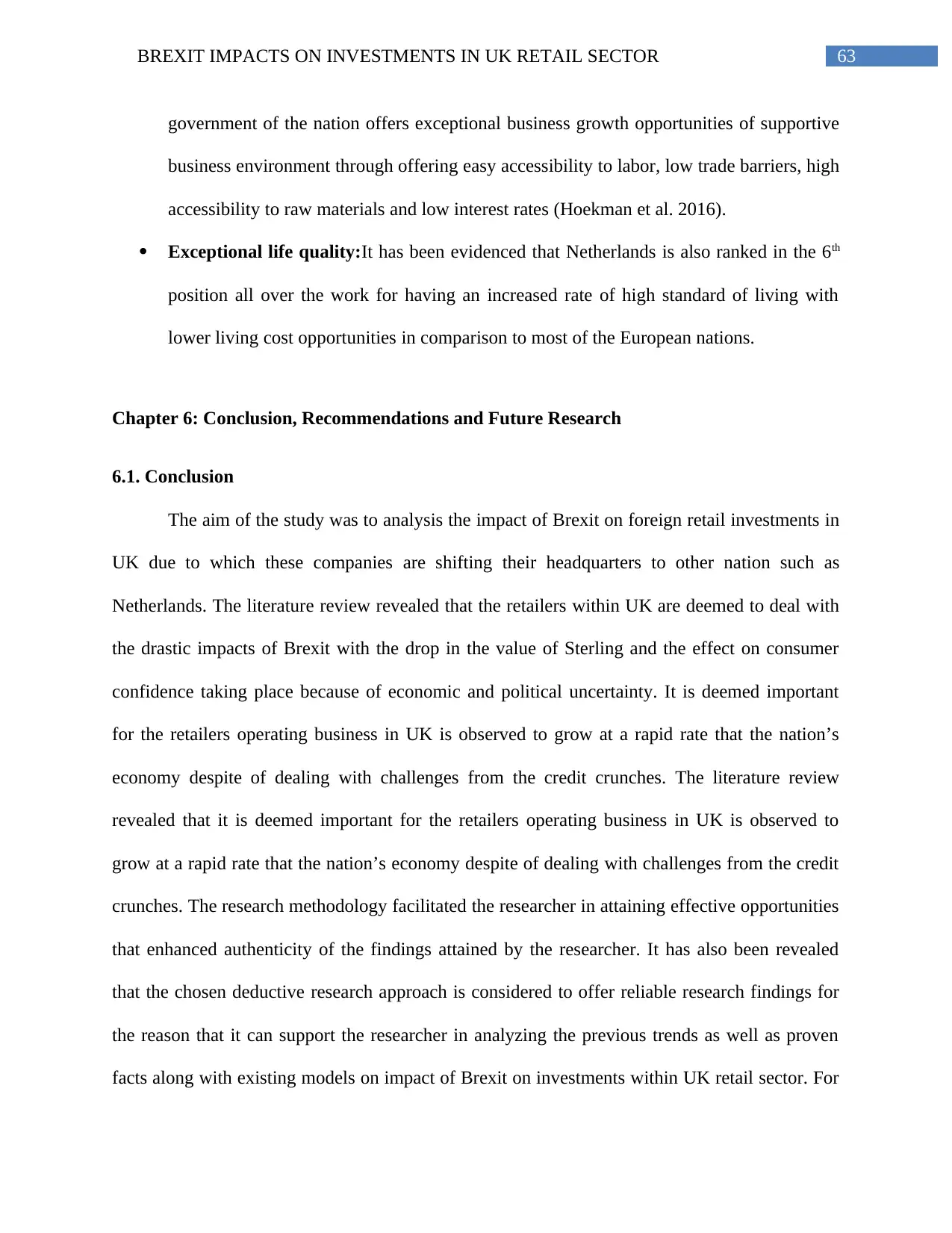
63BREXIT IMPACTS ON INVESTMENTS IN UK RETAIL SECTOR
government of the nation offers exceptional business growth opportunities of supportive
business environment through offering easy accessibility to labor, low trade barriers, high
accessibility to raw materials and low interest rates (Hoekman et al. 2016).
Exceptional life quality:It has been evidenced that Netherlands is also ranked in the 6th
position all over the work for having an increased rate of high standard of living with
lower living cost opportunities in comparison to most of the European nations.
Chapter 6: Conclusion, Recommendations and Future Research
6.1. Conclusion
The aim of the study was to analysis the impact of Brexit on foreign retail investments in
UK due to which these companies are shifting their headquarters to other nation such as
Netherlands. The literature review revealed that the retailers within UK are deemed to deal with
the drastic impacts of Brexit with the drop in the value of Sterling and the effect on consumer
confidence taking place because of economic and political uncertainty. It is deemed important
for the retailers operating business in UK is observed to grow at a rapid rate that the nation’s
economy despite of dealing with challenges from the credit crunches. The literature review
revealed that it is deemed important for the retailers operating business in UK is observed to
grow at a rapid rate that the nation’s economy despite of dealing with challenges from the credit
crunches. The research methodology facilitated the researcher in attaining effective opportunities
that enhanced authenticity of the findings attained by the researcher. It has also been revealed
that the chosen deductive research approach is considered to offer reliable research findings for
the reason that it can support the researcher in analyzing the previous trends as well as proven
facts along with existing models on impact of Brexit on investments within UK retail sector. For
government of the nation offers exceptional business growth opportunities of supportive
business environment through offering easy accessibility to labor, low trade barriers, high
accessibility to raw materials and low interest rates (Hoekman et al. 2016).
Exceptional life quality:It has been evidenced that Netherlands is also ranked in the 6th
position all over the work for having an increased rate of high standard of living with
lower living cost opportunities in comparison to most of the European nations.
Chapter 6: Conclusion, Recommendations and Future Research
6.1. Conclusion
The aim of the study was to analysis the impact of Brexit on foreign retail investments in
UK due to which these companies are shifting their headquarters to other nation such as
Netherlands. The literature review revealed that the retailers within UK are deemed to deal with
the drastic impacts of Brexit with the drop in the value of Sterling and the effect on consumer
confidence taking place because of economic and political uncertainty. It is deemed important
for the retailers operating business in UK is observed to grow at a rapid rate that the nation’s
economy despite of dealing with challenges from the credit crunches. The literature review
revealed that it is deemed important for the retailers operating business in UK is observed to
grow at a rapid rate that the nation’s economy despite of dealing with challenges from the credit
crunches. The research methodology facilitated the researcher in attaining effective opportunities
that enhanced authenticity of the findings attained by the researcher. It has also been revealed
that the chosen deductive research approach is considered to offer reliable research findings for
the reason that it can support the researcher in analyzing the previous trends as well as proven
facts along with existing models on impact of Brexit on investments within UK retail sector. For
Secure Best Marks with AI Grader
Need help grading? Try our AI Grader for instant feedback on your assignments.
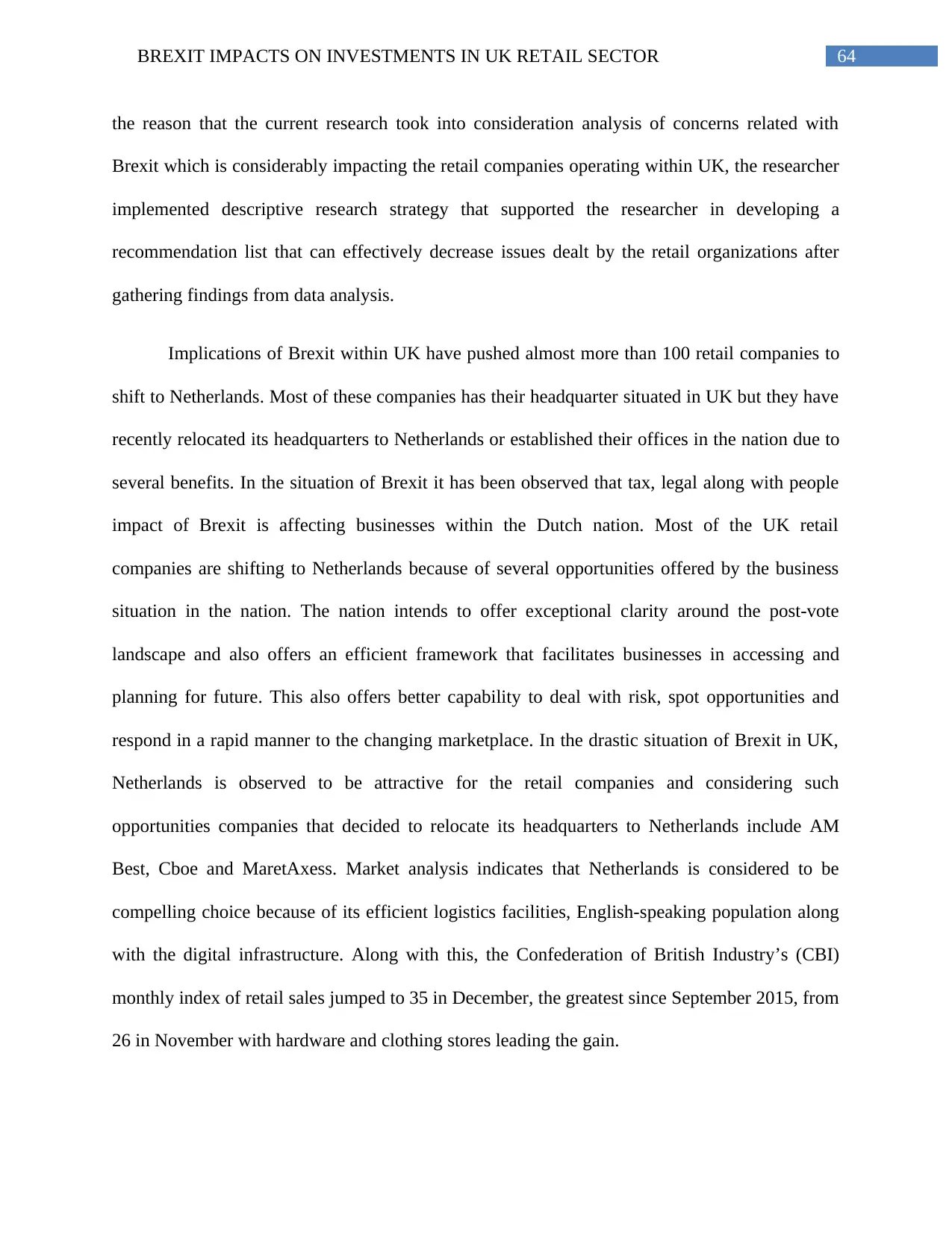
64BREXIT IMPACTS ON INVESTMENTS IN UK RETAIL SECTOR
the reason that the current research took into consideration analysis of concerns related with
Brexit which is considerably impacting the retail companies operating within UK, the researcher
implemented descriptive research strategy that supported the researcher in developing a
recommendation list that can effectively decrease issues dealt by the retail organizations after
gathering findings from data analysis.
Implications of Brexit within UK have pushed almost more than 100 retail companies to
shift to Netherlands. Most of these companies has their headquarter situated in UK but they have
recently relocated its headquarters to Netherlands or established their offices in the nation due to
several benefits. In the situation of Brexit it has been observed that tax, legal along with people
impact of Brexit is affecting businesses within the Dutch nation. Most of the UK retail
companies are shifting to Netherlands because of several opportunities offered by the business
situation in the nation. The nation intends to offer exceptional clarity around the post-vote
landscape and also offers an efficient framework that facilitates businesses in accessing and
planning for future. This also offers better capability to deal with risk, spot opportunities and
respond in a rapid manner to the changing marketplace. In the drastic situation of Brexit in UK,
Netherlands is observed to be attractive for the retail companies and considering such
opportunities companies that decided to relocate its headquarters to Netherlands include AM
Best, Cboe and MaretAxess. Market analysis indicates that Netherlands is considered to be
compelling choice because of its efficient logistics facilities, English-speaking population along
with the digital infrastructure. Along with this, the Confederation of British Industry’s (CBI)
monthly index of retail sales jumped to 35 in December, the greatest since September 2015, from
26 in November with hardware and clothing stores leading the gain.
the reason that the current research took into consideration analysis of concerns related with
Brexit which is considerably impacting the retail companies operating within UK, the researcher
implemented descriptive research strategy that supported the researcher in developing a
recommendation list that can effectively decrease issues dealt by the retail organizations after
gathering findings from data analysis.
Implications of Brexit within UK have pushed almost more than 100 retail companies to
shift to Netherlands. Most of these companies has their headquarter situated in UK but they have
recently relocated its headquarters to Netherlands or established their offices in the nation due to
several benefits. In the situation of Brexit it has been observed that tax, legal along with people
impact of Brexit is affecting businesses within the Dutch nation. Most of the UK retail
companies are shifting to Netherlands because of several opportunities offered by the business
situation in the nation. The nation intends to offer exceptional clarity around the post-vote
landscape and also offers an efficient framework that facilitates businesses in accessing and
planning for future. This also offers better capability to deal with risk, spot opportunities and
respond in a rapid manner to the changing marketplace. In the drastic situation of Brexit in UK,
Netherlands is observed to be attractive for the retail companies and considering such
opportunities companies that decided to relocate its headquarters to Netherlands include AM
Best, Cboe and MaretAxess. Market analysis indicates that Netherlands is considered to be
compelling choice because of its efficient logistics facilities, English-speaking population along
with the digital infrastructure. Along with this, the Confederation of British Industry’s (CBI)
monthly index of retail sales jumped to 35 in December, the greatest since September 2015, from
26 in November with hardware and clothing stores leading the gain.
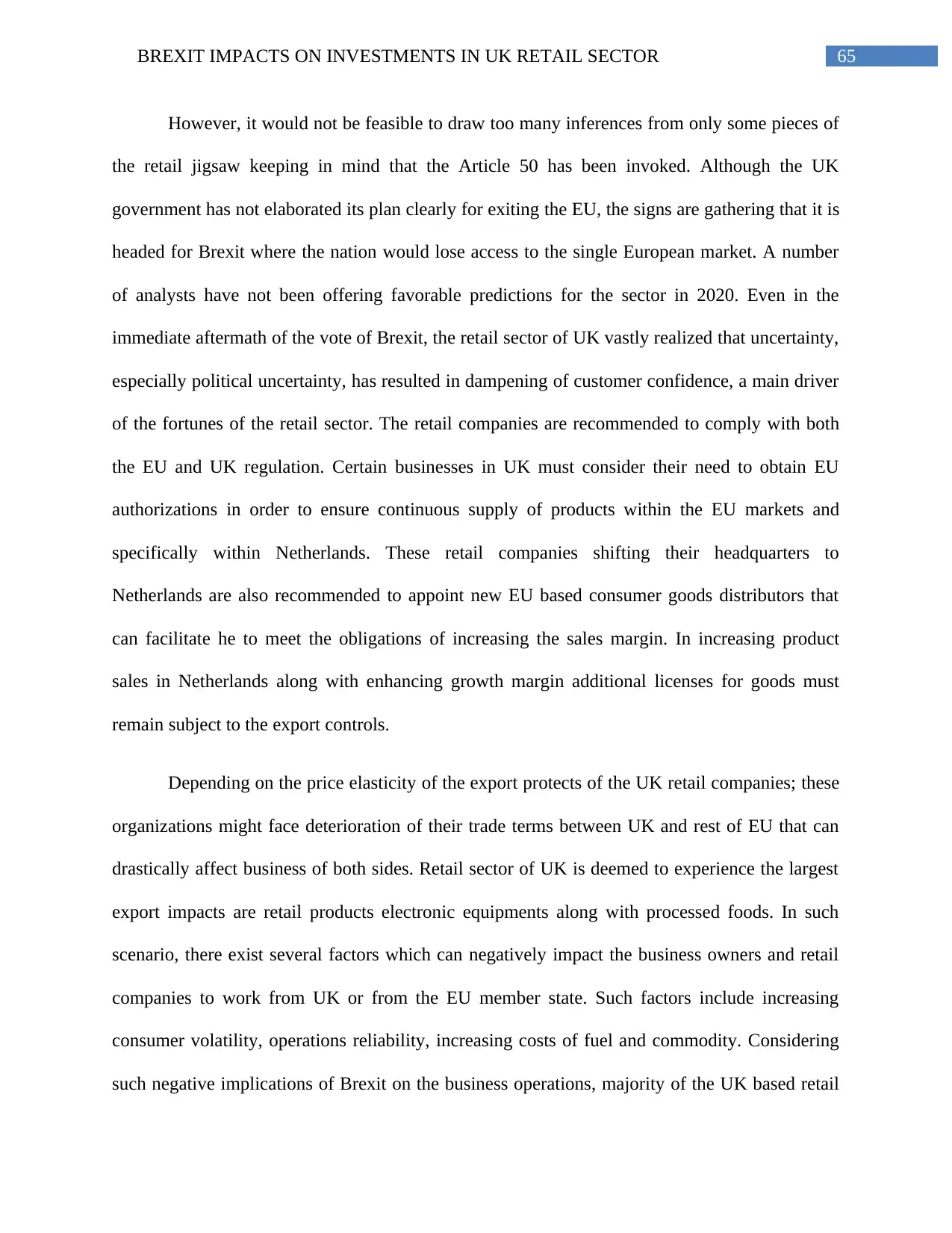
65BREXIT IMPACTS ON INVESTMENTS IN UK RETAIL SECTOR
However, it would not be feasible to draw too many inferences from only some pieces of
the retail jigsaw keeping in mind that the Article 50 has been invoked. Although the UK
government has not elaborated its plan clearly for exiting the EU, the signs are gathering that it is
headed for Brexit where the nation would lose access to the single European market. A number
of analysts have not been offering favorable predictions for the sector in 2020. Even in the
immediate aftermath of the vote of Brexit, the retail sector of UK vastly realized that uncertainty,
especially political uncertainty, has resulted in dampening of customer confidence, a main driver
of the fortunes of the retail sector. The retail companies are recommended to comply with both
the EU and UK regulation. Certain businesses in UK must consider their need to obtain EU
authorizations in order to ensure continuous supply of products within the EU markets and
specifically within Netherlands. These retail companies shifting their headquarters to
Netherlands are also recommended to appoint new EU based consumer goods distributors that
can facilitate he to meet the obligations of increasing the sales margin. In increasing product
sales in Netherlands along with enhancing growth margin additional licenses for goods must
remain subject to the export controls.
Depending on the price elasticity of the export protects of the UK retail companies; these
organizations might face deterioration of their trade terms between UK and rest of EU that can
drastically affect business of both sides. Retail sector of UK is deemed to experience the largest
export impacts are retail products electronic equipments along with processed foods. In such
scenario, there exist several factors which can negatively impact the business owners and retail
companies to work from UK or from the EU member state. Such factors include increasing
consumer volatility, operations reliability, increasing costs of fuel and commodity. Considering
such negative implications of Brexit on the business operations, majority of the UK based retail
However, it would not be feasible to draw too many inferences from only some pieces of
the retail jigsaw keeping in mind that the Article 50 has been invoked. Although the UK
government has not elaborated its plan clearly for exiting the EU, the signs are gathering that it is
headed for Brexit where the nation would lose access to the single European market. A number
of analysts have not been offering favorable predictions for the sector in 2020. Even in the
immediate aftermath of the vote of Brexit, the retail sector of UK vastly realized that uncertainty,
especially political uncertainty, has resulted in dampening of customer confidence, a main driver
of the fortunes of the retail sector. The retail companies are recommended to comply with both
the EU and UK regulation. Certain businesses in UK must consider their need to obtain EU
authorizations in order to ensure continuous supply of products within the EU markets and
specifically within Netherlands. These retail companies shifting their headquarters to
Netherlands are also recommended to appoint new EU based consumer goods distributors that
can facilitate he to meet the obligations of increasing the sales margin. In increasing product
sales in Netherlands along with enhancing growth margin additional licenses for goods must
remain subject to the export controls.
Depending on the price elasticity of the export protects of the UK retail companies; these
organizations might face deterioration of their trade terms between UK and rest of EU that can
drastically affect business of both sides. Retail sector of UK is deemed to experience the largest
export impacts are retail products electronic equipments along with processed foods. In such
scenario, there exist several factors which can negatively impact the business owners and retail
companies to work from UK or from the EU member state. Such factors include increasing
consumer volatility, operations reliability, increasing costs of fuel and commodity. Considering
such negative implications of Brexit on the business operations, majority of the UK based retail
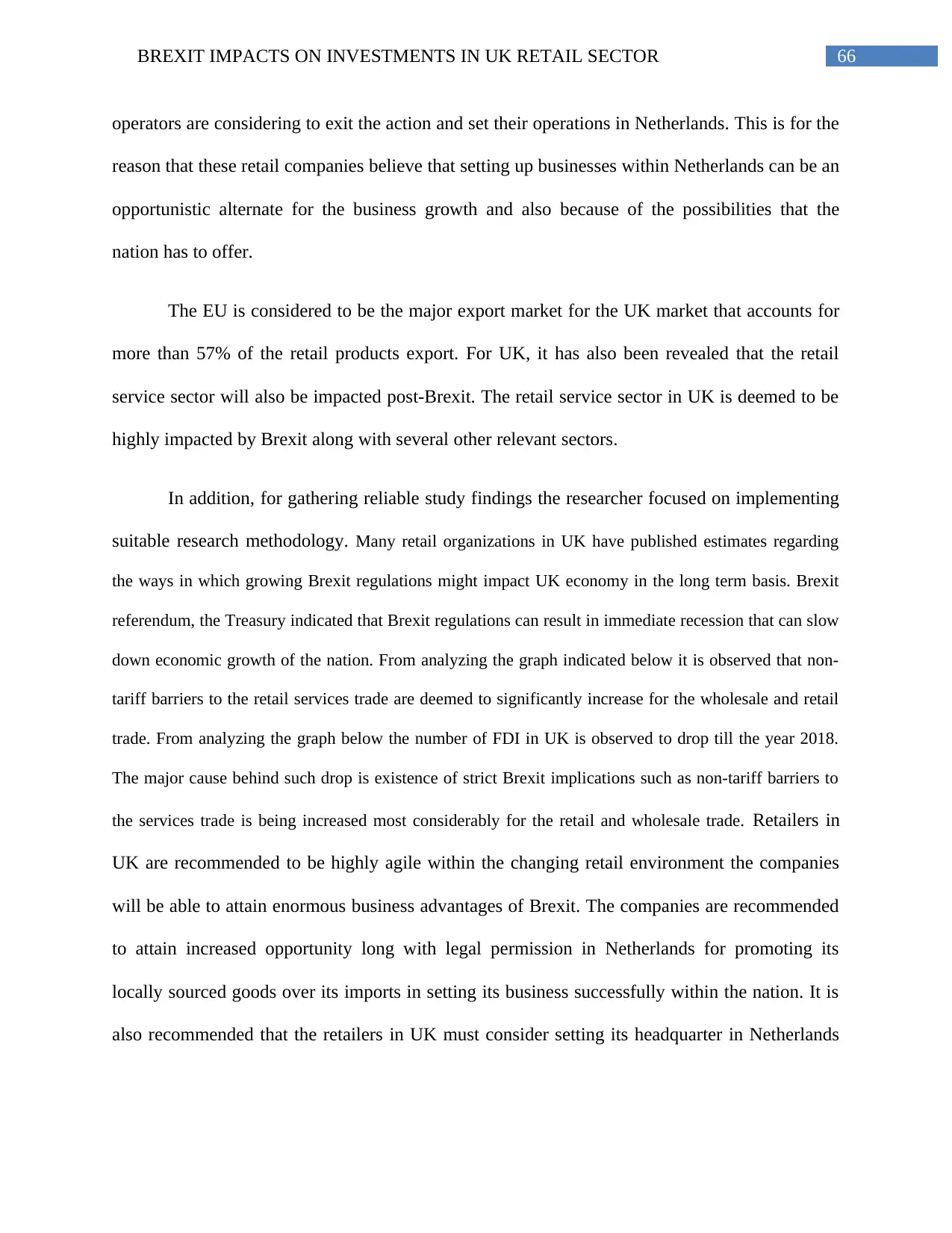
66BREXIT IMPACTS ON INVESTMENTS IN UK RETAIL SECTOR
operators are considering to exit the action and set their operations in Netherlands. This is for the
reason that these retail companies believe that setting up businesses within Netherlands can be an
opportunistic alternate for the business growth and also because of the possibilities that the
nation has to offer.
The EU is considered to be the major export market for the UK market that accounts for
more than 57% of the retail products export. For UK, it has also been revealed that the retail
service sector will also be impacted post-Brexit. The retail service sector in UK is deemed to be
highly impacted by Brexit along with several other relevant sectors.
In addition, for gathering reliable study findings the researcher focused on implementing
suitable research methodology. Many retail organizations in UK have published estimates regarding
the ways in which growing Brexit regulations might impact UK economy in the long term basis. Brexit
referendum, the Treasury indicated that Brexit regulations can result in immediate recession that can slow
down economic growth of the nation. From analyzing the graph indicated below it is observed that non-
tariff barriers to the retail services trade are deemed to significantly increase for the wholesale and retail
trade. From analyzing the graph below the number of FDI in UK is observed to drop till the year 2018.
The major cause behind such drop is existence of strict Brexit implications such as non-tariff barriers to
the services trade is being increased most considerably for the retail and wholesale trade. Retailers in
UK are recommended to be highly agile within the changing retail environment the companies
will be able to attain enormous business advantages of Brexit. The companies are recommended
to attain increased opportunity long with legal permission in Netherlands for promoting its
locally sourced goods over its imports in setting its business successfully within the nation. It is
also recommended that the retailers in UK must consider setting its headquarter in Netherlands
operators are considering to exit the action and set their operations in Netherlands. This is for the
reason that these retail companies believe that setting up businesses within Netherlands can be an
opportunistic alternate for the business growth and also because of the possibilities that the
nation has to offer.
The EU is considered to be the major export market for the UK market that accounts for
more than 57% of the retail products export. For UK, it has also been revealed that the retail
service sector will also be impacted post-Brexit. The retail service sector in UK is deemed to be
highly impacted by Brexit along with several other relevant sectors.
In addition, for gathering reliable study findings the researcher focused on implementing
suitable research methodology. Many retail organizations in UK have published estimates regarding
the ways in which growing Brexit regulations might impact UK economy in the long term basis. Brexit
referendum, the Treasury indicated that Brexit regulations can result in immediate recession that can slow
down economic growth of the nation. From analyzing the graph indicated below it is observed that non-
tariff barriers to the retail services trade are deemed to significantly increase for the wholesale and retail
trade. From analyzing the graph below the number of FDI in UK is observed to drop till the year 2018.
The major cause behind such drop is existence of strict Brexit implications such as non-tariff barriers to
the services trade is being increased most considerably for the retail and wholesale trade. Retailers in
UK are recommended to be highly agile within the changing retail environment the companies
will be able to attain enormous business advantages of Brexit. The companies are recommended
to attain increased opportunity long with legal permission in Netherlands for promoting its
locally sourced goods over its imports in setting its business successfully within the nation. It is
also recommended that the retailers in UK must consider setting its headquarter in Netherlands
Paraphrase This Document
Need a fresh take? Get an instant paraphrase of this document with our AI Paraphraser
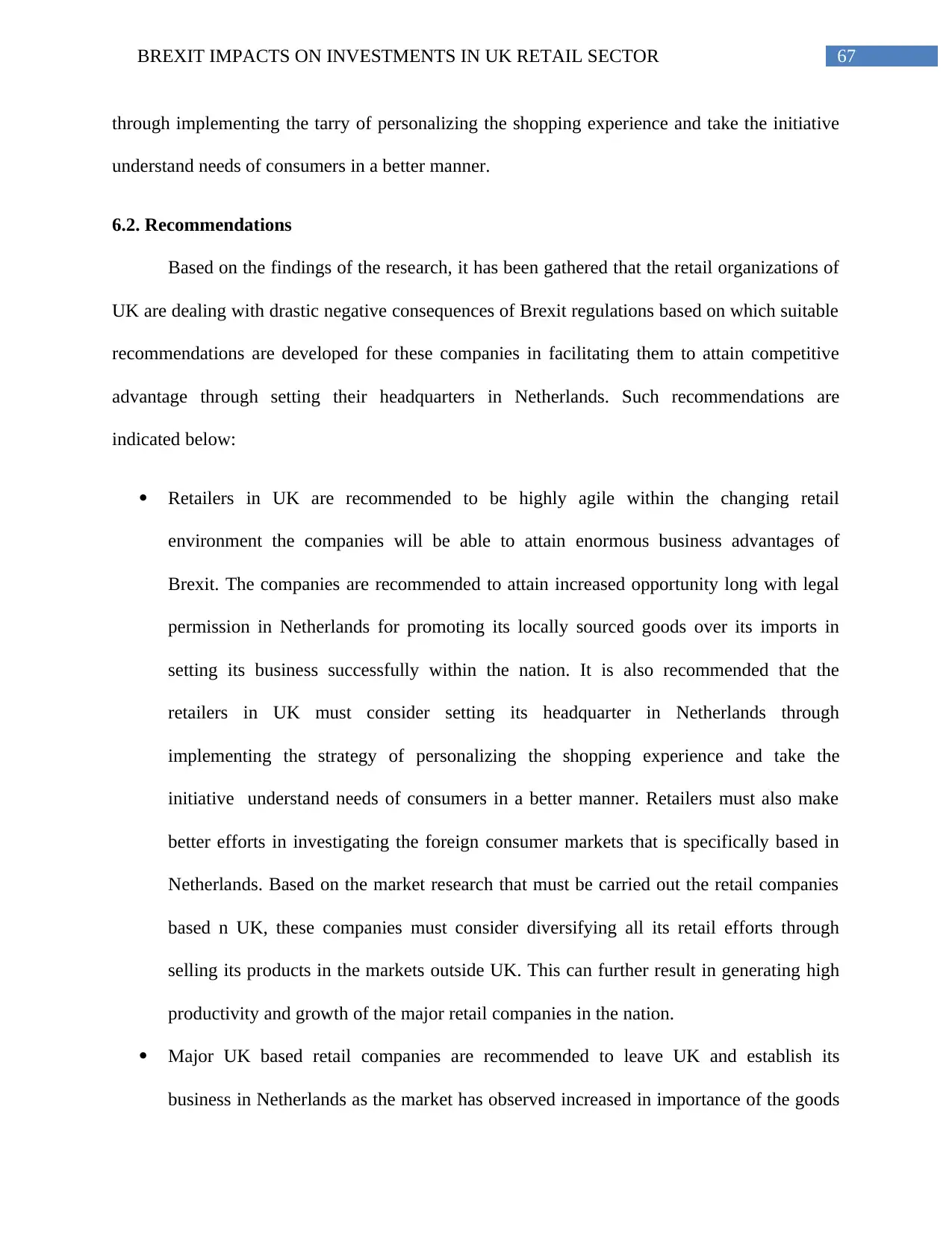
67BREXIT IMPACTS ON INVESTMENTS IN UK RETAIL SECTOR
through implementing the tarry of personalizing the shopping experience and take the initiative
understand needs of consumers in a better manner.
6.2. Recommendations
Based on the findings of the research, it has been gathered that the retail organizations of
UK are dealing with drastic negative consequences of Brexit regulations based on which suitable
recommendations are developed for these companies in facilitating them to attain competitive
advantage through setting their headquarters in Netherlands. Such recommendations are
indicated below:
Retailers in UK are recommended to be highly agile within the changing retail
environment the companies will be able to attain enormous business advantages of
Brexit. The companies are recommended to attain increased opportunity long with legal
permission in Netherlands for promoting its locally sourced goods over its imports in
setting its business successfully within the nation. It is also recommended that the
retailers in UK must consider setting its headquarter in Netherlands through
implementing the strategy of personalizing the shopping experience and take the
initiative understand needs of consumers in a better manner. Retailers must also make
better efforts in investigating the foreign consumer markets that is specifically based in
Netherlands. Based on the market research that must be carried out the retail companies
based n UK, these companies must consider diversifying all its retail efforts through
selling its products in the markets outside UK. This can further result in generating high
productivity and growth of the major retail companies in the nation.
Major UK based retail companies are recommended to leave UK and establish its
business in Netherlands as the market has observed increased in importance of the goods
through implementing the tarry of personalizing the shopping experience and take the initiative
understand needs of consumers in a better manner.
6.2. Recommendations
Based on the findings of the research, it has been gathered that the retail organizations of
UK are dealing with drastic negative consequences of Brexit regulations based on which suitable
recommendations are developed for these companies in facilitating them to attain competitive
advantage through setting their headquarters in Netherlands. Such recommendations are
indicated below:
Retailers in UK are recommended to be highly agile within the changing retail
environment the companies will be able to attain enormous business advantages of
Brexit. The companies are recommended to attain increased opportunity long with legal
permission in Netherlands for promoting its locally sourced goods over its imports in
setting its business successfully within the nation. It is also recommended that the
retailers in UK must consider setting its headquarter in Netherlands through
implementing the strategy of personalizing the shopping experience and take the
initiative understand needs of consumers in a better manner. Retailers must also make
better efforts in investigating the foreign consumer markets that is specifically based in
Netherlands. Based on the market research that must be carried out the retail companies
based n UK, these companies must consider diversifying all its retail efforts through
selling its products in the markets outside UK. This can further result in generating high
productivity and growth of the major retail companies in the nation.
Major UK based retail companies are recommended to leave UK and establish its
business in Netherlands as the market has observed increased in importance of the goods
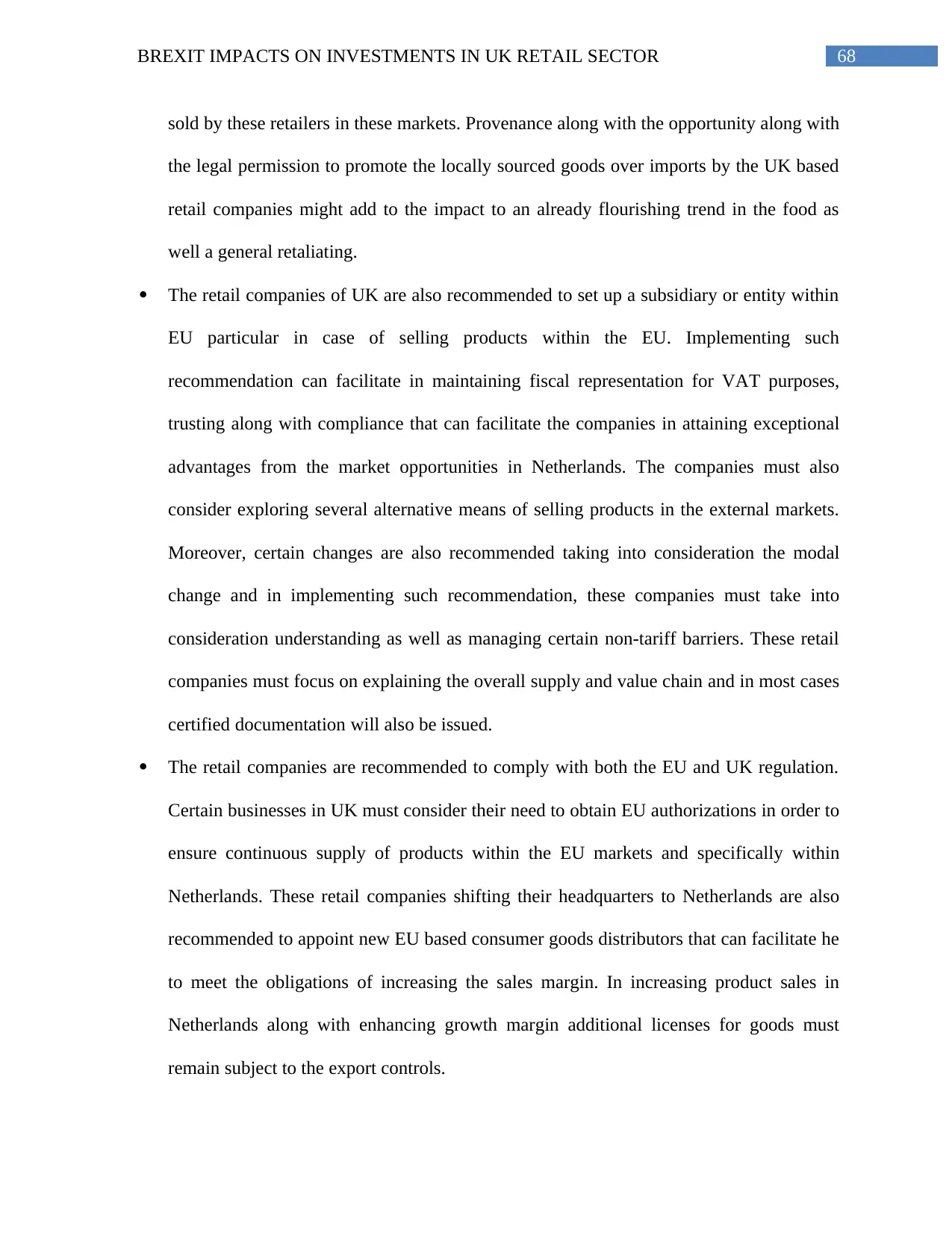
68BREXIT IMPACTS ON INVESTMENTS IN UK RETAIL SECTOR
sold by these retailers in these markets. Provenance along with the opportunity along with
the legal permission to promote the locally sourced goods over imports by the UK based
retail companies might add to the impact to an already flourishing trend in the food as
well a general retaliating.
The retail companies of UK are also recommended to set up a subsidiary or entity within
EU particular in case of selling products within the EU. Implementing such
recommendation can facilitate in maintaining fiscal representation for VAT purposes,
trusting along with compliance that can facilitate the companies in attaining exceptional
advantages from the market opportunities in Netherlands. The companies must also
consider exploring several alternative means of selling products in the external markets.
Moreover, certain changes are also recommended taking into consideration the modal
change and in implementing such recommendation, these companies must take into
consideration understanding as well as managing certain non-tariff barriers. These retail
companies must focus on explaining the overall supply and value chain and in most cases
certified documentation will also be issued.
The retail companies are recommended to comply with both the EU and UK regulation.
Certain businesses in UK must consider their need to obtain EU authorizations in order to
ensure continuous supply of products within the EU markets and specifically within
Netherlands. These retail companies shifting their headquarters to Netherlands are also
recommended to appoint new EU based consumer goods distributors that can facilitate he
to meet the obligations of increasing the sales margin. In increasing product sales in
Netherlands along with enhancing growth margin additional licenses for goods must
remain subject to the export controls.
sold by these retailers in these markets. Provenance along with the opportunity along with
the legal permission to promote the locally sourced goods over imports by the UK based
retail companies might add to the impact to an already flourishing trend in the food as
well a general retaliating.
The retail companies of UK are also recommended to set up a subsidiary or entity within
EU particular in case of selling products within the EU. Implementing such
recommendation can facilitate in maintaining fiscal representation for VAT purposes,
trusting along with compliance that can facilitate the companies in attaining exceptional
advantages from the market opportunities in Netherlands. The companies must also
consider exploring several alternative means of selling products in the external markets.
Moreover, certain changes are also recommended taking into consideration the modal
change and in implementing such recommendation, these companies must take into
consideration understanding as well as managing certain non-tariff barriers. These retail
companies must focus on explaining the overall supply and value chain and in most cases
certified documentation will also be issued.
The retail companies are recommended to comply with both the EU and UK regulation.
Certain businesses in UK must consider their need to obtain EU authorizations in order to
ensure continuous supply of products within the EU markets and specifically within
Netherlands. These retail companies shifting their headquarters to Netherlands are also
recommended to appoint new EU based consumer goods distributors that can facilitate he
to meet the obligations of increasing the sales margin. In increasing product sales in
Netherlands along with enhancing growth margin additional licenses for goods must
remain subject to the export controls.
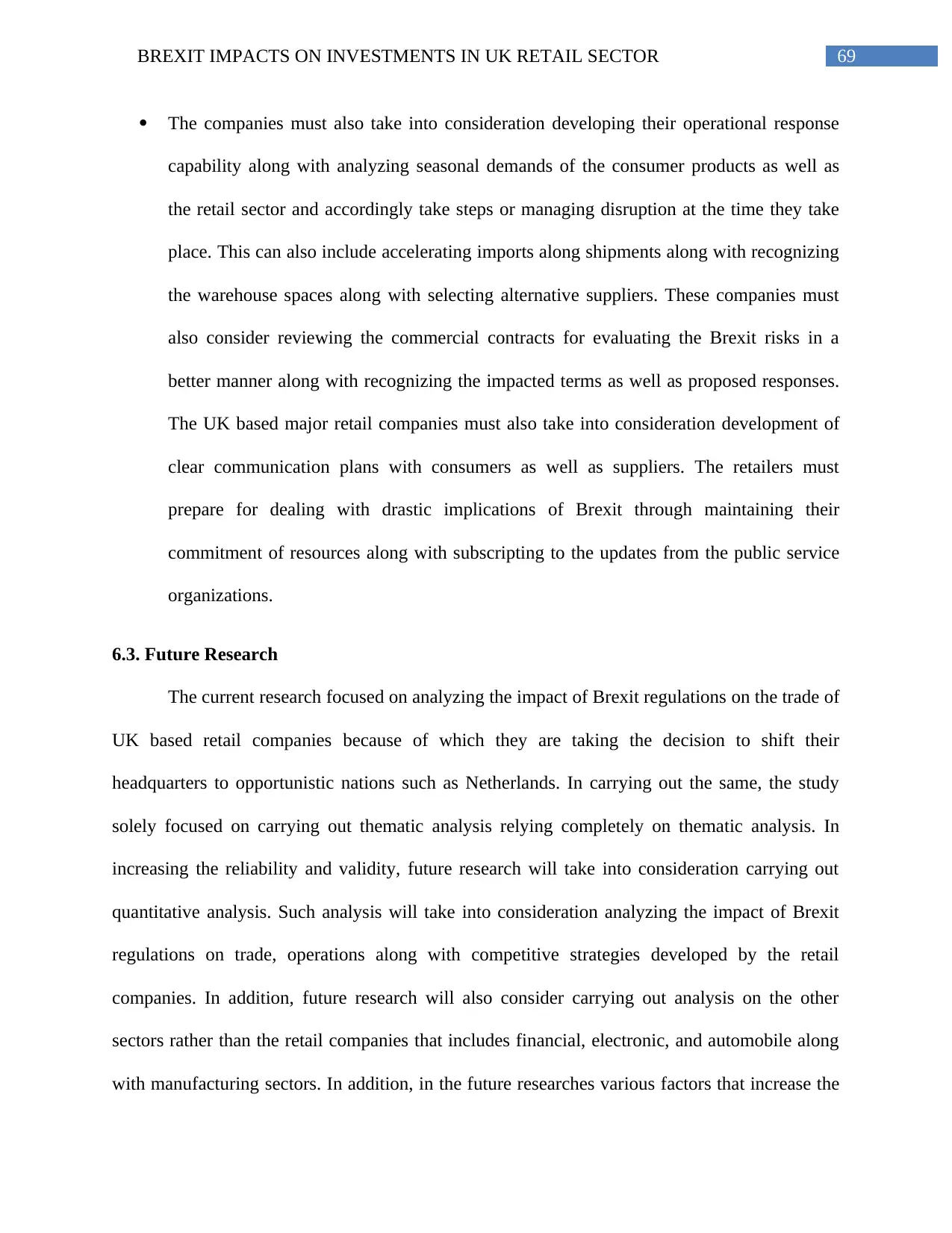
69BREXIT IMPACTS ON INVESTMENTS IN UK RETAIL SECTOR
The companies must also take into consideration developing their operational response
capability along with analyzing seasonal demands of the consumer products as well as
the retail sector and accordingly take steps or managing disruption at the time they take
place. This can also include accelerating imports along shipments along with recognizing
the warehouse spaces along with selecting alternative suppliers. These companies must
also consider reviewing the commercial contracts for evaluating the Brexit risks in a
better manner along with recognizing the impacted terms as well as proposed responses.
The UK based major retail companies must also take into consideration development of
clear communication plans with consumers as well as suppliers. The retailers must
prepare for dealing with drastic implications of Brexit through maintaining their
commitment of resources along with subscripting to the updates from the public service
organizations.
6.3. Future Research
The current research focused on analyzing the impact of Brexit regulations on the trade of
UK based retail companies because of which they are taking the decision to shift their
headquarters to opportunistic nations such as Netherlands. In carrying out the same, the study
solely focused on carrying out thematic analysis relying completely on thematic analysis. In
increasing the reliability and validity, future research will take into consideration carrying out
quantitative analysis. Such analysis will take into consideration analyzing the impact of Brexit
regulations on trade, operations along with competitive strategies developed by the retail
companies. In addition, future research will also consider carrying out analysis on the other
sectors rather than the retail companies that includes financial, electronic, and automobile along
with manufacturing sectors. In addition, in the future researches various factors that increase the
The companies must also take into consideration developing their operational response
capability along with analyzing seasonal demands of the consumer products as well as
the retail sector and accordingly take steps or managing disruption at the time they take
place. This can also include accelerating imports along shipments along with recognizing
the warehouse spaces along with selecting alternative suppliers. These companies must
also consider reviewing the commercial contracts for evaluating the Brexit risks in a
better manner along with recognizing the impacted terms as well as proposed responses.
The UK based major retail companies must also take into consideration development of
clear communication plans with consumers as well as suppliers. The retailers must
prepare for dealing with drastic implications of Brexit through maintaining their
commitment of resources along with subscripting to the updates from the public service
organizations.
6.3. Future Research
The current research focused on analyzing the impact of Brexit regulations on the trade of
UK based retail companies because of which they are taking the decision to shift their
headquarters to opportunistic nations such as Netherlands. In carrying out the same, the study
solely focused on carrying out thematic analysis relying completely on thematic analysis. In
increasing the reliability and validity, future research will take into consideration carrying out
quantitative analysis. Such analysis will take into consideration analyzing the impact of Brexit
regulations on trade, operations along with competitive strategies developed by the retail
companies. In addition, future research will also consider carrying out analysis on the other
sectors rather than the retail companies that includes financial, electronic, and automobile along
with manufacturing sectors. In addition, in the future researches various factors that increase the
Secure Best Marks with AI Grader
Need help grading? Try our AI Grader for instant feedback on your assignments.

70BREXIT IMPACTS ON INVESTMENTS IN UK RETAIL SECTOR
adverse impact of Brexit on the UK based retail companies will be analyzed through carrying out
quantitative analysis through employing suitable statistical analytical tools.
adverse impact of Brexit on the UK based retail companies will be analyzed through carrying out
quantitative analysis through employing suitable statistical analytical tools.
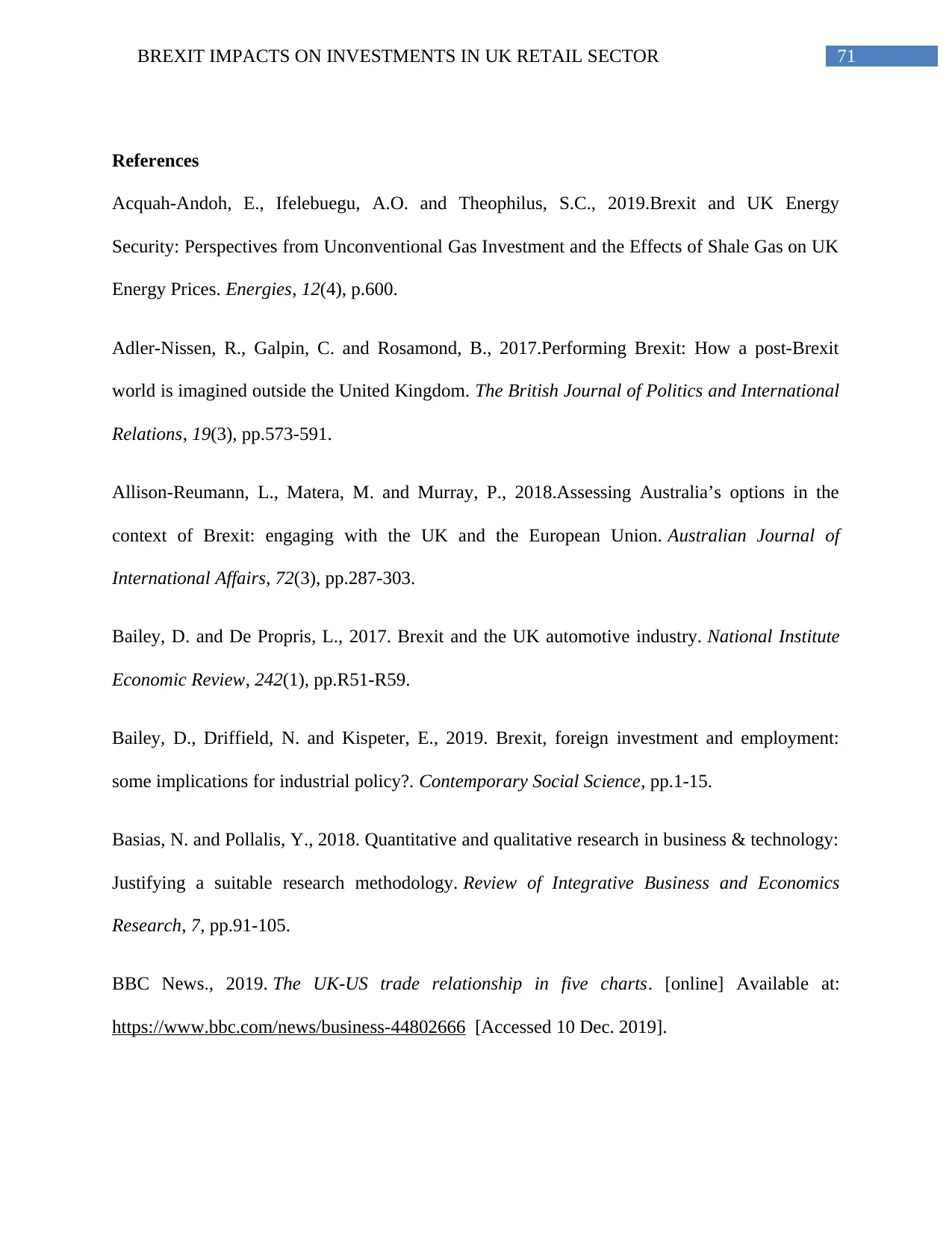
71BREXIT IMPACTS ON INVESTMENTS IN UK RETAIL SECTOR
References
Acquah-Andoh, E., Ifelebuegu, A.O. and Theophilus, S.C., 2019.Brexit and UK Energy
Security: Perspectives from Unconventional Gas Investment and the Effects of Shale Gas on UK
Energy Prices. Energies, 12(4), p.600.
Adler-Nissen, R., Galpin, C. and Rosamond, B., 2017.Performing Brexit: How a post-Brexit
world is imagined outside the United Kingdom. The British Journal of Politics and International
Relations, 19(3), pp.573-591.
Allison-Reumann, L., Matera, M. and Murray, P., 2018.Assessing Australia’s options in the
context of Brexit: engaging with the UK and the European Union. Australian Journal of
International Affairs, 72(3), pp.287-303.
Bailey, D. and De Propris, L., 2017. Brexit and the UK automotive industry. National Institute
Economic Review, 242(1), pp.R51-R59.
Bailey, D., Driffield, N. and Kispeter, E., 2019. Brexit, foreign investment and employment:
some implications for industrial policy?. Contemporary Social Science, pp.1-15.
Basias, N. and Pollalis, Y., 2018. Quantitative and qualitative research in business & technology:
Justifying a suitable research methodology. Review of Integrative Business and Economics
Research, 7, pp.91-105.
BBC News., 2019. The UK-US trade relationship in five charts. [online] Available at:
https://www.bbc.com/news/business-44802666 [Accessed 10 Dec. 2019].
References
Acquah-Andoh, E., Ifelebuegu, A.O. and Theophilus, S.C., 2019.Brexit and UK Energy
Security: Perspectives from Unconventional Gas Investment and the Effects of Shale Gas on UK
Energy Prices. Energies, 12(4), p.600.
Adler-Nissen, R., Galpin, C. and Rosamond, B., 2017.Performing Brexit: How a post-Brexit
world is imagined outside the United Kingdom. The British Journal of Politics and International
Relations, 19(3), pp.573-591.
Allison-Reumann, L., Matera, M. and Murray, P., 2018.Assessing Australia’s options in the
context of Brexit: engaging with the UK and the European Union. Australian Journal of
International Affairs, 72(3), pp.287-303.
Bailey, D. and De Propris, L., 2017. Brexit and the UK automotive industry. National Institute
Economic Review, 242(1), pp.R51-R59.
Bailey, D., Driffield, N. and Kispeter, E., 2019. Brexit, foreign investment and employment:
some implications for industrial policy?. Contemporary Social Science, pp.1-15.
Basias, N. and Pollalis, Y., 2018. Quantitative and qualitative research in business & technology:
Justifying a suitable research methodology. Review of Integrative Business and Economics
Research, 7, pp.91-105.
BBC News., 2019. The UK-US trade relationship in five charts. [online] Available at:
https://www.bbc.com/news/business-44802666 [Accessed 10 Dec. 2019].
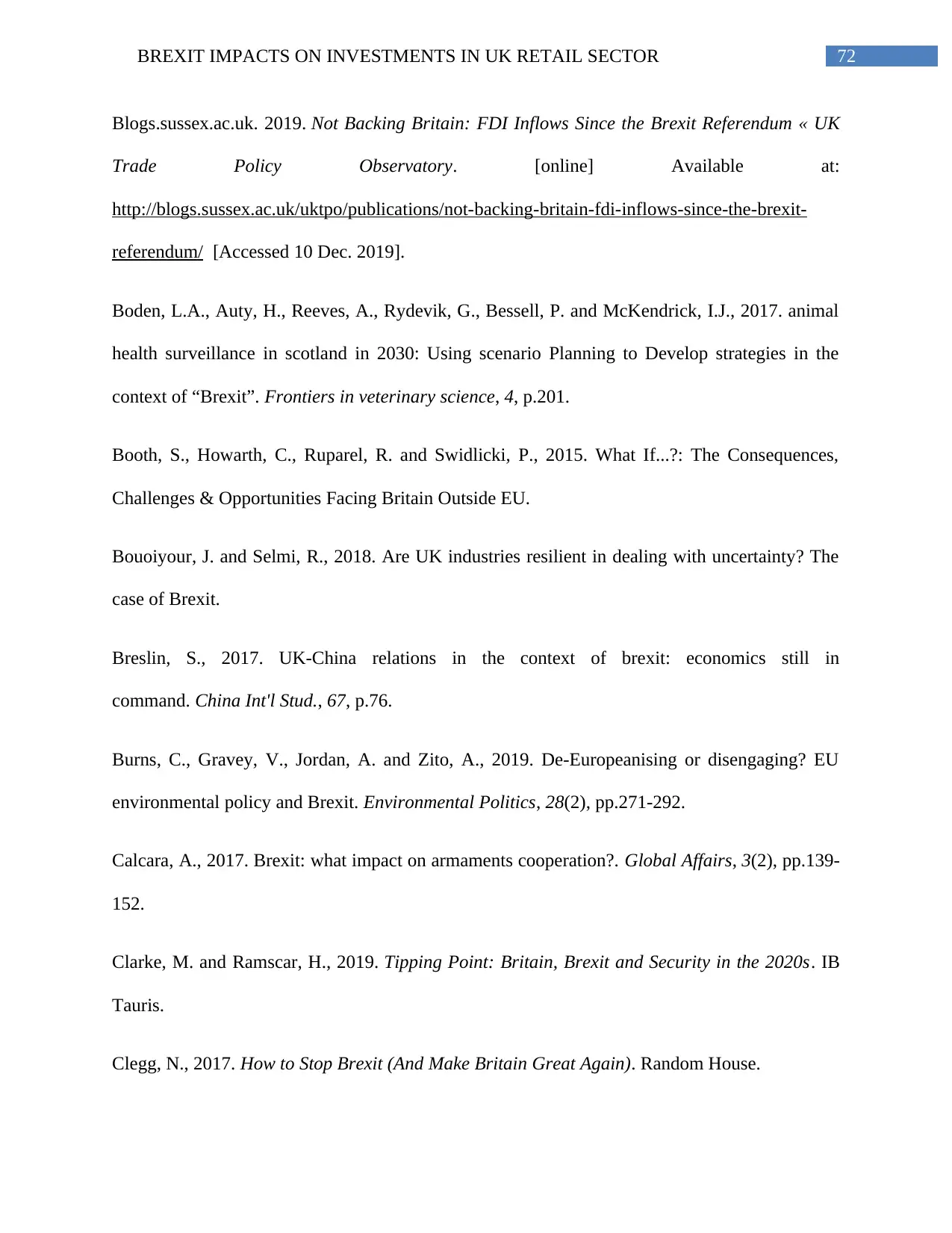
72BREXIT IMPACTS ON INVESTMENTS IN UK RETAIL SECTOR
Blogs.sussex.ac.uk. 2019. Not Backing Britain: FDI Inflows Since the Brexit Referendum « UK
Trade Policy Observatory. [online] Available at:
http://blogs.sussex.ac.uk/uktpo/publications/not-backing-britain-fdi-inflows-since-the-brexit-
referendum/ [Accessed 10 Dec. 2019].
Boden, L.A., Auty, H., Reeves, A., Rydevik, G., Bessell, P. and McKendrick, I.J., 2017. animal
health surveillance in scotland in 2030: Using scenario Planning to Develop strategies in the
context of “Brexit”. Frontiers in veterinary science, 4, p.201.
Booth, S., Howarth, C., Ruparel, R. and Swidlicki, P., 2015. What If...?: The Consequences,
Challenges & Opportunities Facing Britain Outside EU.
Bouoiyour, J. and Selmi, R., 2018. Are UK industries resilient in dealing with uncertainty? The
case of Brexit.
Breslin, S., 2017. UK-China relations in the context of brexit: economics still in
command. China Int'l Stud., 67, p.76.
Burns, C., Gravey, V., Jordan, A. and Zito, A., 2019. De-Europeanising or disengaging? EU
environmental policy and Brexit. Environmental Politics, 28(2), pp.271-292.
Calcara, A., 2017. Brexit: what impact on armaments cooperation?. Global Affairs, 3(2), pp.139-
152.
Clarke, M. and Ramscar, H., 2019. Tipping Point: Britain, Brexit and Security in the 2020s. IB
Tauris.
Clegg, N., 2017. How to Stop Brexit (And Make Britain Great Again). Random House.
Blogs.sussex.ac.uk. 2019. Not Backing Britain: FDI Inflows Since the Brexit Referendum « UK
Trade Policy Observatory. [online] Available at:
http://blogs.sussex.ac.uk/uktpo/publications/not-backing-britain-fdi-inflows-since-the-brexit-
referendum/ [Accessed 10 Dec. 2019].
Boden, L.A., Auty, H., Reeves, A., Rydevik, G., Bessell, P. and McKendrick, I.J., 2017. animal
health surveillance in scotland in 2030: Using scenario Planning to Develop strategies in the
context of “Brexit”. Frontiers in veterinary science, 4, p.201.
Booth, S., Howarth, C., Ruparel, R. and Swidlicki, P., 2015. What If...?: The Consequences,
Challenges & Opportunities Facing Britain Outside EU.
Bouoiyour, J. and Selmi, R., 2018. Are UK industries resilient in dealing with uncertainty? The
case of Brexit.
Breslin, S., 2017. UK-China relations in the context of brexit: economics still in
command. China Int'l Stud., 67, p.76.
Burns, C., Gravey, V., Jordan, A. and Zito, A., 2019. De-Europeanising or disengaging? EU
environmental policy and Brexit. Environmental Politics, 28(2), pp.271-292.
Calcara, A., 2017. Brexit: what impact on armaments cooperation?. Global Affairs, 3(2), pp.139-
152.
Clarke, M. and Ramscar, H., 2019. Tipping Point: Britain, Brexit and Security in the 2020s. IB
Tauris.
Clegg, N., 2017. How to Stop Brexit (And Make Britain Great Again). Random House.
Paraphrase This Document
Need a fresh take? Get an instant paraphrase of this document with our AI Paraphraser
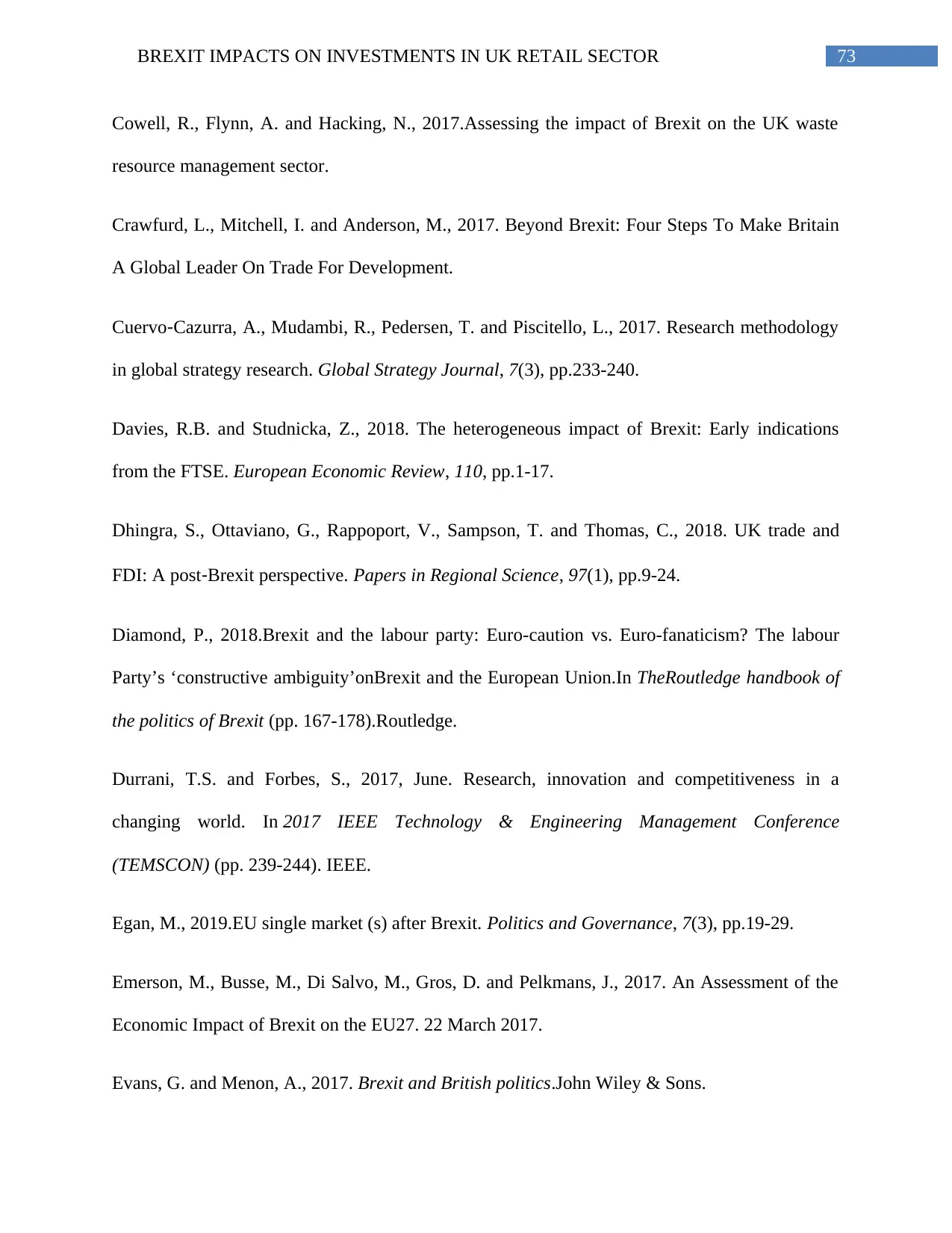
73BREXIT IMPACTS ON INVESTMENTS IN UK RETAIL SECTOR
Cowell, R., Flynn, A. and Hacking, N., 2017.Assessing the impact of Brexit on the UK waste
resource management sector.
Crawfurd, L., Mitchell, I. and Anderson, M., 2017. Beyond Brexit: Four Steps To Make Britain
A Global Leader On Trade For Development.
Cuervo‐Cazurra, A., Mudambi, R., Pedersen, T. and Piscitello, L., 2017. Research methodology
in global strategy research. Global Strategy Journal, 7(3), pp.233-240.
Davies, R.B. and Studnicka, Z., 2018. The heterogeneous impact of Brexit: Early indications
from the FTSE. European Economic Review, 110, pp.1-17.
Dhingra, S., Ottaviano, G., Rappoport, V., Sampson, T. and Thomas, C., 2018. UK trade and
FDI: A post‐Brexit perspective. Papers in Regional Science, 97(1), pp.9-24.
Diamond, P., 2018.Brexit and the labour party: Euro-caution vs. Euro-fanaticism? The labour
Party’s ‘constructive ambiguity’onBrexit and the European Union.In TheRoutledge handbook of
the politics of Brexit (pp. 167-178).Routledge.
Durrani, T.S. and Forbes, S., 2017, June. Research, innovation and competitiveness in a
changing world. In 2017 IEEE Technology & Engineering Management Conference
(TEMSCON) (pp. 239-244). IEEE.
Egan, M., 2019.EU single market (s) after Brexit. Politics and Governance, 7(3), pp.19-29.
Emerson, M., Busse, M., Di Salvo, M., Gros, D. and Pelkmans, J., 2017. An Assessment of the
Economic Impact of Brexit on the EU27. 22 March 2017.
Evans, G. and Menon, A., 2017. Brexit and British politics.John Wiley & Sons.
Cowell, R., Flynn, A. and Hacking, N., 2017.Assessing the impact of Brexit on the UK waste
resource management sector.
Crawfurd, L., Mitchell, I. and Anderson, M., 2017. Beyond Brexit: Four Steps To Make Britain
A Global Leader On Trade For Development.
Cuervo‐Cazurra, A., Mudambi, R., Pedersen, T. and Piscitello, L., 2017. Research methodology
in global strategy research. Global Strategy Journal, 7(3), pp.233-240.
Davies, R.B. and Studnicka, Z., 2018. The heterogeneous impact of Brexit: Early indications
from the FTSE. European Economic Review, 110, pp.1-17.
Dhingra, S., Ottaviano, G., Rappoport, V., Sampson, T. and Thomas, C., 2018. UK trade and
FDI: A post‐Brexit perspective. Papers in Regional Science, 97(1), pp.9-24.
Diamond, P., 2018.Brexit and the labour party: Euro-caution vs. Euro-fanaticism? The labour
Party’s ‘constructive ambiguity’onBrexit and the European Union.In TheRoutledge handbook of
the politics of Brexit (pp. 167-178).Routledge.
Durrani, T.S. and Forbes, S., 2017, June. Research, innovation and competitiveness in a
changing world. In 2017 IEEE Technology & Engineering Management Conference
(TEMSCON) (pp. 239-244). IEEE.
Egan, M., 2019.EU single market (s) after Brexit. Politics and Governance, 7(3), pp.19-29.
Emerson, M., Busse, M., Di Salvo, M., Gros, D. and Pelkmans, J., 2017. An Assessment of the
Economic Impact of Brexit on the EU27. 22 March 2017.
Evans, G. and Menon, A., 2017. Brexit and British politics.John Wiley & Sons.
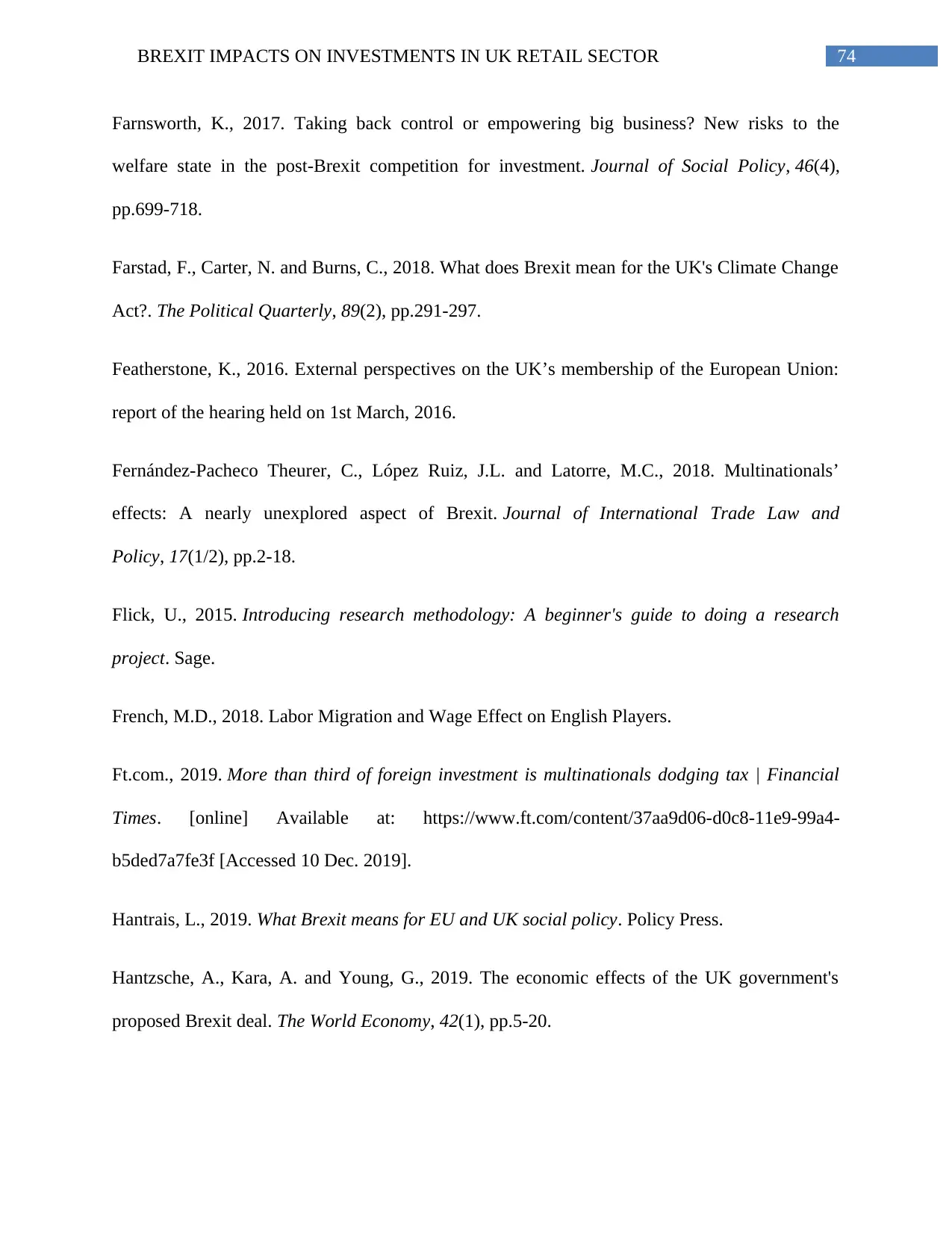
74BREXIT IMPACTS ON INVESTMENTS IN UK RETAIL SECTOR
Farnsworth, K., 2017. Taking back control or empowering big business? New risks to the
welfare state in the post-Brexit competition for investment. Journal of Social Policy, 46(4),
pp.699-718.
Farstad, F., Carter, N. and Burns, C., 2018. What does Brexit mean for the UK's Climate Change
Act?. The Political Quarterly, 89(2), pp.291-297.
Featherstone, K., 2016. External perspectives on the UK’s membership of the European Union:
report of the hearing held on 1st March, 2016.
Fernández-Pacheco Theurer, C., López Ruiz, J.L. and Latorre, M.C., 2018. Multinationals’
effects: A nearly unexplored aspect of Brexit. Journal of International Trade Law and
Policy, 17(1/2), pp.2-18.
Flick, U., 2015. Introducing research methodology: A beginner's guide to doing a research
project. Sage.
French, M.D., 2018. Labor Migration and Wage Effect on English Players.
Ft.com., 2019. More than third of foreign investment is multinationals dodging tax | Financial
Times. [online] Available at: https://www.ft.com/content/37aa9d06-d0c8-11e9-99a4-
b5ded7a7fe3f [Accessed 10 Dec. 2019].
Hantrais, L., 2019. What Brexit means for EU and UK social policy. Policy Press.
Hantzsche, A., Kara, A. and Young, G., 2019. The economic effects of the UK government's
proposed Brexit deal. The World Economy, 42(1), pp.5-20.
Farnsworth, K., 2017. Taking back control or empowering big business? New risks to the
welfare state in the post-Brexit competition for investment. Journal of Social Policy, 46(4),
pp.699-718.
Farstad, F., Carter, N. and Burns, C., 2018. What does Brexit mean for the UK's Climate Change
Act?. The Political Quarterly, 89(2), pp.291-297.
Featherstone, K., 2016. External perspectives on the UK’s membership of the European Union:
report of the hearing held on 1st March, 2016.
Fernández-Pacheco Theurer, C., López Ruiz, J.L. and Latorre, M.C., 2018. Multinationals’
effects: A nearly unexplored aspect of Brexit. Journal of International Trade Law and
Policy, 17(1/2), pp.2-18.
Flick, U., 2015. Introducing research methodology: A beginner's guide to doing a research
project. Sage.
French, M.D., 2018. Labor Migration and Wage Effect on English Players.
Ft.com., 2019. More than third of foreign investment is multinationals dodging tax | Financial
Times. [online] Available at: https://www.ft.com/content/37aa9d06-d0c8-11e9-99a4-
b5ded7a7fe3f [Accessed 10 Dec. 2019].
Hantrais, L., 2019. What Brexit means for EU and UK social policy. Policy Press.
Hantzsche, A., Kara, A. and Young, G., 2019. The economic effects of the UK government's
proposed Brexit deal. The World Economy, 42(1), pp.5-20.
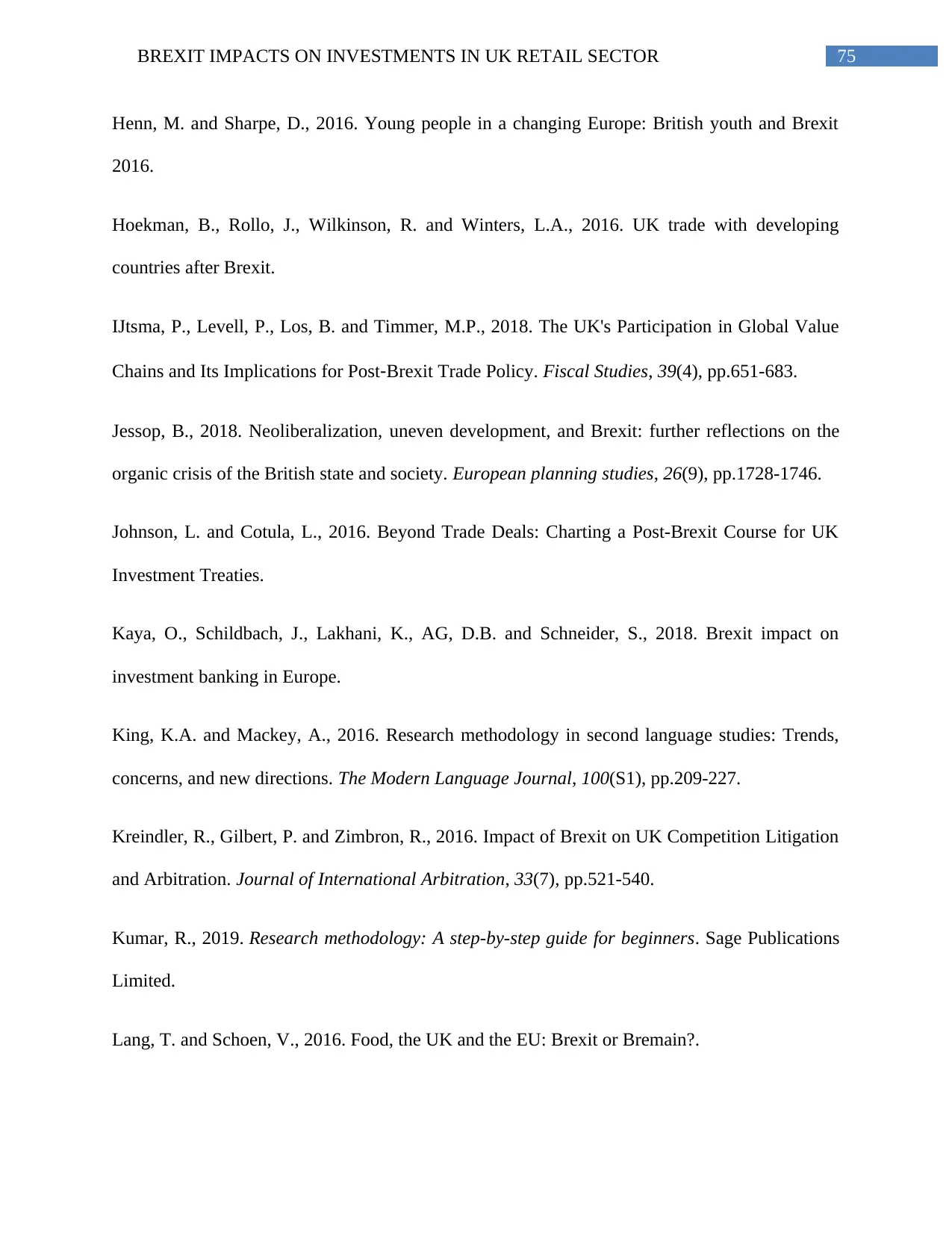
75BREXIT IMPACTS ON INVESTMENTS IN UK RETAIL SECTOR
Henn, M. and Sharpe, D., 2016. Young people in a changing Europe: British youth and Brexit
2016.
Hoekman, B., Rollo, J., Wilkinson, R. and Winters, L.A., 2016. UK trade with developing
countries after Brexit.
IJtsma, P., Levell, P., Los, B. and Timmer, M.P., 2018. The UK's Participation in Global Value
Chains and Its Implications for Post‐Brexit Trade Policy. Fiscal Studies, 39(4), pp.651-683.
Jessop, B., 2018. Neoliberalization, uneven development, and Brexit: further reflections on the
organic crisis of the British state and society. European planning studies, 26(9), pp.1728-1746.
Johnson, L. and Cotula, L., 2016. Beyond Trade Deals: Charting a Post-Brexit Course for UK
Investment Treaties.
Kaya, O., Schildbach, J., Lakhani, K., AG, D.B. and Schneider, S., 2018. Brexit impact on
investment banking in Europe.
King, K.A. and Mackey, A., 2016. Research methodology in second language studies: Trends,
concerns, and new directions. The Modern Language Journal, 100(S1), pp.209-227.
Kreindler, R., Gilbert, P. and Zimbron, R., 2016. Impact of Brexit on UK Competition Litigation
and Arbitration. Journal of International Arbitration, 33(7), pp.521-540.
Kumar, R., 2019. Research methodology: A step-by-step guide for beginners. Sage Publications
Limited.
Lang, T. and Schoen, V., 2016. Food, the UK and the EU: Brexit or Bremain?.
Henn, M. and Sharpe, D., 2016. Young people in a changing Europe: British youth and Brexit
2016.
Hoekman, B., Rollo, J., Wilkinson, R. and Winters, L.A., 2016. UK trade with developing
countries after Brexit.
IJtsma, P., Levell, P., Los, B. and Timmer, M.P., 2018. The UK's Participation in Global Value
Chains and Its Implications for Post‐Brexit Trade Policy. Fiscal Studies, 39(4), pp.651-683.
Jessop, B., 2018. Neoliberalization, uneven development, and Brexit: further reflections on the
organic crisis of the British state and society. European planning studies, 26(9), pp.1728-1746.
Johnson, L. and Cotula, L., 2016. Beyond Trade Deals: Charting a Post-Brexit Course for UK
Investment Treaties.
Kaya, O., Schildbach, J., Lakhani, K., AG, D.B. and Schneider, S., 2018. Brexit impact on
investment banking in Europe.
King, K.A. and Mackey, A., 2016. Research methodology in second language studies: Trends,
concerns, and new directions. The Modern Language Journal, 100(S1), pp.209-227.
Kreindler, R., Gilbert, P. and Zimbron, R., 2016. Impact of Brexit on UK Competition Litigation
and Arbitration. Journal of International Arbitration, 33(7), pp.521-540.
Kumar, R., 2019. Research methodology: A step-by-step guide for beginners. Sage Publications
Limited.
Lang, T. and Schoen, V., 2016. Food, the UK and the EU: Brexit or Bremain?.
Secure Best Marks with AI Grader
Need help grading? Try our AI Grader for instant feedback on your assignments.
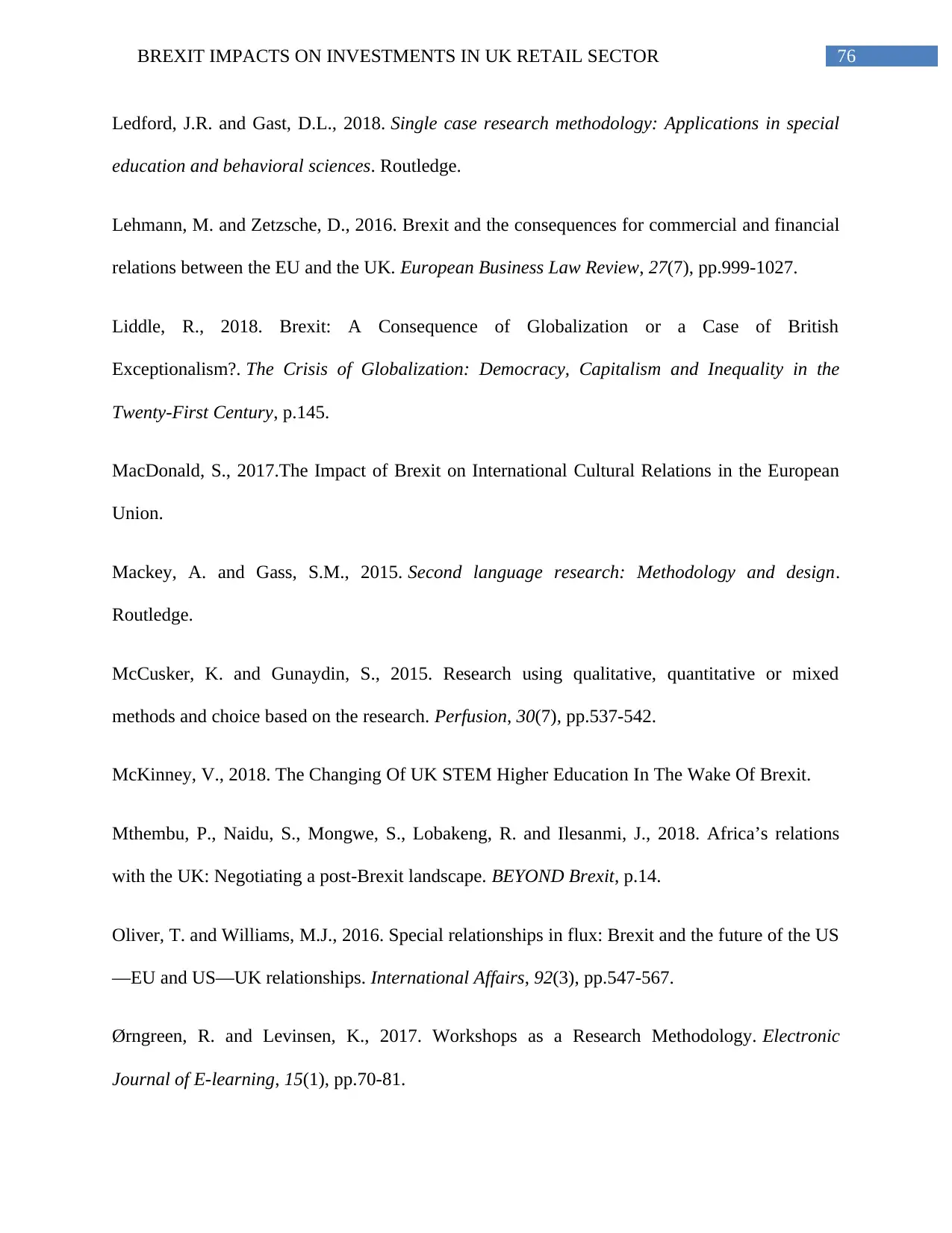
76BREXIT IMPACTS ON INVESTMENTS IN UK RETAIL SECTOR
Ledford, J.R. and Gast, D.L., 2018. Single case research methodology: Applications in special
education and behavioral sciences. Routledge.
Lehmann, M. and Zetzsche, D., 2016. Brexit and the consequences for commercial and financial
relations between the EU and the UK. European Business Law Review, 27(7), pp.999-1027.
Liddle, R., 2018. Brexit: A Consequence of Globalization or a Case of British
Exceptionalism?. The Crisis of Globalization: Democracy, Capitalism and Inequality in the
Twenty-First Century, p.145.
MacDonald, S., 2017.The Impact of Brexit on International Cultural Relations in the European
Union.
Mackey, A. and Gass, S.M., 2015. Second language research: Methodology and design.
Routledge.
McCusker, K. and Gunaydin, S., 2015. Research using qualitative, quantitative or mixed
methods and choice based on the research. Perfusion, 30(7), pp.537-542.
McKinney, V., 2018. The Changing Of UK STEM Higher Education In The Wake Of Brexit.
Mthembu, P., Naidu, S., Mongwe, S., Lobakeng, R. and Ilesanmi, J., 2018. Africa’s relations
with the UK: Negotiating a post-Brexit landscape. BEYOND Brexit, p.14.
Oliver, T. and Williams, M.J., 2016. Special relationships in flux: Brexit and the future of the US
—EU and US—UK relationships. International Affairs, 92(3), pp.547-567.
Ørngreen, R. and Levinsen, K., 2017. Workshops as a Research Methodology. Electronic
Journal of E-learning, 15(1), pp.70-81.
Ledford, J.R. and Gast, D.L., 2018. Single case research methodology: Applications in special
education and behavioral sciences. Routledge.
Lehmann, M. and Zetzsche, D., 2016. Brexit and the consequences for commercial and financial
relations between the EU and the UK. European Business Law Review, 27(7), pp.999-1027.
Liddle, R., 2018. Brexit: A Consequence of Globalization or a Case of British
Exceptionalism?. The Crisis of Globalization: Democracy, Capitalism and Inequality in the
Twenty-First Century, p.145.
MacDonald, S., 2017.The Impact of Brexit on International Cultural Relations in the European
Union.
Mackey, A. and Gass, S.M., 2015. Second language research: Methodology and design.
Routledge.
McCusker, K. and Gunaydin, S., 2015. Research using qualitative, quantitative or mixed
methods and choice based on the research. Perfusion, 30(7), pp.537-542.
McKinney, V., 2018. The Changing Of UK STEM Higher Education In The Wake Of Brexit.
Mthembu, P., Naidu, S., Mongwe, S., Lobakeng, R. and Ilesanmi, J., 2018. Africa’s relations
with the UK: Negotiating a post-Brexit landscape. BEYOND Brexit, p.14.
Oliver, T. and Williams, M.J., 2016. Special relationships in flux: Brexit and the future of the US
—EU and US—UK relationships. International Affairs, 92(3), pp.547-567.
Ørngreen, R. and Levinsen, K., 2017. Workshops as a Research Methodology. Electronic
Journal of E-learning, 15(1), pp.70-81.
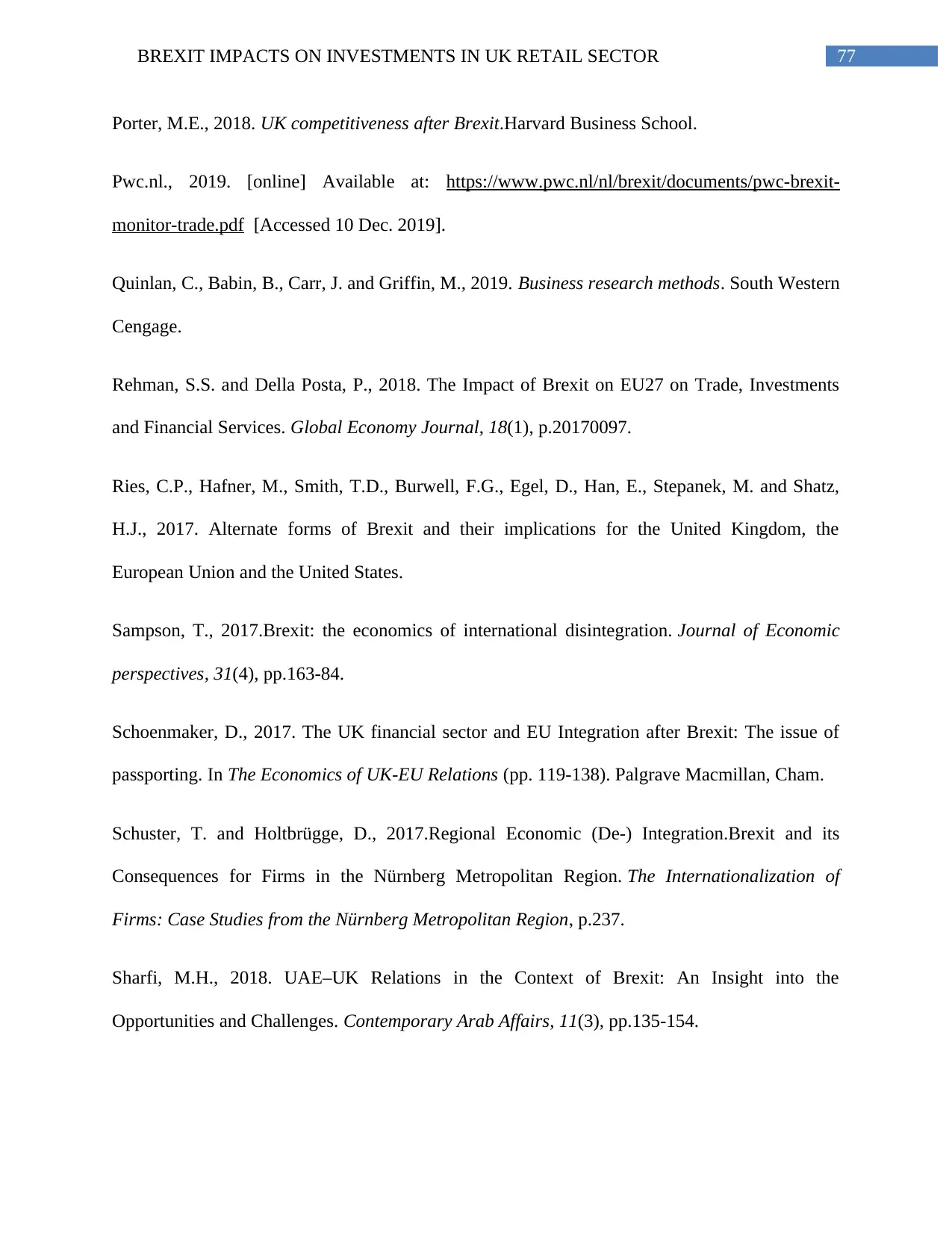
77BREXIT IMPACTS ON INVESTMENTS IN UK RETAIL SECTOR
Porter, M.E., 2018. UK competitiveness after Brexit.Harvard Business School.
Pwc.nl., 2019. [online] Available at: https://www.pwc.nl/nl/brexit/documents/pwc-brexit-
monitor-trade.pdf [Accessed 10 Dec. 2019].
Quinlan, C., Babin, B., Carr, J. and Griffin, M., 2019. Business research methods. South Western
Cengage.
Rehman, S.S. and Della Posta, P., 2018. The Impact of Brexit on EU27 on Trade, Investments
and Financial Services. Global Economy Journal, 18(1), p.20170097.
Ries, C.P., Hafner, M., Smith, T.D., Burwell, F.G., Egel, D., Han, E., Stepanek, M. and Shatz,
H.J., 2017. Alternate forms of Brexit and their implications for the United Kingdom, the
European Union and the United States.
Sampson, T., 2017.Brexit: the economics of international disintegration. Journal of Economic
perspectives, 31(4), pp.163-84.
Schoenmaker, D., 2017. The UK financial sector and EU Integration after Brexit: The issue of
passporting. In The Economics of UK-EU Relations (pp. 119-138). Palgrave Macmillan, Cham.
Schuster, T. and Holtbrügge, D., 2017.Regional Economic (De-) Integration.Brexit and its
Consequences for Firms in the Nürnberg Metropolitan Region. The Internationalization of
Firms: Case Studies from the Nürnberg Metropolitan Region, p.237.
Sharfi, M.H., 2018. UAE–UK Relations in the Context of Brexit: An Insight into the
Opportunities and Challenges. Contemporary Arab Affairs, 11(3), pp.135-154.
Porter, M.E., 2018. UK competitiveness after Brexit.Harvard Business School.
Pwc.nl., 2019. [online] Available at: https://www.pwc.nl/nl/brexit/documents/pwc-brexit-
monitor-trade.pdf [Accessed 10 Dec. 2019].
Quinlan, C., Babin, B., Carr, J. and Griffin, M., 2019. Business research methods. South Western
Cengage.
Rehman, S.S. and Della Posta, P., 2018. The Impact of Brexit on EU27 on Trade, Investments
and Financial Services. Global Economy Journal, 18(1), p.20170097.
Ries, C.P., Hafner, M., Smith, T.D., Burwell, F.G., Egel, D., Han, E., Stepanek, M. and Shatz,
H.J., 2017. Alternate forms of Brexit and their implications for the United Kingdom, the
European Union and the United States.
Sampson, T., 2017.Brexit: the economics of international disintegration. Journal of Economic
perspectives, 31(4), pp.163-84.
Schoenmaker, D., 2017. The UK financial sector and EU Integration after Brexit: The issue of
passporting. In The Economics of UK-EU Relations (pp. 119-138). Palgrave Macmillan, Cham.
Schuster, T. and Holtbrügge, D., 2017.Regional Economic (De-) Integration.Brexit and its
Consequences for Firms in the Nürnberg Metropolitan Region. The Internationalization of
Firms: Case Studies from the Nürnberg Metropolitan Region, p.237.
Sharfi, M.H., 2018. UAE–UK Relations in the Context of Brexit: An Insight into the
Opportunities and Challenges. Contemporary Arab Affairs, 11(3), pp.135-154.
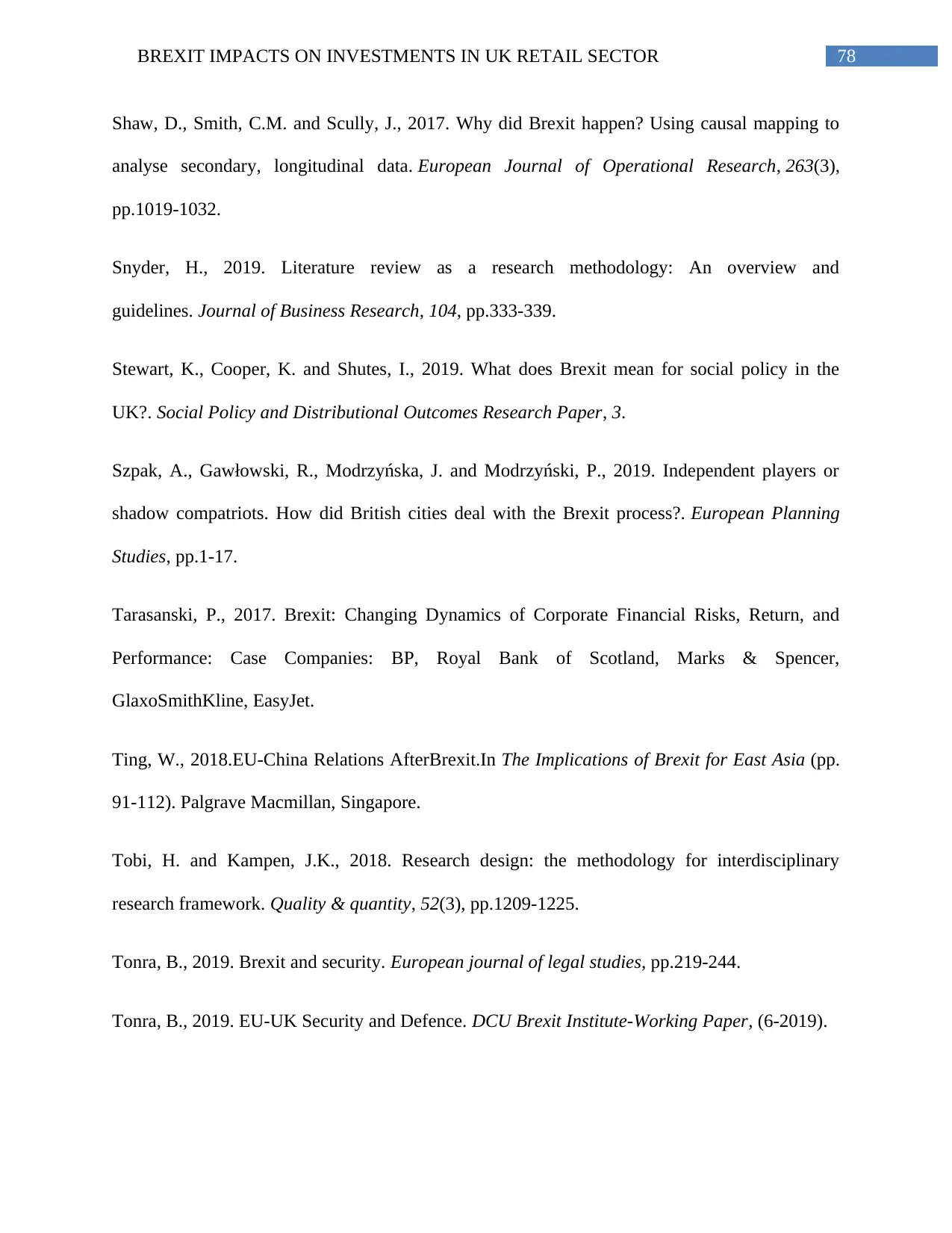
78BREXIT IMPACTS ON INVESTMENTS IN UK RETAIL SECTOR
Shaw, D., Smith, C.M. and Scully, J., 2017. Why did Brexit happen? Using causal mapping to
analyse secondary, longitudinal data. European Journal of Operational Research, 263(3),
pp.1019-1032.
Snyder, H., 2019. Literature review as a research methodology: An overview and
guidelines. Journal of Business Research, 104, pp.333-339.
Stewart, K., Cooper, K. and Shutes, I., 2019. What does Brexit mean for social policy in the
UK?. Social Policy and Distributional Outcomes Research Paper, 3.
Szpak, A., Gawłowski, R., Modrzyńska, J. and Modrzyński, P., 2019. Independent players or
shadow compatriots. How did British cities deal with the Brexit process?. European Planning
Studies, pp.1-17.
Tarasanski, P., 2017. Brexit: Changing Dynamics of Corporate Financial Risks, Return, and
Performance: Case Companies: BP, Royal Bank of Scotland, Marks & Spencer,
GlaxoSmithKline, EasyJet.
Ting, W., 2018.EU-China Relations AfterBrexit.In The Implications of Brexit for East Asia (pp.
91-112). Palgrave Macmillan, Singapore.
Tobi, H. and Kampen, J.K., 2018. Research design: the methodology for interdisciplinary
research framework. Quality & quantity, 52(3), pp.1209-1225.
Tonra, B., 2019. Brexit and security. European journal of legal studies, pp.219-244.
Tonra, B., 2019. EU-UK Security and Defence. DCU Brexit Institute-Working Paper, (6-2019).
Shaw, D., Smith, C.M. and Scully, J., 2017. Why did Brexit happen? Using causal mapping to
analyse secondary, longitudinal data. European Journal of Operational Research, 263(3),
pp.1019-1032.
Snyder, H., 2019. Literature review as a research methodology: An overview and
guidelines. Journal of Business Research, 104, pp.333-339.
Stewart, K., Cooper, K. and Shutes, I., 2019. What does Brexit mean for social policy in the
UK?. Social Policy and Distributional Outcomes Research Paper, 3.
Szpak, A., Gawłowski, R., Modrzyńska, J. and Modrzyński, P., 2019. Independent players or
shadow compatriots. How did British cities deal with the Brexit process?. European Planning
Studies, pp.1-17.
Tarasanski, P., 2017. Brexit: Changing Dynamics of Corporate Financial Risks, Return, and
Performance: Case Companies: BP, Royal Bank of Scotland, Marks & Spencer,
GlaxoSmithKline, EasyJet.
Ting, W., 2018.EU-China Relations AfterBrexit.In The Implications of Brexit for East Asia (pp.
91-112). Palgrave Macmillan, Singapore.
Tobi, H. and Kampen, J.K., 2018. Research design: the methodology for interdisciplinary
research framework. Quality & quantity, 52(3), pp.1209-1225.
Tonra, B., 2019. Brexit and security. European journal of legal studies, pp.219-244.
Tonra, B., 2019. EU-UK Security and Defence. DCU Brexit Institute-Working Paper, (6-2019).
Paraphrase This Document
Need a fresh take? Get an instant paraphrase of this document with our AI Paraphraser
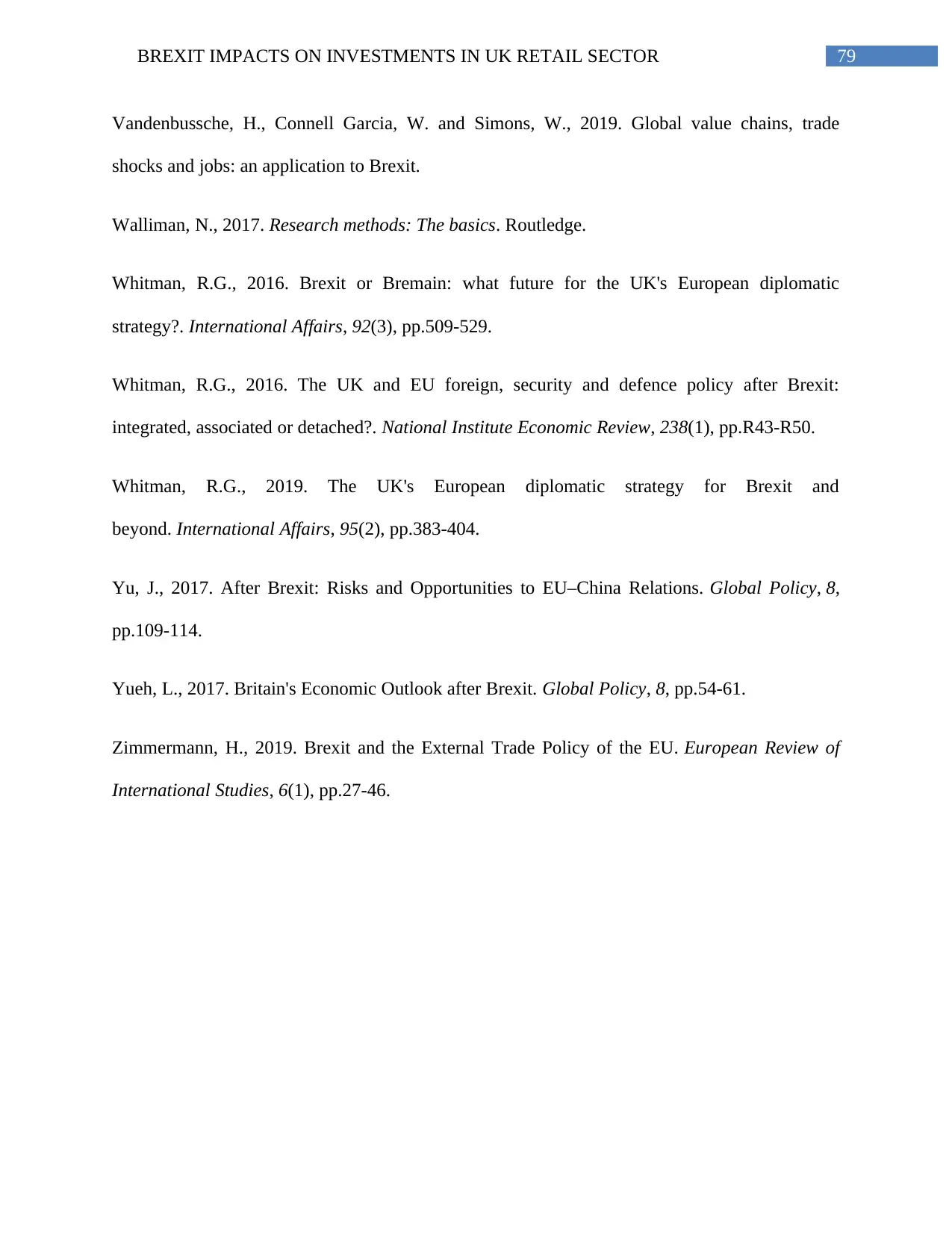
79BREXIT IMPACTS ON INVESTMENTS IN UK RETAIL SECTOR
Vandenbussche, H., Connell Garcia, W. and Simons, W., 2019. Global value chains, trade
shocks and jobs: an application to Brexit.
Walliman, N., 2017. Research methods: The basics. Routledge.
Whitman, R.G., 2016. Brexit or Bremain: what future for the UK's European diplomatic
strategy?. International Affairs, 92(3), pp.509-529.
Whitman, R.G., 2016. The UK and EU foreign, security and defence policy after Brexit:
integrated, associated or detached?. National Institute Economic Review, 238(1), pp.R43-R50.
Whitman, R.G., 2019. The UK's European diplomatic strategy for Brexit and
beyond. International Affairs, 95(2), pp.383-404.
Yu, J., 2017. After Brexit: Risks and Opportunities to EU–China Relations. Global Policy, 8,
pp.109-114.
Yueh, L., 2017. Britain's Economic Outlook after Brexit. Global Policy, 8, pp.54-61.
Zimmermann, H., 2019. Brexit and the External Trade Policy of the EU. European Review of
International Studies, 6(1), pp.27-46.
Vandenbussche, H., Connell Garcia, W. and Simons, W., 2019. Global value chains, trade
shocks and jobs: an application to Brexit.
Walliman, N., 2017. Research methods: The basics. Routledge.
Whitman, R.G., 2016. Brexit or Bremain: what future for the UK's European diplomatic
strategy?. International Affairs, 92(3), pp.509-529.
Whitman, R.G., 2016. The UK and EU foreign, security and defence policy after Brexit:
integrated, associated or detached?. National Institute Economic Review, 238(1), pp.R43-R50.
Whitman, R.G., 2019. The UK's European diplomatic strategy for Brexit and
beyond. International Affairs, 95(2), pp.383-404.
Yu, J., 2017. After Brexit: Risks and Opportunities to EU–China Relations. Global Policy, 8,
pp.109-114.
Yueh, L., 2017. Britain's Economic Outlook after Brexit. Global Policy, 8, pp.54-61.
Zimmermann, H., 2019. Brexit and the External Trade Policy of the EU. European Review of
International Studies, 6(1), pp.27-46.
1 out of 80
Related Documents
Your All-in-One AI-Powered Toolkit for Academic Success.
+13062052269
info@desklib.com
Available 24*7 on WhatsApp / Email
![[object Object]](/_next/static/media/star-bottom.7253800d.svg)
Unlock your academic potential
© 2024 | Zucol Services PVT LTD | All rights reserved.





